|

(delwedd C4307) (tudalen a000)
|
|
|
|
|
|

(delwedd C4308) (tudalen a001)
|
|
|
|
|
|

(delwedd C4309) (tudalen a002)
|
THE FOLK-SPEECH OF SOUTH CHESHIRE.
I
THE
FOLK-SPEECH
OF
SOUTH CHESHIRE.
BY
THOMAS DAELINGTON,
B.A. (CANTAB.), M.A. (LOND.),
SCHOLAR OF ST. JOHN'S COLLEGE, CAMBRIDGE, AND UNIVERSITY SCHOLAR OP
LONDON.
v
LONDON :
PUBLISHED FOR THE ENGLISH DIALECT SOCIETY, BY TRUBNER AND CO.
1887.
J)37
A. IRELAND AND CO., PRINTERS, MANCHESTER.
|
|
|
|
|

(delwedd C4310) (tudalen a003)
|
PREFACE.
THE appearance of a new book dealing with the Cheshire
dialect may possibly excite some surprise. To say nothing of the labours of
Wilbraham, Leigh, and other writers, it might be thought that the copious
work of Mr. Holland, lately published by the English Dialect Society, would
leave little of importance to be said on this subject. A few preliminary
words, therefore, seem to be necessary in explanation of the motives which
have led me to undertake the present work.
The nucleus of my Glossary of South Cheshire words was formed nearly ten
years ago. Accustomed to hear the dialect of my native county from earliest
childhood, I had become quite as familiar with its idioms as with those of
literary English. I early became convinced, however, that in order to enter
perfectly into the spirit of the dialect it was necessary not only to note
the forms of speech used by others, but constantly to use them myself. I
accordingly formed the habit of employing the dialect in my daily intercourse
with dialect-speakers. This habit I have never relinquished, and it has
proved of immense value to me in my work as a word-collector. In this way it
was not difficult for me to get together a collection of several hundred
words, such as I myself was in the constant habit of using, with the addition
of some which
|
|
|
|
|

(delwedd C4311) (tudalen a004)
|
iv PKEFACE.
were less usual, and consequently likely soon to become obsolete. This work,
however, begun without any definite scientific object, was easily
relinquished when it became necessary for me to be absent for long periods
from the district in which the dialect is spoken. It was only at the
beginning of 1886 that I again resumed my long-neglected and almost-forgotten
task. At that time my attention was drawn to the First Part of Mr. Holland's
Cheshire Glossary, then recently published. I learnt from his Preface that he
had had little opportunity of becoming acquainted with the dialect, as spoken
in South Cheshire ; and an examination of his Glossary itself convinced me
that I had enough new material to justify me in under taking a separate work
on the subject. Moreover, I conceived that my habit of speaking the dialect
would enable me to deal with the pronunciation more exactly and more
systematically than Mr. Holland has thought it necessary to do. Having talked
the matter over with Prof. Skeat, I was encouraged by him to offer the work
for publication by the English Dialect Society.
In the preparation of the following Glossary one of my main objects has been
to economise space. I have not, however, thought it advisable to attain this
end by shortening my definitions or examples, or by the exclusion of any
important matter. But I have carefully abstained from overloading the pages
of my Glossary with words which differ only in pronunciation from the forms
of literary English. Such words are, for the most part, treated once for all
in a separate chapter on Pronunciation ; a few important words, however,
which were accidentally omitted or inadequately treated in this chapter, have
been introduced in the Glossary. Again, I have made it a rule not to introduce
any word which is found in standard English Dictionaries. When I have felt
com-
|
|
|
|
|

(delwedd C4312) (tudalen a005)
|
PREFACE. v
pelled to depart from this rule, it has generally been, first, in the case of
words which, though found in ordinary dictionaries, are so little used in
common speech as to be practically obsolete; and secondly, in the case of
words which bear a different shade of meaning in this dialect from that which
they have in standard English. All such words are, however, marked with an
asterisk. Annandale's Dictionary has been generally consulted for the
purpose.
While I have introduced no word into my Glossary which I have not myself
heard from a dialect-speaking person, I have been greatly assisted by the
labours of those who have preceded me in the same field. Mr. Holland's book
has, of course, given me most help. I have had Wilbraham's Glossary (ed.
1820) constantly before me ; but Mr. Holland, by incorporating the
collections of Wilbraham and Leigh in his own work, has saved me much labour
of reference. I have used the mark t in the Glossary to indicate that the
word to which it is affixed is also found in the collections of Mr. Holland,
Mr. Wilbraham, or Colonel Leigh. In not a few instances I have been able to
verify words in South Cheshire, which were only given by Mr. Holland on the
authority of Wilbraham or Leigh. Miss Jackson's Shropshire Word-Book has also
afforded me much valuable assistance ; and in the preparation of the Grammar,
Mr. Elworthy's work on the Grammar of the Dialect of West Somerset proved
extremely suggestive. I am also indebted for several useful ideas to the Mid-
Yorkshire Grammar of Mr. C. Clough Robinson. I have made considerable use of
Skeat's Etymological Dictionary (both the larger and the smaller editions).
In compiling the lists on pp. 50 and 51, I was greatly assisted by Miss
Skeat's “History of Anglo-French Vowel Sounds." For the rest, I have
|
|
|
|
|

(delwedd C4313) (tudalen a006)
|
VI
PREFACE.
not burdened myself much with books of reference. I have
oc< sionally consulted other publications of the E. D. S., besides those
already mentioned, especially the reprint of Bay's Collection, edited by
Professor Skeat, and Mr. Axon's compilation of Dialect Words from Bailey's
Dictionary. Whilst writing my Grammar, Dr. Morris' "Outlines of English
Accidence" was constantly open before me. When I have obtained help from
other sources besides those mentioned, I have given the reference in the body
of the work. The Shakspere references are to the Globe edition.
My sincerest thanks are due to Mr. Alexander J. Ellis for his careful
revision of the earlier part of my MS., and of some of the proof-sheets, and
for many valuable suggestions which have made my work much more complete than
it would otherwise have been. I am also greatly indebted to Professor Skeat
for the kind interest he has shown in my work, and for the advice and help he
has from time to time given during its progress. Lastly, I have to thank Mr. Thomas
Hallam, of Manchester, for many valuable hints afforded to me, mainly in
connexion with the phonology of the folk-speech. The two latter gentlemen
have read through the proof-sheets of the whole work, and their ready and
courteous assistance has been invaluable to me. However, by a mistake, for
which no one in particular seemed to be responsible, the first few sheets
were printed off before they had received my own final corrections, or had
been seen by Professor Skeat and Mr. Hallam. A considerable number of
corrections, therefore, appear in the list of tl Addenda et Corrigenda"
which would in the ordinary course have been incorporated hi the body of the
work. Mr. Hallam's observations on several sounds in the dialect appeared to
me to be so important as to merit being presented in the form of a special
|
|
|
|
|

(delwedd C4314) (tudalen a007)
|
PREFACE. vii
Appendix;" and he has accordingly been kind enough to furnish me with
the results of some investigations he has recently made in S. Cheshire and
elsewhere with the object of finally ascertaining the analysis of these
sounds. His account of these will be found to differ in some important
respects from that given in my Chapter on Pronunciation, which was founded on
a far narrower basis of research, and is consequently less to be relied upon
than that of Mr. Hallam.
During the progress of the work a considerable amount of new matter has
turned up, all of which will be incorporated in a Supplement, to be published
in a short time.
With the exception of W. for Wilbraham, L. for Leigh, and H. for Holland, I
have employed no abbreviations which are not universally understood.
* It was found impossible to prepare this Appendix in
time for publication with the main work ; it has therefore been necessary to
hold it over till the Supplement is ready.
|
|
|
|
|

(delwedd C4315) (tudalen 001)
|
INTBODUCTION.*
THE district in which the dialect treated of in the
following pages prevails may, for practical purposes, be denned as that part of
Cheshire lying south of a line drawn from west to east across the county, and
passing through Handley (six miles S. E. of Chester) and Crewe. I have
limited myself to the dialect of this region for several reasons : Firstly,
because it is that with which I am most familiar ; secondly, because it has
received little attention from previous writers ; and thirdly, because, as I
shall show immediately, the folk- speech of this district is marked by
certain peculiarities which merit special treatment.
The Cheshire dialect, as spoken in different parts of the county, presents
certain well-marked differences in respect of vocabulary, pronunciation, and
grammar. On the subject of vocabulary, I shall leave the Glossary to speak
for itself. I propose, however, to offer some general remarks on the
pronunciation and grammar of the South Cheshire dialect, which will serve to
make plain its position with respect to those spoken in other parts of
Cheshire and in other English counties. The fuller and more technical treatment
of both pronunciation and grammar I shall reserve for two special chapters.
As regards pronunciation, the best tests that can be taken are the
pronunciation of [ai] among vowels, and the pronunciation of [tr] , [dr]
among consonants. When these two tests are applied, the county will be found
to fall into two main dialectal divisions, one
*For the representation of the Cheshire words mentioned
in this Introduction, I employ Glossic symbols. For the sounds which are
peculiar to the Cheshire dialect, and for the modifications of the Glossic
system, which I have for convenience employed, the following Chapter on
Pronunciaton must be referred to (especially General View of Vowel-sounds,
under [E, Ey, Ee, 60, Uw]).
B
|
|
|
|
|

(delwedd C4316) (tudalen 002)
|
2 FOLK-SPEECH OF SOUTH CHESHIRE.
comprising the north-eastern portion, and the other the rest of the county.
In the former of these divisions, [ai] is pronounced as in literary English,
and [tr, dr] are pronounced dentally, viz., [t'r, d'r] ; in the latter [ai]
is pronounced as [ee]*, and the dental pronunciation of [tr, dr], though
occasionally heard, is only exceptional. Having fixed these two main
divisions, a closer application of the [ai] test will show that the latter of
the two, viz., the one which embraces north, west, mid, and south Cheshire,
naturally falls into two further subdivisions. The first of these
subdivisions, comprising north, west, and mid Cheshire, is marked by a
general and strict adherence to the use of the [ee] sound when representing
the standard [ai] ; the latter, which coincides with the district of which I
have undertaken to treat, is distinguished by the greater freedom with which
the [ai] sound is used side by side with the [ee]. In other words, the speech
of the southern district has been so far affected by influences which have
reached it from Shropshire and the English-speaking portions of Wales as to
lose something of its distinctive character.
This mixed character runs through the folk-speech of south Cheshire, and the
same influences may be recognised throughout. It is not my intention to
enumerate here all the instances in which this dialect has been affected by
the neighbourhood of Shropshire. I shall content myself with one more typical
example, namely, the pronunciation of standard [ou, aaw]. The most general
pronunciation of this sound, and that which is most characteristic of
Cheshire as a whole, is [aay]. In fact, the only points within the borders of
the county where this pronunciation entirely fails are, as far as I have been
able to ascertain, the following: the extreme N.E. and N.W. corners ; the
S.E. corner beyond Audlem ; the township of Wirswall in the extreme south ;
and Farndon, on the Dee. But
* This is a broad statement, sufficiently accurate for
my purpose, but to which the Congleton and Sandbach district forms an
important exception. Mr. Hallam's researches have established that in this
district the change to ee is only regular in words which in literary English
represent the [ai] sound by ai or ay, as fain, wait, clay, day; and that
other words commonly follow the north-eastern usage. See Mr. Hallam's letters
to the Manchester City News (March 26, 1881, and following Nos.), which are
models of clear and correct statement.
|
|
|
|
|

(delwedd C4317) (tudalen 003)
|
INTRODUCTION. 3
even as regards the rest of the county, and more particularly South Cheshire,
[aay] does not hold the ground without a rival. The pronunciation [uw]
(accurately [uuw]) may be heard with more or less frequency throughout the
county; but its great and steadily increasing prevalence in South Cheshire is
certainly due to the influence of the Shropshire dialect, which uses this
sound by rule. Whether the use of [aaw], which in the Malpas district
constantly replaces [aay], is to be attributed to the same influence, or is
rather an imitation of literary English, is a question which I am not able to
decide. The Malpas district is in many respects peculiar, and I shall
frequently have occasion to refer to it specially. It may be well, therefore,
to say here that I mean by the "Malpas district" proper an area
extending for two miles in every direction from the town of Malpas ; but that
the influence of the modes of speech in use within this district may be
traced as far as the Denbighshire border on the one side, and the township of
Norbury (4 miles W.) on the other.
This will suffice to indicate that the mixed character of South Cheshire
pronunciation may be mainly the result of the proximity of this district to
Shropshire. The conclusions I have drawn with respect to the pronunciation
would be strengthened by a detailed examination of the vocabulary. Such an
examination, however, would lead me too far a-field for my purpose. Anyone
who wishes to pursue the subject may satisfy himself by a comparison of my
Glossary with that of Miss Jackson on the one hand, and that of Mr. Holland
on the other, of the middle position which the South Cheshire dialect holds
in respect of vocabulary between the dialects treated of by these two writers
respectively. It is the more remarkable, therefore, that while particular
sounds have been modified by Shropshire influence, accent, tone, and mode of
utterance generally should have remained so entirely unaffected thereby. Were
the differences in grammar and vocabulary very much fewer than they are, the
differences in intonation and pronunciation would effectually prevent the
South Cheshire dialect from being closely classed with that of Shropshire.
The highly-pitched tones, the habit of raising the voice at the end of a
sentence,
|
|
|
|
|

(delwedd C4318) (tudalen 004)
|
4 FOLK-SPEECH OF SOUTH CHESHIRE.
the sharp, clearly-defined pronunciation which distinguish the Salopian, and
are probably a mark of his Welsh descent, are never heard in this district of
Cheshire. The pronunciation here is rather broad and rough, not essentially
differing from that of the more northern parts of Cheshire, and bearing more
affinity to that of Derbyshire or North Staffordshire than to that of
Shropshire. Curiously enough the two modes of pronunciation, viz., the
Cestrian and the Salopian, are almost exactly divided from each other by the
geographical border. Anyone who walks along the streets of the border town of
Whitchurch on a market day, when country people from both counties are
present, will recognise the truth of this statement.
With respect to stress, one remark remains to be made. Stress in literary
English is on the root, and not on the inflexional syllable. This is not
always the case in the Cheshire dialect. The exceptions, however, occur only
in Latin words to which the Saxon rule hardly applies. Words of three or four
syllables, having a final long vowel, frequently accent the last syllable, as
[regilee't] regulate, a word of fairly frequent use in the sense of “chastise
;" [multiplahy] multiply; [kumyoonikee't] communicate. Words of four
syllables ending in a short vowel often have the accent on the penultimate :
[suurkumstaan-siz] circumstances ; [Febyooarri] (occasionally), February.
Exceptional accentuations are [kontrarri] contrary; [in-ikwiti] iniquity ;
[rimed-i] remedy.
The dialectal divisions and subdivisions into which I have endeavoured to map
out the county, though useful enough for practical purposes, have no
historical value, and probably are historically misleading. Every indication which
I have hitherto observed points to the conclusion that there was once much
greater uniformity of pronunciation throughout Cheshire than at present
exists. It is pretty clear, for example, that the dental pronunciation of
[tr, dr] , which is at present almost limited to the North-Eastern district,
was formerly heard in all parts of the county, and that the pronunciation of
standard [ou] as [aay], and of standard [ai] as [ee] , was at any rate much
more universal than it now is. Increased communication between the
inhabitants of different
|
|
|
|
|

(delwedd C4319) (tudalen 005)
|
INTRODUCTION. 5
counties has done much to confuse dialectal characteristics ; and the process
is likely to continue till confusion results in general uniformity.
When we apply the historical method to the grammar of the folk speech, we are
treading on surer ground. It is interesting to note to how great an extent
its grammatical forms have remained unchanged throughout the course of five
or six hundred years.
It will conduce to clearness if I briefly sketch the position of English
dialects in the thirteenth and fourteenth centuries, when the several
varieties of English speech began to take their present shape. A comparative
study of the English literature surviving from this period enables us to
arrange the dialects of the country under three great heads the Northern, the
Midland, and the Southern. Of these, the Midland, with which we have
especially to do, was spoken not only in the midland shires proper, but on
the eastern side of the country, from Lincolnshire to Suffolk inclusive, and
on the western side from Lancashire to Shropshire inclusive. Of its many
varieties two are the most important, the West Midland, spoken in Lancashire,
Cheshire, and Shropshire, and the East Midland, spoken in Lincolnshire,
Norfolk, and Suffolk. These were distinguished by the conjugation of the verb
in the present singular indicative. Here the east midland dialect followed
the southern : make, makesZ, mak^/t ; while the west midland conjugated its
verb like the northern dialect : make, makes, makes. The West Midland of
Shropshire was peculiar. Under the influence, doubtless, of the southern
dialect, which was spoken in the neighbouring counties of Worcestershire and
Herefordshire, it formed its second person singular present in -est: makesf.
The plural present in all persons was -en throughout the midland dialect.
The question immediately presents itself : How far have these
characteristics, some of which have become obscured in the more northern
counties of the west midland group, preserved themselves in the district of
Cheshire under consideration? The answer is, that they remain almost exactly
as they were in the thirteenth century. We still invariably conjugate our verb
in the present:
|
|
|
|
|

(delwedd C4320) (tudalen 006)
|
6 FOLK-SPEECH OF SOUTH CHESHIRE.
[mark, marks, marks, markn, or markun]. I notice that the grammar of some of
Mr. Holland's examples varies considerably from this rule, but these
variations, if not accidental, must be strictly confined to North Cheshire,
as they would certainly offend a more southern ear. The single important
exception which must be noted, namely, the tendency to use the southern st in
the second person singular of auxiliary verbs, may be ascribed to the
influence of the Shropshire dialect, concerning which I have already spoken,
or may be rather due to the influence of the Authorised Version of the Bible.
There is, of course, nothing to show that this use of st is not as old as the
thirteenth century.
The distinction between the Cheshire dialect as West Midland with northern
tendencies, and the Shropshire dialect as West Midland with southern
tendencies, is also in other respects still maintained. Naturally enough,
however, in a district so far south as this part of Cheshire, northern forms
become few and far between, and are found side by side with those more
peculiar to the south. Thus in such words as [ree-chi] reeky, smoky, the
palatal ch of the southern dialects is preferred to the guttural k of the
northern, while, on the other hand, in [sahyk] sigh, [braalr] breach,
[skrahyk] screech, the guttural is preferred. [Naaclr] notch, [trirrdl]
trundle, [rin-dl] streamlet, [pil-pit] pulpit, and perhaps a few more
preserve northern vowels: but [miclr] much, [win-u] won't, and other words
which are heard in Lancashire have here given place to [much, wun-u] &c.
In the plurals of nouns in n or en southern influence asserts itself
strongly. Seven of these are hereinafter enumerated in the grammar. One or
two of these may have arisen by false analogy, and of the rest [eyn] eyes,
[shoon] shoes, are represented by the old northern eghen, schoon : [cmTdurn]
is a mixed northern and southern form. [Key] kine is the old northern plural
of cow. The northern [sul] (M.E. sal) exists side by side with the southern
[shaal-] shall (M.E. schal), but the preterite suld is not used. [O'o] she,
is an old west midland form, which has successfully held its ground against
the northern she. Most, if not all, of the northern forms above-noted cease
to be heard directly one crosses the Shropshire border. We shall be safe,
then, in maintaining that
|
|
|
|
|

(delwedd C4321) (tudalen 007)
|
INTRODUCTION. 7
the southernmost limit of Northumbrian influence is the line of low hills
which separates Cheshire from Shropshire.
The most striking characteristic of the dialect is the overwhelming majority
by which Teutonic words outnumber Komance in it. A single illustration of
this will be sufficient. The first chapter of my Cheshire version of the Book
of Ruth contains 687 words, exclusive of Hebrew names ; and of these only
twenty-one words are of Romance origin. Thus if, as I believe, this version
may be taken as fairly representing the common speech of the people, the
proportion of Romance words in general use is a little more than three per
cent. The Romance words commonly employed in the folk- speech are :
(1) Certain words of feudal origin : [skwai'r] squire ; [ee'vurij] average,
work done by tenants for their landlords; [saa'rv] to serve, with its
derivatives.
(2) Names of distant relationships : [nungk'l] uncle ; [naan't] aunt ; [neys]
niece ; [nevyii] (Fr. neveu, notice the v) ; [kuz'n] cousin. Curiously enough
[rilee'shun] relation is preferred to [kin'zmiin]. But ancestors are always
[foa-rfee'dhurz].
(3) Names of certain divisions of time: [aawur] hour; [minit] minute. A
fairly long, but indefinite, period of time is called a [jmrrni]. A season is
a [tmrrn], but also a [tahym]. Autumn, however, is rendered by [baaken'd] ; a
second is called a [kraak*] or a [jif i].
(4) Names of certain victuals and fruits. In the names of these this dialect
generally follows literary English.
(5) Names of certain parts of the body : [fee's] face; [vee'n] vein.
(6) A few names of animals : [beVust] beast \ [skweril] squirrel ; [myoo'l]
mule; [yaa'rn] heron; [giilarni] guinea-fowl. The last word, however, I
consider as a recent importation from Shopshire. Falcon has left its mark in
the widely-diffused proper name [Farknur], generally spelt Faulkner.
(7) A few names of implements : [koo'tur] coulter ; [pahykil] pitchfork, and
possibly [siik] ploughshare.
(8) Some words of miscellaneous character: [mot'i] word; [paa'rl] talk ;
[gob] lump.
Of course Romance words are constantly being borrowed from literary English,
especially when it is desired to replace a short and familiar word by a
longer and more grandly sounding one. Thus one not infrequently hears
[pres-puree-shun] perspiration, substi-
|
|
|
|
|

(delwedd C4322) (tudalen 008)
|
8 FOLK-SPEECH OF SOUTH CHESHIEE.
tuted for [swaat-]. This, however, is mere affectation, and does not affect
the dialect as purely spoken.
There are a few noteworthy examples of Teutonic words with Eomance suffixes.
These are (1) in -ment; [od-munts] odds and ends. (2) in -able: [feytubl]
ready to fight. (3) in -ous: [blus-turus] boisterous. (4) in -ery :
[pig'uri], pig-sty. (5) in -et ; [smik-it], a woman's shirt. The Teutonic
suffix -ness seems in a few words to have been confused with the Komance
-ance. 'These are [wnVns] witness ; [biz-ns] business ; [baad-ns] badness,
illness ; [laat*ns] slowness ; [saad-ns] sadness, earnest : in all of which
the ns is pronounced with the natural vowel. Eomance words with Teutonic
suffixes are : (1) in -ship: [mes'turship] control. (2) in -en: [kwariitn] to
quiet. (3) in ful : [mes-turful] masterful ; [ky'arrfiil] careful, and many
others. (4) in -less, many. Romance words with Teutonic prefixes are : (1) in
un, many : (2) in o'er ; [oa'rfee*s] to “overface," be too much for, and
others.
The suffix le seldom remains unchanged in this dialect. It is replaced either
(1) bjer: [prik-ur] prickle; [gy'aab-ur] to gabble ; [chonrur] to champ,
Shropshire "chommle," “chammle;" or (2) by uz; [funruz] to
fumble; [skraanruz] to scramble; [yaag-uz] to “y aggie," quarrel ; or
(3) by ock : [shorn -uk] shamble ; or, finally, is lost according to the
principles afterwards explained in the Chapter on Pronunciation, under L :
[briclru] brittle ; [kaak-u] cackle ; [songg-u], to glean (Handle Holme has
“Songal") ; [waangg-u] to totter, Shropshire, "wankle;"
[braad'u] to spread the wings over, Shropshire "braddle." The only
other suffix which deserves special attention is the diminutive ock, which is
used in a fair number of words [tuf-uk] a tuft ; [poa-nuk] a pony ; [lonruk]
[onruk] diminutives of lump and hump.
The Scandinavian element in the dialect is much smaller than in literary English.
It will be interesting to take a few of the most common Scandinavian words
used in the latter and see how they fare in South Cheshire. Die, squeak,
raise, till, are in general use [dey, skwaa-k, ree-z, til] : are is used
exceptionally : ill is only used in compounds, as [il-kiintrahyvd]
ill-humoured : fro in the phrase “to and fro “is represented by [ugy'en-] :
bound, in the sense
|
|
|
|
|

(delwedd C4323) (tudalen 009)
|
INTRODUCTION.
of going, is not heard: bask is replaced by [flee-k].
The Scandinavian words peculiar to the dialect are very few : [eg] to incite,
represents the Icelandic eggja: [nuwt] a worthless person, may correspond to
the Icelandic naut, a beast. In the formation of the place-names of South
Cheshire, Danish influence has been quite absent ; in fact, the Wirral
peninsula is the only part of the county where the names of places preserve
any record of Danish occupation. Smaller still has been the influence of the
Welsh language upon the folk-speech of South Cheshire. The few Keltic words
which are used in literary English are for the most part also in use in this
dialect. But several dialectal words of Welsh origin which are employed in
more remote parts of England are quite unknown in this border county of
Cheshire, e.g., cotton from W. cytuno to agree. Putting aside such
onomatopoeic words as [naak-] to knack, click (W. cnec, cnac), which may well
have arisen independently in both languages, the following is an almost
exhaustive list of such words peculiar to the dialect as I have been able to
refer with some certainty to a Welsh source.
Cheshire.
Welsh.
English. heather louse flannel altercate grandmother
sultry
to offer, shew milk and bread buttermilk and water ploughshare
a call word used to ducks a duck
Of these words it is at least doubtful whether the Welsh
osio does not rather come from the English [os] . Glasdwr is given as the
derivation of Glaster in Miss Jackson's Shropshire Word-Book. I mark it as
doubtful merely because the last element of the Welsh word is irregularly
formed. Sivch is similarly marked, as there seems to be nothing to decide
whether this word or 0. French soc should be
[grig']
grug
[grig'i]
grugiad (ant)
[flaan-in]
gwlanen
[ky'ibl ky'aab'l]
cablu (to blaspheme)
[nin'i]
nain
[pudh'iiri]
poeth
[OS]
? osio
[pob'iz]
pobu (to bake)
[glaas'tiir]
? glasdwr (blue water)
[suk]
? swch
[wid-] [wid'i]
> hwyad (ducks)
|
|
|
|
|

(delwedd C4324) (tudalen 010)
|
10 FOLK-SPEECH OF SOUTH CHESHIRE.
given as the derivation of [suk] . The wprd occurs in Bob Nixon's Cheshire
prophecy, which is said to have been traditionally handed down from the times
of the Wars of the Eoses.
Between the sickle and the suck All Engeland shall have a pluck.
This paucity of Welsh words in the folk-speech can only be explained as the
result of the singular antipathy 5 “which the men of Cheshire have always
shown towards their Welsh neighbours.
Perhaps a more interesting question is How far has the Cheshire dialect
influenced the vocabulary of the Welsh language ? Colloquial Welsh contains
many words borrowed from English. It is, of course, in many cases, impossible
to decide whether a particular word has been brought in by literary influence
or oral intercourse. But where the form under which a borrowed English word
appears in Welsh is that of the Cheshire folk- speech rather than that of
literary English, it is safe to conclude that this word has been taken
directly from the Cheshire folk-speech. Such words are : gaffer, an overseer,
Cheshire [gy'aaf'ur] ; llithro, to slide, Cheshire [slidlrur] ; ysten, a
cream-mug, Cheshire [stee*un] ; hancets, a handkerchief, Cheshire
[aangk'ich]. It is curious that this last word is universally used in the
counties nearest to Cheshire, whilst in Anglesey it is replaced by a word of
native formation. The Cheshire form is exactly retained in the following
words : sond r sand ; shilff, shelf ; newydd spon, span-new. Mon for man
appears in several words, e.g., certmon, a waggoner, lit. cart-man ; hwsmon,
a farm bailiff, lit. husbandman (compare civsmer from customer) \ porthmon, a
grazier, cattle-dealer (a hybrid word, from porthi, to
* The exclusiveness of Cheshire people, which extends
itself more or less towards all “foreigners “or strangers, is remarked on at
length by Wilbraham in his preface. It was noted as characteristic of them by
a writer of Queen Elizabeth's tune. William Smith, author of The Vale Royal
of England, says: "The people of the country (i.e. of Cheshire) have
always been true, faithful, and obedient to their superiors. . . . They are
of nature very gentle and courteous, ready to help and further one another,
and that is ta be seen chiefly in the harvest time, how careful are they of
one another ! They are stout, bold, and hardy ; of stature tall and mighty.
Withal impatient of wrong, and ready to resist the enemy or stranger that
shall invade their country, the very name whereof they cannot abide,
especially of a Scot. In religion they are very zealous, albeit somewhat
addicted to superstition." Most of this description still remains true.
|
|
|
|
|

(delwedd C4325) (tudalen 011)
|
INTRODUCTION. H
feed). See also Outrider in the Glossary. Idioms have been borrowed in the
same way; e.g., the "edge o' neet" [ej u neet] appears in Welsh as
"min y nos." Did space permit, this list might be greatly extended.
The contributions of one other language to the dialect remain to be noted,
namely, the Komany. As the open commons of this county were in former years
much frequented by the Gipsy people, one might have expected that their
speech would have left more impress than it has done upon the dialect of the
district. It is natural, however, that the Komany tongue should have affected
thieves' Latin and the slang of city slums rather than the speech of honest
country people. Only one word- peculiar to the folk-speech can be with
certainty traced to a Romany source. This is [duks] luck, chance (Romany,
"dook"), fortune, pronounced [duk] or [duuk-].
Of written literature the South Cheshire dialect possesses none. The
vocabulary and grammatical forms of the few printed specimens which exist in
the Cheshire dialect are not those peculiar to this district. It will,
therefore, devolve on Mr. Holland to say what is necessary concerning them
rather than on me. I must, however, briefly mention a short poem by a Mr. J.
C. Henderson, purporting to be in the Cheshire dialect, which appeared in the
Spectator for October 16, 1886. This poem is entitled "A Village Tragedy
(Cheshire) a Sequel." I say nothing of the literary merits of this
production; I simply mention it here to warn students of English dialects
that nearly every verse contains forms which are no more like Cheshire than
Cornish.
We may perhaps dignify with the name of unwritten literature certain
fragmentary rhymes and ballads which pass from mouth to mouth in the
district. Of these, many are incidentally given in illustration of particular
words in the Glossary. Unluckily,
*Another word [drau'drahy], shrewdness, was withdrawn
from my Cheshire Glossary at the last moment before going to press because I
failed to verify it with the person from whom I thought I had heard it. This
word I connected with "drawdrei," theft, which was given me as an
almost obsolete Romany word by one of the Norfolk Hearns (or Herrins). I
should be thankful for any communications on the subject either of the
Cheshire or of the Romany word.
|
|
|
|
|

(delwedd C4326) (tudalen 012)
|
12 FOLK-SPEECH OF SOUTH CHESHIRE.
however, these specimens are seldom composed in the purest dialectal
language. The ordinary South Cheshire countryman is totally without that
sense of pride in, and respect for, his own idioms, which alone makes a
dialectal literature possible. Having always been taught by “educated “people
to regard his dialect as a vulgar and degraded form of speech, he naturally
chooses for his rhymes and ballads and household sayings such expressions as
he imagines to be those of literary English. The result is an incongruous
mixture which would grievously offend his ear if it occurred in ordinary
conversation. Let us take as an example the following ditty* sung by school
children :
Gtossic. Translation.
[Joa-ji-Poa-ji, pik'lti pahy, Georgy, Peorgy, picklety pie,
Kis't dhu guurlz, un mai'd urn Kissed the girls, and made them
krahy ; cry ;
Wen dhu guurlz kum aawt tuplai' When the girls came out to play
Joa'ji-Poaji run uwar] Georgy Peorgy ran away.
Here there are at least four forms not used in ordinary conversational
speech, viz., [guurlz] for [wen-shiz], [krahy] for [skrahyk], [plai-, awar]
for [plee-, uwee-]. [Aawt] for [aayt] would be only admissible in the Malpas
district. We shall obtain similar results from an examination of the rhyme given
in the Glossary under the word Draw, which properly belongs to Norbury.
[Ulaas*, ulaas*, uwd Puwilz aas*
Dhu aas* dhut drau-d dhu koa*l Uwd Paal'i krahyd wen Jin'i dahyd Un Tum-i dug
dhu oa*L]
Here [ulaas-] and [dhut] are borrowed from literary English. [Dahyd] is also
a less common form than [deyd], and [aas-] is rare. Of course we occasionally
get rhymes in pure dialect, but this generally happens when the dialectal
forms are sufficiently like those of standard English to satisfy the rustic
ear. Instances
* This rhyme is heard with slight variations in
Berwickshire, Yorkshire, and probably other parts of the country. We may
therefore account for the peculiar dialectal forms noted above by the
supposition that the ditty is an imported one.
|
|
|
|
|

(delwedd C4327) (tudalen 013)
|
INTRODUCTION. 13
of these will be found in the Glossary under Faivn-peckas and Peaswad. In
what has just been said I have not overlooked the fact that several kinds of
dialect are spoken by Cheshire people, more or less approaching literary
English according as the speaker is more or less cultured. The differences,
however, between these several varieties consist rather in pronunciation than
in grammatical forms. Certain words, which it is difficult to classify, are
also avoided by the more refined dialect -speakers as being “broad." The
farmer will address his labourers in one variety of dialect, his equals in
another : he will even make a similar distinction in the language he employs
to his sons and daughters respectively. The more well-to-do farmers, while
still employing the dialect in speaking to their servants, communicate with
one another in pure English, or in a variety of dialect which differs from
pure English only in the use of certain grammatical forms : e.g., the en of
the plural present indicative. The labourer of the country districts uses a
more copious dialectal vocabulary than the town working man, though both
employ the same grammatical inflexions. In estimating the extent to which
literary English has affected the dialect, we must not forget the constant
influence which the reading of the Bible has exerted since the Eeformation.
In South Cheshire this influence has been specially important. This district
is one in which Nonconformity is strong. It is a fact, which has proved
itself true from Puritan times downward, that the ordinary language of
Nonconformists is very much more affected by Scripture words and phrases than
that of Churchmen. Such words and phrases are constantly heard in the speech
of South Cheshire people. The expression given by Mr. Holland "full of
unbelief," as applied to a cow that will not stay in her pasture, is a
good example. Most of such phrases, however, are individualisms, and should
be discriminated from those which are in general use. I myself have heard
“weary o' well-doin'" used in exactly the same sense as Mr. Holland's
phrase. By far the most important variety of the South Cheshire dialect is
that spoken by the young people, who have been educated under the School
Board system. It is extremely interesting to observe how the speech of the
latter differs from that of older people,
|
|
|
|
|

(delwedd C4328) (tudalen 014)
|
14? FOLK-SPEECH OF SOUTH CHESHIRE.
though the results of such observation are in several important respects
exactly opposite to what one would naturally have expected. For example, most
of the archaic grammatical forms are preserved without modification by the
younger generation. How long this will continue to be the case remains to be
seen. The result of a little grammatical knowledge in the case of adults, who
have scraped together some education for themselves, has generally been very
different. Such people have only too often grown ashamed of saying [wey
mai'kn, yo.a* won] and the like, and have embellished their conversation with
heart-rending barbarities, like [wee* marks, yoo woz, &c.]. It is to be
devoutly hoped that such will not be the consequence of the necessarily
partial education which our rustic youth are receiving. The present is a time
of transition, and it is impossible as yet to say what the end will be.
Again, as regards pronunciation, the rising generation has hitherto been very
conservative. I have often observed that the very broadest and most
thoroughly dialectal pronunciation is to be heard in the playgrounds of our
common schools. On the other hand, the vocabulary of the folk-speech has
suffered terribly of late years. I am speaking within bounds when I say that
above one-half of the most characteristic dialect -words recorded hereinafter
in the Glossary are never in the mouths of persons under twenty-five, and
will consequently be obsolete in another generation. It is no uncommon thing
for a boy to be unable to understand words and phrases which his grandfather
has used all his life.
In conclusion, I must remark that all I have said, and all I shall have
occasion to say, concerns only the dialect as purely spoken. I take no note
of expressions which are peculiar to certain individuals. Nor have I anything
to do with the peculiar errors to which Hodge is liable in talking to a stranger,
nor with those which occur from his inability to distinguish one big word
from another. These eccentricities may amuse the reader, but they are
misleading in a book written with a scientific object. Such modes of speech
as the above may be classed under the general head of individualisms, and I
have laid it down as a rule, that individualisms shall have no place in my
Glossary.
|
|
|
|
|

(delwedd C4329) (tudalen 015)
|
PRONUNCIATION.
IN this chapter I have dealt in detail with the vowel
and consonant sounds in the dialect. With regard to the consonants, of which
the changes are comparatively few and unimportant, I have contented myself
with comparing them with standard English, making only an occasional
reference to the Anglo-Saxon prototypes. In treating the vowels I have
pursued a double course. In the “General View “I have compared them with
standard English. The general rules there given will, I hope, be practically
useful, though they are empirical rather than scientific. In the Classified
Word List which follows I have systematically compared the vowels with their
prototypes in Anglo-Saxon, Icelandic, Eomance, &c., paying special
attention to words in which the vowels are irregular.
THE ALPHABET WITH DIALECTAL PRONUNCIATION.
A [ar, ee-], formerly [aa-]
B = [bey], correctly [baey]
C = [sey], correctly [saey]
D [dey], correctly [daey]
E = [ee-]
F = [aef-]
G = [jey], correctly [jaey]
H = [ich-], or [arch]
I = [ahy]
J = [jaa-]
K - [kee-]
L = [el], correctly [ael-]
M = [em], correctly [aenr]
N = [en], correctly [aen-]
= [oa-]
P = [P e y] correctly [paey]
Q = [kyoo]
R = [aa-r]
S = [es], correctly [aes-]
T = [tey], correctly [taey]
U - [yoo]
V = [vey], correctly [vaey]
W= [dublyoo]
X = [eks], correctly [aek-s]
Y = [wahy]
Z = [zed], correctly [zaed*], formerly [zod] and [uz-urd]
|
|
|
|
|

(delwedd C4330) (tudalen 016)
|
16 FOLK-SPEECH OF SOUTH CHESHIRE.
CONSONANT CHANGES. B into p : rabbit = [raap-it] ; cobweb = [kop-web] ; cp.
O.E. cop web. C soft [s] into 2, but only when final : twice = [tweyz, or
twahyz],
C hard [k] (1) into g : craunch^ [grau-nsh].
(2) into ty': cattle = [ty'aat-1]. MACEFEN. For this sound of ty\ see Mr.
Ellis' Speech in Song, p. 104.
(8) into ch: acorn = [aaclr urn]. A.S. acern. The change of c to ch before e
is common.
Ch. A slight y sound is very often perceptible after ch, especially before [aa]
: chapel [chiaap-il].
(1) intos/i.- wench = [wensh], &c.
(2) into zh or j : hunch = [au*nzh, au-nj] ; bunch [bunzh, bunj]. So within
the dialect itself [sluch] for slush interchanges with [sluj].
Cl, when initial, sometimes becomes [tl], but quite as often remains [kl] :
clip = [tlip-, or klip-]. An example of the change of c! medial into [tl] is
[tit-1] for tickle (v.).
D is occasionally dental before [r, ur] ; drink [d'ringlr] ; hundred
[un-d'urt]. Only a few old-fashioned people keep up this pronunciation, which
will be extinct in this district in a dozen years. But the frequent use made
of it by these few points to the conclusion that it was once general. The
same remark applies to dental t.
(1) into j : dead = [jed] ; death --= [jeth] ; deal = [jel] ; dew = [juw].
This seems to arise from an inserted y after o? T thus : [ded, dyed, and
jed].
(2) intor: somebody = [sum *bri] ; anybody = [aarribri].
(3) into t: moulder = [muwtur]. Common when final: field = [feylt] ; headland
= [aad-lunt] ; Dorfold = [Daa-rfut] ; Mossford = [Mos-fut] ; hold (subs.) =
[uwt] ; forward [for- ut] ; awkward = [ok-urt] ; toward = [toai],
(4) into th [th] : mead = [mee-th].
(5) into th [dh] : adder - [edh-ur]; bladder = [blaadh-ur]; consider =
[kunsidlrur] ; fodder = [fodlrur] ; ladder = [laadlrur];
|
|
|
|
|

(delwedd C4331) (tudalen 017)
|
PRONUNCIATION. 17
powder = [puwdhur] ; tawdry = [todlruri]. [Muirrdhur] for murder preserves an
older form (O.E. myrthra).
(6) added in steel = [steyld] ; gallon = [gy'aal-und] ; drown = [draaynd].
(7) omitted (a) when final, in scold = [skuwl] ; mould = [muwl] ; pound =
[pun] ; and so in the participles wound, bound, ground: (e) after n in the
middle of a word, in London = [Lun-un]; thunder = [thun-ur], A. S. thunor.
(3) in Audlem = [Au-lum]; elder (tree) [el-ur].
F into th [th] : from= [throm],
G soft [j] into ch: scourge = [skoa'ch].
G hard [g] (1) is palatal in many words before [aa, aay aaw]. garbage =
[gy'aa-rbij]; before [ai], agate = [ugy'art] ; before [e], get=[gy'et-];
before [ee, ee], geet for gate = [gy'ee-t] ; before [ey], geese = [gy'eys];
before [i, iy] , give=[gy'iv].
(2) into k : trigger = [trik-ur] ; hugger-mugger = [uk-ur-muk-ur] .
(3) omitted: signify = [sinifi] .
Gh (1) mute in received speech becomes / in dough = [dof]
(2) and k in sigh=- [sahyk].
(3) is silent in enough (pl.) = [unoo f ].
Gl initial becomes [dl], but with somewhat less frequency than [kl] becomes
[tl] : glove = [dluv] . Gl medial becomes [dl] in snuggle = [snudl], Muggly
[mug'li] for muggy becomes [mud'li], just over the Shropshire border, but
this word is not recognised by Miss Jackson.
H : (1) This much ill-used letter is generally omitted, except when
occasionally employed to avoid hiatus: behind = [bihin i] ; my hand = [mi
hon-t] . Educated dialect speakers often use it. The use of the aspirate
where none ought to be is rare in Cheshire.
(2) intow: hullabaloo = [wil'ubuloo-] . For worn see W (2).
J. SeeCh(2).
K (1) is palatal before the same vowels as G hard is, which see : cow=
[ky'aay] ; keep= [ky'ee-p] ; kick= [ky'ik-] , &c. c
|
|
|
|
|

(delwedd C4332) (tudalen 018)
|
18 FOLK-SPEECH OF SOUTH CHESHIRE.
(2) into&u?: skirmish = [skwuu-rmij] ; scatter = [skwaat-ur]. (8) into g:
jerk= [jaa-rg] .
(4) into p: rake (up) = [rai-p] ; and within the dialect glockent [glok-nt] =
[glop-nt] .
(5) dropped : asked [aas-t] .
L (1) vanishes (a) in alf, alv, alt, aid, olt, old, but generally affects the
preceding vowel : calf=[kaui]; half=[ai-f, ee-f]; Ralph = [Rai-f, Ree-f] ;
Calveley = [Kau-vli] ; salt = [sau-t] ; malt [mau-t] ; scald = [skau'd]; old
= [uwd]; colt = [kuwt]; Moulton [M6o-tn]. So in fault = [fau't], which is, in
fact, an older pronunciation than [fau'lt]. Exceptions to this rule are: bold
= [buwld] ; gold = [guwld, goold]. (b) It is generally silent when final :
fool = [foo] ; school = [sk6o] ; stool = [st6o] ; pull [poo] ; hall [au ] ;
all = [au*], hence almost = [onrust] ; dole = [duw] ; Tattenhall = [Taatmi],
and so passim, (c) Also notice false = [fau*s], where again the omission of
the I is older than its insertion : only = [oa*ni] ; holpen = [uwpn] ;
soldier = [soajur] .
(2) into n: homily =[nonruni], an accidental error in a Greek word: Thelwell
= [Then-wel or Teynweyn]; moult = [muwnt] ; brazil (Shrop.), i.e., iron
pyrites = [braaz-in]. [Flaan'in] for flannel keeps the n of the Welsh
original gwlanen.
(3) final into r: prickle = [prik'iir] ; gabble = [gy'aab'ur] .
N (1) prefixed to some words as aunt [naan*t]; uncle = [nungki]; old = [nuwd]
; uncouth = [nungk'ut] ; homily = [nonr uni] ; awl = [nawl] ; augur =
[nargur]. This results from the falling away of n in the indefinite article
an, and its being prefixed to the substantive instead. Cp. E. a newt for an
ewt (O.E. efeta). Shakspere has nuncle, naunt.
(2) omitted in new = [yoo] ; apron (O.F. napperon) = [aap-urn],
(3) dropt in in and on ; so kiln = [kil-].
(4) final into m : Vernon = [Vaa-rnum].
Ng (1) into n in all verbal nouns and pres. participles in ing: coming
=[kunrin] ; to which add nothing [nuth- in] ; anything =[aan-ithin]; kingdom
= [ky 'in -dum]. Also in names ending
|
|
|
|
|

(delwedd C4333) (tudalen 019)
|
PRONUNCIATION. 19
in -ingJiam : Whittingham [Wit-inum] ; and in more unfamiliar names in
-ington : Warrington = [Waarintun] ; Wellington = [WeHntun]. See (2) below.
(2) omitted in names ending in -ington : Bebbington = [Beb'itn] ; Darlington
= [Daa-rlitn] .
(3) into nk [ngk] : thong = [thungk]; anything = [aair ithingk] ; everything
= [evrithingk] ; but nothing, something are so pronounced only by would-be
fine people [nuthingk, sunrthingk] .
(4) into ngg (a) when followed by a vowel either in the same or in the
following word: longer = [lungg-ur] ; singer = [singg-ur]; a ring o' bells =
[u ringg- u belz] . So, we sing = [wey singg-un] or [wey sing-n]. (b) when
the word in which the ng occurs is final.
P (1) into b: poke = [boa -k] ; and possibly plunge = [blunzh], for which see
Glossary under Blunge.
(2) into / : bankrupt = [baangk-raaft] ; grass plot = [gres'flaat] ; palaver
= [fulaa f vur].
(3) For interchange of p and Jc see K (3).
(4) added: BU*m=[slimp].
R is slightly trilled before a vowel : as through = [throo] ; rent = [rent].
From old-fashioned people, especially in the extreme south of the county, I
sometimes hear a strongly trilled r before a vowel as, run= [r'un] : e.g., at
Tushingham, which is sufficiently near the border to be affected by the
Shropshire r. After a vowel, provided that no other vowel immediately
follows, it is very indistinct, and approaches the London quality of r,
though it does not quite disappear. Between two vowels, the r is often
distinctly trilled : currant [kor'-un] . It is occasionally added
euphonically to a word ending with a vowel to avoid hiatus with an initial
vowel in the next word: as "a narrow one" = [u naarur un] ; “who
art thou ?” [oour aat-] .
(1) into I, when final: snigger = [snig-1] ; tinker (v.) = [tingk-1].
(2) into n, when final : pincers = [pin-sunz].
(8) transposed: bird= [brid-]; burn = [brun]; curd = [krud].
|
|
|
|
|

(delwedd C4334) (tudalen 020)
|
20 FOLK-SPEECH OF SOUTH CHESHIRE.
(In these words the r has its old position.) Preamble = [puraanrbl]; coroner
= [krun-ur]; and perspiration, a word often affected by dialect speakers =
[pres -puree -shun],
(4) added : thill (shaft) = [thril-] ; poke, poker = [proa-k, proa-kur].
Compare E. (bride) groom from 0. E. guma. This is the converse of omitted r
in speak. It may be, however, that [proa*k, proa'kur] should rather be
connected with prog.
(5) omitted : (a) always before s, the vowel being changed : first = [fost] ;
durst = [dost] ; curse = [kos] ; burst = [bost] ; force = [foa-s] ; worse,
worst = [wos, wost] ; hearse = [es] ; morsel = [mos-il] ; nurse = [nos] ;
horse = [os] ; Purcell = [Pos-il] ; scarce = [skai-s] ; verse = [ves] . We
must except gorse = [gau-rs] , and possibly burst (in the imprecation “Borst
yo"), where the vowel is modified by the r in the ordinary way not
changed, as above but the r itself seldom sounded, [bau-st] . (b) Once
omitted before [z] : Wirswall = [Woz'ii] . (c) Also notice worth = [woth] ;
girth = [goth] ; rhubarb = [r6o*bub] ; primrose* = [pinrroa-z] ; pretty"
(occasionally) =
[paati] ; scruff = [skuft] ; toward = [toa-t] ; and other words ending in
-rd, as backward = [baak-ut]; Winsford = [ Win -salt] .
S (1) intosA: (a) final: harness =[aa'mish].
(b) initial or medial : suit = [shoot] ; seamrent = [sheniTent] . In both
these cases the sh has resulted from sy : seam was first [syem], then [shem]
: cp. [yed] for head, [chem] for team.
(2) into z : gooseberries = [goo-zbriz].
(3) into th [dh] : scissors = [sidlrurz] .
(4) prefixed: crawl = [skrau-l] ; prize (open) = [sprahyz] ; cuff (v.) =
[skuf-t] ; couch-grass (A.S. civic) = [skwich*]. Cp. E. s-melt, s-cratch,
s-queeze, s-neeze.
(5) dropped: speckled = [pek-ld].
(6) transposed: wasp [waap-s] A.S. w^s : ask = [aak's]. A.S. acsian. But
[aas*k] is more common than [aak*s].
* For r omitted after p, compare E. speak (O. E.
spraccan) ; pin (O. E. preon) ; palsy (O. F. paralysie).
|
|
|
|
|

(delwedd C4335) (tudalen 021)
|
PRONUNCIATION. 21
Sh [sh] (1) into s : always before r : shrub = [sriib] : also shall
when unemphatic == [saal*, sul, si] .
(2) into ch,j : slush = [sluch, sluj] ; rubbish = [rub'ich] ;
skirmish = [skwuu-rmij] . Sh [zh] intoj: occasion = [ukaijun] . T is
occasionally dental: better = [bet'-ur]; water = [waH'ur];
scatter = [skaat'-ur]. See remarks under D. The following
words in (1) and (2) exhibit modifications of the dental [t'r] .
(1) into th [th] : better = [beth-ur] .
(2) into th [dh] : flutter = [fludlrur] ; patter = [paadlrur] .
(3) into d: might = [mid-] ; tit-bit =[tid- bit ]; and within the dialect
twattle [twaaH] = [dwaad'l].
(4) into k: frighten = [frik'n] ; fluster = [flus-kur].
(5) into ch : team = [chem] ; brittle = [brich-u] ; blot = [blochj.
(6) when final into r : not= [nuur] . See Negation of Verbs in Outlines of
Grammar. Especially when followed by a word beginning with a vowel : Get up =
[Gy'er up].
(7) omitted : currant = [korun] ; empty = [em -pi] ; Let me (imper.) =
[Le)mi] ; also in plural of nouns, and in all persons and numbers of the
present tense (except the first singular) of verbs, ending in st, ct. See
Outlines of Grammar. And generally between k and n, s and I, s and n : Acton
[Aak'n] ; Aston = [Aas-n] ; hustle = [isi] .
(8) added : sniff = [snuft] ; puff = [puft] ; cuff = [skuft] ; scruff =
[skuft] ; telegraph = [taaHgraaffc] ; cavalry = [ky'aavultri].
Ts, into ch : curtsey = [kmrrchi] .
Th hard [th] (l)into/: thistle = [fis i] ; thumb = [fom] ; thaw = [foa-] ;
A.S. frintan = [frunt], to swell.
(2) intos: Thursfield= [Suu-rfit],
(3) into t: Thelwell = [Teynweyn] ; twelvemonth = [twel'-munt] ; also in the
terminations of the ordinal numbers, which see in Outlines of Grammar under
Adjectives. Here the t is regular, the th of standard English being the
innovation.
Th soft [dh] into d: further, furthest = [fuu'rdur, fuuTdist].
|
|
|
|
|

(delwedd C4336) (tudalen 022)
|
22 FOLK-SPEECH OF SOUTH CHESHIRE.
V (1) into/: vetch = [ficlr] ; cheese vat = [ches fit].
(2) added: stray = [strai'v] .
(8) omitted: oven=[6on]; pavement = [parmunt]; twel month = [twel-munt] ;
over= [oai] ; give= [gy'i] ; have = [aa] ; Eavensmoor= [Raairmur] ; Ravensoak
= [Ree-nzoa-k] ; Davenport = [Darmpurt].
W (1) intov: always = [airviz] .
(2) added before a vowel : oat = [wut] ; home = [worn] ;. these come from
[oo*ut, oo-iim] .
(3) omitted in suffix -ward: forward ~ [forut] ; backward = [baak-ut] , Also
in Woolley - [6o'li] .
Y (1) into th [dh] : yesterday - [dhis'turdee-] ; yonder = [dlion t dur,
dhaan'dur].
(2) added before vowels, especially e : head = [yed] ; heap = [yep] ; heat -
[yet] ; heath = [yeth] ; Eaton = [Yet-n] ; heron = [yaa-rn] ; fern =
[fyaa-rn]. Cp. chem, shem, jed = tyem, syem, dyed. The y in yowl [yuwl] =
howl seems rather to represent an original g : cp. M.E. goulen. For yure,
hair, see Glossary.
(3) omitted in yesterday [is iur dee*] ; year - [ee'ur] ; yean =
GENERAL VIEW OF THE VOWEL AND DIPHTHONGAL SOUNDS USED IN
THE DIALECT.
[A'] : the fine sound of a in ask. This is only heard in the word “back
!" [ba'*k] , as used to horses.
[Aa] short : (1) generally replaces English [a] as in gnat : thus that =
[dhaat-]; clap = [klaap-] ; and [a'] as in ask: laugh = [laaf-] ; pass =
[paas-] .
(2) occasionally replaces [o] : croft = [kraaf't] ; crop = [kraap-] ; fondle
= [faan-dl] ; wrong = [raang-] ; yonder = [yaan-dur]. Here must be mentioned
the regular change of English wa [wo] into [waa] ; watch = [waaclr] ; want=
[waan-t] ; quarrel = [kwaar-il] ; and so on in all cases except wan = [warn]
; wash = [wesh] .
|
|
|
|
|

(delwedd C4337) (tudalen 023)
|
PRONUNCIATION. 23
(3) occasionally replaces [e] : belly = [baaH] ; fetch = [faach-] ; celery =
[saal-uri] ; telegraph = [taaligraaf] ; yellow = [yaalni] .
(4) within the dialect it interchanges not unfrequently with [u] :
[laani'pjto beat = [lump] ; [baat'] impetus = [but] ; [baaz-] to throw =
[buz] . Compare change of bankrupt into [baangk--raaft] .
[Aa] long : is rare except before r : examples of it alone or before other
letters are : I = [Aa-] rare; however (slurred) = [aaTur] ; bleat = [blaa-t]
; squeak = [skwaa-k] ; water = [waaiur] .
(1) Aar regularly replaces er before another consonant : stern = [staa-rn] ;
serve = [saa-rv] ; certain = [saa-rtin] ; fern = [fyaa-rn] ; hern = [yaa'rn]
.
(2) and in a few cases the standard [air] : dare = [daa-r] ; aware = [uwaa-r]
; barefoot = [baa-rfut] ; scarecrow = [sky'aa-rkroa-] .
[Aaw] or [ou] is not a frequent sound in the dialect. The English [ou] generally
becomes [uw] or [aay], except in the Malpas district, where it is [aaw] in
many words : house [aaws] ; down = [daawn] ; round = [raawnd] ; out = [aawt].
Speaking for the district as a whole, ou [aaw] is used in the following cases
: (1) always before r; flour, flower = [flaawur] ; shower = [shaawur]. (2)
Often before s and z\ souse (a box on the ear) = [saaws] ; douse = [daaws] ;
touzle = [taawzl] ; douzlin'^ [daawzlin] . (3) Once before t : out (a bout,
turn) = [aawt] . (4) Before a vowel : cowhouse = [ky'aawus] ; browis (a kind
of broth) = [braawis] .
[Aay], the German ai, French di is perhaps the most characteristic sound of
the dialect. It represents [ou] in literary English in the majority of words,
though [uw] is on the whole gaining ground upon it : e.g., it is only from
old-fashioned people that one hears [ubaayt] for about ; it is now generally
[ubuwt] . Moreover as we near the borders of Wales and Shropshire [uw] takes
the place of [aay] more and more. I found that [klaaydz] for clouds was not
understood at Wirswall, one mile N.N.E. of Whitchurch and at Farndon, on the
Dee, I believe [aay] is never heard.
|
|
|
|
|

(delwedd C4338) (tudalen 024)
|
FOLK-SPEECH OF SOUTH CHESHIRE.
[Ae], short : See E.
[Ae] occurs very long in a few words: great = [grae-t] ; really = [rae-li] ;
baa = [bae*] ; rather = [rae-dhur] ; and so [yae-ks] and [yae-ps] .
[Ah] : the German a in klagen. This sound I have only noticed in [Ah] , the
unemphatic form of [ahy] =L
[Ahy] : a very frequent sound, the character of which varies considerably in
the mouth of different speakers, verging upon [auy, oi] on the one hand, and
received [ei, a'y] on the other. Hence several writers on the Cheshire
dialect give the sound constantly as oi, as in coil, when representing [ei] ;
and vice versa i, as in fine, when representing [oi] . The sound of oi [auy]
, however, is only reached by the coarsest speakers, and is comparatively
rare. The sound of i [ei] , on the other hand, is never reached, as far as I
have observed, by Cheshire dialect-speakers, though at Whitchurch, a mile
over the Shropshire border, a very pure i is heard, viz. [a'y] .
(1) it replaces the standard [ei] : fine = [fahyn] ; mind = [mahynd] ; side =
[sahyd] ; pie = [pahy] ; spire = [spahyur] , &c.
(2) and the standard [oi] : soil = [sahyl] ; noise = [nahyz] . But both these
sounds are with equal frequency represented by [ey] j which see. Many words
take either diphthong : die [dahy, dey] ; fly (subs.) = [flahy, fley]. But
the influences of culture are telling in favour of the greater prevalence of
[ahy], as being nearer than [ey] to both [ei] and [oi] .
[Ai] long is very often heard and is constantly becoming a more frequent
sound. It stands for the English [ai] ; but there are indications pointing to
the conclusion that in the majority of words in which it is now used it is
not indigenous to the district. The principal of these is that the oldest and
purest form of the dialect changes [ai] into [ee] , making very much less use
of the [ai] sound. Even now the [ai] in nearly all English words may be
replaced by [ee] , and there are still a fair number of the most commonly
used words in which [ai] offends the ear : such are, way = [wee-] ; say =
[see-] ; rail = [ree-1] ; tail = [tee-1] . In only
|
|
|
|
|

(delwedd C4339) (tudalen 025)
|
PKONUNCIATION. 25
a very few words does it replace other sounds ; these are, wan = [warn] ;
shed = [shard] ; knead = [nai-d] ; wean = [warn] ; with the modern word ether
= [arthur] . Genuine dialectal words containing the sound are not very
numerous : e.g. [gai-n] convenient; [fai-n] glad; take = [tar] ; make --
[mar] ; agate = [ugy'ai-t].
[Ai-y] is in the south a variant of [ey] , which see: e.g., green =
[grai-yn].
[Ao] long. See [Oa] .
[Au] short. This occurs in a few words: awful = [auful]; jamb = [jaunr] ; mun
(must) is pronounced [maun-] near the Shropshire border.
[Au] long generally follows literary English. It replaces standard [ai] in a
few words: gape = [gau-p] ; scrape = [skrau-p] ; gaby= [gau*bi] ; mazy =
[mau*zi] .
[Auy] or [oi] . See [Ahy] .
[E] short is generally pronounced very broad, as [ae] . For convenience I
have not used the latter symbol, but it must be borne in mind throughout, in
reading my examples in the glossic character, that the [e] written there is
not the fine southern e, as in net.
(1) This sound replaces English [a] or [a'] not unfrequently : slack = [slek]
; Saturday = [Set'urdi] ; catch = [ky'ech] ; fgrass = [gres] ; master
[mes-tur] ; thrash (to beat) = [thresh] ; canal = [kunel-] ; adder = [edlrur]
; thatch = [thech] ; and so on.
(2) English [i] : stirrup, cistern, splint, dint, limber, squirrel, rinse,
interfere [enturfeyur] .
[Ey], a very frequent diphthong = [e or ae + y] . With some speakers the
first element is very broad ; their diphthong would be accurately [ae*y] .
(1) It replaces standard [ei] : height = [eyt] ; mice= [meys] ; stile =
[steyl] . See [Ahy] .
(2) and standard [oi] in a limited number of words, e.g. :
|
|
|
|
|

(delwedd C4340) (tudalen 026)
|
26 FOLK-SPEECH OF SOUTH CHESHIRE.
boil=[beyl]; spoil = [speyl] ; Quoisley = [kweyzli] ; poison = [peyzn] ;
moisten = [meysn] . See [Ahy] .
(3) and standard [ee] : feel = [feyl] ; see = [sey] ; steer = [steyur]. But
ea, representing A.S. ae' and. ea, changes to [eyu] : clean = [kleyun] ; mean
= [meyun] , bean = [beyiin] , beam = [beyum] ; and so on passim, but with a
few common exceptions, which must be sought for in the Classified Word List
under the above A.S. diphthongs.
In rapid pronunciation [ey] shows a tendency to lose its second element :
thus [weyl] for while is frequently [wel] ; [seym] for seem is [sem] ,
&c.
[Ee] long occurs frequently. It is not seldom pronounced exactly as in
standard English ; but in very many words it often has a peculiar quality.
This I distinguish as the squeezed [ee], inasmuch as in pronouncing it the
lateral extremities of the tongue are squeezed close to the palate. This is
such a characteristic dialectal sound that I began by employing a separate
symbol for it ; but I afterwards discarded this on the advice of Mr. Hallam.
(1) This sound replaces standard [ai] . See [Ai] above. It may here be added
that the use of [ee] or [ai] varies according to districts, and that the
further a district is from the Shropshire or Welsh border, the more prevalent
does the [ee] sound become. For example, Nantwich folks are twitted by those
who dwell more to the south with saying “beecon an' 'teetoes on a blue-edged
pleet" [bee-kn un tee-tuz on u b!6o-ejd plee-t] .
(2) It replaces ea in a few words : e.g., sweat = [swee-t] ; tread = [tree-d]
; spread = [spree-d] ; great = [gree*t] .
(3) It is an alternative form to [ey] in some cases, viz. :
(a) When [ey] represents standard [ee] : see = [sey or see*] ; be = [bey or
bee-] ; and so passim. MALPAS. Of course this is only another way of saying
that in the Malpas district the [ee] sound may remain unchanged.
(b) Barely when [ey] represents standard [ei] : night = [neyt, nee-t] ; light
(subs.) = [leyt, lee-t] ; right = [reyt, ree*t] . MALPAS and SHROPSHIRE
BORDER.
(c) When [ey] is followed by the indeterminate vowel,
|
|
|
|
|

(delwedd C4341) (tudalen 027)
|
PRONUNCIATION. 27
thus, [eyu] : clean = [kleyun, klee-un] ; there = [dheyur, dhee-ur] ; and so
passim. This is general throughout the district.
[e] needs a word of explanation. It is [ee] begun very low, deeper than [i] ,
and tapering to a very fine [ee] at the end. It might thus, without much risk
of misapprehension, be represented by [iy] or [igg] ; the latter symbol is, I
believe, used by Mr. Hallam. As far as I have observed, this sound is rarely
used in South Cheshire, where [ey] is not equally admissible ; [dree, breef]
and perhaps a few other words are exceptions to this rule. It is used as an
alternative form to [ey] in the same cases as [ee] above ; but whereas the
use of [ee] for [ey] is in two out of the three cases mentioned limited to
border districts, [e"e] is used as an alternative form in the whole of
S. Cheshire. Thus feel = [feyl, feel] ; see = [sey, see] ; right = [reyt,
reet] ; light = [leyt, le"et] ; clear [kleyur, kleeur] .
[I] short is usually pronounced very much as in standard English. Very
unrefined speakers, however, use a variety of [i] which falls between [ae]
and [i] , and which might perhaps be represented by [e] , if I had not
already used this symbol for [ae] . However, I shall not have further
occasion to mention this sound.
[I] short frequently replaces English [e] : devil = [divl] ; left (adj.) =
[lif-t] ; seldom = [sil-dum] ; shelf = [shil-f] ; recompense = [rik-umpens] ;
Wrexham = [Kik-sum] ; clever = [klivur] .
[I] long: a sound frequently heard, replaces standard [ai] : name = [ni-rn] .
It is, however, not so much used by genuine dialectal speakers as by a class
of somewhat greater refinement. It seems to be a spurious dialectal growth,
resulting from an attempt to pronounce [ai] on the part of those accustomed
to say [ee] .
[Iy] . See [Ee] .
[0] short (1) very frequently replaces standard [a] , especially before n and
m: as in can, man, pan, stand, gander, cram, ham, jam, ram, rat, blab,
&c., &c.
|
|
|
|
|

(delwedd C4342) (tudalen 028)
|
FOLK-SPEECH OF SOUTH CHESHIKE.
(2) replaces [u] before r followed by another vowel : burrow = [boru] ; hurry
= [ori] ; scurry = [skori] ; lurry = [lori] .
[Oa] long generally follows standard English. In the Malpas district [oa-r]
replaces standard [ur] followed by a consonant : work = [woa-rk] ; church =
[choa'rch] . Mr. Ellis, who heard this sound from me, took it as [aor] , but
I have not been able to persuade myself that this is correct.
[Oi] . See [Ahy, Auy] .
[60] : It is difficult to give an idea of this sound to anyone not accustomed
to it. It is what Mr. Ellis calls an inchoant diphthong like [ee] . It is
[oo] begun with the mouth open, producing a peculiar high indistinct sound,
like an imperfect [uu] , which tapers rapidly to [oo] at the end, the mouth
meanwhile being gradually closed.
(1) It replaces standard [oo] , which is not heard at all in the dialect :
school = [skoo] ; moor = [m6our] ; roost = [roost] .
(2) It sometimes replaces [oa] : no (adj.) = [n6o] ; going = [goo'in] ; gold
= [goold] ; swollen = [sw6o-ln] ; stolen = [stoo'ln] ; close = [kloos] . But
more generally [oa] is replaced by [oou] : most = [moo'iist] , from which an
irregular form [moo'ist] has developed; clothes = [k!6ouz] ; alone =
[u!6o*un]; whole = [ooul] ; both = [boouth] : toad = [t6oud] ; coat = [koout]
; load = [looud] .
In rapid pronunciation this sound becomes [ue] or the French u, e.g., the
common phrase “Hoov at ye “is sometimes pronounced [uevaat- yu] ; and
recently I heard gooin' (going) thus given: ''Are yo gooin' carry that milk
in?" [Aar yu gue-in ky'aari dhaat* milk in] .
[Ou] . See [Aaw] .
[U] is, I think, only heard in a single instance, viz.: “Come up" = [kum
up] , as used to an animal.
[u] : The ordinary indeterminate vowel in about = [ubuwt] ; sure = [sh6our];
window [wurdu] ; recommend = [rikumen-d] ; clean = [kleyun] . See [eeu, eyu,
6ou].
|
|
|
|
|

(delwedd C4343) (tudalen 029)
|
PRONUNCIATION. 29
[u] : The deep Midland u, between [uu] or [oa] and [oo] . This is an
extremely common sound, but difficult to a stranger. The tongue and throat
are in the position for [uu] , which is the same as for [oa] , the lips in
the position for [oo] .* Sometimes, but not often, it glides into [uo] .
(1) It replaces standard [uo] : full = [fid] ; push = [push] ; &c.,
&c.
(2) And standard [u] : shunt = [shunt] ; hut = [ut] ; and so passim.
(3) It often replaces [o] , especially before [ng] : long = [lung] ; song =
[sung] ; thong = [thungk] ; wrong = [rung] ; tongs [tungz] ; nod [nud] ; flop
= [flup] .
(4) Within the dialect it interchanges with [aa] . See [Aa] (4).
[Ue] : French u, German u. See [60] above.
[Uo] : Not frequent. See [u] above ; heard in the call to the cows, "Co'
up"= [kuop-].
[Uu] . This, the ordinary provincial u, hardly occurs except before r and in
the negative [nuu] . I hear it occasionally at Malpas, e.g., a man there,
speaking of the result of an election, said to me, "They wunna [wuuirju]
know till th' afternoon whether they'n won [wumr] .
[Uur] replaces standard jur] : turn = [tuurn] .
[Uw] = [uu + w] . I write [uw] rather than [uuw] for convenience. This
diphthong
(1) replaces English [ou] in many words (see [Aay] ) : bout = [buwt] ; shout
= [shuwt] , &c., &c.
(2) replaces English [oa] before Id, U : colt [kuwt] ; told = [tuwd] ; fold =
[fuwd] ; bold = [buwld] ; bolt = [buwt] ; moult = [muwnt] , &c., &c.
* The following is Mr. Ellis' note on this sentence :
“This was an early appreciation of mine. Mr. Hallam appreciates tongue for
[oo], lips for [oa], and he thinks the mouth not quite wide open at the
beginning."
|
|
|
|
|

(delwedd C4344) (tudalen 030)
|
30 FOLK-SPEECH OF SOUTH CHESHIRE.
CLASSIFIED WOKD LIST.
In the following list the vowel-sounds of the dialect are systematically
referred to their prototypes in the language from which each word is derived.
Following, with some alteration, Mr. Ellis' arrangement, I have divided the
list into three sections, headed : L, Wessex and Norse; II., Eomance; III.,
Miscellaneous. In each of these sections I have, first, given the word in the
original language ; then the standard English form ; and lastly, the form
used in my district of Cheshire, with the pronunciation in the glossic
character. Brackets enclosing a word in the original language indicate that
the etymology is doubtful, or that the word enclosed is only allied to that
which stands with it in standard English ; brackets enclosing a word in
standard English indicate that the bracketed word differs essentially in form
from the Cheshire word, and is added only to give the meaning of the word in
the original language.
I. -WESSEX AND NORSE.
This section contains such words as can be referred to Wessex prototypes in
the Anglo-Saxon language, or to Norse, as represented by Icelandic. The
latter are distinguished by a small capital N.
The words are arranged according to the accented vowel in each. These vowels
are placed in capitals at the head of each class, long vowels being
distinguished by an acute accent. I have adhered to Mr. Ellis' method of
indicating the occurrence of the vowel in an open or closed syllable
respectively. Thus, A- represents open short A ; A : closed short A ; A'-
open long A ; A' : closed long A. The vowel is said to be in an open syllable
(1) when it is final, and (2) when it is followed by a single consonant which
is itself followed by a vowel ; it is said to be in a closed syllable (1)
when it has one or more consonants after it at the end of a word, and (2)
when it has two or more consonants between it and a following vowel in the
middle of a word.
|
|
|
|
|

(delwedd C4345) (tudalen 031)
|
PRONUNCIATION.
31
A-
Passes into standard English [ai] , Cheshire [ee] : Ag, Aw into
English and Cheshire [au] : Wessex and Norse. Stand. English.
bacan bake
lama lame
nama name
hraSor rather
dragan draw
agi (N.) awe
awel awl
Exceptions are those in [aa] :
Cheshire. [bee-k] [lee-m] [nee-m] [ree-dhur] [drau-]
[au-]
[nau'l]
tacan
take
[taak-]
macian
make
[maak-]
wacan
(arise)
[waak-n]
in [ae-] :
hraSor
rather
[rae-dhur]
in [ai-] :
tacan
take
[tar]
macian
make
[mar]
hare
hare
[ai-r]
in [au*] :
skrapa (N).
scrape
[skrau-p]
gapa (N.)
gape
[gau-p]
masa (N.)
(prate)
[mau-zi]
in [i] :
scateran
scatter
[skit-ur]
in [oa] :
]?awian
. thaw
[foa-]
A:
Passes into standard [a] , Cheshire [aa] :
land land [laaird]
candel candle [kaan-dl]
wandrian wander [waan-dur]
wanta (N.) want [waan-t]
|
|
|
|
|

(delwedd C4346) (tudalen 032)
|
FOLK-SPEECH OF SOUTH CHESHIRE.
Exceptions in [aa] long :
Wessex and Norse.
Stand. English.
Cheshire.
skvakka (N.)
squeak
[skwaa-k]
skjarr (N.)
(timid)
[sky'aa-rkroa-]
in [e] :
scarecrow
}>ancian
thank
[thengk]
hand
(hand)
[engk'ich] handkerchief
hangan
hang
[eng]
ascan
ashes
[es]
wascan
wash
[wesh]
many in [o] :
hand
hand
[ont]
mann
man
[mon]
can (v.)
can
[kon]
gandra
gander
[gon-dur]
hamm
ham
[om]
panne
pan
[pon]
standen
stand
[stond]
in [60] :
cwam
came
[koom]
in [u] :
sang
sang
[sung]
tange
tongs
[tungz]
A: or 0:
Passes into standard English variously as
[a] or [o] : Cheshire
generally
follows, but with many
exceptions.
fram from
from
[from]
lamb lomb
lamb
[laanr]
wrang wrong
wrong
[raang-]
Exceptions in [ai] :
wann wonn
wan
[warn]
in [u] :
lang long
long
[lung]
on gemang gemong among
[umung-]
strang strong
strong
[strung]
wrang wrong
wrong
[rung]
|
|
|
|
|

(delwedd C4347) (tudalen 033)
|
PRONUNCIATION.
Wessex and Norse. ]?wang }?wong sang song
Stand. English. thong song
A'-
Cheshire. [thungk-] [sung]
Passes into standard English and Cheshire, as [oa] :
Ta
toe
[toa-]
manian
moan
[moa*n]
sare
sore
[soa*r]
mawan
mow
[moa-]
Exceptions are in [aa] :
fani (N.)
(fond)
[faan-dl] fondle
in [e] :
scaden
shed (p. part.)
[shed'n]
in [ee] :
lane
lane
[lee-n]
in [6ou] :
hwd
who
[6ou]
tade
toad
[t6oud]
mar a
more, greater
[moour]
claftas
clothes
[kloouz]
baSir (N.)
both
[b6outh]
in [uw] :
na
no (adv.)
[nuw]
A: Passes into standard English and Cheshire [oa] :
ac
oak
rad
road
brad
broad
Exceptions in [au] ;
alfr (N.)
elf, oaf
in [o] :
dag
dough
ham
home
lad
loath
stan
stone
claS
cloth
D
[oa-k]
[roa-d]
[broa-d]
[au-f]
[dof]
[worn]
[loth]
[ston]
[klobh]
|
|
|
|
|

(delwedd C4348) (tudalen 034)
|
FOLK-SPEECH OF SOUTH CHESHIRE.
in [60] :
Wessex and Norse.
Stand. English.
Cheshire.
hal
whole
[6ol]
nan
no (adj.)
[noo]
in [oou] :
an
(one)
[u!6oun] alone
in [uw] :
ahte
ought
[uwt]
M-
Passes into standard English [ai] , Cheshire
[ee]:
faeder
father
[fee'dhur]
nsegel
nail
[nee'l]
taegel
tail
[tee-l]
msegen
main (adj.)
[mee-n]
wsBter
water
[wee-tur]
Exceptions in [aa]
short :
aecern
acorn
[aaeh-urn]
wseter
water
[waat-ur] to water,
in [aa] long :
give to drink
waBter
water
[waa-tur]
in [ai] :
feeder
father
[fai-dhur]
waeter
water
[wai'tur]
in [e]:
SaeterdaBg
Saturday
[Set-urdi]
in [eyu, eeu] :
tsBma (N.)
(to empty)
[teyum] , to pour
laesest
least
[leyust]
M:
Various, but most commonly passes into standard English [a] ,
Cheshire [aa] :
baec back [baak-]
preettig (clever) [praat-i] pretty
bseS bath [baath-]
gewaBr aware [uwaa-r]
bser bare [baa-rfut] barefoot
|
|
|
|
|

(delwedd C4349) (tudalen 035)
|
PRONUNCIATION.
35
Exceptions in [e] :
Wessex and Norse.
Stand. English.
Cheshire.
nsedre
adder
[edh-ur]
gaedrian
gather
[gedh-ur]
gaers
grass
[gres]
thaec
thatch
[thech]
in [ee] :
daeg
day
[dee-]
maegden
maiden
[mee-dn]
in [ey] :
laeg
lay
[ley]
in [o] :
braec
broke
[brok]
raet
rat
[rot]
Most commonly passes
M'-
into standard English [ee] , Cheshire [eyu, e'en]:
lea'dan
lead
[leyud]
laa'fan
leave
[leyuv]
mse'nan
mean
[meyun]
(skraa'ma N.)
scream
[skre"eum]
Exceptions in [aa]
short and long :
83 'nig
any
[aan-i]
blae'tan
bleat
[blaa-t]
in [ahy] :
skraBkya (N.)
screech
[skrahyk]
in [e] : ^
mae'nig
many
[men-i]
has'ta
heat
[yet] “
in [ee] :
spraa'dan
spread
[spree-d]
hnaa'gan
neigh
[nee-]
in [ey] :
raa'dan
read
[reyd]
wse'gan
weigh
[wey]
in [o] :
was r on
were
[won]
|
|
|
|
|

(delwedd C4350) (tudalen 036)
|
FOLK-SPEECH OF SOUTH CHESHIRE.
JB 1 :
Passes into Cheshire [aa] : Wessex and Norse. Stand. English.
fo'tt swse't
into [ai] ;
SCSB'd
into [e] :
fat sweat
(shade)
Cheshire. [feat-]
[swaat*]
[shard] shed
dse'l
deal
[del, jel]
hse'5
heath
[yeth]
SC8e'5
sheath
[sheth]
into [ee] :
clse'g
clay
[klee-]
hwae'g
whey
[wee-]
SWSB't
sweat
[swee-t]
into [ey]:
daa'd
deed
[deyd]
naj'dl
needle
[neydl]
83'1C
each
[eych]
scae'p
sheep
[sheyp]
slae'p
sleep
[sleyp]
into [eyu, eeu, eeu] :
daa'l
deal
[deyul]
fse'r
fear
[feyur]
J>aer
there
[dheyur]
hwaa'r
where
[weyur]
into [i]:
>rse'd
thread
[thrid-]
into [o] :
wraa'stlian
wrestle
[ros-1]
into [6ou, 6oi] :
mae'st
most
[moo-ust,
maurr N.
AU
pismire
[pis-maawur]
|
|
|
|
|

(delwedd C4351) (tudalen 037)
|
PRONUNCIATION.
37
E:
Passes into standard English and Cheshire [e] :
Wessex and Norse.
Stand. English.
Cheshire.
self
self
[sel]
wencle
wench
[wensh]
)>erscan
thrash
[thresh]
Exceptions in [aa] :
feccan
fetch
[faach-]
belg
belly
[baal-i]
in [au] :
wrence
wrench
[rau-nsh]
in [6e] :
lecgan
lay
[lee-]
secgan
say
[see*]
weg
way
[wee*]
eglan
ail
[ee-l]
in [ey] :
streht
straight
[streyt]
besm
besom
[beyzum]
in [i] :
geldan
yield
[yil-d]
E-
into Cheshire [ai] :
cnedan
knead
[nai'd]
wenian
wean
[warn]
into [e] :
geeten
eaten
[et-n]
into [ee] :
brecan
break
[bree-k]
blegan
blain
[blee-n]
segel
sail
[see-1]
tredan
tread
[tree-d]
into [ey]:
gelegen
lain
[leyn]
into [eyii, eeu, eeu] :
wefan
weave
[weVuv]
|
|
|
|
|

(delwedd C4352) (tudalen 038)
|
38
FOLK-SPEECH OF SOUTH CHESHIRE.
into [i] : Wessex and Norse. feSer
stede
Stand. English. feather stead
E'-
Cheshire. [fidh-ur] [stid-]
Passes into standard English [ee] , Cheshire [ey] :
}>e
fe"dan grene stele sce"te Exceptions in [ee]
cepan in [ai] :
Passes into Cheshire [ey] hehfte nd hel he"r
Exceptions in [ahy] : h6h
into Cheshire [ey] :
into [au]: geapian
into Cheshire [aa] : wearm dearr
he
thee
feed
green
steel
sheet
keep ye
E'
height need heel here
high
EA- flay gape
EA:
warm dare
[ey]
[dhey]
[feyd]
[greyn]
[steyl]
[sheyt]
[kee'p] [yai-]
[eyt]
[neyd]
[eyl]
[eyur]
[nahy]
[fley] [gairp]
[waa-rm] [daa'r]
|
|
|
|
|

(delwedd C4353) (tudalen 039)
|
PRONUNCIATION.
39
into [ai] :
Wessex and Norse.
Stand. English.
Cheshire.
healf
half
[ai'f]
into [au] :
cealf
calf
[kau-f]
eall
all
[au-]
feallan
fall
[fau-]
weall
wall
[wau-]
into [e] :
feaht
fought (pret.)
[fet]
feallen
fallen
[fel-n]
into [ee] :
healf
half
[ee-f]
geat
gate
[gee-t]
into [ey] :
eahta
eight
[eyt]
into [oa] :
geard
yard
[yoa*rd]
sweard
(rind)
[soa-rd] rind, sward
gearn
yarn
[yoa-rn]
into [uw] :
feaht
fought (p. part.)
[fuwtn]
heald
hold
[uwd]
ceald
cold
[kuwd]
sealde
sold
[suwd]
tealde
told
[tuwd]
healp
holp (= helped)
[uwp]
EA'-
Passes into Cheshire [ahy] :
into [e] :
heafod into [ey] :
eage
sceadan into [eyu] :
hleapan
eye head
eye shed
leap
[ahy] Bred]
[eyn] eyes [sheyd]
[leyup]
|
|
|
|
|

(delwedd C4354) (tudalen 040)
|
FOLK-SPEECH OF SOUTH CHESHIRE.
into [uw] :
Wessex and Norse.
Stand. English.
hedwan
hew
feawa
few
EA':
Passes into Cheshire
[aa]:
near
nigher
into [e] :
dead
dead
deaf
deaf
team
team
seam
seam
ceap
cheap
dea5
death
into [ee] :
great
great
strea
straw
nedhgebar
neighbour
into [eyu, iyu, e"eu]
:
leaf
leaf
team
team
beam
(tree)
bean
bean
into [o] :
sce&f
sheaf
into [oa] :
leas
loose
El-
into [ee] :
nei (N.)
nay
reisa (N.)
raise
beita (N.)
bait
El
into Cheshire [ee] heill (N.)
hail
Cheshire. [yuw] [fyuw]
[naa'r] [Jed]
[M
[chem] [shem] [chep] [jeth]
[gree-t] [stree*] [nee-bur]
[leyuf] [teyum] [beyum] beam [beyun]
[shof] [loa-s]
[nee 4 ]
[ree-z]
[bee-t]
[ee-1]
|
|
|
|
|

(delwedd C4355) (tudalen 041)
|
PRONUNCIATION.
41
into Cheshire [60] Wessex and Norse.
neowe into [uw] :
eowe
EO-
Stand. English. new
ewe
EO:
Cheshire. [nyoo]
[yuw]
Passes into Cheshire [aa] :
leornian
learn
[laa-rn]
geonder
yonder
[yaan-dur]
into [au] :
beorma
barm
[bau-rm]
into [ey] :
beorht
bright
[breyt]
into [u] :
sceolde
should
[shud]
geong
young
[yung]
EO'-
into Cheshire [e] :
heope
hip (berry)
[ep]
into [ey] :
beo
bee
[bey]
fleoga
fly
[fley]
)>re6
three
[threy]
deora
dear, deer
[deyur]
into [i] :
deofol
devil
[divl]
Ie6gan
lie (fib)
[lig'l
into [oa] :
leosan
lose
[loa-z]
eower
your
[yoa-r]
into [60] :
heo
(she)
[60]
ceowan
chew
[choo]
breowan
brew
[broo]
|
|
|
|
|

(delwedd C4356) (tudalen 042)
|
FOLK-SPEECH OF SOUTH CHESHIRE.
EO':
Passes into Cheshire
[ahy]:
Wessex and Norse.
Stand. English.
Cheshire.
J?eoh
thigh
[thahy]
into [e] :
beot
beat (pret.)
[bet]
into [ey]:
leoht
light
[leyt]
fe6htan
fight
DM]
be6n
be
[bey]
beor
beer
[beyur]
into [oa]:
eow
you
[yoa-]
into [60]:
treow
true
[troo]
treowS
truth
[trooth]
into Cheshire [ey] deyja (N.) steypa (N.)
into Cheshire [u] : treysta (N.)
EY-
die
steep (v.)
EY:
trust
I-
[dey] [steyp]
[trust]
Passes into Cheshire
[ahy]:
frigadaeg nigon
Friday nine
[frahydi] [nahyn]
into [ai] : scire
shire
[shai-r]
into [e] : sinu
sinew
[senu]
into [ey] : stigel )?ise
stile these
[steyl] [dheyz]
|
|
|
|
|

(delwedd C4357) (tudalen 043)
|
PRONUNCIATION.
43
into [i] : Wessex and Norse.
wicu
ifig into [o] :
hire
Stand. English. week ivy
her
Cheshire. [wik-] [ivi]
[or]
I:
Most commonly passes into standard English [ei] , Cheshire [ahy]
(1) into [ahy] Ic
licgan
cild
blind
findan
grindan
(2) into [ey] niht
riht wiht
wilde
wind Exceptions in [aa] :
cwic in [e]:
limpa (N.)
git
stigrap many in [i] :
wicce
swilc
behindan
]>istel
gistrandaeg in [u] :
willan
or [ey] :
I
lie
child
blind
find
grind
night
right
weight
sight
wild
wind
couch-grass
(limpness)
yet
stirrup
witch
such
behind
thistle
yesterday
will
[ahy]
[lahy]
[chahylt]
[blahynd]
[fahynd]
[grahynd]
[neyt]
[reyt]
[weyt]
[seyt]
[weyld]
[weynd]
[skwaach'] [lenrbur] limber
[yet]
[sterup]
[wiclr]
[sich-]
[bihin-t]
[fis-1]
[yis-turdee']
[wul]
|
|
|
|
|

(delwedd C4358) (tudalen 044)
|
FOLK-SPEECH OF SOUTH CHESHIRE.
I'-
Passes into standard English [ei] , Cheshire [ahy] : Wessex and Norse. Stand.
English. Cheshire.
sican tima writan
Exceptions in [e] bitel
sigh time write
beetle
[sahyk] [tahym] [rahyt]
[beH]
I':
Passes into standard English [ei] , Cheshire [ahy] or
[ey] :
(1) into [ahy] : gelic
ftf
Iff
mil
min
spir
is
(2) into [ey] : wid
wif hwil die wic win wis Exceptions in [ai] :
wir wire [warr]
in [u]:
wifman woman [wunrun]
0-
Here Cheshire almost universally follows standard English. We need only
notice two words in [uw] : the latter of these is also used with [60] and
[oa-] : thus [stoo*ln] and [stoa-n] . scofian shove [shuwv]
stolen stolen [stuwn]
like
[lahyk]
five
[fahyv]
life
[lahyf]
mile
[mahyl]
mine
[mahyn]
spire
[spahyur]
ice
[ahys]
wide
[weyd]
wife
[weyf]
while
[weyl]
ditch
[deych]
(town), -wich
[-weych]
wine
[weyn]
wise
[weyz]
|
|
|
|
|

(delwedd C4359) (tudalen 045)
|
PRONUNCIATION.
Passes into Cheshire [t Wessex and Norse. croft cropp
plot
into [o] : hors
horse
into [60] : gold swollen
gold swollen
bord
board
into [u] : wolde
would
into [uu] before r : for
for
}>orn
thorn
into [uw] : brohte >ohte dohtor boUa
brought thought daughter bowl
bolt
bolt
holpen
holpen
gjorS (N.;
0: i]:
Stand. English. Cheshire.
croft [kraaf-t]
crop [kraap-]
plot (piece of ground) [gres-flaat] grass plot
[OS]
[goold]
[swoo'ln]
[boo-urd]
[wud]
[fuur] [thuurn]
[bruwt]
[thuwt]
[duwtur]
[buw]
[buwt]
[uwpn]
[goth]
0:
girth
0'-
(1) into standard English [oo] , Cheshire [60] : sc6
shoe [shoo] scola school [skoo] hwosta (cough) [6os]
(2) into standard English [u] , Cheshire [u] :
m6dor mother [mudh-ur]
monandaeg Monday [mun-di]
6>er other [udh-ur]
|
|
|
|
|

(delwedd C4360) (tudalen 046)
|
FOLK-SPEECH OF SOUTH CHESHIRE.
Exception in [uw] : W essex and Norse. goma
Stand. English. (jaws)
0':
Cheshire. [guwm] gum
(1) Passes into standard English [us] or [oo] , Cheshire
[oo]
boc
book
[book]
toe
took
[took]
bog
bough
[boo]
plog
plough
[ploo]
genog
enough
[unoo-]
pol
pool
[poo]
stol
stool
[stoo]
lot
foot
[foot]
rot
root
[root]
(2) Cheshire [u] :
god
good
feud]
blod
blood
[blud]
stod
stood
[stud]
gedon
done
[dun]
sot
soot
[sut]
Exception in [uw] : b6g
Passes into Cheshire [u] lufu cuman butere
Exceptions in [aay] : sugu
in [o] :
)?uma in [oou] [uu]:
duru in [uw] :
fugol
bough U-
love
come
butter
sow (animal)
thumb
door
fowl
[buw]
[luv]
[kum]
[but-ur]
[saay] [thorn]
[doour] , [duur] [fuwl]
|
|
|
|
|

(delwedd C4361) (tudalen 047)
|
PRONUNCIATION.
U:
(1) Occasionally passes into standard English [ou] ,
Cheshire [aay]
Cheshire. [aaynd] [graaynd] [saaynd] [raayst] *
Stand. English. hound ground sound (adj.) rust
Wessex and Norse. hund grund gesund rust
(2) More commonly into Cheshire [u] : full full
funden found
grunden ground (part.)
wunden wound (part.)
dust dust
Exceptions in [o] : burh
cursian
wur5 hi [oa] :
undern in [60] :
pullian
Jmrh
borough, burrow
curse
worth
(afternoon)
pull through
[ful]
[fund]
[grun]
[wun]
[dust]
[boru]
[kos]
[woth]
[oa-ndur]
[poo] [thro~o]
U'-
Passes into standard English [ou] , Cheshire [aay] : cu cow [kaay]
cow
Jm thou
abutan about
Exceptions in [aa] :
ure our in [u]:
dufa dove
siigan suck
onbufan above
[dhaay] [ubaayt]
[aa-r]
[duv] [suk] [ubuv]
* Words marked thus are heard equally often with the
sound of [uw]. It must be borne in mind, also, that many others may take the
latter sound, which is, nevertheless, probably an innovation.
|
|
|
|
|

(delwedd C4362) (tudalen 048)
|
48
FOLK-SPEECH OF SOUTH CHESHIRE.
in [uw] :
Wessex and Norse.
Stand. English.
Cheshire.
biigan
bow (v.)
[buw]
U':
Passes into standard
English [ou] , Cheshire
[aay] :
fdl
(foul)
[faay] ,* ugly
brun
brown
[braayn] *
dun
down
[daayn]
hus
house
[aays]
miis
mouse
[maays] *
muS
mouth
[maayth] *
clut
clout
[klaayt]
Exceptions in [aaw]
scur
shower
[shaawur]
in [60] :
bu5 (N.)
booth
[b6odh]
us
us
[uz]
in [uw] :
biic
(bucket)
[buwk]
riim
room
[ruwm]
Y-
Passes into Cheshire
[ahy]:
dryge
dry
[drahy]
lyge
lie (fib)
[lahy]
into [i] :
lyge
lie (fib)
Pig']
bysig
busy
[biz-i]
Y:
Passes into Cheshire
[ahy] :
bycgan
buy
[bahy]
mynd
mind
[mahynd]
* Words marked thus are heard equally often with the sound
of [uw]. It must be borne in mind, also, that many others may take the latter
sound, which is, nevertheless, probably an innovation.
|
|
|
|
|

(delwedd C4363) (tudalen 049)
|
PRONUNCIATION.
49
into [e] : Wessex and Norse.
dynt
awyrgan into [ey]:
gecynd into [i] :
swylo
scylf
-tryndel into [o] :
wyrsa
fyrsta into [u] :
dysig
Stand. English. (blow) dint worry
kind (subs.)
such shelf trundle
worse first
Y'-
Passes into Cheshire [ahy] :
scy' sky
ahy'rian hire into [ey] :
hwy' why
cy f kine
)>re6ty'ne thirteen
Y':
Passes into Cheshire [ahy] :
fyr fire
into [ey] :
ly's lice
my's
mice
Cheshire.
[dent] ^.
[weri]
[ky'eynd]
[siclr]
[shil-fj
[trin-dl]
[wos] [fost]
(foolish) dizzy [duz-i]
[skahy] [ahyiir]
[wey] [thuurteyn]
[fahyur]
[leys] [meys]
II. -ROMANCE.
Words derived from the Romance languages will be found generally to follow
the pronunciation of standard English within the limits of the principles
laid down in the “General View “above. This list for the most part contains
words in which the pronunciation is irregular, though a few representative
words which are quite
|
|
|
|
|

(delwedd C4364) (tudalen 050)
|
50
FOLK-SPEECH OF SOUTH CHESHIRE.
regularly pronounced have been added. The arrangement is
by the vowel- sound of the accented syllable in each word. F. indicates
French; A. F., Anglo-French; O.F., Old French.
Romance.
Stand. English.
Cheshire.
chacier (O.F.)
(chase) catch
[ky'ech]
mail (O.F.)
maU(et)
[mau-]
chaiere (A.F.)
chair
[cheyur, chee*ur]
hairon (O.F.)
heron
[yaa-rn]
maistre (O.F.)
master
[mes-tur]
canal (F.)
canal
[kunel-]
dance (A.F.)
dance
[darns]
napperon (F.)
apron
[aap'urn]
pover (A.F.)
poor
[p6o'iir]
jay (A.F.)
jay
[jee-j
agr6er (F.)
agree
[ugrey]
recompense (O.F.)
recompense
[rik-umpens]
telegraph
telegraph
[taaHgraaft]
c616ri (F.)
celery
[saal-uri]
peler (F,)
peel
[pil-]
sengle (A,F.)*
single
[sengg-1]
herbe (A.F.)
(grass) herb
[yaa-rb]
referer (F.)
refer
[rifor]
clerge (A.F.)
clergy
[klaa-rji]
mesure (A.F.)
measure
[miz-ur]
flur (A.F.)
flower
[flaawur]
aqueynter (A.F.)
acquaint
[ukweynt]
cheys (A.F.)
choice
[cheys]
niece (A.F.)
niece
[neys]
rinser (O.F.)
rinse
[rens]
brise (F.)
breeze
[breyz]
citerne (F.)
cistern
[sesiurn]
pocher (O.F.)
poach ( = rob)
[puwch]
(soc (F.))
(ploughshare)
[suk]
boillir (A.F.)
boil
[beyl]
point (A.F.)
point
[peynt]
spolier (O.F.)
spoil
[speyl]
concombre (F.)
cucumber
[kaaykumbur]
* I give tengle as Anglo-French, although not mentioned
in Miss Skeat's Word-list. Cotgrave gives “Sengle, single," and in M.E.
we have the same form, e.g., “bitwene scngle and sevgle." Piers Plowman,
A. 10. 200.
|
|
|
|
|

(delwedd C4365) (tudalen 051)
|
PRONUNCIATION,
51
Romance. corde (A.F.) confort (A.F.) clos (A.F,) cote
(A.F.) fol (A.F.) route (F.) houe (F.) rouler (A.F.) alower (A.F.) vuu (A.F.)
motile (F.) cours (A.F.) discours (F,) doute (F.) quiete (A.F.) fruit (A.F.)
pulpite (O.F.) esquier (A.F.) escurel (O.F.)
Stand. English. cord comfort close coat fool
route, rut hoe roll allow vow mould course discourse doubt quiet fruit pulpit
squire squirrel
Cheshire. [koa-rd] (kuwmfurt] [kloos, klos] [koo-ut]
[foo] [raayt] [uw] fruwl] julaay] [vuw] [muwld] [koo-urs] [diskdo'urs]
[daayt]
[kwai-ut, kwai-t] [fr6ot] [pil-pit] [skwarr] [skweril]
III. MISCELLANEOUS.
This list contains such words as cannot be included under the two preceding
heads. As in many cases the origin of these words is disputed or unknown, I
follow the example of Mr. A. J. Ellis in referring them only to standard
English. The arrangement is by vowels as in the case of the Romance words.
Stand. English. Cheshire. Stand. English. Cheshire.
maggot [margut] notch [naach-] a cog
[paawur, puwur] [bed-gin] nd [duwk]
florid] [ori] [skor-i] [pau*nsh] [au-nsh, au'nzh] [is-1] to move along the
ground
dairy
[dee-ri]
pour
skate
[skeyt]
(bed)g.
tiny
[tee-ni]
duck (1
splint
[splen-t]
do^
load
[16o-ud]
curd
roam
[rau-m]
hurry
nod
[nud]
scurry
flop
[flup]
punch
moider (to
[meydhur]
hunch
confuse)
hustle
loop
[luwp]
|
|
|
|
|

(delwedd C4366) (tudalen 052)
|
52 FOLK-SPEECH OF SOUTH CHESHIRE.
Before closing this chapter, I must briefly explain the system of
pronunciation which I have employed ha the examples given hi the Grammar and
Glossary. This system is one which I have myself used for many years hi
writing dialectal words. It makes no pretensions to scientific accuracy, but
it will, I think, be useful in giving an idea of the sound of the dialect to those
who are not familiar with the Glossic system.
Consonants are represented as in literary English. H is retained though
silent, because, if omitted, many words would be obscured beyond recognition;
thus, a'i would never suggest how to one unfamiliar with the dialect. Silent
gh is often retained for the same reason.
Of the vowel symbols, the following are those which need explanation. The
rest are as in standard English.
A represents the sound of ai as in pair, but is only used before
consonants other than r. Glossic [ae 1 ]. Ah represents long a, as in baa.
A'i represents ai, almost as hi aisle ; French, a'i ; German, ai ;
Glossic, [aay] .
Ay represents a, as hi claim (e.g., Aylze, Alice). Occasionally I have used
a-e (e.g., clabe, to stick) and a (e.g., chdvins) for this sound. Ee
represents ee, as hi seen. It also represents the diphthong
i + ee; in Glossic, [ee].
Ei, ey represent the diphthong e (as in net) + ee; Glossic, [aey] . I, Oi are
used for the intermediate diphthong, explained above, under [Ahy] . The
spelling of standard English is here in every case adhered to. Oo has the
peculiar diphthongal sound heard ha S. Lancashire
and Cheshire ; Glossic, [60] .
Ow is used for the diphthong u (as provincially pronounced) + oo ; Glossic,
[uuw] . The symbol ou is hi dialectal words, reserved for the ordinary
English ou ; Glossic, [aaw] . U has the deep Midland pronunciation.
|
|
|
|
|

(delwedd C4367) (tudalen 053)
|
OUTLINES OF GRAMMAR
THE INDEFINITE ARTICLE.
THE indefinite article is a or an.* A is used before both consonants and
vowels, an only before vowels; e.g t , a mon [u mon] ; a every -dee cooat [u
evridee- koo-ut] ; an hour [un aaw'ur] ; an awvish trick [un au-vish trik-] .
No fixed rule can be given for the use of a and an before vowels. An is
unfrequent, and before most words quite impossible. It occurs generally
before [u, uw, u] ; e.g., an owd yowth [un uwd yuwth] ; an ugly mug [un ug'li
mug] ; an accaint [un uky'aaynt] . This seems to arise from the wish to avoid
an awkward hiatus between two similar vowels, a being practically equivalent
to [u] . Hence in the cases where n has fallen off from the article and been
prefixed to the following word, the larger proportion of such words will be
found to begin with an u sound. See chapter on Pronunciation, under N.
THE DEFINITE ARTICLE.
The different forms of the definite article in use are th' hard [th], th'
soft [dh] , the [dhu] , and thee [dhee] .
Of these the three first are used throughout the district : thee I have only
met at Norbury, Bickley, and the immediately surrounding district. “Go i'
thee cellar an' fatch thee beer for thee men," [goa-i)dhe sel-iir un
faaclr dhee bee - ur fur dhee men] .
*I cannot follow Miss Jackson's example in denying the
existence of an indefinite article an, and writing the n in all such
instances as seem to prove the contrary at the beginning of the next word,
e.g., a now, a nawf. The n in such cases is never part of the second word, or
we should be able to speak of “four nours," “a stupid nawf," which
is quite impossible either in Shropshire or Cheshire. Words like nowd,
nuncle, nunkat, naiger, &c. , are genuine cases of "prosthesis,"
for we can speak of "my nowd nuncle" (=mine old uncle),
|
|
|
|
|

(delwedd C4368) (tudalen 054)
|
FOLK-SPEECH OF SOUTH CHESHIRE.
The [dhu] is common with all speakers, and seems to be rapidly superseding
all other forms; e.g., one scarcely ever hears th' [th] from persons under
twenty years of age. Th' [dh] holds its own a little better. But the [dhu] ,
though more frequent with younger people, is freely used by the oldest
speakers of the dialect I have conversed with.
The general rule regulating the use of the soft and hard th is that the soft
th is used before a vowel, the hard th before a consonant: "Tak th' bowk
i' tV haiise “[Taak-)th buwk i)dh aays] . But to this rule the exceptions are
not few. I have heard "i' th 1 oon" [i)th 60 *n] = in the oven; and
the soft th before a consonant is fairly frequent in the more southern part
of my district. It seems generally to occur before a liquid : "gooin'
for th' letters" [g6o-in fur)dh let-urz] ; “My name's upo' th' register”
[Mi narm)z upu)dh rej'istiir] .
The definite article is sometimes omitted altogether. ''(The) pon wunna stond
theer” [Pon wu)nu stond dheyur] ; “Binna yo fur takkin' (the) chilt wi'
yo." It may always be omitted before same. “Tha't gooin' same road as
thy fayther."
SUBSTANTIVES.
CASE.
The genitive case is formed as in literary English : e.g., the lad's hat ;
the lads 1 hats ; the men's dinner ; the lass's cloak [dhu laas*iz kloa'k] .
There are two exceptions to this rule.
(1) The plural noun folks [foa-ks] forms its genitive as f oiks' es
[foa'ksiz] : e.g., “The rain will wet the folks' bonnets “becomes with us
[Dhu ree'n)! wet dhu foa'ksiz bon'its] ,
(2) The pronoun it remains unchanged in the genitive. [See Possessive
Pronouns.] This is the only genuine example of the uninflected Genitive in
the dialect.
The standard English Genitive with of is frequently represented by a compound
substantive, e.g., shippin-corner [ship-inkau-rnur] = the corner of the
cowhouse; pigsty -waw-bricks [pig'stahy-wau--
|
|
|
|
|

(delwedd C4369) (tudalen 055)
|
OUTLINES OF GRAMMAR. 55
brik-s] = bricks of the pigsty wall. This compound form is also used even
when the first substantive is accompanied by an attribute. Thus we may say
"Hoo's gone raind the middle shippin corner" [6o)z gon raaynd dhu
mid-1 ship -in kau-rnur] = round the corner of the middle cowhouse. More
careful speakers would say here [raaynd dhu kau-rnur u dhu mid-1 ship-in] ;
and generally it may be laid down that when precision and definiteness are
required the genitive with of is used.
When the noun in the genitive has an attributive adjunct, the s of the
genitive is tacked on to the adjunct rather than to the noun to which it
properly applies.* “That's Mester Shaw o' Bickley's hoss" [Dhaat)s
Mes-tur Shau- u Bik-li)z os] ; "I've just seen Jim Dutton, him as went
to 'Meriky's weife" [Ahy)v just seyn Jim-Dut-n, im uz went tu Mer-iki)z
weyf] = the wife of Jim Dutton, the man who went to America.
The substantives manner, way, road take an s after the indeterminate
preposition 0' [u] , which may represent either on or of; e.g., o' this
manners [u dhis maan-urz] ; o' that roads [u dhaat* roa-dz] .
NUMBER.
The plural is generally formed as in standard English (a) by adding [s] to
the singular of substantives ending in a sharp mute :
cat [ky'aat-] cats [ky'aat-s]
mop [mop] mops [mops]
(b) by adding [z] to the singular of substantives ending in a flat mute, a
liquid, or a vowel :
lad [laad-] lads [laad-z]
bull [bul] bulls [bulz]
tree [trey] trees [treyz]
(c) by adding [iz] to the singular of substantives ending in a sibilant or
palatal sound :
church [chuurch] churches [chuu-rchiz]
wasp [waap-s] wasps [waap-siz]
* Compare standard English, The Queen of England's throne.
|
|
|
|
|

(delwedd C4370) (tudalen 056)
|
56
FOLK-SPEECH OF SOUTH CHESHIRE.
(d) by changing the final / in words of pure English
origin into ves [vz] :
calf [kairf] calves [kau'vz]
wife [weyf] wives [weyvz]
Exceptions are :
sheaves [shofs] [au-fs]
men [men] geese [geys] mice [meys]
sheaf [shof] oaf [au-f]
(e) by vowel-change : man [mon] goose [g6os] mouse [maays]
to which add :
cow [ky'aaw, ky'aay] kine [ky'ey]
This [ky'ey] is a Northern form, preserving the A.S. cy', from which the
standard English kine is formed as a double plural. Plurals in n are :
eye [ahy]
house [aaws, aays]
nest [neyst]
pea [pee-]
shoe [shoo]
toe [toa-]
Double plurals are (1) in -s and -n :
knee [ney] knees [neyzn]
(2) in -er and -n :
child [chahylt] children [chil'durn]
A.S. cildru became in the Northern dialects of the fourteenth century
childer. Hence [chil-durn] is a mixed Northern and Midland form.
Prepositional compounds take the plural sign at the end, as
[fardhur-in-lau-z, duwtur-in-lau-z] .
Plurals Of words in -St. Substantives ending hi -st drop the t, and the
plural is then regularly formed in es : fast, fosses ; crust, crosses ; post,
poses [poa*siz]. Sometimes s is used instead of -es, the result being a
prolonged sibilant : beast [be"e*ust] , beasts [be"eus-s].
eyes [eyn]
houses [aawzn, aayzn]
nests [neyzn]
peas [pee*n]
shoes [shoon]
toes [toa-n]
|
|
|
|
|

(delwedd C4371) (tudalen 057)
|
OUTLINES OF GRAMMAR. 57
Plurals Of words in -Ct. Substantives ending in -ct also drop the t in
forming the plural : act, acs ; fact,/<ocs [faak-s].
Plural substantives of singular form are broth, browis, and the like : e.g.,
A toothry broth ; Them browis.
Many substantives take no plural sign, as bilberry, batten, thrave : e.g., a
fyow bilberry [u fyuw bil'buri] .
Substantives of time, weight, measure, or number, remain unchanged in the
plural : four month, twelve score, seven pound [puwnd] , three foot [fut] , a
thousand brick, a toothry pipe [pahyp] , forty cheese, a dozen herrin' [erin]
.
Collective nouns are : lot, mess, power, ruck, sight [seyt], sess, vast, jel,
abundation, bung ; with those in -tie or -le, representing the -ful of
standard English: the most common of these are: apperntle, basketle,
bucketle, cantle, hantle, mouthle, pocketle, spoontle, tubble, wisketle, for
which see Glossary.
GENDER.
There is little peculiar in the formation of gender in the Cheshire dialect.
The following forms are noteworthy :
uncle [nungk'l] aunt [naan*t]
ram [tup] ewe [yuw]
male ferret [ob] female ferret [jil-]
boar [brau'n] sow [saay]
lad [laad-] [laas-] , [wensh]
Neither boy nor girl is used in the dialect. [Laad*z un wen'shiz] are the
most usual correlatives ; but [laas*iz] is occasionally so used. [Laas*] or
[laas'i] is a common name for a dog.
widower [wid'ii] widow [wid'ii]
Cp. A.S. widow-a ( magc> widow-e U
wudow-a * wudow-e )
For the sake of distinction we often say [wid-u mon] and [wid'u wum-un] respectively
; see below.
wizard [wiclrmon] witch [wiclr]
The old feminine suffix -ster survives in huckster [i\k'sttir] , which is of
the common gender.
|
|
|
|
|

(delwedd C4372) (tudalen 058)
|
58 FOLK-SPEECH OF SOUTH CHESHIRE.
Gender is sometimes denoted by composition, but this only for emphasis or
distinction. The qualifying word is usually put first, as [doa-raabit] ;
[kok-spaajur] , a cock- sparrow; [dog-foks] ; [mon---saa-rvunt] . But the
words [mon, fel-u, chaap-, wunrun, wensh] usually follow the word which they
qualify, as :
[saa-rvunt"? 011 1
(chaap'J (wensh J
[uk-stur/ 11 * 011 ! [uk-stur-wunrun]
ueruJ
ADJECTIVES.
The following are the most frequent adjectival terminations used in the
dialect. It will be seen that Anglo-Saxon terminations greatly predominate :
I. ANGLO-SAXON SUFFIXES.
en : [wud-n] wooden. But this termination is largely discarded, and
substantive forms used instead : as [u ledh-ur boks] , a leathern box. Many
Past Participles in en are used as adjectives : [staa-rvn] , starved,
sensitive to cold ; [bau-sn] , burst, big ; [stok-n] , stuck, stunted.
fold, [fuwld]: [too-fuwld], twofold; [threyfuwld] , threefold; [maan*ifuwld]
, manifold.
full, very common : [gy'aa-rdful] , guardful, careful ; [koo-thful] ,
coothfull, full of cold ; [mesiurful] , masterful.
ish is affixed to adjectives and substantives, and signifies “partaking
somewhat of the quality indicated by “the substantive or adjective :
[gud-ish] , goodish ; [baad'ish] , baddish ; [smaa-rtish] , smartish.
less may be added to almost any substantive, as in literary English, to
denote the lack of the substance or quality denoted thereby : [eydlus] ,
heedless ; [ky'arrlis] , careless.
like : [laad-lahyk] or [laadlahyk] , lad-like, boyish.
ly : [win-turli] , winterly ; [womii] , home-like.
some, frequent : [aan-sum] , handsome ; [doa'sum] , doe -some,
|
|
|
|
|

(delwedd C4373) (tudalen 059)
|
OUTLINES OF GRAMMAR. 59
thriving ; [buk'sum] , buxom ; [lis'um] , lissome ; [raanggisum] ,
wranglesome, fond of wrangling ; [kwaarilsum] , quarrelsome.
ward, [urd, urt, ut] : [for -at] , forward ; [ok-urd] , awkward. Sometimes
wards : as, [dhu baaknirts roa'd] , the backwards road.
y may be added to almost any verb, substantive, or adjective, with a similar
meaning to that of ish above : e.g., [waangg-i] , tottering, from [waangg'u]
, to totter ; [tree'kli] , daubed with treacle ; [greyni] , greenish.
Present and Past Participles are frequently used as adjectives, especially in
compounds; [medlin] , meddlesome; [ahy laa-rnt] , high -learnt,
well-educated. See en above.
II. ROMANCE SUFFIXES.
able: [kunrfurtubl], comfortable; [feytubl], fightable, ready to fight. nd
(and nt for nd), rare : [jok'unt] , jocund ; [raaynd] , round. nt, rare :
[pee* shunt] , patient ; [imp'idunt] , impudent. OUS : [blus-turus] ,
blusterous, stormy.
COMPARISON.
The degrees of comparison are formed in er and est, st. More [m6o-ur] and
most [moo-ist] are comparatively little employed even with polysyllables.
Superlatives in st are common : e.g., “the big'st liar" [dhu big-st
lahyur] ; “the coVst mon" [dhu kobst mon] ; "the wonderful' st
manner" [dhti. wmrdurfuls maan-ur]. This form also obtains in North
Shropshire, though it is not mentioned by Miss Jackson. Mr. Elworthy gives it
for West Somerset in the case of adjectives ending in ent. The is very often
omitted in the Superlative : “That's (the) best road," [Dhaat)s best
roa'd].
Double comparisons occasionally occur. Moor liker, [moo-ur lahykur] = more
like, or more likely, is common. Moor better, [moo'ur bet'ur] ; lesser,
[les'iir] ; wosser, [wos'ur] for worse are also heard. C Tempest, I. ii. 19 :
“more better than Prospero." Acts of Apostles, xxvi. 5 : “the most
straitest sect of our religion."
The Intensified Comparative, which in standard English is
|
|
|
|
|

(delwedd C4374) (tudalen 060)
|
60 FOLK-SPEECH OF SOUTH CHESHIRE.
expressed by all the before the adjective or adverb compared, is often expressed
in this dialect by adding of aw ( = of all) after the comparative. “I shall
do it moor of aw," [ahy)shl doo it moo'ur uv air] = I shall do it all
the more.
Than after the comparative is expressed not only by than, [dhun] , but by
till, [til] ; tan, [tun] ; t'n, [tn] . Each of these four forms may also be
used to express the conjunction till. “Better than nowt," [bet'ur dhun
nuwt] ; “Ton's noo strunger till tother," [Ton)z noo strungg-ur til
tudh'ur] ; "moor t j n a little," [moo'ur)tn u lit!]. The adjective
different is in this dialect treated as a comparative, inasmuch as it is
followed by than, till, &c., instead of from, as in standard English.
“Hey go's to a different market than mey," [ey goz tu u dif'runt
maa*rkit dhun mey] . This construction seems to arise from its similarity in
meaning to other.
The Absolute Superlative, expressed in standard English by placing the adverb
very before the Superlative (e.g., the very best), is sometimes expressed in
Cheshire by only. “The only best thing for yo an' mey to do, is to be
thinkin' abowt ur latter end :" [DM oa-nli best thing- fur yoa- un mey
tu doo, is tu bi thingk-in ubuwt ur laat-ur end] . This usage seems to be the
genuine descendant of the Old English and Shaksperean construction of one with
the Superlative. The following examples are borrowed from Dr. Morris'
Outlines of English Accidence :
I am oon the fayreste. CHAUCER'S Troylus and Cryseide, c. v. i. Lawe is one
the best. GOWER'S Confessio Amantis, iii. 189. For thys is one the moste
synne. Robert of Urunne, p. 6. One the wisest prince, ~-=SHAK r ffenry F7/Z,
ii. 4
The Comparison of Equality is freely used, and in many respects supplies the,
plaoe of the Superlative. The following comparisons are among the moat common
;
as sour as varjis (verjuice) [uz saawur uz vaa-rjis]
as fawse (cunning) as a ringtailed [uz fau-s uz u ring-teeld
monkey mungH]
as rough as gorae [uz ruf $z gau'rs]
as poor ( = lean) as a rook [uz poo-ur uz u roo'k]
as wet as wring [uz wet uz
|
|
|
|
|

(delwedd C4375) (tudalen 061)
|
OUTLINES Of GRAMMAR.
61
as wet as thatch as dark as a bag as sweet as a nut as
greasy as a badger as cleean as nip
[uz wet uz thaach-] [uz daa-rk uz u baag-] [uz sweyt uz
u nut] [uz gree-si uz u baaj-ur] [uz kle"e-un uz nip]
as hard as brazzin (iron pyrites) [uz aaTd uz braaz'in]
as hard as neels (nails)
as soft as my pocket
as good as goold
as bad as bad
as big as S
as queer as Dick's hatband
as feeble as a grub
[uz aa-rd uz neelz]
[uz soft uz mi pokit]
[uz gud uz goo - ld]
[uz baad' uz baad']
[uz big uz es]
[uz kweyur uz Dik-s aat'bund]
[uz fee*bl uz u grub]
as thick ( = intimate) as incle- [uz thik- uz ingk-1
wee-vurz] (tape-) weavers
[uz ignurunt uz u big* dog] [uz saawur uz wuur] [uz kwaj'ut uz u tai'tu] [uz
lungg- uz mi aa-rm] [uz shau-rt uz uwd stik-s]
[uz rot'n uz un aas'kur]
as ignorant as a big dog
as sour as wer (crabs)
as quaiet as a 'tatoe
as lung as my arm
as short as owd sticks
as rotten as an asker [newt]
The instances of irregular comparison closely follow standard English. [Uwd]
, old, makes [uwdur, uwdist] . Elder, eldest, are unknown in the dialect.
Positive. Compar. Superl.
Good [gud] [bet-ur] [best]
[gud'iir] [gud-ist]
The second form is only used in the sense of “good to eat."
Bad
Much Little
Far
[baad-] [much]
[faa'r] [fuu-r]
[wos] [wos-ur] [rnoo-ur] [les] pea-fir] [lit-lur]
[faa-rdhur] [fmrrdhur] [fuu-rdur]
[wost]
[m6o-ust, mooist] [leyust]
pit -list] [faa-rdhist] [fuu'rdhist] [fuu'rdist] [fuu-rmust]
|
|
|
|
|

(delwedd C4376) (tudalen 062)
|
62 FOLK-SPEECH OF SOUTH CHESHIRE.
This dialect, like many others, makes no distinction between farther and
further. The positive [fimr] is formed from the comparative [fuu-rdhur].
Nigh [nahy] [naa-r]
E.g.\ “Come nar me," [Kum naa*r mi] = Come nearer me.
Cp. Macbeth, ii. 3 : “The near in blood the nearer bloody."
Kathe [raad 1 ], quick, skilful [rae-dhur] ,"|
[ree-dhur] , j
Cp. A.S. hrad, hraftra, hradost.
Superlatives in most are : backmost, [baak-must] ; bottomost, [bot'umust] ;
endmost, [en'dmust] , cp. A.S. endem,est ; inmost, [in 'must] , cp. A.S.
innemesf, hindmost, [hrdmust] ; middlemost, [midimust] , cp. A.S. medemest;
furmost, [fuu'rmust] , cp. A.S./0r/i- mest; topmost, [top -must].
Two adjectives of kindred meaning are often combined to express intensity:
e.g., great big, [grae't big']; teenyweeny, [tee'niwee-ni] ; gradely good,
[grai'dli gud] .
ADJECTIVES OF NUMERATION.
CARDINAL NUMBERS. Ton, [ton] ]xzt an, is the correlative of
tother=]>&i oper. “Ton's just-a-meet as bad as tother" [Ton)z
jus-tumeet uz baad- uz tudh-ur] . See Glossary under Ton.
Thetwo = \)oth: 4< I'll tak tIC two on 'em," [Ahy)l taak')th too on
urn] . Even when both is used it commonly takes the article : “the
booath," [dhu boo'uth] . Cp. German die beiden.
Two is also used in the sense of "separated" or
"distinct:" “Orderin' an' doin' bin two things," [AuTdurin un
dooin bin too thing *z] . “Yo an mey 'un be two folks," [Yoa* un mey un
bi too foa-ks] = we shall quarrel. Cp. German "wir werden geschiedene
Leute sein." Lessing, Minna von Barnhelm, i. 4.
Two-or-three, [too-uthri] , shortened toothry, [too-thri] , has the meaning
of a few. “Toothry tatoes," [too'thri tai-tuz] . “A toothry brick"
Score is frequently used for twenty, especially in reckoning weight by pounds
: e.g., Two score two, [Too sku too] = three stones.
|
|
|
|
|

(delwedd C4377) (tudalen 063)
|
OUTLINES OF GKAMMAR. 63
ORDINAL NUMBERS. First = [fost] . Children at play use the words fog or fogs,
[fogz] . “Barley mey fog shot," [Baa-rli mey fog shot] = Bags I first
shot.
Second = [sek-unt] . Children use the words seg or segs [segz] . The ordinal
numbers after the third are formed by adding t to the cardinals, exc.
eight-th and ten-th.
The termination may also be used with the other numbers, but fifth, sixth,
twelfth are seldom heard.
English. Cheshire. Anglo-Saxon.
Fourth [foa-rt] feortha
Fifth [fif-t] fifta
Sixth [sik-st] sixta
Seventh [sevnt] seofotha
Eighth [eytth] eahtotha
Ninth [nahynt] nigotha
Tenth [tenth] teotha
Eleventh [ulevnt] endlefta
Twelfth [twelft] twelfta
Hence it appears that [foa*rt, sevnt, nahynt] are anomalous forms. They have
probably been introduced from analogy with the other numbers, though Dr.
Morris gives sevende, neghende as northern forms in the thirteenth and
fourteenth centuries. The forms [foa-rth, sevnth, nahynth] are very much more
common.
Part often represents a half or a fourth. "Part of a glass,"
[Paa-rt uv u dlaas-] = half ; “Three parts of a mizzer o' wuts," [Threy
paa-rts uv u rmVur u wuts] = three-fourths of a measure of oats] .
PRONOUNS.
PERSONAL PRONOUNS. There are various forms of these according as they are
emphatic or unemphatic, interrogative or otherwise, &c.
NOMINATIVES. EMPHATIC IN DIRECT NARRATION. UNEMPHATIC IN DIRECT NARRATION.
Singular. Singular.
I [ahy] [ah]
Thai [dhaay, dhaa-] or yo [dhSa, dhu] or [yu]
[yoa-]
|
|
|
|
|

(delwedd C4378) (tudalen 064)
|
FOLK-SPEECH OF SOUTH CHESHIRE.
EMPHATIC IN DIRECT NARRATION. UNEMPHATIC IN DIRECT
NARRATION.
Singular.
Singular.
Hey [Ey]
[ey]
Hoo [60] or her [uur]
[60] or [ur]
It [it-]
pt]
Plural.
Plural.
Wey [wey, war]
[wi]
Yay [yai-] , ye [yee-]
[yi] or [yu]
They [dhar]
[dhi]
EMPHATIC INTERROGATIVE.
UNEMPHATIC INTERROGATIVE.
Singular.
Singular.
I [ahy]
[i] or [ahy]
Thai [dhaay], they [dhey] ,
[dhaa, dhu] , [i] , or [yu]
yo [yoa-]
Hey [ey]
[ey]
Hoo [60] or Her [uur]
[60] or [ur]
It [it]
[it]
ACCUSATIVES.
EMPHATIC.
UNEMPHATIC.
Singular.
Singular.
Mey [mey]
[mi]
They [dhey] and yo [yoa]
[dhi] and [yii]
Him [im]
[im]
Her [uur]
[ur]
It [it]
[it]
Plural.
Plural.
Us [uz]
[uz]
Yay [yai-] , ye [yee-]
[yi] or [yu]
Them[dhem]
[urn]
EXAMPLE.
"Hai bist 'ee, George? Dust tha know if they'n let us chapel-folks come
to the dooment as yay church-goers bin gettin up ? I heerd as wey wonna to
come, bu' my weife hoo sed as her'd. never believe as th' Parson 'ud want
shut us ait. I towd her there was noo howt o' ye, but hoo ses to me : * Thai knows
nowt abowt 'em ; hey towd mey different, an' so J'd ha' thee be quaiet.' '
Well, amnur Iquaiet?' ah sed."
|
|
|
|
|

(delwedd C4379) (tudalen 065)
|
OUTLINES OF GRAMMAR.
65
[aay bis-t)i, Joa-j ? Dust dhu noa- iv dhi)n let uz
chaap-il-foa-ks kum tu dhu docrmunt uz yar chuurch-goa-urz bin gy'et'in up ?
Ahy eeurd uz wey won-)u tu kum, bu mahy weyf 60 sed uz uur)d nevur bileyv
uz)th Paa-rsun ud waan't shut uz aayt. Ahy tuwd ur dhur wuz n6o uwt u)yi, but
60 sez tu)mi : “Dhaay noa f z nuwt ubuwt urn ; ey tuwd mey dif-urunt, un soa-
ahy)d aa)dhi bi kwai-ut." “Wei, aanrnur)i kwarut?" ah sed.]
REMARKS ON THE PERSONAL PRONOUNS.
The interrogative forms may also be used in direct narration in all cases
when the pronoun follows the verb; e.g., "Ay, bileddy con I" [Aay,
biledi kon)i] = Ay, by our Lady can I.
The interrogative forms in the plural, emphatic and unemphatic, are the same
as those in direct narration, except [gg] in the second person plural. This
form is commonly used in the question, “Hai bin '<?#," [aay bhr)e] =
How are you? but is otherwise becoming obsolete, and is only heard from old
people. From an old woman of eighty- two, at Bickley, I got : “Woulden 'ee
think," [wudn)ge thingk'] , and "Dun *ee," [dun)8S] =do you.
[Ahy] and [ah] in the pronunciation of very unrefined persons occasionally become
[oi] and [au] . See these four sounds in the chapter on Pronunciation.
The second person singular, as generally used, implies familiarity or at
least absence of constraint. It is thus employed by parents" to their
children, and a fortiori by grandparents to their grandchildren ; by a
husband to his wife, and vice versa; by the children among themselves ; by
schoolboys, less commonly by schoolgirls, to one another ; by a master to his
labourers, though scarcely ever to his foreman or bailiff ; by the labourers
to one another ; by a master or mistress to the maidservants, but this not so
frequently ; by sweethearts to each other, &c. &c. Outside this
general use, the second person singular is also adopted to express anger,
contempt, or strong emotion ; in each of these cases it may be used by
persons other than those mentioned. Towards superiors the second person
* The second personal singular is much less frequently used to the daughters
than to the sona.
|
|
|
|
|

(delwedd C4380) (tudalen 066)
|
66 FOLK-SPEECH OF SOUTH CHESHIRE.
plural is by rule employed and, in fact, could not except with intentional
impertinence be exchanged for the second person singular. It is curious to
note that thai [dhaay] nearly always implies anger or contempt. I am
interested to find that Mr. Clough Eobinson notes the same use in connexion
with thou in Mid Yorkshire ; his remark on this word stands good also for
[dhaay] in my district. “When this (contemptuous) treatment is resorted to it
would be impossible to exceed the deliberate tone and length of the vowel,
and in this character the word is peculiarly impressive." With regard to
the accusative [dhey] , representing thee of standard English, I must observe,
first, that it may take the alternative forms [dhee] and [dhee'] see [Ey]
below ; and, secondly, that it is never used as a nominative in direct
narration (as I find some people are liable to suppose) except in the cases
mentioned below.
[Yoa*] is always singular in meaning, though it takes a plural verb : yo
thinken [yoa* thingk'n] . [Yai*, yee*] is always plural ; it represents the
ye of Biblical English.
[Ey] may take the alternative forms [ee] or [ee'] as explained in the chapter
on Pronunciation under [Ee] and [Ee] .
[Uur] is interchangeable with [60] throughout the district, but becomes more
frequent the farther south one advances.
The Accusative forms, [mey, dhey, im, uur, uz, dhem] , take the place of the
Nominatives, [ahy, dhaay, ey, 60, wey, dhar] , in the following cases :
(1) When standing alone, e.g., “Hooa's bin agate o' thee?" “Her"
[6o-u)z bin ugy'ai't u dhi ? Uur] .
(2) When the antecedents to a relative pronoun: "Him as was married to
owd Fakener's dowter," [Im uz wuz maarid tu uwd Fai'knurz duwtur] .
(3) When coupled with a substantive or another pronoun : "Her an' mey an
Jack went together," [Uur un mey un Jaak- went tugy'edlriir] .
(4) When predicates of the verb to be: "It was us an' nur them,"
[It wuz uz im nuur dhem] .
(5) [Dhey] is also used with an Imperative affirmative when emphasis is
required, and always precedes the verb : "Thee mind
|
|
|
|
|

(delwedd C4381) (tudalen 067)
|
OUTLINES OF GKAMMAR.
67
thy own business," [Dhey mahynd dhi oa-n biz-ns] .
With an Imperative negative [dhaa] may also be used, but is less strong than
[dhey] : e.g., [Du)nu dhaa goa- dhe"eur] is not so strong as [Du)nu dhey
goa- dheeur] , but stronger than [Du)nu goa- dheeur].
'Em, [urn] , is also used as a Nominative in the pet language used to
children : “'Em dun vex him, 'em dun," [um dim veks im, um dun] .
He and him are occasionally used for the neuter it. “What'n y5 think abowt
this garden-hatch? I think hey'd do wi' a fresh cooat o' peent ; we mun give
him a green 'un this time."=: [Wot)n yu thingk- ubuwt dhis
gy'aa-rdin-aach- ? Ahy thingk- ey)d d6o wi u fresh k6out u pee-nt ; wi mun
gy'iv im u greyn un dhis tahym] .
For the Personal Pronouns used in a Reflexive sense, see below, under
Reflexive Pronouns.
INDEFINITE PERSONAL PRONOUNS.
These are one, [won, wun] ; annybody, [aan'ibodi, aanibdi, aanibri] ; and
they, [dhai] . These are pretty sharply distinguished in point of usage.
One includes the speaker, and in fact, refers principally to him. “One never
knows what'll come to one," [Wun nevur noa-z wot)l kum tu wun] . “One
conna trust one's own folks i' one's own haise," [Wun kon')u trust wun)z
oa*n foa-ks i wun)z oa*n aays]. One is never replaced by they.
Annybody also includes the speaker. It can, however, be used only once in a
sentence ; after the first mention it is always replaced by they. It may be
either subject or object. "Annybody mid see as they'd noo business
theer," [Aanibdi mid see uz dhi)d noo biz-ns dheeur]. "It conna
kill annybody to have their tooth drawn," [It kon-)u kil- aanibodi tu
aav dhur t6oth drau-n] .
They excludes the speaker, except when representing annybody, as above. “They
sen 'at hai owd Fakener's (Faulkner) jed in Ameriky, an' left the young mon
ten thaisand paind ; bu' folks 'un talk when they known nowt," [Dhai sen
ut aay uwd Farknur)z jed in Umeriki un left dhu yung mon ten thaayzund paaynd
; bu foa'ks un tau'k wen dhi noa'n nuwt] .
|
|
|
|
|

(delwedd C4382) (tudalen 068)
|
FOLK-SPEECH OF SOUTH CHESHIRE.
POSSESSIVE PRONOUNS.
These again have different forms according as they are emphatic or
unemphatic.
EMPHATIC. UNEMPHATIC.
Singular. Singular.
My [mahy] [mi]
Thy [dhahy] and yo'r [yoa-r] [dhi] and [yur]
His [iz-] [iz-]
Her [uur] [fir]
Its, it [if s, it-] [if s, it-] Plural. Plural.
Ahr [aa-r] , our [aawur] Malpas [ur] and [uz]
Yay'r [yarur] , ye'r [yee-ur] [yur]
Their [dhae-r] [dhur]
EEMARKS. Yo'r [yoa-r] and yay'r [yai-ur] are kept perfectly distinct as
singular and plural respectively.
Us [uz] , as a possessive pronoun, I have heard more frequently in the
northern half of my district.
It for its is not frequent, and is, I think, mostly used by old women, e.g.,
"It little hands wan that cowd, it fair went to my heart" [It lit-1
aan-dz wun dhaaf kuwd it fae-r went tu mi aa-rt] . Nevertheless we must
regard its as a recent, and it as the original, form. The Shaksperean use of
the latter is well-known, and it is found in the Bible, e.g., “That which
groweth of it own accord." Levit. xxv. 5. Under the form hit it occurs
as early as the fourteenth century, when it was peculiar to the West Midland
dialect, e.g. :
Forthy the derk dede see hit is demed ever more For hit dede^ of dethe duren
there ^et.
Allit. Poems, B. 1. 1021.
Any of these possessives may be strengthened, as in literary English, by the
addition of own and very own. “That isna thy own shovil." "It is,
an aw! it's my very own" = [Dhaaf iz-)nu dhi oa-n shuvil. It iz, un au*,
it)s mi veri oa*n] .
Instead of very own, Cheshire people constantly say lig own, liggy own, [lig,
lig-i oa-n] , the latter expression being mostly used by children. "That
shovil's my lig own"= [Dhaat shuvil)z mi lig oa-n]. “My mother's gen me
a kitlin' for my liggy own"= [Mi
|
|
|
|
|

(delwedd C4383) (tudalen 069)
|
OUTLINES OF GRAMMAR. 69
mudlrur)z gy'en mi u ky'it-lin fur mi lig-i oa-n] . Sometimes these
expressions are still further strengthened by the addition of very : “It's my
very lig own" = [It)s mi veri lig oa-n].
ABSOLUTE POSSESSIVES. Singular. Plural.
1. Mine [mahyn] ahrs [aaTz]
2. Thine [dhahyn] , Yo'rs [yoa-rz] yay'rs [yai-urz]
3. His'n [iz-n]
hers [uurz] Theirs [dhae-rz]
Its is not used as an absolute possessive. The sense of “belonging to
it" is either expressed by “its own" or by a periphrasis.
REFLEXIVE PRONOUNS.
Singular. Plural.
1. Mysel [misel-] 1. Ahrsels [aarsel'z, ursel-z]
ussels [uzsel-z]
2. Thysel [dhisel-] , 2. Yursels [yursel'z] yursel [yursel-]
3. Himsel [misel-] 8. Emsels [umsel'z] Hersel [ursel-]
Itsel [itsel-]
When emphasis is required the words sel or sels is compounded with the
emphatic forms of the Possessive Pronouns instead of the unemphatic forms
just given.
The Personal Pronouns are also very frequently used with a reflexive sense :
“Get thee dressed, wheil I wesh me" [Gy'et dhi drest weyl ahy wesh mi] .
“Has hoo hurt her?' [Aaz- 60 uurt ur] . But this usage is less frequent in
the third than in the other persons, and in 'the third neuter does not, so
far as I know, occur at all. See Eeflexive Verbs. This use was common in
older English. Cp. Shak. Merchant of Venice : “I do repent me." “Signer
Antonio commends him to you."
DEMONSTRATIVE PRONOUNS.
The. See Definite Article.
This, [dhis] , has the plural theise, [dheyz] ; that, [dhaat-] , has plural
them, [dhem] ; e.g., “Them's them “= Those are the people. Here, [eyur] , and
theer, [dheyur] , are often added to these pro-
|
|
|
|
|

(delwedd C4384) (tudalen 070)
|
70 FOLK- SPEECH OF SOUTH CHESHIRE.
nouns for the sake of definiteness. “This here cai dunna doe upo' th' same
meat as that theer"= [Dhis* eyur ky'aay du)nu doa g upu)th sarm mee't uz
dhaat' dheyur] . So these here, them theer.
Before the substantives way, road, this and that take on an additional
syllable, thus : thissa, [dhis-u] ; thatta, [dhaat -u] ; e.g., "Here,
here, cleean yur feyt, an' not go off a' thatta road" = [eyur, eyur,
kleyun yur feyt, un not goa* of u)dhaat < u roa'd] .
Sich, [sich'] ; sichen, [sich-n] . Sich is substantival and adjectival ;
sichen substantival only. “Yo'd wonder at sich (or sichen) as him doin sich
things" [Yu)d wmrdur ut sich- sich MI uz im d6o in sich' thing 'z] .
Yonder has the forms [yon'dur, yaan'dur, and dhon'dur] .
Same, [seem] , in the purest form of the dialect is used without a preceding
the. See Definite Article.
RELATIVE PRONOUNS.
The usual relative pronouns are as and what. As in the oldest English, who
and which are not relative, but only interrogative. Of the two pronouns given
above, as is by far the' more frequent. “Wenches as can milk," [Wen'shiz
uz kun mil-k] ; “A barn as 'ull howd (hold) summat," [u baa-rn uz)l uwd
sum-ut] .
Whatih&t which, as in standard English. “What I said I'll howd to,"
[Wot ahy sed ahy)l uwd too]. It is also used as an ordinary relative after
the demonstrative that, when substantively used. “That what I gen j6 (gave
you)," [Dhaat- wot ahy gy'en yu] . It is very seldom that what is used
as a simple relative in pure dialect- speech with any other antecedent. Cp.
Shak. Much Ado about Nothing, iv. 1 : "That what we have, we prize not
to the worth."
The genitive case of the relative pronoun cannot be expressed in a single
word. Whose [6ouz] is in S. Ches. interrogative only. This case is expressed
in one of four ways : (a) By as or what followed by O7i or o' (for of) at the
end of the relative clause. This is not frequent: for an example see Book U
R6oth, ii. 2. (b) By as or what with a possessive pronoun : e.g., “That's the
man whose uncle was hanged" may be turned “That's th' chap as his uncle
was hanged "= [Dhaat)s th)chaap' uz iz ungk'l wuz aang'd] . (c) By a
periphrasis: “The chap as had his arm cut off “= whose arm was
|
|
|
|
|

(delwedd C4385) (tudalen 071)
|
OUTLINES OF GRAMMAR. 71
cut off. (d) By a parenthesis : “Jim Dutton, whose house I pointed out to you
this morning, tells me he can show me where I can get a good cow “would run
in the folk-speech [Jim Dut-n ah shoa-nt dhi iz aays dhus mau-rnin, sez ey
kun os mi tu u gud ky'aay] .
The Eelative is frequently omitted when in the Accusative case as in standard
English : "A mon I never could stond," [U mon ahy nevur kud stond]
. “I've gotten a cai I dunna know what to do with," [Ahy)v got-n u
ky'aay ahy du)nu noa- wot tu d6o widh] . “That's a road noobody ever
g5's," [Dhaat)s u roa-d noo-bdi evur goz] . But it is also sometimes
omitted when in the Nominative : “There was moor t'n forty couldna get
in," [Dhur wuz m6o-ur)tn fau-rti kud-)nu gy'et' in] . “I've a son went
to Canady a wheil ago an' got a farm for ommost nowt (almost nothing),"
[Ahy)v u sun went tu Ky'aan-udi u weyl ugoa*, un got u faa'rm fur ortrust
nuwt]. [6o-urevur, wotevur, wichevur] are used as relative pronouns with an
intensive sense : “Hooarever's towd thee that's a liar," [6ourevur)z
tuwd dhi dhaat)s u lahyur] . They are also, of course, interrogative. See
below.
INTERROGATIVE PRONOUNS.
These are who-a or hoo-a, [60 *u] ; which, [wiclr] ; what, [wot] . The word
ever may be joined to each of these for emphasis. Before the substantives
way, road, [wiclr] takes on an additional syllable [ wiclr u]. [60 ni] takes
on an r before a vowel: “Hooar am yd"?" [60 f ur aanr)yu] = Who are
you ? It has a possessive : [6o*uz] whose. "If th' clogs binnar hisn,
hooas bin they then?" [Iv)th tlogz bin)ur iz-n, 6o-uz bin dhi dhen] .
The further variations from standard usage which must be remarked on in connexion
with these pronouns are (a) the use of who as an Accusative, e.g., "Hooa
does the lad fawour (resemble) ?" [oou duz dhu laad* faavur]; and (b)
the invariable rule by which a preposition governing an Interrogative Pronoun
is placed last in the clause : “Hooa won y5 talkin' to, an' ichat won y5
talkin' aboivt?" [oou won yii tau'kin too, un wot won yu tau'kin ubuwt]
; (c) the use of which a in exclamatory sentences where standard English uses
what a, <.<j., "Eh, which a bawson swedgel !" [Ar, wiclr u bau-sn
swej-il] = “Eh, what a big, fat woman !"
|
|
|
|
|

(delwedd C4386) (tudalen 072)
|
FOLK-SPEECH OF SOUTH
INDEFINITE PRONOUNS.
Every [evri] and each [eych] have alike a distributive sense ; the difference
between them is, that every is adjectival, each generally substantival.
"Every lad got a pair o' clogs gen (given) him," [Evri laad- got u
paeT u tlogz gy'en im] . “There was each on 'em one pair," [Dhur wuz
eych un urn won pae-r] = There was one pair for each of them. Moreover, each
is followed by plural verbs and pronouns; every by the singular number:
“They'dn each on 'em just lost their husbands," [Dhi)dn eych un urn jus
lost dhur uz'bundz] .
Ever a and never a=any, no : “Han y5 ever a match upon yS ?" “No, I
hanna never a one" = [aan) yu evur u maach- upon- yu ? Noa-, ahy aa)nu
nevur u won] .
What is frequently used in an indefinite sense : as, “Ah tell yo what,"
[Ah tel yu wot] .
Whatsomever [wotsumevur] is used like whatever in standard English, as an
intensitive after annythiri [aan-ithin] , owt, nowt : “I towd him nowt
whatsomever," [Ahy tuwd im nuwt wotsumevur] ; “I dunna think hoo gy'en
him owt whatsomever," [Ahy du)nu thingk 60 gy'en im uwt wotsumevur] . It
is a stronger form than whatever, which is also frequently used in the same
sense.
Summat [sum-ut] = somewhat. This is also used as a substantive. “I seed there
was a summat, as soon as ever ah set eyes upon him ; he looked so black
"= [Ahy seed dhur wuz u sunrut uz soon uz evur ah set ahyz upon- im ; ee
loo-kt su blaak'] .
Owt [uwt] = aught, anything. It occasionally has the meaning of anything of
value, as in the proverb :
Wit's never owt
Till dear bowt (bought)
[Wit)s nevur uwt til deyur buwt] .
Nowt [nuwt] = naught, nothing. For the substantive wwt see Glossary.
Enough [unuf-] , sing.; Enoo [un6o*] , plur.: e.g., “Bread enough an' tatoes
enoo," [Bred unuf un taiiuz unoo-] . Enough and enoo are scarcely ever
placed before the substantive : thus, we never say
|
|
|
|
|

(delwedd C4387) (tudalen 073)
|
OUTLINES OF GRAMMAR. 73
"enough o' bread," although "enoo o' tatoes" may
occasionally be heard. It is interesting to remark that when the Teutonic
order is abandoned for the Eomance the preposition of cannot be dispensed
with (cp. French assez de pommes de terre] .
Cp. M.E. inogh, sing.; inowe, pL The difference is due to the plural
inflexional e.
VERBS. INFLEXIONS.
MOOD. The Infinitive Mood is represented by the simple stem of the verb, with
or without to prefixed. The purest form of the dialect generally omits the to
: "I towd him go worn," [Ahy tuwd im goa- worn] = I told him to go
home. “He didna want come," [Ee did)nu waan't kum] .
The Infinitive of Purpose is expressed by for : “Hast gotten ever a bit o'
clookin (= cord) upon thee/or mend th' thrill gears with?" [Aas-t got
"ii evur u bit u kloo-kin upon- dhi fur mend)th thril geyurz widh?] .
For to is never used in S. Cheshire. After verbs of coming, going, and the
like, the for may be omitted before the Infinitive of Purpose. “Th'
whilreight's ( wheelwright) come for mend th' cart," or “come mend th'
cart," [Th)wil-reyt)s kum fur mend)th ky'aa-rt] .
After some verbs for is used, though not frequently, as the sign of the
ordinary Prolate Infinitive : “If a sarvant-mon wants for go, I amna the mon
for stop him," [Iv u saa'rvunt mon waan'ts fur goa-, ahy aanr)nu dhu mon
fur stop im] .
The Imperative Mood is uninflected, as in literary English, [Goa'] , [Uwd] ,
[Stond] . For emphasis the second personal pronoun may be added both in
singular and plural: [Yoa' stond baak*] ; [Du)nu yai- kum tu neyur] =Do not
you (pi.) come too near. [Dhey uwd dhi gob] = Thee hold thy chatter. For [dhey]
and [dhaa] with the Imperative, see Eemarks on the Personal Pronouns. With an
Imperative affirmative the pronoun almost always precedes the verb : [Yoa-
kum in] not [kum yoa- in] . The auxiliary do is generally omitted in an
affirmative command, but where employed is very emphatic. With an Imperative
negative the auxiliary is never dispensed with.
|
|
|
|
|

(delwedd C4388) (tudalen 074)
|
74 FOLK-SPEECH OF SOUTH CHESHIRE.
The Subjunctive Mood is not distinguished from the Indicative by any
peculiarity of inflexion, e.g., I do, thai does [duz] , hey does, wey dun
[wey dun] : if I do, if thai does, if hey does, ifwey dun.
TENSE. Weak Verbs form their preterite and past participle in d or t, as in
standard English.
If the verb ends in a flat consonant or a vowel, d is used ; if in a sharp
consonant, t is used.
After liquids t is also used in many cases where standard English prefers d,
e.g., (a) after I: kill, kilt', (b) after m: seem, seemt [seyrnt] , lame,
lam't [larmt]; (c) after n: frikken ( frighten), frikkent [frik'nt] ; (d)
after r: founder ( = try), fowndert [fuwndurt]. But no certain rule can be
laid down as to the use of d and t after liquids. Many verbs ending with a
liquid cannot take t at all, as pull, fill, shame, pin, roar ; and in a few
cases d actually replaces a t of standard English, as f eel, f eld [feld] ,
for ~&.felt.
Weak Verbs with strong Past Participles are lead, read, feed, need, weed,
reap. ; Participles : [led'n, red-n, fedn, ned-n, wed-n, rep-n].
Several verbs, originally weak, are now conjugated as strong : dig [dig, dug,
dug-n] ; stick [stik, stuk, stuk'n] .
Strong Verbs form their Preterite, as in standard English, by a change in the
root vowel ; they form their Past Participle by the addition of n, with or
without change in the root vowel.
The n of the Past Participle is generally retained in this dialect, even when
dropt in standard English: spring, [spring-, sprung, sprimg-n] . The only
important exception is when the stem of the Past Participle already ends in n
; in that case the participial ending has fallen off: bind, [bahynd, bun];
grind', wind; run, [run, run] ; spin, [spin, spun] .
Some verbs, originally strong, which are now weak in standard English, are
still conjugated as strong verbs in Cheshire : creep, [kreyp, krop, krop-n] ;
heave, [ee-v, ov, ovn] ; writhe, [rahydh, ridh', ridh'n].
On the other hand some verbs, properly strong, have a weak preterite or past
participle, or both, in this dialect. Thus all verbs in -ow make their
preterite in -owed, [oa'd] , their past participle in
|
|
|
|
|

(delwedd C4389) (tudalen 075)
|
OUTLINES OF GRAMMAR. 75
-own, [oa*n] : e.g., blow, crow, grow, know, throw. The same tendency may be
observed in standard English in the words hew, mow, sow. See has likewise a
weak Preterite, [seyd, seed] , and the following are weak throughout : bear,
come, ( = to curdle), faw (=to drop, fell), draw, hew, run (v.a.).
Verbs ending in -ing, -ink, with some others such as begin, run, spin, swim,
have [u] in the Preterite, instead of the standard English a: e.g., sing,
[sing, sung] ; begin, [bigy'hr, bigmr] ; following the A.S. preterite plural
rather than the singular (sungon, ongunnon).
Some Verbs form their Past Participle from their Preterite. Such are those
which have their Preterite in -ook, as forsake (P.P., [fursoo-kn]), take,
mistake, shake; also fall (P.P., [fel-n] ), stand, dig. One verb uses its
Past Participle as a Preterite : give [gy'iv, gy'en, gy'en] .
It frequently happens that a verb takes both a weak and a strong form in the
Past Participle. In this case there is always a tendency to restrict the
strong form to adjectival uses : e.g., borsten [bau-sn] from burst ; stamen
[staa'rvn] from starve. A past participle is often used in compounds in
something approaching the sense of a present participle : as fair spokken,
[fae'rspokn] ; stait-draiv'd, [staayt- drau'd] = stout-drawing, of horses.
The present participle in this dialect is formed in -in (A.S. inde): comin,
[kiinrin] ; knowin [noa*in] ; "I'm gooin worn," [Ahy)m goo -in
worn] .
An apparent present participle is used with the prefix a, [u] , after the
verbs go, set, start, gate, and perhaps others of similar meaning : “We shan
set a-cuttiti 1 curn in a wik," [Wi)shn set u)kut'in kuurn in u wik*] .
“Yo'n gated the chilt a-skrikin'," [Yoa)n gy'ai'tid dhu chahylt
u)skrahykin] . “Gone a-milkin'," [Gon u)mil-kin] . This use is of course
properly not that of the present participle, but of the verbal noun, which
originally ended in -ung. The prefix a cannot be used before a pure present
participle, and certainly not before an infinitive.*
PERSONAL ENDINGS. The first person singular of the present
*Mr. Holland's "let a-be" is never heard in this part of Cheshire.
|
|
|
|
|

(delwedd C4390) (tudalen 076)
|
FOLK-SPEECH OF SOUTH CHESHIRE.
and preterite tenses takes no inflexion, as in standard English : I come, I
sung.
The second and third persons singular of the present tense are formed by
adding es or s, e.g., “Tha comes," [Dhaa kumz] ; “Hoo dresses him
o'er," [60 dresiz im oa'r] .
The second and third persons singular of the preterite tense regularly take
no inflexion, e.g., “Tha did ; hoo said so," [Dhaa did ; 60 sed su] .
The second person singular, both in the present and preterite tenses,
occasionally takes the termination st, especially in auxiliary verbs, and
(more rarely) in other verbs whose stem ends with a vowel: "Tha
seest," [Dhaa seest]; "Tha hadst, wouldst, didst, midst (=
mightest)," &c., [Dhaa aad'st, wud'st, did'st, mid'st] . This
inflexion, in other than auxiliary verbs, is extremely uncommon in the
preterite.
In some auxiliary verbs st is the only inflexion used in the second person
singular present. These are : meest, [mee-st] , for mayst ; cost, [kost] ,
for canst ; bist, [bist] , for beest. Others take t only, viz.: at, [aat*]
for art', wut, [wut] , for wilt', shat, [shaat*] , for shalt. But nearly all
the above words may be used without inflexion when unemphatic, viz.: [mee*,
kon, wul, shaal'] . Hence the unemphatic form sail (shall) is uninflected,
e.g., “Tha sail see," [Dhaa)sl sey]. Mun and must are never inflected
either in singular or plural : "Tha mun stop theer"; "Hey
mustna be reight"; “Wey mun get agate" = [Dhaa)mun stop dhee-ur; Ey
mus-)nu bi reyt ; Wey)mun gy'et ugy'aii] .
In an interrogative sentence st (or t in the case of the verbs mentioned in
the last paragraph as taking this inflexion) is the form regularly in use,
with or without the omission of the pronoun : “Hai at ? [aay aat-] = How art
thou ? Hast seen it ? Didst tha go ? Dost 'ee know ? [Aasi seen it ? Did-st
dhu goa*? Dust)i noa-j .
Auxiliary verbs are uninflected in the third person singular, except is and
has.
PLURAL. The plural in all persons and tenses is formed in en or n, e.g., wey
comen, [wey kunrun] ; they tooken, [dhai- too-kn].
This termination is becoming obsolete in the preterite, but is
|
|
|
|
|

(delwedd C4391) (tudalen 077)
|
OUTLINES OF GRAMMAR. 77
never omitted in the present, except in the case of mun and must (mentioned
above), are (see Verb To Be), may, can: e.g., “Wey con sey," [Wey)kn
sey] ; “yay mee go," [yar mee goa-] .
Verbs in st, ct drop the t in all persons and numbers of the present Tense,
except the First Person Singular : e.g., I host ( = burst), thai bosses, hey
bosses, wey bossen, &c., [Ahy bost, dhaay bosiz, ey bosiz, wey bos-n] ; I
act, thai ac-s, hey ac-s, wey ac-n, &c., [Ahy aak't, dhaay aak-s, ey
aak's, wey aak-n]. Compare Plural of Nouns in st, ct above.
NEGATION OP VEEBS. This is made by not, [not*] ; nat, [naat 1 ] ; na, [naa] ;
nut, [nuut] : nur, [nuur] ; nu', [nu] . “He'll nat do it," [ee)l naat-
doo it] ; “Hoo'll nur help yo," [6o)l nuur elp yu] ; “Yo'n nu 1 see
him," [Yoa)n nu se"e im] .
But the negative most frequently appears as a suffix to the verb ; in this
case the forms in t are only exceptional. “I knowna," [Ahy noa-)nu] ;
“Hoo connot" [60 kon-)ut] . When the negative is attached to a plural or
other word ending in n, the n of the negative is absorbed by the preceding n
: “they shanna," [dhar shaan')u] ; “I munna" [ahy mun')u] . In
shanna and wunna of the singular, however, it is rather the I which is
absorbed by the following n of the negative. "I wunnur have it,"
[Ahy wu)nur aav it] ; “hoo wunna help y<5, that oo'll nur," [60
wii)nu elp yu, dhaat* 6o)l nuur] . I insert the last example as a text for a
further remark. I am aware that some have thought that the forms in na are
used only before consonants, those in nur only before vowels. I consider that
this rule, though generally holding good, is not absolute ; and that the
mistake is partly due to the fact that, except before a vowel, the Cheshire r
(see chapter on Pronunciation) is so indistinct that a non-Cheshire man, who
was not in the habit of testing the sound as spoken by himself, might well
suppose it non-existent.
In a negative-interrogative sentence, the suffix nt is also used, but only
with the first and third persons singular of the present tense. E.g., am'nt I
? [aanrt i or ahy] ; i'nt hey ? [hrt ey] =is not he? and so dunt, [diin-t] =
don't ; cont, [kon-t] = can't ; wunt, [wun-t] = won't; hant, [aan-t] =
haven't or hasn't; mun't, [mun-t] = mustn't; mint, [mnrt] = mayn't.
|
|
|
|
|

(delwedd C4392) (tudalen 078)
|
78 FOLK-SPEECH OF SOUTH CHESHIRE.
EXCEPTIONAL USAGES. The above rules are adhered to with great precision in
the folk speech. The few exceptional usages which occur may be briefly
indicated here. They may be classified as (1) irregular usages, which are
nevertheless organically connected with the dialect in its purest form, and
(2) ungrammatical usages of recent origin, which have attached themselves
like parasitic growths to the dialect, as the direct result of more frequent
contact with other forms of speech, and more widely diffused, but imperfect,
education.
(1) Under the first head may be mentioned
(a) The use of am throughout the plural of the present tense of the verb to
be: "wey, yo, yay, they, am" [wey, yoa', yar, dhai-, aanr] . In its
contracted form 'm, as [yoa-)m goo in] , it is common throughout the district
; but the full form am is only heard within six or seven miles of the
Shropshire border. When I came to live at Bickley the use of "Yo
am," [Yoa- aanr] , struck strangely on my ears, though I had heard
“Yo'wi" all my life at Burland, six miles further north.
(b) Conversely bin and negative binna are used in the first person singular
present of the same verb : “I bin" [ahy bin] ; “I binna," [ahy
bin)u].
(c) In the second and third persons singular of a verb in negation the
termination s is often omitted, e.g., “Thou dost not” [Dhaa duz-)nu, or, Dhaa
du)nu] ; “He is not"= [Ey iz)nu, or, Ey i)nu] . On the other hand,
curiously enough, the termination st of the second person singular is more
used with a negative than an affirmative verb: "Tha dostna," [Dhaa
dus)nu] ; “Tha hadstna," [Dhaa aad-s)nu] . The t is lost in
pronunciation, as usual, between s and n.
(d) The next case concerns the redundant use of have, or ha\ In such an
example as “I should ha' liked to ha 1 seen him," [Ahy shud u lahykt tu
u se"en im] , we have a mistake which is common to most dialects, and
not wholly strange to literary English. In Cheshire the second have is
frequently dropped, though the following word still retains its participial
form: "I should ha liked to seen him." But have is also often
redundantly used after had in a hypothetical sentence beginning with if: “I'd
ha' shownt him what fur, if I'd ha
|
|
|
|
|

(delwedd C4393) (tudalen 079)
|
OUTLINES OF GRAMMAR.
79
bin theer," [Ahy)d u shoa-nt im wot fuur, iv ahy)d
u bin dheVur] . The reason of the redundancy is in both instances the same,
namely, the attraction of the first part of the sentence.
(2) The second class may be briefly treated as not concerning the dialect
proper. The only important case is the use of a singular verb with a plural
subject, e.g., “Them as mays a mess 'ull have to cleean it up again,"
[Dhem uz marz u mes)l aav tu klee-un it up ugy'en-] , is quite as common as
the more correct form : “Them as mayn a mess 'un have to, &c." But
“there is," “there was," for "there are, were," are used
by the purest dialect speakers, and “them's" for “those are" seems
to have the license of old usage.
LIST OF VERBS.
Present. Preterite. Past Participle.
Bear [bae-r] [boa-r] [boa-rn, bau-rn]
[bae-rd] [bae-rd]
The weak forms of this verb are used of moral, rather than of physical,
endurance. [Boa-rn] and [bau-rn] answer to the standard English borne and
born respectively.
Beat [bee-t] [bet] [bet-n]
For the Preterite, cp. M.E. bet.
Begin [bigy'hr] [bigmr] [bigun-un] (rare)
[bigun] Op. A.S. onginne, ongann (pi. ongunnon), ongunnen.
Bid [bid-] [bid-] [bid-n]
Bind [bahynd] [bun] [bun]
Cp. A.S. binde, band (pi. bundon), bunden.
Blow [bloa-] [bloa-d] [bloa-n]
[bloa-d]
Burst [bost] [bos-tid] [bosiid]
[bau-st] [bau-stid] [bau-stid]
[bau-sn]
The participle [bau-sn] is not much used except in an adjectival sense,
meaning "big to bursting." See Glossary, bawson. Cp. A.S. and M.E.
borsten.
|
|
|
|
|

(delwedd C4394) (tudalen 080)
|
80 FOLK-SPEECH OF SOUTH CHESHIRE.
Present. Preterite. Past Participle.
Buy [bahy] [buwt] [buwt]
Break [bree-k] [brok] fbrok-n]
Breed [breyd] [bred] [bred-n]
[bred]
[Bred] is the form used in adjectival compounds, as "good-bred,"
[gud-bred] = well-bred. Cetch [ky'ech] [ky'echt] [ky'echt]
Cp. teach (below), the inflexions of which this verb seems to have followed
both in literary English and in this dialect.
Choose [ch6oz] [choz] [choz'n]
Come [kum] [k6o-m] [kunrun]
[kum] [kumn]
The dissyllabic form of the Past Participle (A.S. cumen) is most frequent in
the extreme south.
Creep [kreyp] [krop] [krop-n]
Cp. M.E., Pret. crop, P. Part, cropen.
Crop up [krop] [kropt] [krop-n]
Crow [kroa-] [kroa-d] [kroa-d]
Dig [dig-] [dug] [dug-n]
This verb is weak in Anglo-Saxon, and even in Biblical English. The Past
Participle follows the analogy of the numerous strong verbs which retain the
n in the Cheshire dialect, though it is dropped in literary English.
Draw [drau-] [drau-d] [draun]
[drau'd]
Drink [dringk-] [drungk] [drungk-n]
Cp. A.S. drince, dranc (pi. druncon), druncen.
Drive [drahyv] [druv] [druvn]
For the change of an original i (A.S. Pret. pi. drifon, P. Part, drifen) into
[u] cp. Strike, below.
Eat [ee-t] [et] [etn]
Fall(intr.) [fau-] [fel] [feln]
[fau'd] [fau*n]
FaU (trans.) [fau-] [fau-d] [fau-d]
Fall (trans.) means (1) to let fall, (2) to fell.
|
|
|
|
|

(delwedd C4395) (tudalen 081)
|
OUTLINES OF GRAMMAR.
81
this
Present. Preterite. Past Participle.
Feed [feyd] [fed] [fed-n]
A weak verb with strong participial ending : cp. lead, read, dig
Feel [feyl] [feld] [feld]
[felt] [felt]
Fight [feyt] [fuwt] [fuwtn]
[fet] [fet-n]
Cp. A.S. fohten (p. part.), and Shak., Henry V., iv. 6 glorious and
well-foughten field."
Find [fahynd] [fund]
Cp. A.S. finde, fand (p\.fundon),funden.
FHng [fling'] [flung]
Fly [flahy] [floo-]
Forsake [fursee'k] [furs6o'k]
Freeze [freyz] [froz]
Get [gy'et] [got]
Cp. A.S. ongeten (p. part.).
Give [gy'iv] [gy'en]
Here the past participle is used for the preterite.
Grind [grahynd] [grun]
Cp. A.S. grinde, grand (pi. grundon), grunden. See Bind.
Grew(to cleave to) [gr6o]
Grow [groa-]
Grue (to begrime) [groo]
[fund]
[flungn]
[fl6o-n]
[furs6o-kn]
[froz-n]
[got-n]
[gy'en]
Heave
[ee-v]
[gr6o-d]
[groo-n]
[gr6o-d]
[groa-d]
[groa-n]
[groo-n]
[gr6o-d]
[ov]
[ovu]
[uv]
[uvu]
[ee-vd]
[ee*vd]
Cp. A.S. hebbe, ahof, hafen.
Help [elp] [uwp] [uw-pn] Cp. A. S. helpe, healp, holpen, and Luke i. 54.
Hew [yuw] [yuwd] [yuwd]
Hang [aang-] [ung] [ungn]
Know [noa-] [noa-d] [noa-n] G
|
|
|
|
|

(delwedd C4396) (tudalen 082)
|
FOLK-SPEECH OF SOUTH CHESHIRE.
Present. Preterite. Past Participle.
Lead [leyud] [led] [led-n]
Let [let] [let] [let-n]
[let id] [let]
The weak forms are very uncommon; [let-id] I have only heard at Baddiley. For
the strong P. Part. cp. A.S. Id ten.
Lie
[lahy]
[%]
[leyn]
Light = kindle
[leyt]
[lit]
[lit]
Light on
[leyt]
[let]
[let-n]
[let]
Make
[mark]
[mee-k]
[mar]
[mai-d]
[mai-d]
Meet
[meyt]
[met]
[met-n]
Mistake
[mistaak-]
[mistoo'k]
[mistoo-kn]
[mistai-]
[mistai-d]
[mistarn]
Mow
[moa-]
[moa-d]
[moa-d]
Need
[neyd]
[ned]
[ned-n]
O'erweest, to
[oa-'rwee'st]
[oa-rwee-stid]
[oa--rwee-st]
plunge in water
Reach
[ree-ch]
[rau-t]
[rau-t]
Eaghte is used in Chaucer's Prologue, 1. 136, and r
aught in pret. and p. part, is found in Tudor English. Reach and teach were
once conjugated alike ; it is curious that standard English has preserved the
old form in the one, this dialect the old form in the other word.
Read [reyd] [red] [redvn]
Reap [reyiip] [reyupt] [reyupt]
[rep-n]
The strong P. Part, is anomalous. Cp. A.S. rat pan, ra'pte,
Ride [rahyd] [rid] [rid-n]
Cp. A.S. tide, rdd (pi. ridon), riden. In the sixteenth and seventeenth
centuries, rid = rode, ns = rose, writ = wrote (borrowed from the A.S. plural
forms ridon, rison, writon), were used in the literary language.
|
|
|
|
|

(delwedd C4397) (tudalen 083)
|
OUTLINES OF GRAMMAK. 83
Present. Preterite. Past Participle.
Ring [ring-] [rung] [rungn]
Cp. A.S. hringe, hrang (pi. hrungon), hrungen.
Rise [rahyz] [riz] [riz-n]
Cp. A.S. arise, drds (pi. drison), arisen, and see Ride, above.
Run (intr.) [run] [run] [run]
Run (trans.) [run] [rund] [rund]
The cases in which run is conjugated as a weak verb are explained in the
Glossary.
Scratch [skraat-] [skraat-] [skraat-]
Cp. M.E. skratten (infin.).
See [sey] [seyd] [seyn]
Send [send] [sent] [sent]
[send] TUSHINGHAM. Set [set] [set] [setten]
[sai-t] TUSHINGHAM.
Shake [shee-k] [shoo-k] [shoo-kn]
Shed [sheyd] [shed] [shed-n]
Shoot [sh6oi] [shot] [shot-n]
For [shot-n] cp. A.S. scoten, and Shakspere's “nook-shotten isle of
Albion" (Henry V., III. v. 14).
Show [shoa-n] [shoant] [shoa-nt]
Sing [sing-] [sung] [sungn]
Cp. Drink, above. Sink [singk-] [sungk] [sungk-n]
Cp. Drink, Sing, above. Sit [sit-] [sit'] [sit-n]
The past participle here partly preserves the original form (A.S. seten),
which in standard English has been superseded by the Preterite.
Speak [spee-k] [spok] [spok-n]
Spin [spin-] [spun] [spun]
Cp. A.S. spinne, spann (pi. spunnori), spunnen.
Spring [spring-] [sprung] [sprungn]
Cp. Drink, Sing, Sink, above.
|
|
|
|
|

(delwedd C4398) (tudalen 084)
|
FOLK-SPEECH OF SOUTH CHESHIRE.
Present. [skweyz] Cp. Freeze, above.
Squat [skwaat-]
Starve [staa*rv]
Preterite. [skwoz]
Past Participle. [skwoz -n]
[skwaat*] [skwaat-]
[staaTvd] [staa-rvd]
[staa-rft] [staa-rft]
[staa'rvn]
With [staa-rvn] Cp. A.S. storfen, M.E. storven. Starven is used by
Shaksperean writers. The use of [staa'rvn] in this dialect is mainly
adjectival.
Steal [stee-1] [stoa-1] [stoa-n]
[stoo-1] [stoo-ln]
[stuwn]
Stick [stik-] [stuk] [stuku]
[stok-n]
[Stok-n] is only used in the meaning of “stunted"; but it seems to be
properly a participle of this verb.
Sting [sting-] [stung] [stungn]
Stink [stingk-] [stungk] [stungk-n]
Cp. Drink, &c., above.
Stand [stond] [stud] [stud-n]
[Stud-n] is a curious form. The A.S. participle was standen; this was
replaced by the preterite [stud], and the participial termination n was then
affixed to the latter. Cp. [dug*n] from pret. [dug] ; [t6o-kn] from preterite
[took], &c.
Strike [strahyk] [struk] [struku]
Cp. A.S. strice, strdc (pi. stricon\ stricen. See Drive, above. Strucken is
used both by Milton (Par. Lost, ix. 1064) and Shakspere (Jul. C., II. ii 114;
Com. Err., I. ii. 45). Stricken occurs in Hamlet, III. ii. 282.
Swell [swel] [sweld] [sweld]
[swoo-ln] [swuwln]
Swim [swim-] [swum] [swumn]
Cp. A.S. swimme, swamm (pi. swummon), swummen.
|
|
|
|
|

(delwedd C4399) (tudalen 085)
|
OUTLINES OF GRAMMAR. 85
Present. Preterite. Past Participle.
Swing [swing-] [swung] [swungn]
Take [taak-] [too-k] [too-kn]
[tad-] [tai-d] [tain]
The preterite [tai-d] is evidently formed on the analogy of [mai-d] from
[mar].
Teach [teech] [tee-cht] [tee-cht]
Think [thingk-] [thuwt] [thuwt]
Throw [throa-] [throa -d] [throa-n]
Weed [weyd] [wed] [wed-n]
Wind [weynd] [wun] [wun]
Cp. A.S. winde, wand (pi. wundon), wunden.
Wring [ring-] [rung] [rungn]
Cp. Drink, &c., above.
Write [rahyt] [rif] [rit-n]
Cp. A.S. write, wrdt (pi. writon), writen, and see above under Ride.
Writhe [rahydh] [ridh-] [ridh'n]
Cp. A.S. writhe, wrath (pL writhon), writhen. Writhen, [ridh'n], is
frequently used as adj.
I proceed to give the conjugation of certain representative verbs in the
present and preterite tenses. For pronouns, see pages 63-67.
Conjugation of the Weak Verb May, [Mai-], to make :
PRESENT.
Singular. Plural.
1. [Ahy mai-], I make [Wey marn], we make
{[Dhaay mai-z], rarely [mai-st], thou^ makest >[Yai- marn], ye make
[Yoa- marn], you make j
3. [Ey, 60, it mai-z], he, she, it makes [Dhar marn], they make
PRETERITE.
1. [Ahy mai'd], I made [Wey mardn], we made
[Dhaay mai-d], thou madest | [Yai . mai . dn n ye made
\[Yoa- mai-dn], you made 3. [Ey, 60, it, mai-d], he,
she, it made [Dhar mai-dn], they made
|
|
|
|
|

(delwedd C4400) (tudalen 086)
|
FOLK-SPEECH OF SOUTH CHESHIRE.
Conjugation of the Strong Verb To Write [rahyt] :
PRESENT.
1. [Ahy rahyt], I write [Wey rahytn], we write
2 /[Dhaay rahyts], thou writest j [Yai . ^ ^ ye write
([Yoa- rahytn], you write J
3. [Ey, 60, it rahyts], he, she, it writes [Dhai- rahytn], they write
PRETERITE.
1. [Ahy rit-], I wrote [Wey rit-n], we wrote
2 /[Dhaay rit-], thou wrotest j [Yai . ^.^ JQ ^^
\[Yoa- rit-n], you wrote J 3. [Ey, 60, it rit], he, she, it wrote [Dhai
rit-n], they wrote
For comparison I subjoin the conjugation of strong and weak verbs in the West
Midland of the thirteenth century, as given by Dr. Morris :
PRESENT. PRETERITE.
Singular. Plural. luven luven
Strong /I. luve or -i 2. luves
Singular. /I. makede Weak-J2. makedes (3. makede /I.
schop Strong J 2. schop (3. schop
Plural. makeden makeden makeden schopen schopen schopen
Weak (3. luves luven
Conjugation of the Irregular Strong Verb Gie, or Give
[Gi, Giv] :
PRESENT.
Singular. Plural.
1. [Ahy gi, or giv], I give [Wey gen], we give
2 ([Dhaay gez], thou givest j Yai . iye
\[Yoa- gen], you give J
3. [Ey, 60, it gez], he, she, it gives [Dhai- gen], they give
PRETERITE.
Both numbers and all persons [gen] (= given instead of gave).
REMARKS.
The g throughout this verb may of course be palatally pronounced, as [gy'iv,
gy'en].
The form [gi] is used before a consonant, [giv] before a vowel,
|[Yoa-
I sel
|
|
|
|
|

(delwedd C4401) (tudalen 087)
|
OUTLINES OF GRAMMAR. 87
"Give o'er," [Giv oa;r]= Leave off; "I gie plenty for
it," [Ahy gy'i pleirti for it.
The inflexions of the verbs to do, to go, and to say in the present tense are
analogous to those of Give.
Singular. Plural.
I. do [<J6o], go [goa-], see [see-] 1, 2, 3. dun [dun], gon [gon],
2 and 3. does [duz] , goz [goz] , ses [sez] sen [sen]
Conjugation of the Reflexive Verb To Wesh One = to wash oneself :
PRESENT.
Singular. Plural.
1. [Ahy wesh mi], I wash myself [Wey wesh-n us], we wash
ourselves [Dhaay weshiz dhi], thou washest^
thyself ![Yai- wesh-n yi], ye wash
wesh'n yu], you wash your- 1 yourselves self J
{ [Eywesh'izim], he washes himself ) r . , -, ,,
l , J ( [Dhar wesh'n urn], they wash
FOo wesniz url , she washes herself r , , , , . ., J , ... , ., . themselves
[It weshiz itser], it washes itself /
EEMAEKS.
I here give the unemphatic form of the Personal Pronouns, [mi, dhi, im,
&c.]. When the meaning is emphatic, the full form with sd, as [misel-],
&c., is used. An exceptional use with the emphatic form of the Personal
Pronoun [mey], is found in “Barley mey" [baa-rli mey]=I choose for
myself.
Conjugation of the Auxiliary Verb To Be :
PRESENT.
Singular. Plural.
1. [Ahy aanr], I am [Wey bin-], we are
a f [Dhaay aaf or bis-t], thou art | ^ b; are
([Yoa bin-], you are J
3. [Ey, 60, it iz-], he, she, it is [Dhar bin-], they are
PRETERITE.
1. [Ahy woz], I was [Wey won], we were
f [Dhaay woz or wost], thou wast 1 r -\r n 8JL_ J l[Yai- won], ye were
([Yoa- won], you were J
8. [Ey, 60, it woz], he, she, it was [Dhar won], they were
|
|
|
|
|

(delwedd C4402) (tudalen 088)
|
FOLK-SPEECH OF SOUTH CHESHIRE. REMAKKS.
The use of am in the plural and bin in the singular has been already
explained in the general remarks on the verbs.
Be is used throughout the present in some proverbial and quasi-proverbial
expressions, evidently under the influence of Biblical
usage, e.g.:
Laws-a-dees,
What times be these.
[Lau-z u dee-z, wot tahymz bi dhe"ez.] Bin is, of course, be with the
plural suffix n.
Are is used in the plural of the present tense, but only when unemphatic :
“Are they gooin ?” [ur dhai* goo-in] ; “YoVe wrang," [Yoa r raangg-]. At
Norbury, and generally in the Combermere district, it is heard as [ae-r].
Are, as used in this dialect, is a remarkable word. It is, of course,
originally Danish as opposed to Anglo-Saxon, and Northern as opposed to
Southern ; and in this connexion it is noteworthy that its use ceases at the
southern border of Cheshire. Moreover, it is one of the few words in the
dialect which reject the plural termination in the present tense, and this
may lead one to suspect that it was imported at a comparatively late period
into the dialect.
The negative anna [aa)n'u] is common in the plural, and must be referred to
am (am-na) rather than to are (are-na) : "Wey anna gooin to stond
that," [Wey aa)n-u g6oin tu stond dhaat'].
The negative of is is isna [iz')nu] or inna [i)nu], both equally common.
Won of the plural preterite is for A.S. wdron, which became first wern, then
worn, and lastly won. The change from e to o is due to the influence of the
preceding w : cp. woman from A.S. wlfman.
Conjugation of the Auxiliary Verb Shall. (1) Emphatic Form Shall [shaal'J :
PEESENT.
Singular. Plural.
1. [Ahy shaal'], I shall [Wey shaan'], we shall
2 |[Dhaayshaat- or shaal-], thoushalt| [Yai . ^^ ^^
([Yoa- shaan'], you shall )
3. [Ey, 60, it shaal-], he, she, it shall [Dhar shaan'], they shall
|
|
|
|
|

(delwedd C4403) (tudalen 089)
|
OUTLINES OF GRAMMAR.
89
PRETEEITE.
1. [Ahy shM], I should [Wey shud-n], we should
|' [Dhaay shud or shudst], thou \ 2.-J shouldest >[Yai- shud-n], ye should
([Yoa- shud-n], you should )
3. [Ey, 60, it shud], he, she, it should [Dhai- shud-n], they should
(2) Unemphatic Form Sail [sul, si] :
PRESENT. Singular. Plural.
1. [Ahy sul, si], I shall [Wey sun, sn], we shall
2 /[Dhaay sul, si], thou shalt j Yai .
\[Yoa- sun, sn], you shall J
3. [Ey, 60, it sul, si], he, she, it shall [Dhai- sun, sn], they shall This
form is conjugated only in the Present Tense.
REMARKS.
This verb illustrates the middle position which the South Cheshire folk-
speech occupies between northern and southern dialect. The emphatic form
represents the old southern schal, schuld, the unemphatic form the old
northern sal, (suld).
The Conjugation of the Auxiliary Verb Will is analogous to that of Shall,
viz., Pres. Sing., [wul, wut, wul] ; Plural throughout, [wun] ; Preterite
Sing., [wud, wudst, wud] ; Plural, [wiid-n].
Conjugation of the Auxiliary Verb Mee, [Mee-] = May :
PRESENT.
Singular. Plural.
1. [Ahy mee-], I may [Wey mee-], we may
/[Dhaay mee', or mee*st], thou") 2.-J mayst )-[Yar mee-], ye may
([Yoa- mee-], you may )
3. [Ey, 60, it mee-], he, she, it may [Dhai- mee-], they may
PRETERITE.
1. [Ahy mid-], I might [Wey mid-n], we might
/[Dhaay mid-, or mid-st], thou) 2.-J mightest HYai- mid-n], ye might
([Yoa- mid-n], you might j
3. [Ey, 60, it mid-], he, she, it might [Dhai- mid-n], they might
|
|
|
|
|

(delwedd C4404) (tudalen 090)
|
00
FOLK-SPEECH OF SOUTH CHESHIRE.
EEMAEKS.
This verb is chosen as an example of those auxiliary verbs which are
uninnected in the plural of the present. The others are con ( = can), are,
mun, must, of which the two latter are likewise uninflected in the singular.
The conjugation of con is perfectly analogous to that of mee, viz.: Pres.
Sing., [kon, kost, kon] ; Plural, [kon] ; Preterite Sing., [kud, kMst, kud] ;
Plural, [kud-n].
The Preterite of mee has likewise the form mit, [mit']. But the Second
Personal Singular is always [midst], and I have never heard the form [mit-n]
in the plural. The negative is [mit-)nu] or [mid')nu].
The negative of the Present is minna [mi)nu] all through, e.g.: “Minna we go
?" [Mi)nu wi goa*].
ADVEKBS.
Adverbs of Manner are formed from Adjectives by addition of the suffix ly.
"I conna tell y5 reightly" [Ahy kon)u tel yu reytli]. To express
emphasis the accent is in some words laid on this syllable ly, which is then
pronounced [ley] : e.g., surefo/, rea%, sartau%. “Well, raafo/ to goodness !
“[Wei, rae-uley tu gud-nis].
The termination ly is often dispensed with. "He went on terrible,"
[6e went on terubl]. "They liven very hard" [Dhai-livn ver f i
aa*rd]. The conjunction an' (for and) is often prefixed to an Adverb of
Manner when without the suffix ly. "I con do it, an" easy,"
[Ahy kun d6o it, un ee*zi].
Among Adverbs of Manner not formed from Adjectives the following are
noticeable :
Glossic Pronunciation. [straad-1-legs] [unee'nd]
[top-teelz] ^ [oa**rtop'teelz]j [yed-lungz] headlong
The last two words are examples of adverbs formed
by means of the genitive suffix.
English Rendering. astride on end, upright
head over heels
|
|
|
|
|

(delwedd C4405) (tudalen 091)
|
OUTLINES OF GRAMMAR. 91
Glossic Pronunciation. English Rendering.
[hrshmeel] by inches
For the termination of this word (A.S. medium) cp. piecemeal, &c.
[ugy'ai-t] agate, on the way, in action
Also the Adverbs of Manner formed from Demonstrative and Interrogative
Pronouns in n or ns: these are a-this-n, a-this-ns, [u)dhis-nz] ; a-that-n,
a-that-ns, [u)dhaat-nz] ; a-which-n, a-which-ns, [u)wich'nz].
All the above words will be found more fully explained in the Glossary.
Among Adverbs of Place there are few to notice : [eVumbahy] close by
[oa-runen-st] opposite
Adverbs of Time remarkable in form are : [ut aaf-tur] afterwards
[lee-tweylz] late whiles, lately
This form contains the genitive suffix, cp. [top'teelz, yed-lungz], above.
[au-vi] always
[Air viz] is also in use, but the accusative form is more in vogue with older
speakers.
[baak*] ago
E.g. a while ago [u weyl baak'].
[sixrj since
A contraction of A.S. siththan.
Adverbs of Quality are :
[un au-] and all, hence (1) indeed
(2) besides
[nob'ut] only
[meeaap-n] mayhappen, maybe
[leef] lief, soon
E.g. “I'd as lief go as stop," [Ahy)d uz leef goa- uz stop-].
Comparative, liefer, [lee-fiir].
|
|
|
|
|

(delwedd C4406) (tudalen 092)
|
FOLK-SPEECH OF SOUTH CHESHIRE.
Of the Numeral Adverbs, the following forms are
noticeable : once = [wunst] ; twice = [twahys, twahyz, tweys, tweyz].
The Negative Adverbs have already been given in the section on the Negation
of Verbs. A stronger form is none [non] : “He'll none come," [e"e)l
non kum]. Negative Adverbs do not cancel one another. “Hoo wonna none
soft," [60 wo)nu non soft] = She was not at all silly.
The Adverbs of Affirmation and Negation are [aay, yai-, yoi,* yis* ; nuw,
nai, nee-, noa-]. These are sharply distinguished in point of usage. Putting
aside [yis-] and [noa-], which, as recent importations, are used very much as
in standard English, we may briefly express the distinction between the rest
thus :
> contradict
1 affirm [nuw] J
This will be made clear by a
Glossic.
[Aas-t bin Naantweych ? Nuw] [DM aas-)nu bin Naantweych !
Yoi, bur ah aav] [Wut kum worn wi)mi ? Aay]
[Ey k6o-m worn wi)dhi. Nee-,
(or nai') bur ey did)nur] [Didst sey Jin Baach- upu)th
roa*d ? Aay] [Dhu seyd Jin Baaclr upu)th
roa-d. Aay] [Dhu did)nu sey J. B. upu)th
roa-d. Yai-, bur ah did]
[nai-] [nee
few examples :
English.
Have you been to Nantwich ? No You haven't been to Nantwich !
Yes, but I have Will you come home with me?
Yes He came home with you. No,
he did not Did you see Jane Greatbanks on
the road ? Yes You saw Jane Greatbanks on the
road. Yes You didn't see J. G. on the road.
Yes, I did.
ADVEEBS OF DEGEEE. That is frequently used for so : inna
that bad," [Uur i)nu dhaat- baad-].
Her
For convenience I write [yoi] here, as representing both
[yahy] and [yairy].
|
|
|
|
|

(delwedd C4407) (tudalen 093)
|
OUTLINES OF GRAMMAR. 93
PREPOSITIONS. The following prepositions are peculiar in form in this dialect
:
Glossic. English.
[ugy'en-] against
[ufoa-r] before
[ubaak- u] behind, at the back of
[ky'ai-s u] I becauge Qf
[ukoz- u] J [usahy-d u] beside (of)
[utop- u] upon, atop of
[ustid- u] I instead Qf
[stid- u] J [ut aaf-tur] after
[uldngg-u] Jon account of
[au* ulungg- uj J
[baayt] without (A.S. butan)
[bihin-t] behind
[oa*r] over
[oa*runen'st] opposite
[sin-] since
[J oa ^ I toward
[toa-t] J
There are a few remarkable usages to be noted here in connexion with some of
the prepositions.
To is frequently omitted. (1) Before names of places: "At gooin'
Nantweyeh?" [Aat- g6o-in Naantweych ?] = Art thou going to Nantwich ?
(2) Before an infinitive : “Hast a mind ha' summat drink ?" [Aast u
mahynd u sunrut dringk- ?] = Hast thou a mind to have somewhat to drink?
“They'n be glad see y5," [Dhai)n bi dlaad- see yu]. Hence the use of for
(originally for to) before an infinitive, generally to express purpose : “The
whilright's here for mend th' cart," [Dhu wil-reyt)s eeur fur mend)th
ky'aa-rt]. “Bin yo ready for go?" [Bin yu red-i fur goa-?] (8) After
accordin' before a Eelative Adverb or Pronoun: "It's accordin' what hoo
thinks," [It)s ukau-rdin wot 60 thingks]. "Accordin' hai they
bringen it in," [Ukau-rdin aay dhi bring-n it in] = according to how
they decide it.
|
|
|
|
|

(delwedd C4408) (tudalen 094)
|
94 FOLK-SPEECH OF SOUTH CHESHIRE.
To is used for with, at meals : “Wun y5 ha' some puddin' to yur tart ?"
[Wun yu aa sum pud'in tu yur taa*rt ?]
To is used for of after the verbs know, tell, which see in the Glossary.
For is omitted in the phrase good nowt, [gud nuwt]=good for nothing.
At is used for to in the phrases to hearken at, listen at.
At is used for of after the verb to think : “Hoo thowt nowt at it," [60
thuwt nuwt aat- it].
On is used for of: “aside on," [usahyd on] = at the side of.
On is used ion: for in the phrase “to wait o' “or “on :" “Weet o' mey
when we comen a'it o' s&hoo'," [Wee*t u mey wen wi kunrn aayt u
sk6o].
The use of on or upon in such phrases as the following is noticeable :
"To raise lies on," "To raise a report on “a person, “It'll be
a terrible job upon such and such an one." It conveys a general idea of
detriment.
O'er ( = over) is very frequent before a verbal noun, and it is often
difficult to decide whether this preposition expresses the mere duration of
the action (= English whilst), or whether a notion of cause or means is
introduced (= English through). In the former of the following examples it is
difficult to see which meaning predominates, in the latter the meaning is
evidently simply through, became of. "I got a splent i' my hand o'er
pleachin' a hedge," [Ahy got u splent i)mi aan-d oa-r plee-chin u ej].
"He lost his place o'er gettin' drunk," [Ee lost iz plai-s oa-r
gy'et-in drungk-].
In, on, upon, and with most frequently appear in this dialect without their
final consonant sound. The full forms are only used before a vowel beginning
the next word, but the dipt forms are used both before vowels and consonants.
The full forms again are used when ending a sentence. No more particular
rules can be given ; the usage in each individual case is regulated by
considerations of euphony .
CONJUNCTIONS. An\ [un] = and.
Ur, [uur] = or.
|
|
|
|
|

(delwedd C4409) (tudalen 095)
|
OUTLINES OF GRAMMAR. 95
Hdiever, Ha'ver, [aayevur, aa'vur]= however.
Case, [ky'ai-s] ; a-cos, [ukoz-] = because.
Iv, Ev, [iv, ev]=if.
As, [uz] that : “Yur mother said as ah was to tell y5 as yur nuncle was
comen," [Yur mudh-ur sed uz ah woz tu tel yu uz yur nungk-1 wuz kunrn] .
Sometimes the form as hdi (how) is used [uz aay].
That is occasionally used, but I am inclined to restrict it to the Malpas
district. In its contracted form, followed by hdi, it is more general [ut
aay]: “I towd him 'at hdi yo wanted him," [Ahy tuwd im ut aay yoa*
waan'tid im]. I have not heard 'at [ut] alone in S. Cheshire.
Than, [dhun]; Tin, [tin]; Tan, [tun]; Tn, [tn] ; Till, [til]. These words are
synonymous, and have two distinct meanings in the Cheshire dialect :
(1) =than, after comparatives. For this see Comparison of Adjectives.
(2) =tiU.
Wit's never owt (ought = aught), Tin dear bowt (bought).
Wit)s nevur uwt, tin de>ur buwt ; “We didna go than neight, [Wee did)nu
goa- dhun neyt].
Again \)j the time that: “Again I come back," [ugy'en- ahy kum baak-].
Without = unless. This word has the forms [widhaayt] and [baayt] : "I
wunna go bait yo'n come wi' me," [Ahy wii)nu goa* baayt yoa')n kum
wi)mi],
Else = oic : “Wun y5 go ? else I'll shift yo," [Wun yu goa-? els ahy)l
shift yu].
INTERJECTIONS.
Imprecations such as Bileddy, By mass, &c., must be sought in the
Glossary under the heading By. Add to these many beginning with Od ( = God),
as 'Od scotch it, 'Od rot it, 'Od rabbit it = [Od skoch it, Od rot it, Od
raab-it it] . Other common exclamations containing the name of the Almighty
are Lors, [lau-rz] ; Lors
|
|
|
|
|

(delwedd C4410) (tudalen 096)
|
96 FOLK-SPEECH OF SOUTH CHESHIKE.
A'mighty, [lairrzumahyti] ; Lawmanees, [lau*mune'e t z]. But Laws-a-dees,
[lau'zudee-z], is probably the same as Alack-a-day, with which it agrees in
meaning.
Other common imprecations are Dang it, [daangg* it] ; Pox tak it, [poks taak-
it], but this Shaksperean expression is now uncommon ; Eot it, Sarn it,
Consarn it, [konsaa-rn it] ; Babbit it. A curious refinement is exhibited in
such expressions as Rabbit yo'r picter, [Baab-it yoa-r pik'tur]. These
euphemistical imprecations used to be especially affected by old dames who
had scruples about “rabbiting" a person himself, but felt no hesitation
about “rabbiting" his "picter."
Exclamations of astonishment are Heck, [ek] ; Good Heck, [gud ek] ; Good
Fecks, [gud feks] ; My stockins, [mahy stok'ins] ; Zowkers, [zuwkurz] ;
&c., &c.
The most common words used to draw attention are Surrey, [suuri] = Sirrah,
and Sithee, [sidh-i] = See thee. There is some tendency to confuse these two
words. Hey, hey! [hey, or ey], is also very often used.
Disgust is expressed by yaks, [yae-ks, yaak's], as “Yaks upon thee."
Anger or disapproval is conveyed by yaps, [yae'ps, yaap's, aa f ps, aap*s],
which in meaning and usage exactly answers to the English fie.
|
|
|
|
|

(delwedd C4411) (tudalen 097)
|
TH)BOOK U KOOTH.
CHAAP-TUR DHU FOST.
1. Naay it aap-nt i)th dee-z wen)th juj-iz wun r6o*lin, uz dhur wuz ii waairt
u bred i)th kun-tri. Un u saa-rtin mon u Beth-lium J6o-du went liv i)th
kun'tri u Moa-ub, im un iz weyf un iz t6o sunz iilungg- widh im.
2. Un th)mon)z nee-m wuz Elinrulek, un iz weyfs nee-m wuz Nar-oa-mahy, un iz
t6o laad-z wun kau'd Maa*lun un Chil-yun : un dhi wun au- on urn Ee-fruthahyts
aayt u Beth-lium-J6o-du : un dhi k6om m-tu)th kun-tri u Moa-ub, un dh^eur dhi
mai-dn dhur worn.
3. Un Elim-ulek, im uz wuz uz-bund tu Nar-oa-mahy, deyd : un soa- 60 wuz left
bi ursel-, uur un ur t6o laad-z.
4. Un dhai- ixSo-kn eych un um u Moa-ub wurn-un fur dhur weyf : t)onz nee-m
wuz Au-rpu, un t)udh-urz wuz R6oth : un dhi livd i dhaat- kun-tri ubaayt ten
eeur.
5. Un Maa-lun un Chil-yun deyd uz wel, b6o-uth on um: soa-dhu wunrun wuz left
au' uloo'un, naay ur t6o sunz un ur uwd mon wun gon jed.
6. Dhen 60 got up wi ur duwtur in lau-z fur goa- baak- aayt u)th kun'tri u
Moa'ub, fur 6o)d eeurd, wel 60 wuz dheeur, ut aay dhu Lau-rd ud tai-n eyd un
iz oa-n foa-ks, un ud gy'en um bred.
7. Un soa- 60 staa-rtid of aayt u)th plee-s weyur 60 woz, un ur t6o
duwtur-in-lau-z ulungg- widh ur: un dhi got-n upu)th roa-d fur kum baak-
tu)dh laan-d u J6o-du.
8. Un Nai-oa-mahy sed tu ur t6o duwtur-in-lau*z, Kum, goa-yur wee'z baak-,
b6o-uth on)yi, tu yur mudh-urz aays : dhu Lau-rd deyul ky'eyndli wi)yi, uz
yai-)n delt wi dhem uz bin jed, un wi mey.
H
|
|
|
|
|

(delwedd C4412) (tudalen 098)
|
98 FOLK-SPEECH OF SOUTH CHESHIKE.
9. DM Lau-rd graan-t yi tii fahynd rest b6o*uth on yi, i yur uz-bundz aays.
Dhen 60 ky'is-t urn : un dhi oa*pnt aayt un skrahykt.
10. Un dhai- sed*n, Wey)n saa-rtinli goa* wi)yu baak* tu yoa*r kun*trifoa*ks.
11. Un Nai--oa-mahy sed, Tuurn yi baak* ugy'en-, mi duwturz, un goa- yur
wee-z : wot)n yi waan-t goa- ulungg- wi mey fuur ? iz dhur aan-i m6o-ur sunz
i)mi wiim yet tu bey yur uz-bundz ?
12. Tuurn yi baak- ugy'en*, mi duwturz, goa* yur wee*z : fur ahy)m t6o uwd tu
aav u uz-bund. Iv ahy woz tu see-, Ahy)m i gud bi-oa-ps, iv ah woz tu aav u
uz-bund dhis veri neyt, un bae*r sunz un au*,
13. Wud yi wee-t on um dhun dhi wun groa-n up? wud yi stop for)um un bey
baayt uz'bundz ? nee*, mi duwturz : fur ah)m tae*rbl greyvd fur yai-ur
see*ks, uz dh)ond u dhu Lau*rd)z gon aayt ugy'en* mi.
14. Un dhi lif-tid up dhur vahys, un skrahykt ugy'en* : un Au*rpu ky'is-t ur
mudh*ur-in-lau* ; bu E6oth ung t6o ur.
15. Un *6o sed, Si)dh*i, dhi sis*tur-in-lau*)z gon baak* tu ur oa*n
kun*tri-foa*ks, un ur oa*n godz : goa* dhi wee*z baak* ugy'en* aaf-t'ur dhi
sis*tur-in-lau*.
16. Un E6oth sed, Du)nu beg u mi tu lee*uv yu, ur tu goa* baak* Mm fol-uin
aaf-tur yu : fur we>ur *yoa* gon, *ahy)l goa* : un wee*ur yoa* loj*n,
*ahy)l loj*; *yoa*r foa*ks)sn bi -rnahy foa*ks, un *yoa*r God -many God.
17. We"e*ur *yoa* deyn, *ahy)l dey, un dhe"e*ur ah)l be ber*id ;
dhu Lau*rd d6o soa* tu mey, un m6o*ur un au*, iv uwt bu jeth paa*rts yoa* un
mey.
18. Wen 60 seyd ut aay 60 wuz set upu g6o*in widh ur, dhen 60 gy'en oa*r
tau*kin t6o ur.
19. Soa* dhi wen*tn b6outh on um tugy'edh-ur tun dhi k6o*mn tu Beth-Hum, tin
soa* it k6om ubuwt uz wen dhi wun kumn tu Beth-lium, dhur wuz u stuur i)dh
6o*ul taayn ubaayt um, un foa*ks wun see-in, Iz dhis Nai**oa*mahy ?
20. Un 60 sed t6o um, Du)nu kau* mi Nai**oa*mahy, kau- mi Mae*ru : fur God
Au**mahy*ti uz delt ver*i bit*ur wi mi.
21. Ah went aayt ful, un dhu Lau*rd)z bruwt mi worn ugy'en*
|
|
|
|
|
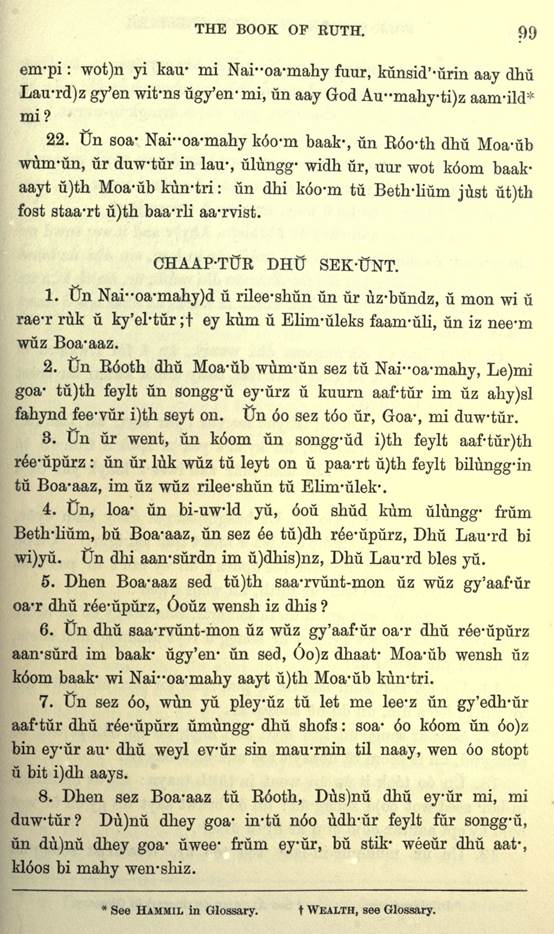
(delwedd C4413) (tudalen 099)
|
THE BOOK OF EUTH. 99
em-pi : wot)n yi kau- mi Nai--oa-mahy fuur, kunsid'-urin aay dhu Lau-rd)z
gy'en wit-ns ugy'en-mi, iin aay God Au--mahyti)z aam-ild* mi?
22. Un soa- Nai--oa-mahy k6o-m baak-, un B6o-th dhu Moa-ub wum-un, ur duwtur
in lair, uhingg- widh ur, uur wot k6om baak-aayt ii)th Moa-ub kun-tri : un
dhi k6o-m tu Beth-Hum just ut)th fost staa-rt u)th baa-rli aa-rvist.
CHAAP-TtJR DHU
1. Un Nai-oa-mahy)d u rilee-shun un ur uz-bundz, u mon wi u rae-r ruk u
ky'el-tur ;t ey kum u Elim-uleks faam-uli, un iz nee-m wuz Boa-aaz.
2. Un E6oth dhu Moa-ub wum-un sez tu Nai--oa-mahy, Le)mi goa- tu)th feylt un
songg-u eyurz u kuurn aaf-tur im uz ahy)sl fahynd fee-vur i)th seyt on. Un 60
sez t6o ur, Goa-, mi duwtur.
3. Un ur went, un k6om un songg-ud i)th feylt aaf-tur)th reViipurz : un ur
luk wuz tu leyt on u paa-rt u)th feylt bilungg-in tu Boa-aaz, im uz wuz
rilee-shun tu Elim-ulek-.
4. Un, loa- un bi-uwld yu, 6oii shud kum ulungg- Mm Beth-lium, bu Boa-aaz, un
sez ^e tu)dh r6e-upurz, Dhu Lau-rd bi wi)yu. Un dhi aan-surdn im u)dhis)nz,
Dhu Lau-rd bles yu.
5. Dhen Boa-aaz sed tu)th saa-rvunt-mon uz wuz gy'aaf-ur oa-r dhu reVupurz,
6ouz wensh iz dhis ?
6. Un dhu saa-rvunt-mon uz wuz gy'aaf-ur oa-r dhu ree-upurz aan-surd im baak-
ugy'en- un sed, 6o)z dhaat- Moa-ub wensh uz k6om baak- wi Nar-oa-mahy aayt
u)th Moa-ub kun-tri.
7. Un sez 60, wun yu pleyuz tu let me lee-z un gy'edh-ur aaf-tur dhu
reVupiirz umungg- dhu shofs : soa- 60 k6om un 6o)z bin eyur au- dhu weyl evur
sin mau-rnin til naay, wen 60 stopt u bit i)dh aays.
8. Dhen sez Boa-aaz tu B6oth, Dus)nu dhu eyur mi, mi duwtur? Dii)nu dhey goa-
in-tu n6o udh-ur feylt fur songg-u, un du)nu dhey goa- uwee* frum eyur, bu
stik- weeur dhu aat-, kloos bi mahy wen-shiz.
* See HAMMIL in Glossary. t WEALTH, see Glossary.
|
|
|
|
|

(delwedd C4414) (tudalen 100)
|
100
FOLK-SPEECH OF SOUTH CHESHIKE.
9. Ky'ee-p dhi eyn upu)th feylt uz dhai bin reyupin in,
un dhey goa- aaf-tur urn : aa)nur ah chaa-rjd dh)yung chaap-s uz dhi mun-)u
tuch dhi ? un wen dhaa)t thuu-rsti, goa- tu)th dringk-in-uurnz,* un dringk-
sum u wot th)yung chaap-s un drau-n.
10. Dhen 60 fau-d on ur fee's un buwd ur daayn tu)th graaynd, un 60 sed t6o
im, Aay iz it uz ahy)v fund fee-vur i yoa-r een, soa-uz yoa- shud taak-
noa-tis u mey, un mey u stree-njur ?
11. On Boa-aaz aan-surd ur u)dhis)n, Ahy)v aad it au- tuwd mi ubaayt au- uz
dhaa)z dun tu dhi mudh-ur-in-lau-, sin dhi uz-bund deyd : un aay dhaa)z left
dhi fee'dhur un dhi mudh'ur, un)th kiin'tri wee*ur dhaa wuz bau'rn, un bist
kumn tu foa'ks uz dhaanoa'd nuwt ubaayt ufoa-r.
12. Dhu Lau-rd rik-umpens dhi wuurk, un u ful riwaa-rd bi gy'en dhi bi dhu
Lau-rd God u Iz-riul, naay dhu)t kumn fur trust dhisel' un'dur iz wingz.
13. Dhen sez 60, Let mi fahynd fee-vur i yur seyt, mi Lau-rd : ky'ai-s yoa*)n
kum-furtid mi, im ky'ai-s yoa-)n spok-n fren-dli tu u p6our wurn-un, fur au-
ahy aam-)nur aan-iwee-z lahyk yur oa-n saa-rvuntwim-in.
14. Un Boa-aaz sed t6o ur, Ut baag-intahym dhey kum eyur, un aav sum u)th
bred, un dip dhi bit u mee*t i)dh aal-igur.f Un 60 sit ursel- daayn usahyd)n
dhu reVupurz ; un ey rau-t ur paa-rcht kuurn, un 60 et it, un aad- ur fil-th,
un went uwee-.
15. Un wen 60 wuz got-n up tu songg-u, Boa-aaz gy'en au-rdurz tu iz yung chaap-s,
sez ey, Let ur songg-u reyt urnungg- dhu shofs, un du)nu yai- skuwl ur :
16. Un let fau* sum aan-tlz u puu-rpus for-)ur, un leeuv um for-)ur tu lee-z
um, un du)nu snee-p ur.
17. Soa* ur songg-ud i)th feylt tun neyt, un 60 bumpt wot 60 songg-ud, un it
k6om tu ubaayt t6o miz-ur u baa-rli.
18. Un 60 t6ok it up un went in-tu)th taayn : un ur mudh-ur-in-lau- s^ed wot
6o)d songg-ud : un 60 bruwt aayt un gy'en ur wot 6o)d ky'ept aaf-tur 6o)d
et-n ur fil-th ursel-.
19. Un ur mudh-ur-ui-lau- sed t6o ur, Wee-ur)st songg-ud
Drinking-horns.
t See ALLEGAR (= vinegar) in Glossary.
|
|
|
|
|

(delwedd C4415) (tudalen 101)
|
THE BOOK OF EUTH. 101
tudee- ? we>ur)st bin wuu-rkin ? God bles dhu mon uz t6ok noa-tis on dhi.
On 60 tuwd ur mudh-ur-in-lau- 6o-ur 6o)d bin wuu-rkin widh, un sez 60, Dhu
monz nee-m uz ahy)v bin wuu-rkin wi tudee-iz Boa-aaz.
20. Un Nai--oa-mahy sed tu ur duwtur-in-lau-, Dhu Lau-rd bles im, ukos- ey
aa)nu gy'en oa-r iz ky'eyndnus tu)th wik- un tu)th jed. Un sez Nai--oa-mahy
t6o ur, Wey, th)mon)z neyur uky'in- t6o uz, won un ur neyurist rilee-shunz.
21. Un E6oth dhu Moa-ub wum-un sed, E6 sed t6o mi uz wel, Dhaa mun ky'ee-p
k!6os tu mahy yung chaap-s, tin dhi)n lugd au-mi aa-rvist tugy'edh-ur.
22. tin Nai--oa-mahy sed tu E6oth ur duwtur in lau-, It)s nob-ut reyt, mi
duwtur, fur dhey tu goa* aayt widh iz saa-rvunt-wim-in, soa- uz dhi mi)nu
leet on dhi in aan-i udh-ur feylt.
23. Soa- 60 kept k!6os bi Boa-aaziz wim-in dhun dhu fin-ishin-up u)th
baa-rli-aa-rvist un)th wee*ut-aa-rvist : un 60 livd wi ur mudh-ur-in-lau-.
CHAAP-TUE, DHU THUURD.
1. Dhen Nai- -Da-many ur mudh-ur-in-lau- sed t6o ur, Mi duwtur, shaa)nur ahy
16ok fur rest fo)dhi, soa* uz dhaa)mi bi wel of?
2. tin naay i)nu Boa-aaz u rilee-shun u aa-rz, im uz dhaa wuz widh iz
wen-shiz? Si)dhi, wensh, ey)z win-uin baa-rli tuneyt i)th thresh-infl6o-ur.
3. Soa' wesh dhi, un ahyl dhi yed, un gy'et dhi k!6o-uz on, un goa- daayn
tu)th fl6our : bu du)nu mai- dhisel- noa-n tu)th mon dhun ee)z dun ee-tin un
dringk-in.
4. Un it)l bey u)dhis)nz : wen ey lahyz daayn, dhaa mun taak-noa-tis u)th
plee-s weeur ey lahyz, un dhaa mun goa- in, un unkuvur iz feyt, un lahy dhi
daayn : un ey)l tel dhi wot dhaa mun doo.
5. Un 60 sed t6o ur, Au- uz yoa- teln mi, ahy)l d6o.
6. Un 60 went daayn tu)th fl6o-ur, un did jus-tumeyt wot ur mudh-ur in lau-
ud tuwd ur.
7. Un wen Boa-aaz ud et-n un drungk-n, un iz aa-rt wuz mer-i,
|
|
|
|
|

(delwedd C4416) (tudalen 102)
|
102
FOLK-SPEECH OF SOUTH CHESHIEE.
ey went far lahy imsel- daayn ut dhu end u)th kuurn-ruk,
un 60 k6om jen-tli, un unkuvurd iz feyt, un ley ur daayn.
8. tin, iiz it aap-nt, i)th mid-1 u)th neyt, dhu mon wuz frik-nt un tuurnt
imsel- raaynd, un dhe"eur dhur wuz u wunrun ley ut iz feyt.
9. Un ey sed, 6ou)t dhey ? Un 60 spok baak- t6o im, Ahy)m R6oth yur saa-rvunt
: soa- spree-d aayt yur skuurt oa-r yur saa-rvunt : fur yoa)m u neyur
rilee-shun.
10. tJn ey sed, Dhu Lau-rd bles dhi, mi duwtur : fur dhaa)z shoa-nt m6our
ky'eyndnus ut dhu laat'-ur end til ut)th fost staa-rt, ky'ai-s dhu aas*)nu
gon aaf-t'ur yung men, ee-dhur p6our ur rich-.
11. Un naay, mi duwtur, du)nu bi frik-nt : ah)l d6o fo)dhi au-uz dhu waan-ts
: fur au-)th foa-ks i dhis taayn noa-n dhi fur u on-ist wunrun.
12. Un naay, it)s tr6o unuf- ut aay ahy)m dhi ne"eur rilee-shun : aa-vur
fur au- dhaat- dhur)z u nee-urur rilee-shun til mey.
13. Stop weyur dhu aat- fur tuneyt, un wi)sn sey i)dhu mau-rnin, iv ee)l d6o
dhu paa-rt uv u rilee-shun bahy dhi, wel un gud, let im doo dhu rilee-shunz
paa-rt : bur iv ey wu)nu d6o dhu paa-rt uv u rilee-shun t6o dhi, dhen ahy)l
d6o dhu paa-rt uv u rilee-shun t6o dhi, uz* sh6our uz God Aulmahyti livz in
evn : lahy dhi daayn dhun mau-rnin.
14. Un 60 ley ut iz feyt dhun mau-rnin : un 60 got up ufoa-r yu kud tel won
mon Mm unudh-ur. Un sez e"e, Du)nu let it bi noa-n ut aay u wum-un k6om
in-tu)th floo-ur.
15. tin ey sed uz wel, Bringg- dhu vee-1 uz dhaa)z got-n on, un uwd it up. Un
wen 60 eld it up, ey miz-urd aayt sik-s miz-urz u baa-rli, un lee-d it
utop-)n ur : un 60 went uwee* in-tu)th taayn.
16. Un wen 60 k6om tu ur mudh-ur-in-lau-, 60 sez t6o ur, 6our aat- dhu, mi
duwtur ? tin 60 tuwd ur au- uz dhu mon ud diin bahy ur.
17. Un sez 60, Dheyz sik-s miz-urz u baa-rli ey gy'en mi : fur sez ey tu mey,
Du)nu goa- baak- em-pi tu dhi mudh-ur in lau*.
18. Dhen 60 sez, Ky'ee-p skwaat-, mi duwtur, tin dhu noa-z aay)th maat-ur)!
tuurn aayt : fur)dh mon wu)nu bi kwai-ut dhun ey)z put it reyt dhis ver-i
dee-.
* This [uz], before [sh6our], would frequently become [ush] by assimilation.
|
|
|
|
|

(delwedd C4417) (tudalen 103)
|
THE BOOK OF KUTH. 103
CHAAP-TtJR DHU FOA-RT.
1. Dhen Boa-aaz went up tu)th gy'ee-t, un sit imsel- daayn dhe"e-ur : un
dheeur, dhu rilee-shun wot ey)d spok-n ubaayt k6om paas-t : un ey sez t6o im,
sez ey, Ey, sich- un sich- u won ! tuurn u won sahyd, un sit yu daayn eyur.
Soa- ey tuurnt u won sahyd, un sit im daayn.
2. Un e"e t6ok ten uwd men aayt u)th taayn, un sez 6e t6o urn, Sit yi
daayn e"eur : un dhai sit umsel-z daayn.
8. Un ey sed tu)th rilee-shun, Nai--oa-mahy, uur uz iz Imnrun baak- ugy'en-
aayt u)th Moa-ub kun-tri)z sel-in u bit u graaynd, uz billing- d tu aa-r
brudh-ur Elim-ulek.
4. Un ah bithuwt misel- tu gi yu waa-rnin ubaayt it, soa)z yoa- mid bahy it
ufoa-r)th taayn-foa-ks, un ufoa-r dh)uwd foa-ks u mahy faam-uli. Iv yoa*
waan-tn rideym it, rideym it : bur iv yoa-dun-)u waan-t rideym it, dhen yoa-
mun tel mi, un ah)sl noa-: fur dhur)z n6o-bri tu rideym it bu yoa-: un ahy
kum aaf-tur yoa-. Un sez ey, Ahy)l rideym it.
5. Dhen sez Boa-aaz, See-m dee- uz yoa bahyn)th feylt of Nai--oa-mahyz
aan-dz, yoa)n aa)tu bahy it of E6oth, th)Moa-ub wurn-un, weyf tu im uz iz
jed, tu ree-z up th)jed monz nee-m upon- iz iner-ituns.
6. Un)th rilee-shun sed, Ahy kon-)u rideym it fur misel', els ahy)shl speyl
mi oa-n fau-rtin: bu yoa- rideym mahy reyt fur yursel- : fur ahy kon-)u
rideym it.
7. Naay dhis wuz dhu wee- i dee-z gon bahy in Iz-riul ubaayt rideymin un
ubaayt swop'in, fur klin-sh evrithin: u mon pood iz shoo of un gy'en- it tu
iz nee-bur: un dhis set-It u baa-rgin in Iz-riul.
8. Soa-)th rilee-shun sez tu Boa-aaz, Bahy it fur yursel-. Soa-ey of widh iz
sh6o.
9. Un Boa-aaz sed tu)dh uwd men un tu au-)th foa-ks, Yai bin wit-ns dhis
dee', ut aay ahy)v buwt au- uz wuz Elim-uleks, un au-uz wuz Chil-yunz un
Maa-lunz, of Nai'-oa-mahy.
10. Un m6our)tn dhaat 1 , ahy)v buwt E6oth dhu Moa-ub wurn-un, uur uz wuz
weyf tu Maa-lun, tu bey mahy weyf, tu ree-z up dhu jed
|
|
|
|
|
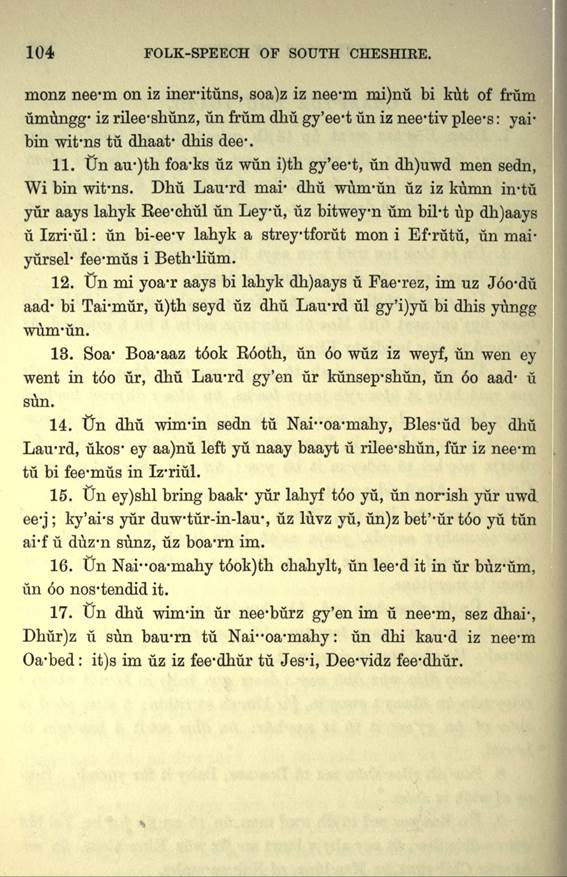
(delwedd C4418) (tudalen 104)
|
104 FOLK-SPEECH OF SOUTH CHESHIRE.
monz nee'm on iz iner-ituns, soa)z iz nee-m mi)nu bi kut of Mm umungg- iz
rilee-shunz, un Mm dhu gy'ee-t un iz nee-tiv plee-s : yai-bin wit-ns tu
dhaat- dhis dee-.
11. Un au-)th foa-ks uz wun i)th gy'ee-t, un dh)uwd men sedn, Wi bin wit-ns.
Dhu Lau-rd mai- dhu wunrun uz iz kumn in-tu yur aays lahyk Kee-chul un Leyu,
uz bitwey-n urn biH up dh)aays u Izri-ul : un bi-ee-v lahyk a streytforut mon
i Ef-rutu, un mai-yursel- fee-mus i Beth-Hum.
12. Un mi yoa-r aays bi lahyk dh)aays u Fae-rez, im uz J6o-du aad- bi
Tai-mur, u)th seyd uz dhu Lau-rd ul gy'i)yu bi dhis yungg wum-un.
18. Soa- Boa-aaz t6ok E6oth, un 60 wuz iz weyf, un wen ey went in t6o ur, dhu
Lau-rd gy'en ur kunsep-shun, un 60 aad- u sun.
14. tin dhu wim-in sedn tu Nar-oa-mahy, Bles-ud bey dhu Lau-rd, ukos- ey
aa)nu left yu naay baayt u rilee-shun, fur iz nee-m tu bi fee-mus in Iz-riul.
15. Un ey)shl bring baak- yur lahyf t6o yu, un norish yur uwd. ee*j ; ky'ai-s
yur duwtur-in-lau-, uz luvz yu, un)z bet'-ur t6o yu tun ai-f u duz-n sunz, uz
boa-rn im.
16. Un Nai--oa-mahy t6ok)th chahylt, im lee-d it in ur buz-um, un 60
nos-tendid it.
17. Un dhu wim-in ur nee-burz gy'en im u nee-m, sez dhar, Dhur)z u sun bau-rn
tu Nai'-oa-mahy : un dhi kau-d iz nee-m Oa-bed : it)s im uz iz fee-dhur tu
Jes-i, Dee-vidz fee-dhur.
|
|
|
|
|

(delwedd C4419) (tudalen 105)
|
GLOSSAKY.
*is prefixed to such words as are also used in literary
English. Annandale's Dictionary has generally been taken as the standard.
t is prefixed to those words which are also given in the Glossaries of
Wilbraham, Leigh, or Holland.
Aback 0' [ubaak- u], prep. f(l) behind. “Squat aback o'
th' hedge “ [Skwaat- ubaak- u)dh ej].
(2) beyond, on the further side of. "Aback o 1 Nantweych" [ubaak- u
Naantweych].
To “get aback o' “some one is to get an advantage over him, to "turn his
rear." “Owd Dan tells some awful lies, bu' yo conna ger aback on
him" [Uwd Daan- telz sum au-ful lahyz, bu yu kon-)u gy'er ubaak-)n im],
i.e., convict him of falsehood.
The double form "aback o' behint" [bihin-t] is used as an adverb.
*f Abide [ubahy-d] , v.a. to endure, suffer patiently. “It's noo use, we shan
ha' to abide it" [It)s noo y6os, wi)shun aa)tu ubahyd
itj.
A-bones [uboa-nz], adv. To "faw a-bones o' “anyone is to assail him,
like the vulgar "drop upon." A gentleman who had sharply taken to
task a disturber of a political meeting was said to "faw a-bones on
him" [fau- uboa-nz on im]. The literal and original meaning of the
phrase is probably “to fall on the bones of." Cp. "atop" = on
the top, and other words of similar formation.
t Above a bit [ubuv)u bit], adv. excessively. Often paraphrased as “moor t'n
a little” [moour)tn u lit'l].
|
|
|
|
|
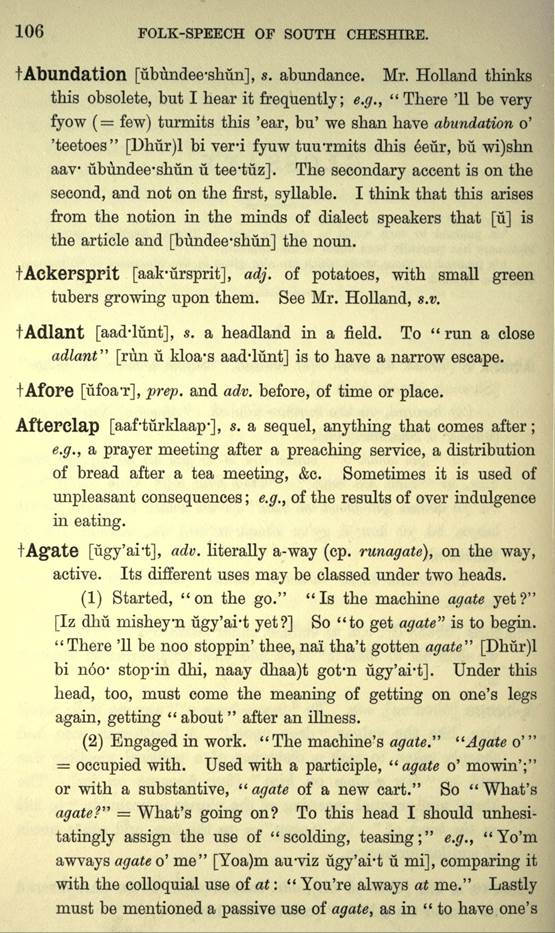
(delwedd C4420) (tudalen 106)
|
106 FOLK-SPEECH OF SOUTH CHESHIRE.
tAbundation [ubundee-shun], s. abundance. Mr. Holland thinks this obsolete,
but I hear it frequently; e.g., “There '11 be very fyow ( few) turmits this
'ear, bu' we shan have abundation o' 'teetoes" [Dhur)l bi ver-i fyuw
tuu-rmits dhis eeur, bu wi)shn aav ubundee-shun u tee'tuz]. The secondary
accent is on the second, and not on the first, syllable. I think that this
arises from the notion in the minds of dialect speakers that [u] is the
article and [bundee-shun] the noun.
tAckersprit [aak-ursprit], adj. of potatoes, with small green tubers growing
upon them. See Mr. Holland, s.v.
tAdlant [aad-lunt], s. a headland in a field. To "run a close
adlant" [run u kloa-s aad'lunt] is to have a narrow escape.
t Afore [ufoa'r], prep, and adv. before, of time or place.
Afterelap [aaf-turklaap-], s. a sequel, anything that comes after; e.g., a
prayer meeting after a preaching service, a distribution of bread after a tea
meeting, &c. Sometimes it is used of unpleasant consequences ; e.g., of
the results of over indulgence in eating.
tAg'ate [ugy'ai't], adv. literaUy a-way (cp. runagate), on the way, active.
Its different uses may be classed under two heads.
(1) Started, "on the go." "Is the machine agate yet?" [Iz
dhu misheyn ugy'ai-t yet?] So "to get agate" is to begin.
"There '11 be noo stoppin' thee, nai tha't gotten agate" [Dhur)l bi
noo- stop-in dhi, naay dhaa)t got-n ugy'ai-t]. Under this head, too, must
come the meaning of getting on one's legs again, getting “about “after an
illness.
(2) Engaged in work. "The machine's agate." "Agate o'" =
occupied with. Used with a participle, "agate o' mowin';" or with a
substantive, “agate of a new cart." So “What's agate?" = What's
going on? To this head I should unhesitatingly assign the use of
"scolding, teasing;" e.g., "Yo'm awvays agate o' me"
[Yoa)m au-viz ugy'ai-t u mi], comparing it with the colloquial use of at :
“You're always at me." Lastly must be mentioned a passive use of agate,
as in "to have one's
|
|
|
|
|

(delwedd C4421) (tudalen 107)
|
GLOSSARY. 107
cups agate," i.e., in use: "I've gotten my hee (hay) agate
yet" [Ahy)v got-n mi ee- ugy'ait yet] that is, about, in hand, going on.
tAgen [ugy'en ], prep. (I) against. "I'll see (= say) nowt agen that“
[Ahy)l see- nuwt ugy'en dhaat-].
(2) close to. “We liven agen Wrixham bridge” [Wi livn ugy'en Bik-sum brij-].
(3) before, on the approach of. “My leg's auvay woss agen reen (rain)” [Mahy
leg)z au-vi wos ugy'en' ree-n].
(4) by, of time. "Yo'n get it done agen the wik-end" [Yoa-)n gy'et
it dun ugy'en- dhu wiken-d].
Agen [ugy'en-], conj. by the time that. "I shall be theer agen yo bin
started" [Ahy)shl bi dhee'ur ugy'en- yoa- bin staaitid]. Compare AGEN,
prep. (3) and (4).
Agen [ugy'en-] adv. “To an' agen" [T6o un ugy'en-] is equivalent to the
standard “to and/ro." Fro, as a Danish word, is not used.
Aikle [ai-kl], v.n. to put on clothes. WEENBUKY. “Ye mun begin an' aikle
nai" [Yi)mun bigy'nr un ai-kl naay] was the signal given by an old dame
who kept a school near Wrenbury that lessons were over for the day. ?
obsolete.
tAim [ai-m or ee-m], s. conjecture, idea. "I shall have a better like
aim, if yo'n tell me yur price" [Ahyjshl aav u bet-ur lahyk ai-m, iv
yoa-)n tel mi yur prahys].
Air [ae-r], s. the warm atmosphere surrounding a fire. Only in the common
phrase "within air o' the fire" = within range of its warmth. “Come
thy wees (ways) within air o'th' fire, fur raly tha looks heef starved
jeth" = half frozen to death. [Kum dhi wee-z widhin- ae-r u)th fahyur,
fur rae-ley dhu 16oks ee*f staa-rft jeth].
tAitch [ai-ch], s. a sudden access of pain in an intermittent disorder.
"I've had some despert bad feenty (= fainting) aitches leetwheiles” (=
lately) [Ahy)v aad- sum des-purt baad-fee-nti ai-chiz lee-tweylz]. “Hot
aitches" are flushings of heat.
|
|
|
|
|
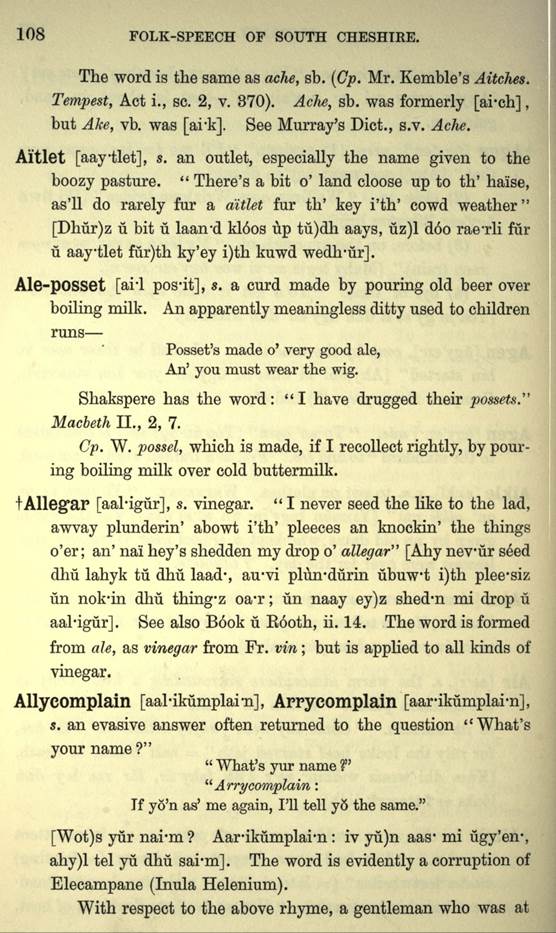
(delwedd C4422) (tudalen 108)
|
)8 FOLK-SPEECH OF SOUTH CHESHIRE.
The word is the same as ache, sb. (Cp. Mr. Kemble's Aitches. Tempest, Act i.,
sc. 2, v. 370). Ache, sb. was formerly [arch] , but Ake, vb. was [ark]. See
Murray's Diet., s.v. Ache.
Aitlet [aaytlet], s. an outlet, especially the name given to the boozy
pasture. “There's a bit o' land cloose up to th' haise, as'll do rarely fur a
aitlet fur th' key i'th' cowd weather" [Dhur)z u bit u laan-d k!6os up
tu)dh aays, uz)l d6o rae-rli fur u aaytlet fur)th ky'ey i)th kuwd wedlrur].
Ale-posset [ai-1 pos-it], s. a curd made by pouring old beer over boiling
milk. An apparently meaningless ditty used to children
runs
Posset's made o' very good ale, An' you must wear the wig.
Shakspere has the word: "I have drugged their possets." Macbeth
II., 2, 7.
Cp. W. possel, which is made, if I recollect rightly, by pouring boiling milk
over cold buttermilk.
tAlleg'ar [aaHgur], s. vinegar. “I never seed the like to the lad, awvay
plunderin' abowt i'th' pleeces an knockin' the things o'er; an' nai hey's
shedden my drop o' allegar" [Ahy nevur seed dhu lahyk tu dhu laad-,
au-vi plun-durin ubuwt i)th plee-siz un nok-in dhu thing-z oa-r ; un naay
ey)z shed-n mi drop u aal-igur]. See also Book u E6oth, ii. 14. The word is
formed from ale, as vinegar from Fr. vin ; but is applied to all kinds of
vinegar.
Allyeomplain [aaHkumplai-n], Arryeomplain [aarikumplai-n], s. an evasive
answer often returned to the question "What's
your name ?"
" What's yur name ?" “Arryeomplain : If yo'n as' me again, I'll
tell yo the same."
[Wot)s yur nai-m ? Aar-ikumplai-n : iv yu)n aas- mi ugy'en-, ahy)l tel yu dhu
sai-m]. The word is evidently a corruption of Elecampane (Inula Helenium).
With respect to the above rhyme, a gentleman who was at
|
|
|
|
|
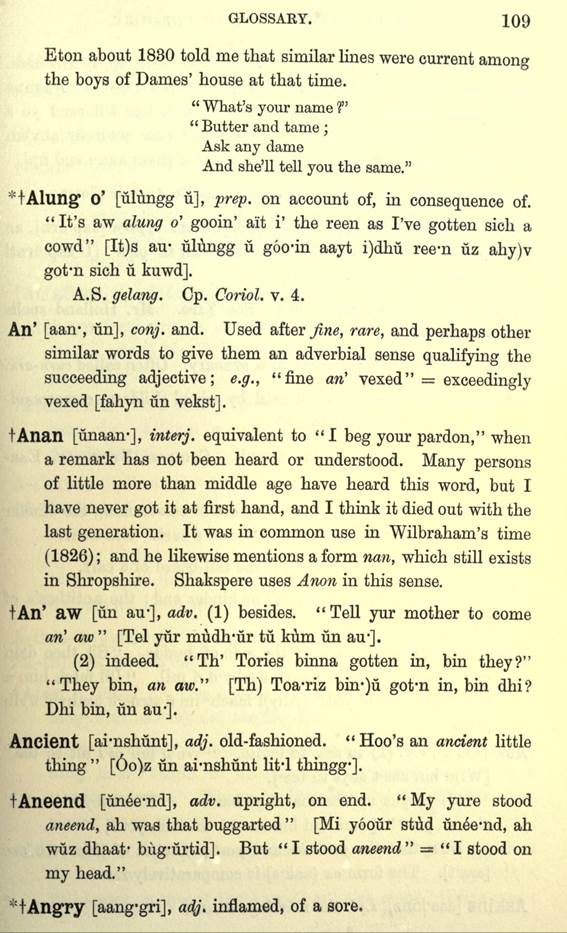
(delwedd C4423) (tudalen 109)
|
GLOSSARY. 109
Eton about 1830 told me that similar lines were current among the boys of
Dames' house at that time.
" What's your name ?"
" Butter and tame ; Ask any dame And she'll tell you the same."
*t Ailing 0' [ulungg u], prep, on account of, in consequence of. "It's
aw alung o' gooin' ait i' the reen as I've gotten sich a cowd" [It)s au-
ulungg u goo-in aayt i)dhu ree-n uz ahy)v got-n sich u kuwd].
A.S. gelang. Cp. Coriol. v. 4.
An' [aan-, un], conj. and. Used after fine, rare, and perhaps other similar
words to give them an adverbial sense qualifying the succeeding adjective;
e.g., "fine ari vexed" = exceedingly vexed [fahyn un vekst].
tAnan [unaan-], inter j. equivalent to "I beg your pardon," when a
remark has not been heard or understood. Many persons of little more than
middle age have heard this word, but I have never got it at first hand, and I
think it died out with the last generation. It was in common use in
Wilbraham's time (1826) ; and he likewise mentions a form nan, which still
exists in Shropshire. Shakspere uses Anon in this sense.
tAn' aw [un au-], adv. (1) besides. "Tell yur mother to come an' aw”
[Tel yur mudh-ur tu kum un au*].
(2) indeed. "Th' Tories binna gotten in, bin they?" "They bin,
an aw." [Th) Toa-riz bin-)u got-n in, bin dhi? Dhi bin, un au-].
Ancient [ai-nshunt], adj. old-fashioned. "Hoo's an ancient little thing”
[6o)z un ai-nshunt lit-1 thingg-].
t Aneend [une>nd], adv. upright, on end. "My yure stood aneend, ah
was that buggarted” [Mi yoour stud uneVnd, ah wuz dhaat- bug-urtid]. But “I
stood aneend “= “I stood on my head."
*t Angry [aang-gri], adj. inflamed, of a sore,
|
|
|
|
|

(delwedd C4424) (tudalen 110)
|
110 FOLK-SPEECH OF SOUTH CHESHIEE.
Anny end up [aairi end up], adv. whatever turns up, in any case, at any rate.
So anny road up [aan-i roa-d up]. “I dunna know whether I con come mysel or
nat, bur I'll send ye a chem (team) anny end up" [Ahy du)nu noa* wedh-ur
ahy)kn kum misel- ur naat', bur ahy)l send yi u chem aan-i end up].
Another Gis. See Gis. Wilbraham spells Another Guest.
Apperntle [aap-urntl], s. an apronful : from appern [aap-urn], an apron. “A
apperntle o' 'tatoe-pillin's for th' pigs" [U aap-urntl u tai'tu pil-inz
fur)th pigz].
tApS [aap-s, aa-ps], inter j. fie ! See YAPS. Mr. Holland spells Apse or
Arpse.
Ark [aa-rk], s. a compartment in a granary. Often called curn-ark.
Arlies [aa-rliz], inter j. a word used by school children, corresponding to
the common “Pax !"
tArmhole [aa-rmoa-1], s. the armpit. Compare NECKHOLE, EARHOLE.
Arsebond [aa-rsbund], s. a strong piece of oak forming the hinder extremity
of the foundation or bed of a cart. See CART.
tArse-bOOard [aa-rs b6o-urd], s. the tail-board of a cart.
t Arse-end [aa*rs end], s. the tail or hinder end : the antithesis of fore-
end.
Aside J [usahyd u], prep, at the side of, beside. “Sit thee dain aside o'
me" [Sit dhi daayn usahyd u mi]. “I'll fatch him a stroke aside o' th'
yed" [Ahy)l faaclr im u stroa'k usahyd u)dh yed].
Ask [aas-k], v.a. (1) to ask, to invite. “We'n bin as't ait to tea"
[Wi)n bin aas't aayt tu tee'].
(2) to put up the marriage banns. “Han they bin as't i' church yet ?"
[Aan- dhi bin aas-t i chuurch yet ?]
Note that the preterite and past participle of this verb are [aas't]. The
form ax [aak-s] is comparatively rare.
Askins [aas-kinz], s.pl. the marriage banns.
|
|
|
|
|
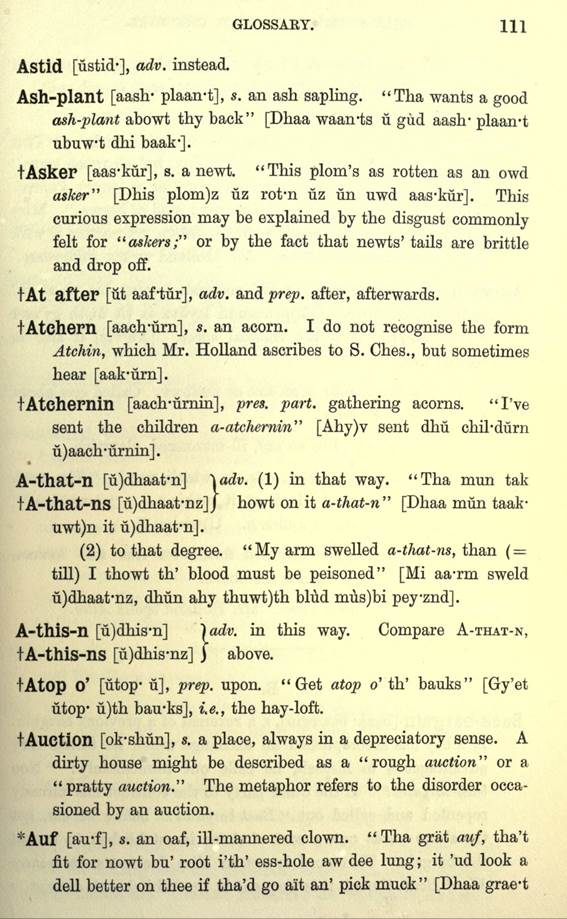
(delwedd C4425) (tudalen 111)
|
GLOSSARY. HI
Astid [ustid-], adv. instead.
Ash-plant [aash- plaan-t], s. an ash sapling. "Tha wants a good
ash-plant abowt thy back" [Dhaa waan-ts u gud aash- plaan-t ubuw-t dhi
baak-].
tAsker [aas-kur], s. a newt. "This plom's as rotten as an owd
asker" [Dhis plom)z uz rot-n uz iin uwd aas-kur]. This curious
expression may be explained by the disgust commonly felt for
"askers;" or by the fact that newts' tails are brittle and drop
off.
I At after [ut aaf-tur], adv. and. prep, after, afterwards.
tAtehern [aach-urn], s. an acorn. I do not recognise the form Atchin, which
Mr. Holland ascribes to S. Ches., but sometimes hear [aak-urn].
fAtehernin [aach-umin], pres. part, gathering acorns. "I've sent the
children a-atchernin" [Ahy)v sent dhu chil-durn u)aach-urnin].
A-that-n [u)dhaat-n] *\adv. (1) in that way. "Tha mun tak tA-that-ns
[u)dhaat-nz]J howt on it a-that-n" [Dhaa mun taak-uwt)n it u)dhaat-n].
(2) to that degree. "My arm swelled a-that-ns, than ( = till) I thowt
th' blood must be peisoned" [Mi aa-rm sweld u)dhaat-nz, dhun ahy
thuwt)th blud mus)bi peyznd].
A-this-n [u)dhis-n] ) adv. in this way. Compare A-THAT-N, tA-this-ns
[u)dhis-nz] j above.
tAtOp ? [utop- u], prep. upon. "Get atop o' th' bauks" [Gy'et utop-
u)th bau-ks], i.e., the hay-loft.
t Auction [ok-shun], s. a place, always in a depreciatory sense. A dirty
house might be described as a "rough auction" or a “pratty
auction." The metaphor refers to the disorder occasioned by an auction.
*Auf [airf], s. an oaf, ill-mannered clown. "Tha grat auf, tha't fit for
nowt bu' root i'th' ess-hole aw dee lung ; it 'ud look a dell better on thee
if tha'd go ait an' pick muck" [Dhaa grae-t
|
|
|
|
|
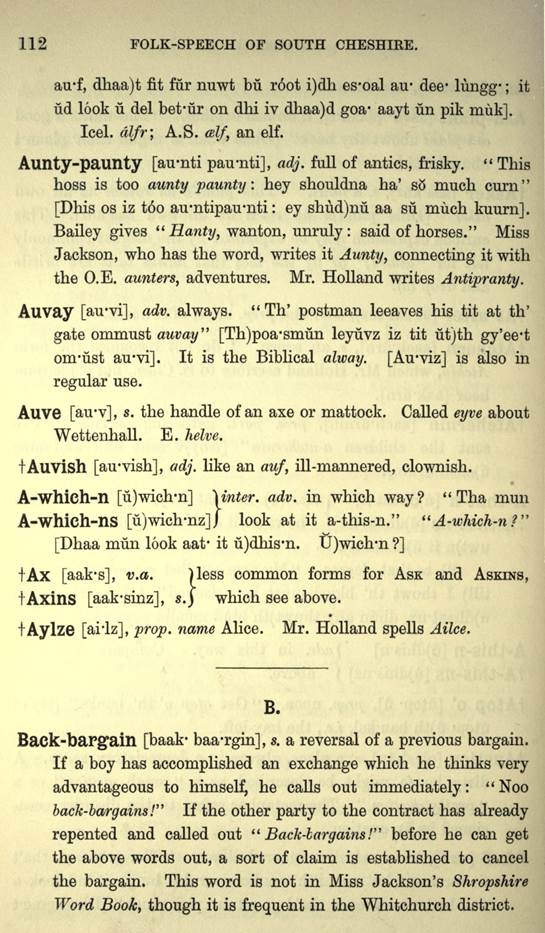
(delwedd C4426) (tudalen 112)
|
FOLK-SPEECH OF SOUTH CHESHIKE.
au-f, dhaa)t fit fur nuwt bu r6ot i)dh es-oal au- dee- lungg- ; it ud look u
del bet-ur on dhi iv dhaa)d goa* aayt un pik muk]. Icel. dlfr; A.S. alf, an
elf.
Aunty-paunty [au-nti pau-nti], adj. full of antics, frisky. “This hoss is too
aunty paunty : hey shouldna ha' s5 much curn" [Dhis os iz t6o
au*ntipau'nti : ey shud)nu aa su much kuurn]. Bailey gives “Hanty, wanton, unruly:
said of horses." Miss Jackson, who has the word, writes it Aunty,
connecting it with the O.E. aunters, adventures. Mr. Holland writes
Antipranty.
Auvay [au-vi], adv. always. “Th' postman leeaves his tit at th' gate ommust
auvay" [Th)poa-smun leyuvz iz tit utjth gy'ee-t onrust au'vi]. It is the
Biblical alway. [Au-viz] is also in regular use.
Auve [au-v], s. the handle of an axe or mattock. Called eyve about
Wettenhall. E. helve.
tAuvish [au-vish], adj. like an auf, ill-mannered, clownish.
A-which-n [u)wich-n] \inter. adv. in which way ? “Tha mun A-which-nS
[u)wich-nz]/ look at it a-this-n." "A-which-n ?" [Dhaa mun
look aat f it u)dhis*n. U)wich'n ?]
tAx [aak-s], v.a. )less common forms for ASK and ASKINS, tAxins [aak-sinz],
s.j which see above.
tAylze [ai'lz], prop, name Alice. Mr. Holland spells Ailce.
B.
Back-bargain [baak- baa-rgin], s. a reversal of a previous bargain. If a boy
has accomplished an exchange which he thinks very advantageous to himself, he
calls out immediately: “Noo back-bargains!" If the other party to the
contract has already repented and called out "Back-bargains!"
before he can get the above words out, a sort of claim is established to
cancel the bargain. This word is not in Miss Jackson's Shropshire Word Book,
though it is frequent in the Whitchurch district.
|
|
|
|
|
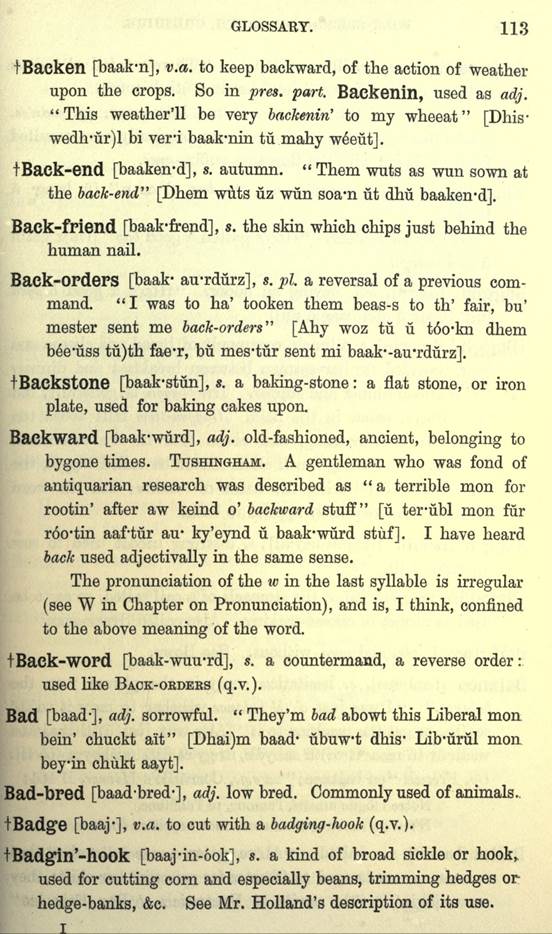
(delwedd C4427) (tudalen 113)
|
GLOSSARY. 113
tBacken [baak-n], v.a. to keep backward, of the action of weather upon the
crops. So in pres. part. Baekenin, used as adj. "This weather '11 be
very backenin' to my wheeat" [DmV wedh-ur)! bi veri baak-nin tu mahy
we"eut].
tBack-end [baaken-d], s. autumn. “Them wuts as wun sown at the back-end"
[Dhem wuts uz wun soa-n ut dhu baaken-d].
Back-friend [baak-frend], s. the skin which chips just behind the human nail.
Back-orders [baak- au-rdurz], s. pi a reversal of a previous command. "I
was to ha' tooken them beas-s to th' fair, bu' mester sent me
back-orders" [Ahy woz tu u t6o*kn dhem bee-uss tu)th fae-r, bu mes-tur
sent mi baak'-au-rdurz].
tBackstone [baak-stun], *. a baking- stone : a flat stone, or iron plate,
used for baking cakes upon.
Backward [baak-wurd], adj. old-fashioned, ancient, belonging to bygone times.
TUSHINGHAM. A gentleman who was fond of antiquarian research was described as
“a terrible mon for rootin' after aw keind o' backward stuff" [u terubl
mon fur r6o'tin aaf'tur au- ky'eynd u baak-wiird stiif]. I have heard back
used adjectivally in the same sense.
The pronunciation of the w in the last syllable is irregular (see W in
Chapter on Pronunciation), and is, I think, confined to the above meaning of
the word.
i Back- word [baak-wmrrd], s. a countermand, a reverse order: used like
BACK-ORDERS (q.v.).
Bad [baad-], adj. sorrowful. “They'm bad abowt this Liberal mon bein' chuckt
ait" [Dhai)m baad* ubuwt dhis- Lib-urul mon beyin chukt aayt].
Bad-bred [baad-bred-], adj. low bred. Commonly used of animals. tBadge
[baaj-], v.a. to cut with a badging-hook (q.v.).
tBadgin'-hook [baaj-in-6ok], s. a kind of broad sickle or hook,, used for
cutting com and especially beans, trimming hedges or hedge-banks, &c. See
Mr. Holland's description of its use. I
|
|
|
|
|
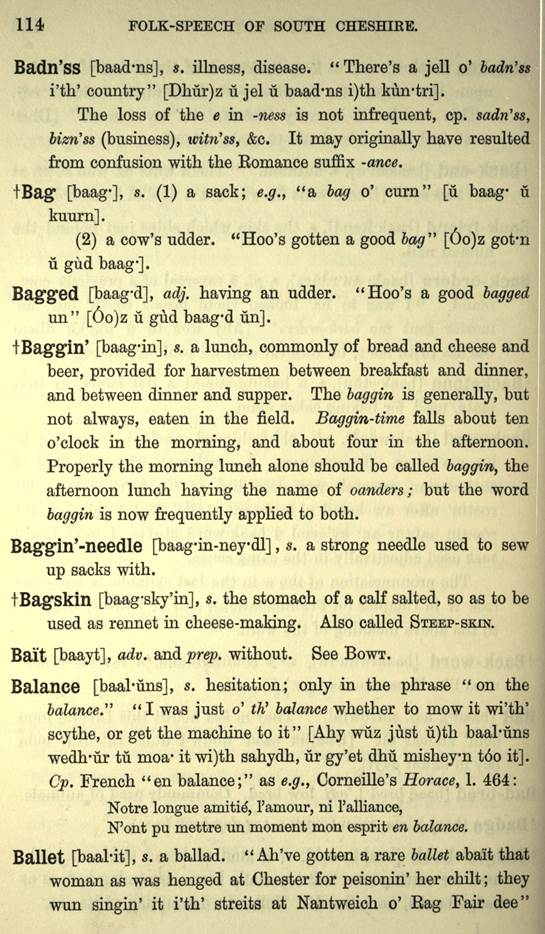
(delwedd C4428) (tudalen 114)
|
114 FOLK-SPEECH OF SOUTH CHESHIRE.
Badn'ss [baad-ns], s. illness, disease. “There's a jell o' badn'ss i'th'
country" [Dhur)z ii jel u baad-ns i)th kiin-tri].
The loss of the e in -ness is not infrequent, cp. sadn'ss, bizn'ss
(business), ivitn'ss, &c. It may originally have resulted from confusion
with the Romance suffix -ance.
IBag [baag-], s. (1) a sack; e.g., "a bag o' curn" [u baag- u
kuurn].
(2) a cow's udder. "Hoo's gotten a good bag" [6o)z got-n u gud baag-].
Bagged [baag-d], adj. having an udder. “Hoo's a good bagged un" [6o)z u
gud baag-d un].
f Baggin' [baag-in], s. a lunch, commonly of bread and cheese and beer,
provided for harvestmen between breakfast and dinner, and between dinner and
supper. The baggin is generally, but not always, eaten in the field.
Baggin-time falls about ten o'clock in the morning, and about four in the
afternoon. Properly the morning lunch alone should be called baggin, the
afternoon lunch having the name of oanders; but the word baggin is now
frequently applied to both.
Baggin'-needle [baag-in-neydl] , s. a strong needle used to sew
up sacks with. I Bagskin [baag-sky'in], s. the stomach of a calf salted, so
as to be
used as rennet in cheese-making. Also called STEEP-SKIN.
Bait [baayt], adv. and^rep. without. See BOWT.
Balance [baal-uns], s. hesitation; only in the phrase "on the
balance." “I was just o' itt balance whether to mow it wi'th' scythe, or
get the machine to it" [Ahy wuz just u)th baal-uns wedh-ur tu moa- it
wi)th sahydh, ur gy'et dhu misheyn t6o it]. Cp. French "en
balance;" as e.g., Corneille's Horace, 1. 464:
Notre longue amiti, 1'amour, ni 1'alliance,
N'ont pu mettre un moment mon esprit en balance.
Ballet [baal-it], s. a ballad. "Ah've gotten a rare ballet abait that
woman as was henged at Chester for peisonin' her chilt ; they wun singin' it
i'th' streits at Nantweich o' Rag Fair dee"
|
|
|
|
|
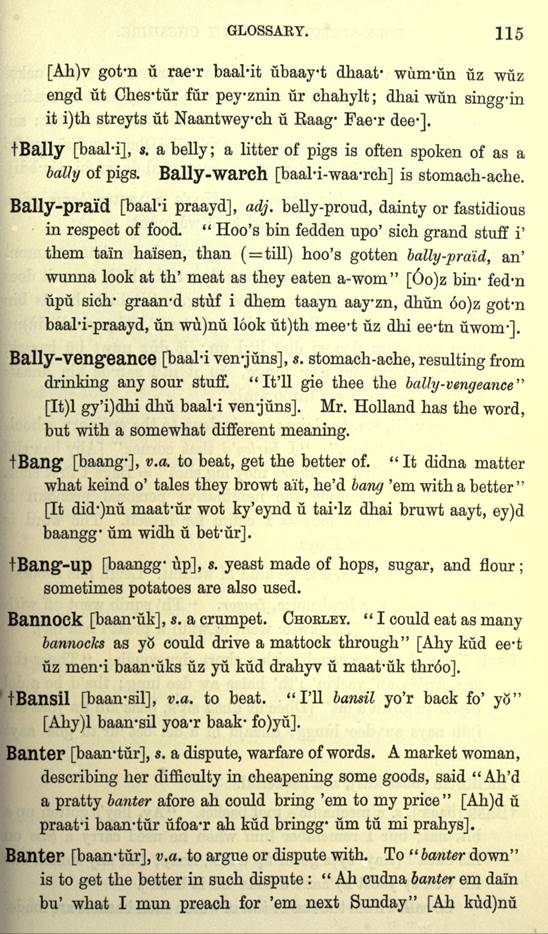
(delwedd C4429) (tudalen 115)
|
GLOSSARY. 115
[Ah)v got-n u rae-r baal-it ubaayt dhaat- wunrun uz wuz engd ut Ches-tur fur
pey znin ur chahylt ; dhai wun singg-in it i)th streyts ut Naantweych u Raag-
Fae-r dee-].
tBally [baal-i], s. a belly; a litter of pigs is often spoken of as a bally
of pigs. Bally- warch [baal-i-waa-rch] is stomach-ache.
Bally-praid [baal-i praayd], adj. belly-proud, dainty or fastidious in
respect of food. “Hoo's bin fedden upo' sich grand stuff i' them tain haisen,
than (=till) hoo's gotten bally-pra'id, an' wunna look at th' meat as they
eaten a- worn" [6o)z bin- fed-n upu sich- graan-d stuf i dhem taayn
aayzn, dhun 6o)z got-n baal-i-praayd, un wu)nu look ut)th mee-t uz dhi ee-tn
uworn-].
Bally- vengeance [baal-i ven-juns], s. stomach-ache, resulting from drinking
any sour stuff. "It'll gie thee the bally-vengeance" [It)l gy'i)dhi
dhu baal-i venjuns]. Mr. Holland has the word, but with a somewhat different
meaning.
{Bang [baang-], v.a. to beat, get the better of. "It didna matter what
keind o' tales they browt a'it, he'd bang 'em with a better" [It did-)nu
maat-ur wot ky'eynd u tai-lz dhai bruwt aayt, ey)d baangg- um widh u bet'ur].
{Bang-up [baangg- up], s. yeast made of hops, sugar, and flour; sometimes
potatoes are also used.
Bannock [baan-uk], s. a crumpet. CHOELEY. “I could eat as many bannocks as y5
could drive a mattock through" [Ahy kud ee-t uz men-i baan-uks uz yu kud
drahyv u maat-uk thr6o].
tBansil [baan-sil], v.a. to beat. "I'll bansil yo'r back fo' y"
[Ahy)l baan-sil yoa-r baak- fo)yu].
Banter [baan-tur], s. a dispute, warfare of words. A market woman, describing
her difficulty in cheapening some goods, said "Ah'd a pratty banter
afore ah could bring 'em to my price" [Ah)d u praat-i baan-tur ufoa-r ah
kud bringg* um tu mi prahys].
BanteP [baan-tur], v.a. to argue or dispute with. To “banter down" is to
get the better in such dispute : “Ah cudna banter em dain bu' what I mun
preach for 'em next Sunday" [Ah kud)nu
|
|
|
|
|
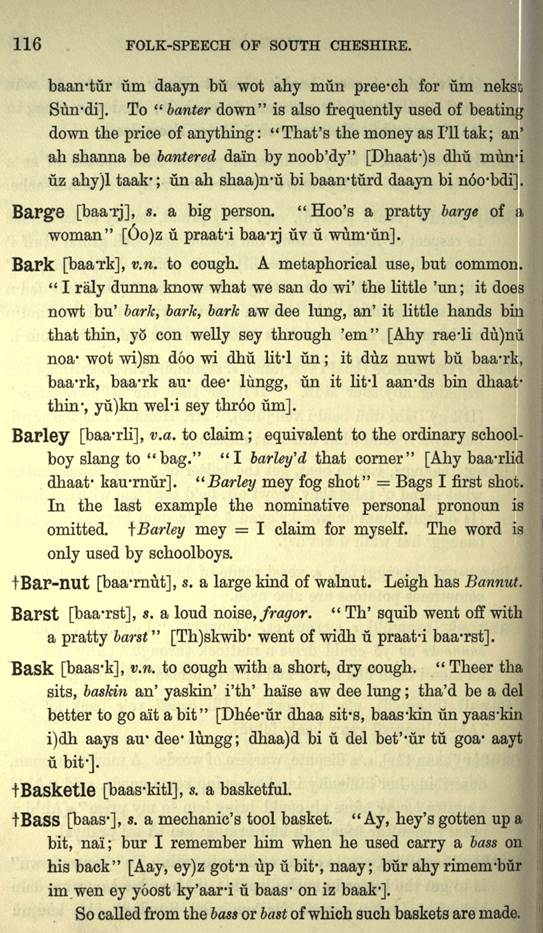
(delwedd C4430) (tudalen 116)
|
116 FOLK-SPEECH OF SOUTH CHESHIRE.
baan-tur urn daayn bu wot ahy mun pree-ch for urn neks Suirdi]. To “banter
down" is also frequently used of beatii down the price of anything :
"That's the money as I'll tak; ah shanna be bantered dain by
noob'dy" [Dhaat')s dim mun-uz ahyjl taak- ; un ah shaa)n-u bi baan-turd
daayn bi n6o-bdi].
Barge [baa'rj], s. a big person. "Hoo's a pratty barge of woman"
[6o)z u praat-i baa-rj uv u wum-un].
Bark [baa-rk], v.n. to cough. A metaphorical use, but common. “I raly dunna
know what we san do wi' the little 'un; it nowt bu' bark, bark, bark aw dee
lung, an' it little hands that thin, y5 con welly sey through 'em" [Ahy
rae-li du)m! noa- wot wi)sn doo wi dhu lit-1 un ; it duz nuwt bu baa' baa-rk,
baa-rk au* dee' lungg, un it lit'l aan-ds bin dhaat* thin-, yu)kn wel'i sey
thr6o um].
Barley [baa-rli], v.a. to claim ; equivalent to the ordinary schoolboy slang
to "bag." "I barley' 'd that corner" [Ahy baa-rlic dhaat'
kau-rnur]. "Barley mey fog shot" = Bags I first sh( In the last
example the nominative personal pronoun omitted, t Barley mey = I claim for
myself. The word is only used by schoolboys.
IBar-nut [baa-rnut], s. a large kind of walnut. Leigh has Bannut.
Barst [baa-rst], s. a loud noise, fragor. “Th' squib went off with a pratty
barst” [Th)skwib* went of widh u praat'i baa*rst],
Bask [baas-k], v.n. to cough with a short, dry cough. “Theer tha sits, baskin
an' yaskin' i'th' haise aw dee lung ; tha'd be a del better to go ait a
bit" [Dhee-ur dhaa sit*s, baas-kin un yaas'kin i)dh aays au* dee- lungg;
dhaa)d bi u del bet'-ur tu goa- aayt u bit-].
tBasketle [baas-kitl], s. a basketful.
tBass [baas-], s. a mechanic's tool basket. "Ay, hey's gotten up a bit,
na'i; bur I remember him when he used carry a bass on his back" [Aay,
ey)z got-n up u bit-, naay ; bur ahy rimenrbur im wen ey yoost ky'aar-i u
baas- on iz baak-].
So called from the bass or bast of which such baskets are made.
|
|
|
|
|
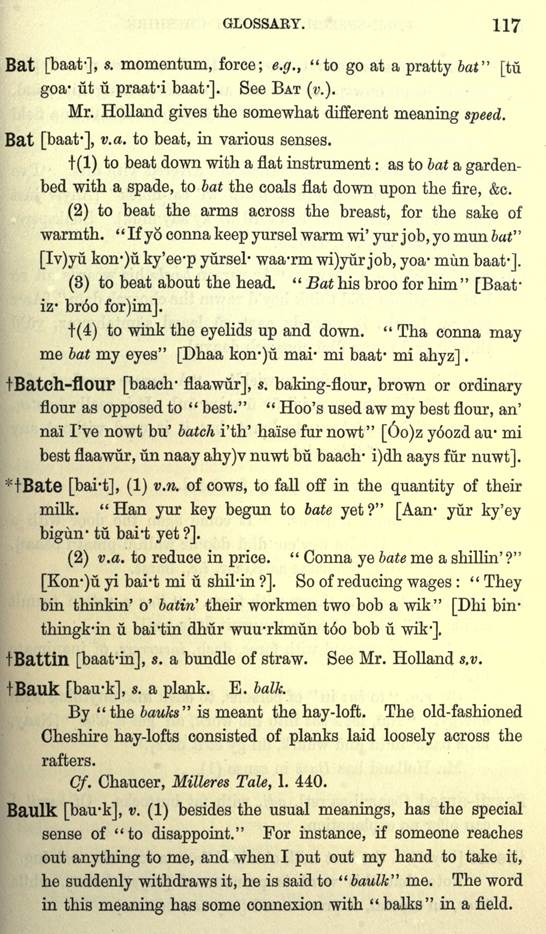
(delwedd C4431) (tudalen 117)
|
GLOSSARY. 117
Bat [baat'], s. momentum, force; e.g., "to go at a pratty bat 1 ' [tu
goa- ut ii praat-i baat']. See BAT (v.).
Mr. Holland gives the somewhat different meaning speed. Bat [baat'], v.a. to
beat, in various senses.
t(l) to beat down with a flat instrument : as to bat a garden-bed with a
spade, to bat the coals flat down upon the fire, &c.
(2) to beat the arms across the breast, for the sake of warmth. < If yo
conna keep yursel warm wi' yur j ob, yo mun bat' ' [Iv)yu kon-)u ky'ee-p
yursel' waa-rm wi)yur job, yoa- mun baat'].
(8) to beat about the head. “Bat his broo for him" [Baat-iz' br6o
for)im].
f(4) to wink the eyelids up and down. “Tha conna may me bat my eyes"
[Dhaa kon-)u mai- mi baat' mi ahyz] .
t Batch-flour [baach- flaawur], s. baking-flour, brown or ordinary flour as
opposed to “best." “Hoo's used aw my best flour, an' nai I've nowt bu'
batch i'th' haise fur nowt" [6o)z y6ozd au 1 mi best flaawur, un naay
ahy)v nuwt bu baach- i)dh aays far nuwt].
*tBate [bai-t], (1) v.n. of cows, to fall off in the quantity of their milk.
"Han yur key begun to bate yet?" [Aan* yur ky'ey bigun- tu bai't
yet ?].
(2) v.a. to reduce in price. “Conna ye bate me a shillin'?" [Kon')u yi
bai't mi u shil'in ?]. So of reducing wages : “They
bin thinkin' o' batin' their workmen two bob a wik" [Dhi bin-thingk'in u
bai'tin dhur wuu*rkmun t6o bob u wik'].
tBattin [baat-in], s. a bundle of straw. See Mr. Holland s.v.
' tBauk [bau-k], s. a plank. E. balk
By "the banks" is meant the hay-loft. The old-fashioned
(Cheshire hay-lofts consisted of planks laid loosely across the rafters. Cf.
Chaucer, Milleres Tale, 1. 440.
Baulk [bau-k], v. (1) besides the usual meanings, has the special sense of
"to disappoint." For instance, if someone reaches out anything to
me, and when I put out my hand to take it, he suddenly withdraws it, he is
said to “baulk" me. The word in this meaning has some connexion with
“balks" in a field.
|
|
|
|
|
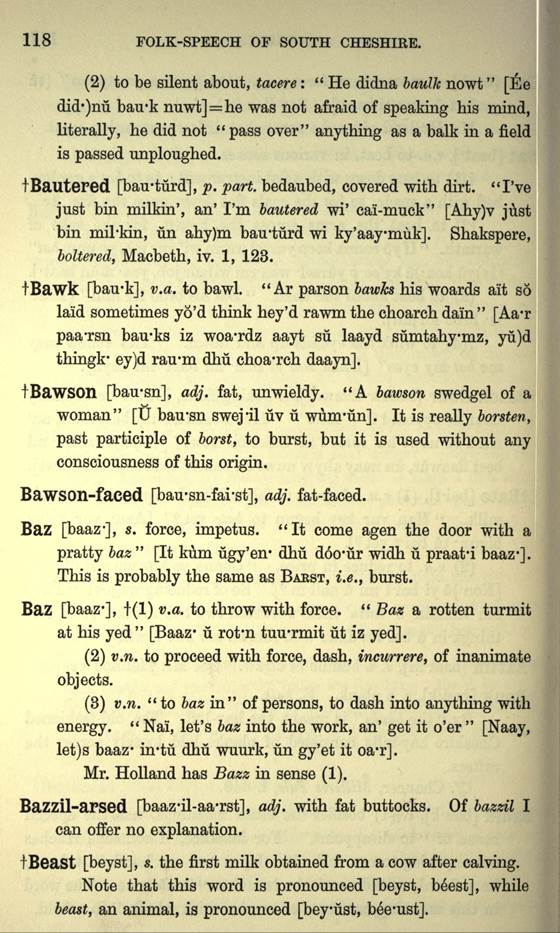
(delwedd C4432) (tudalen 118)
|
118 FOLK-SPEECH OF SOUTH CHESHIRE.
(2) to be silent about, tacere : “He didna baulk nowt" [fie did')nu
bau-k nuwt]=he was not afraid of speaking his mind, literally, he did not
“pass over" anything as a balk in a field is passed unploughed.
tBautered [bau-turd], p. part, bedaubed, covered with dirt. "I've just
bin milkin', an' I'm bantered wi' cai-muck" [Ahy)v just bin mil-kin, un
ahy)m bau-turd wi ky'aaymuk]. Shakspere, boltered, Macbeth, iv. 1, 123.
tBawk [bau-k], v.a. to bawl. "Ar parson bawks his woards ait so laid
sometimes yo'd think hey'd rawm the choarch dain" [Aa-r paa-rsn bau-ks
iz woa-rdz aayt su laayd sumtahymz, yu)d thingk- ey)d rau-m dhu choa-rch
daayn].
IBawSOn [bau-sn], adj. fat, unwieldy. "A bawson swedgel of a woman"
[U bau-sn swej-il uv u wum-un]. It is really borsten, past participle of
borst, to burst, but it is used without any consciousness of this origin.
Bawson-faeed [bau-sn-fai-st], adj. fat-faced.
Baz [baaz-], s. force, impetus. "It come agen the door with a pratty
baz" [It kum ugy'en- dhu d6o'ur widh u praat-i baaz-]. This is probably
the same as BAEST, i.e., burst.
Baz [baaz-], f(l) v.a. to throw with force. “Baz a rotten turmit at his yed”
[Baaz* u rot-n tuu-rmit ut iz yed].
(2) v.n. to proceed with force, dash, incurrere, of inanimate objects.
(3) v.n. "to baz in" of persons, to dash into anything with energy.
“Nai, let's baz into the work, an' get it o'er” [Naay, let)s baaz- in-tu dhu
wuurk, un gy'et it oa-r].
Mr. Holland has Bazz in sense (1).
Bazzil-arsed [baaz-il-aa-rst], adj. with fat buttocks. Of bazzil I can oJBfer
no explanation.
'Beast [beyst], s. the first milk obtained from a cow after calving.
Note that this word is pronounced [beyst, be"est], while beast, an
animal, is pronounced [beyust, bee-ust].
|
|
|
|
|
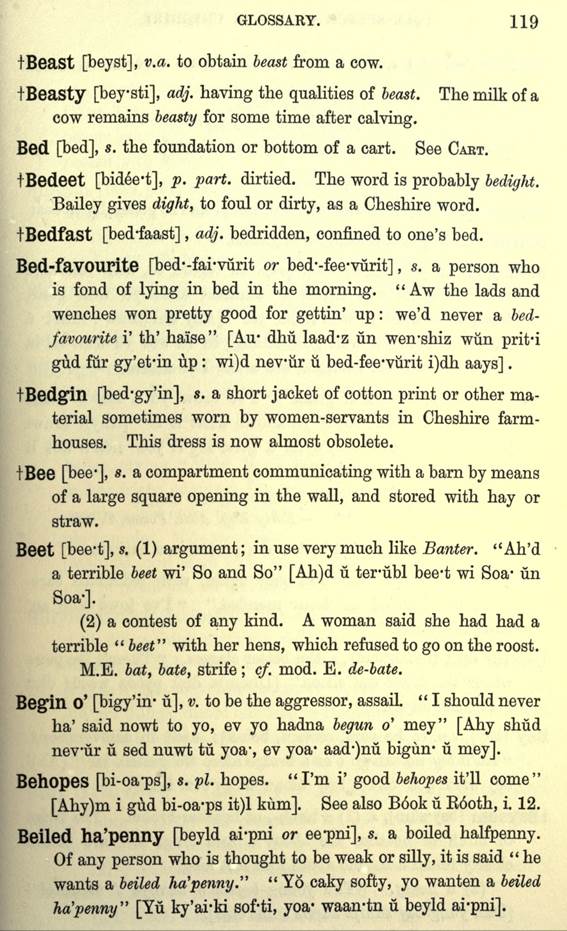
(delwedd C4433) (tudalen 119)
|
GLOSSARY. 119
f Beast [beyst], v.a. to obtain beast from a cow.
tBeasty [beysti], adj. having the qualities of beast. The milk of a cow
remains beasty for some time after calving.
Bed [bed], s. the foundation or bottom of a cart. See CART.
tBedeet [bid6e-t], p. part, dirtied. The word is probably bedight.
Bailey gives dight, to foul or dirty, as a Cheshire word. IBedfast
[bed-faast] , adj. bedridden, confined to one's bed.
Bed-favourite [bed--fai-vurit or bed'-fee-vurit] , s. a person who is fond of
lying in bed in the morning. "Aw the lads and wenches won pretty good
for gettin' up : we'd never a bed-favourite i' th' haise" [Air dhu
laad-z un wen-shiz wun prit-i gud fur gy'et-in up : wi)d nevur u
bed-fee-vurit i)dh aays] .
tBedgin [bed-gy'in], s. a short jacket of cotton print or other material
sometimes worn by women-servants in Cheshire farmhouses. This dress is now
almost obsolete.
tBee [bee*], s. a compartment communicating with a barn by means of a large
square opening in the wall, and stored with hay or straw.
Beet [bee-t], s. (I) argument ; in use very much like Banter. "Ah'd a
terrible beet wi' So and So" [Ah)d u terubl bee-t wi Soa* un Boa-].
(2) a contest of any kind. A woman said she had had a terrible “beet"
with her hens, which refused to go on the roost. M.E. bat, bate, strife; cf.
mod. E. de-bate.
Begin O' [bigy'ur u], v. to be the aggressor, assail. “I should never ha'
said nowt to yo, ev yo hadna begun o' mey" [Ahy shud nevur u sed nuwt tu
yoa-, ev yoa- aad-)nu bigun- u mey].
Behopes [bi-oa-ps], s. pi. hopes. "I'm i' good behopes it'll come"
[Ahy)m i gud bi-oa-ps it)l kum]. See also B6ok u E6oth, i. 12.
Beiled ha'penny [beyld ai-pni or ee-pni], s. a boiled halfpenny. Of any
person who is thought to be weak or silly, it is said “he wants a belled
ha'penny." “Yo caky softy, yo wanten a Idled ha'penny" [Yu ky'arki
sof-ti, yoa- waan-tn u beyld ai-pni].
|
|
|
|
|
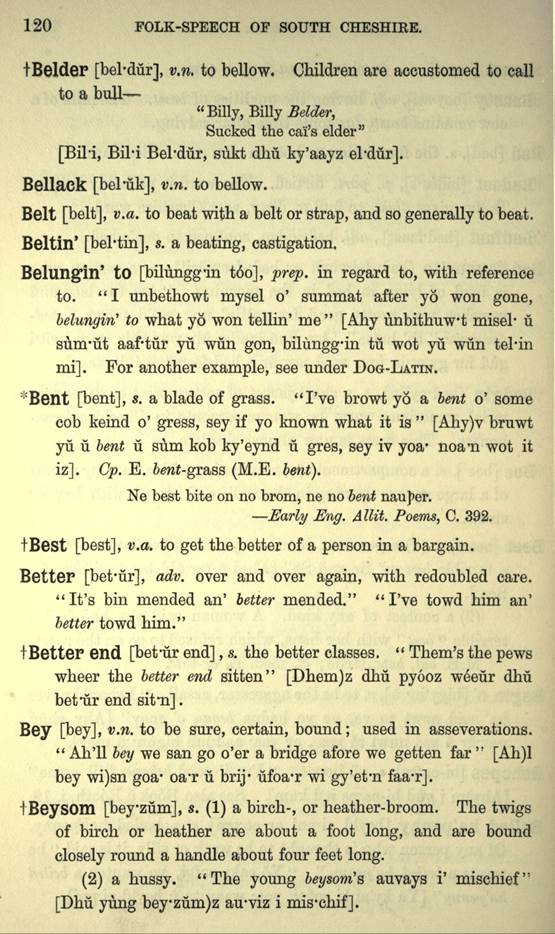
(delwedd C4434) (tudalen 120)
|
[-SPEECH OF SOUTH CHESHIRE.
tBelder [bel-dur], v.n. to bellow. Children are accustomed to call
to a bull
"Billy, Billy Belder,
Sucked the cai's elder" [BiH, Bil-i Bel-dur, sukt dhu ky'aayz el'dur].
Bellack [bel-uk], v.n. to bellow.
Belt [belt], v.a. to beat with a belt or strap, and so generally to beat.
Beltin* [beHin], s. a beating, castigation,
Belungin' to [bilungg-in t6o], prep, in regard to, with reference to. "I
unbethowt mysel o' summat after yo won gone, belungiri to what yo won tellin'
me" [Ahy unbithuwt misel- u sunrut aaf-tur yu wun gon, bilungg-in tu wot
yu wun tel-in mi]. For another example, see under DOG-LATIN.
*Bent [bent], s. a blade of grass. "I've browt yo a bent o' some cob
keind o' gress, sey if yo known what it is” [Ahy)v bruwt yu ii bent u sum kob
ky'eynd u gres, sey iv yoa* noa'n wot it iz]. Cp. E. bent-gT&ss (M.E.
bent).
Ne best bite on no brom, ne no bent nauper.
Early Eng. Allit. Poems, C. 392.
tBest [best], v.a. to get the better of a person in a bargain.
Better [bet-ur], adv. over and over again, with redoubled care. "It's
bin mended an' better mended." "I've towd him an' better towd
him."
t Better end [bet-ur end] , s. the better classes. “Them's the pews wheer the
better end sitten" [Dhem)z dhu pyooz weeur dhu betnir end sit*n].
Bey [bey], v.n. to be sure, certain, bound; used in asseverations. “Ah'll bey
we san go o'er a bridge afore we getten far” [Ah)l bey wi)sn goa p oa - r u
brij* ufoa*r wi gy'et'n faa-r].
tBeysom [beyzum], s. (1) a birch-, or heather-broom. The twigs of birch or
heather are about a foot long, and are bound closely round a handle about
four feet long.
(2) a hussy. "The young beysom's auvays i' mischief" [DM yung
beyzum)z au-viz i mis-chif].
|
|
|
|
|
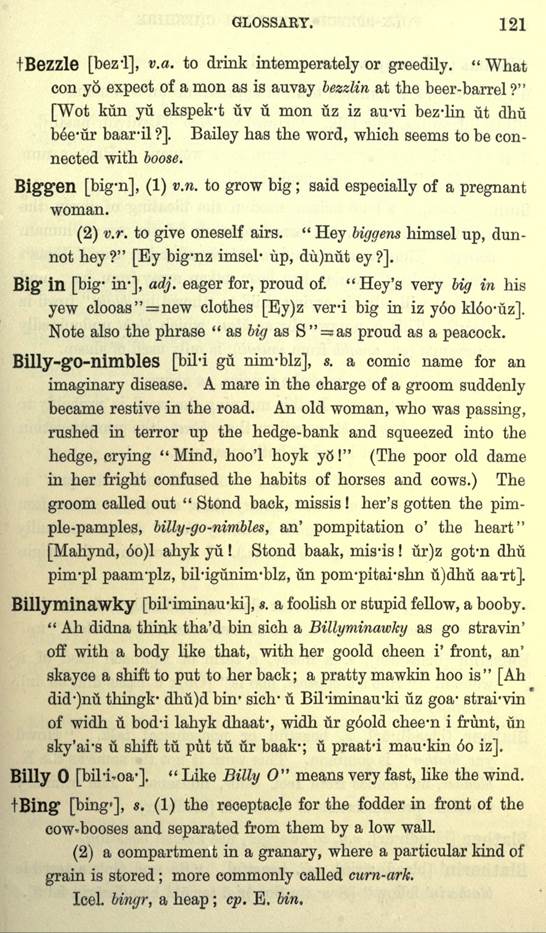
(delwedd C4435) (tudalen 121)
|
GLOSSARY. 121
IBezzle [bezl], v.a. to drink intemperately or greedily. “What con yo expect
of a mon as is auvay bezzlin at the beer-barrel ?" [Wot kun yu ekspek-t
uv u mon iiz iz airvi bez-lin ut dhu be"e-ur baaril ?]. Bailey has the
word, which seems to be connected with boose.
Biggin [big-n], (1) v.n. to grow big ; said especially of a pregnant woman.
(2) v.r. to give oneself airs. “Hey biggens himsel up, dunnot hey?" [Ey
big-nz imsel- up, du)nut ey?].
Big in [big- in-], adj. eager for, proud of. "Key's very big in his yew
clooas" = new clothes [Ey)z ver-i big in iz y6o k!6o-uz]. Note also the
phrase “as big as 8"=; as proud as a peacock.
Billy-gO-nimbles [bil-i gu nim-blz], s. a comic name for an imaginary
disease. A mare in the charge of a groom suddenly became restive in the road.
An old woman, who was passing, rushed in terror up the hedge-bank and
squeezed into the hedge, crying “Mind, hoo'l hoyk j6 !" (The poor old
dame in her fright confused the habits of horses and cows.) The groom called
out “Stond back, missis ! her's gotten the pimple-pamples, billy -go
-nimbles, an' pompitation o' the heart" [Mahynd, 6o)l ahyk yu ! Stond
baak, mis-is ! ur)z got-n dhu pim-pl paanrplz, biHgunim-blz, un pom-pitai-shn
u)dhu aaTt].
Billyminawky [bil-iminau-ki], . a foolish or stupid fellow, a booby. “Ah
didna think tha'd bin sich a Billyminawky as go stravin' off with a body like
that, with her goold cheen i' front, an' skayce a shift to put to her back; a
pratty mawkin hoo is" [Ah did')nu thingk- dhu)d bin' sich- u BiHminau-ki
uz goa- strai-vin of widh ii bod'i lahyk dhaat-, widh iir g6old chee-n i
frunt, un sky'ars ii shift tu put tu ur baak-; u praat'i mau-kin 60 iz].
Billy [bil'i'Oa-]. “Like Billy 0" means very fast, like the wind. tBing
[bing'], s. (1) the receptacle for the fodder in front of the cow-booses and
separated from them by a low wall.
(2) a compartment in a granary, where a particular kind of grain is stored ;
more commonly called curn-ark. Icel. bingr, a heap ; cp. E. bin.
|
|
|
|
|
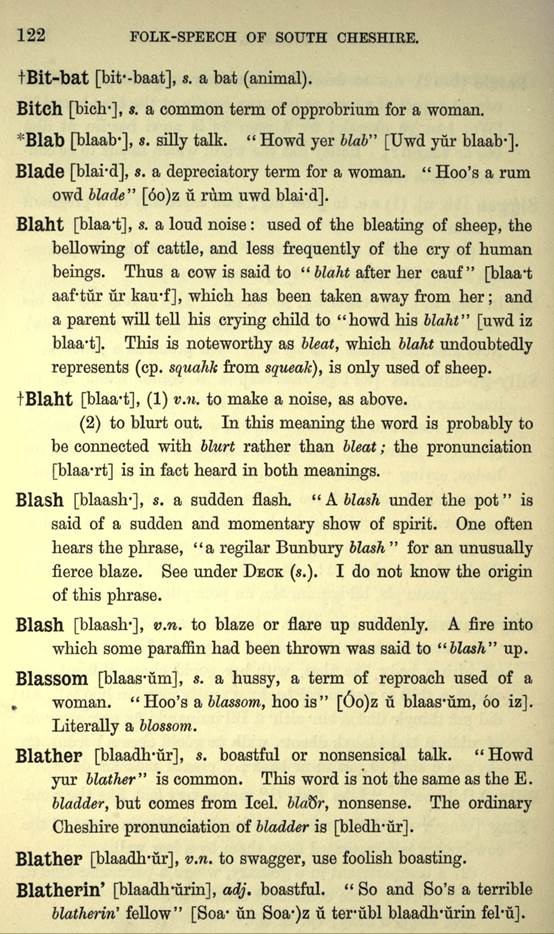
(delwedd C4436) (tudalen 122)
|
122 FOLK-SPEECH OF SOUTH CHESHIRE.
tBit-bat [bit--baat], s. a bat (animal).
Bitch [bich-], s. a common term of opprobrium for a woman.
*Blab [blaab-], s. silly talk. “Howd yer blab" [Uwd yiir blaab-].
Blade [blai-d], s. a depreciatory term for a woman. “Hoo's a rum owd
blade" [6o)z u rum uwd blai-d].
Blaht [blaa-t], s. a loud noise : used of the bleating of sheep, the
bellowing of cattle, and less frequently of the cry of human beings. Thus a
cow is said to “blaht after her cauf” [blaa't aaf-tur ur kau-f], which has
been taken away from her; and a parent will tell his crying child to
"howd his blaht" [uwd iz blaa-t]. This is noteworthy as bleat,
which blaht undoubtedly represents (cp. squahk from squeak), is only used of
sheep.
t Blaht [blaa-t], (1) v.n. to make a noise, as above.
(2) to blurt out. In this meaning the word is probably to be connected with
blurt rather than bleat ; the pronunciation [blaa-rt] is in fact heard in
both meanings.
Blash [blaash-], s. a sudden flash. "A. blash under the pot" is
said of a sudden and momentary show of spirit. One often hears the phrase,
"a regilar Bunbury blash “for an unusually fierce blaze. See under DECK
(s.). I do not know the origin of this phrase.
Blash [blaash-], v.n. to blaze or flare up suddenly. A fire into which some
paraffin had been thrown was said to "blash" up.
Blassom [blaas-um], s. a hussy, a term of reproach used of a , woman. "Hoo's
a blassom, hoo is" [6o)z u blaas-um, 60 iz]. Literally a blossom.
Blather [blaadh-ur], s. boastful or nonsensical talk. "Howd yur
blather" is common. This word is not the same as the E. bladder, but
comes from Icel. blaftr, nonsense. The ordinary Cheshire pronunciation of
bladder is [bledh-ur],
Blather [blaadh-ur], v.n. to swagger, use foolish boasting.
Blatherin' [blaadh-urin], adj. boastful. “So and So's a terrible blatherin'
fellow" [Soa- un Soa-)z u terubl blaadh-urin fel-u].
|
|
|
|
|
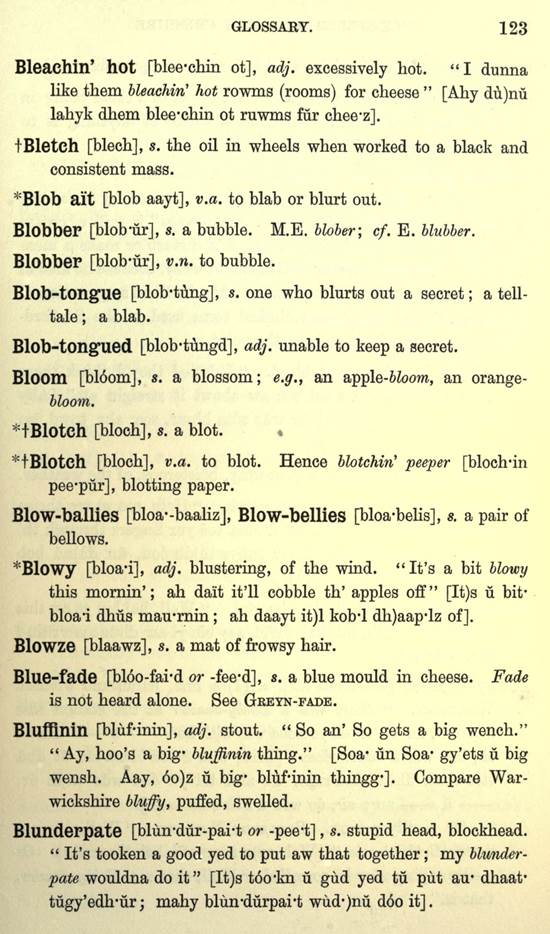
(delwedd C4437) (tudalen 123)
|
GLOSSARY. 123
Bleaehin' hot [blee-chin ot], adj. excessively hot. "I dunna like them
bleachiri hot rowms (rooms) for cheese” [Ahy du)nu lahyk dhem blee-chin ot ruwms
fur chee-z].
tBletch [blech], s. the oil in wheels when worked to a black and consistent
mass.
*Blob ait [blob aayt], v.a. to blab or blurt out.
Blobber [blob-ur], s. a bubble. M.E. blober; cf. E. blubber.
Blobber [blob-ur], v.n. to bubble.
Blob-tongue [blob-tung], s. one who blurts out a secret ; a telltale ; a
blab.
Blob-tongued [blob-tungd], adj. unable to keep a secret.
Bloom [b!6om], s. a blossom; e.g., an apple-fcfoow, an orange-bloom.
*tBloteh [bloch], s. a blot.
*t Blotch [bloch], v.a. to blot. Hence blotchin' peeper [bloch-in pee-pur],
blotting paper.
Blow-bailies [bloa--baaHz], Blow-bellies [bloa-beHs], s. a pair of bellows.
* Blowy [bloa-i], adj. blustering, of the wind. "It's a bit blowy this
mornin' ; ah da'it it'll cobble th' apples off" [It)s u bit-bloai dhus
mau-rnin ; ah daayt it)l kob-1 dh)aap-lz of].
Blowze [blaawz], s. a mat of frowsy hair.
Blue-fade [b!6o-fai-d or -fee-d], s. a blue mould in cheese. Fade is not
heard alone. See GREYN-FADE.
Bluffinin [bluf-mm], adj. stout. “So an' So gets a big wench." “Ay,
hoo's a big* bluffinin thing." [Soa- un Soa* gy'ets u big wensh. Aay,
6o)z u big* bluf-inin thingg-]. Compare Warwickshire bluffy, puffed, swelled.
Blunderpate [blmrdur-pai-t or -pee-t] , s. stupid head, blockhead. “It's
tooken a good yed to put aw that together ; my blunder-pate wouldna do
it" [It)s t6o kn u gud yed tu put au- dhaat-tugy'edh-ur; many
blun-durpart wud-)nu d6o it].
|
|
|
|
|
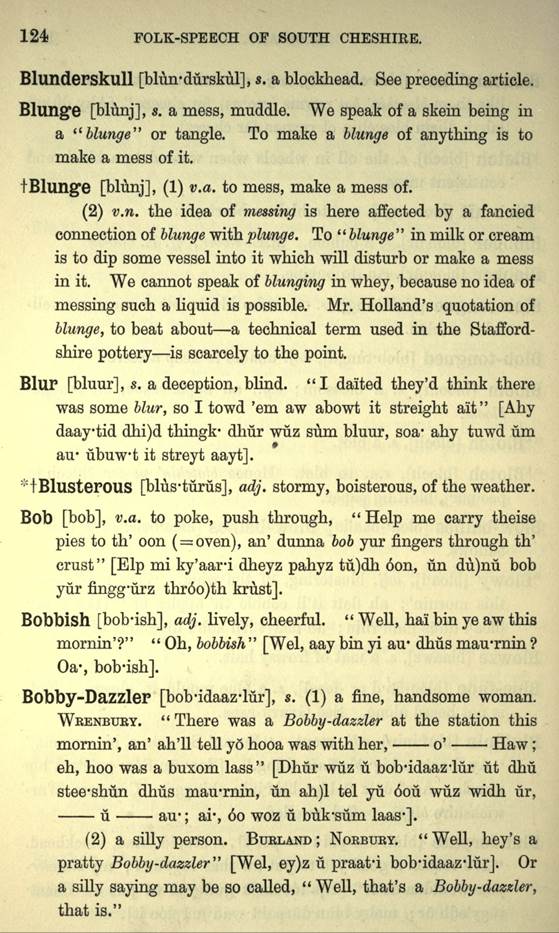
(delwedd C4438) (tudalen 124)
|
124 FOLK-SPEECH OF SOUTH CHESHIRE.
Blunderskull [blun-durskul], s. a blockhead. See preceding article.
Blunge [blunj], s. a mess, muddle. We speak of a skein being in a
"blunge" or tangle. To make a blunge of anything is to make a mess
of it.
t Blunge [blunj], (1) v.a. to mess, make a mess of.
(2) v.n. the idea of messing is here affected by a fancied connection of
blunge with plunge. To "blunge" in milk or cream is to dip some
vessel into it which will disturb or make a mess in it. We cannot speak of
blunging in whey, because no idea of messing such a liquid is possible. Mr.
Holland's quotation of blunge, to beat about a technical term used in the
Staffordshire pottery is scarcely to the point.
BlUP [bluur], s. a deception, blind. "I daited they'd think there was
some blur, so I towd 'em aw abowt it streight ait" [Ahy daaytid dhi)d
thingk- dhur wuz sum bluur, soa- ahy tuwd um au- ubuw-t it streyt aayt].
*t Blusterous [blus-turus], adj. stormy, boisterous, of the weather.
Bob [bob], v.a. to poke, push through, "Help me carry theise pies to th'
oon ( = oven), an' dunna bob yur fingers through th' crust" [Elp mi
ky'aari dheyz pahyz tu)dh 6on, un du)nu bob yur fingg-urz thr6o)th knist].
Bobbish [bob-ish], adj. lively, cheerful. “Well, hai bin ye aw this
mornin'?" “Oh, bobbish" [Wei, aay bin yi au* dhus mau-rnin ? Oa-,
bob-ish].
Bobby-Dazzler [bob-idaaz-lur], s. (1) a fine, handsome woman. WBENBUBY.
“There was a Bobby -dazzler at the station this
mornin', an' ah'll tell yo hooa was with her, o' Haw ;
eh, hoo was a buxom lass" [Dhur wuz u bob-idaazlur ut dhu stee-shun dhus
mau-rnin, im ah)l tel yu 6oii wuz widh ur,
ii au- ; ai*, 60 woz ii buk'sum laas*].
(2) a silly person. BUBLAND; NOEBUBY. "Well, hey's a pratty Bobby
-dazzler" [Wei, ey)z u praat'i bob-idaaz'lur]. Or a silly saying may be
so called, “Well, that's a Bobby -dazzler, that is."
|
|
|
|
|
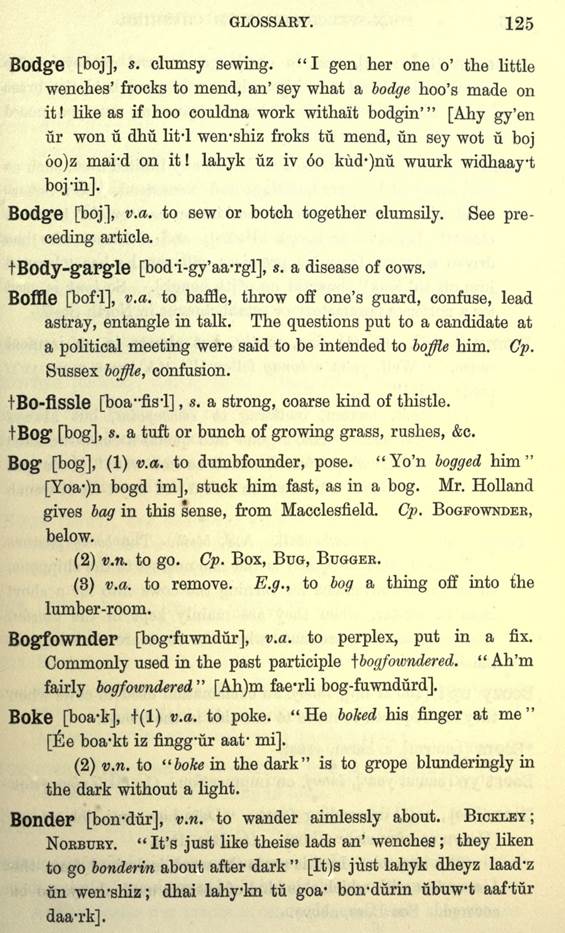
(delwedd C4439) (tudalen 125)
|
GLOSSARY. 125
Bodge [boj], s. clumsy sewing. "I gen her one o' the little wenches'
frocks to mend, an' sey what a bodge hoo's made on it! like as if hoo couldna
work withait bodgin'" [Ahy gy'en ur won ii dhu lit-1 wen-shiz froks tu
mend, un sey wot u boj 6o)z mai-d on it! lahyk uz iv 60 kud-)nu wuurk
widhaayt boj -in].
Bodge [boj], v.a. to sew or botch together clumsily. See preceding article.
tBody-gargle [bodi-gy'aa-rgl], s. a disease of cows.
Boffle [bofl], v.a. to baffle, throw off one's guard, confuse, lead astray,
entangle in talk. The questions put to a candidate at a political meeting
were said to be intended to boffle him. Cp. Sussex boffle, confusion.
tBo-fissle [boa"fisl] , s. a strong, coarse kind of thistle.
IBog [bog], s. a tuft or bunch of growing grass, rushes, &c.
Bog [bog], (1) v.a. to dumbfounder, pose. "Yo'n bogged him" [Yoa-)n
bogd im], stuck him fast, as in a bog. Mr. Holland gives bag in this sense,
from Macclesfield. Cp. BOGFOWNDER, below.
(2) v.n. to go. Cp. Box, BUG, BUGGER.
(3) v.a. to remove. E.g., to bog a thing off into the lumber-room.
Bogfownder [bog-fuwndur], v.a. to perplex, put in a fix. Commonly used in the
past participle \bogfowndered. “Ah'm fairly bogfowndered" [Ah)m fae-rli
bog-fuwndurd],
Boke [boa-k], f(l) v.a. to poke. "He boked his finger at me" [6e
boa-kt iz fingg-ur aat- mi],
(2) v.n. to "boke in the dark" is to grope blunderingly in the dark
without a light.
Bonder [bon-dur], v.n. to wander aimlessly about. BICKLEY; NORBURY. “It's
just like theise lads an' wenches ; they liken to go bonderin about after
dark” [It)s just lahyk dheyz laad'z un wen-shiz ; dhai lahykn tu goa-
bon-durin ubuwt aafiur daa-rk].
|
|
|
|
|
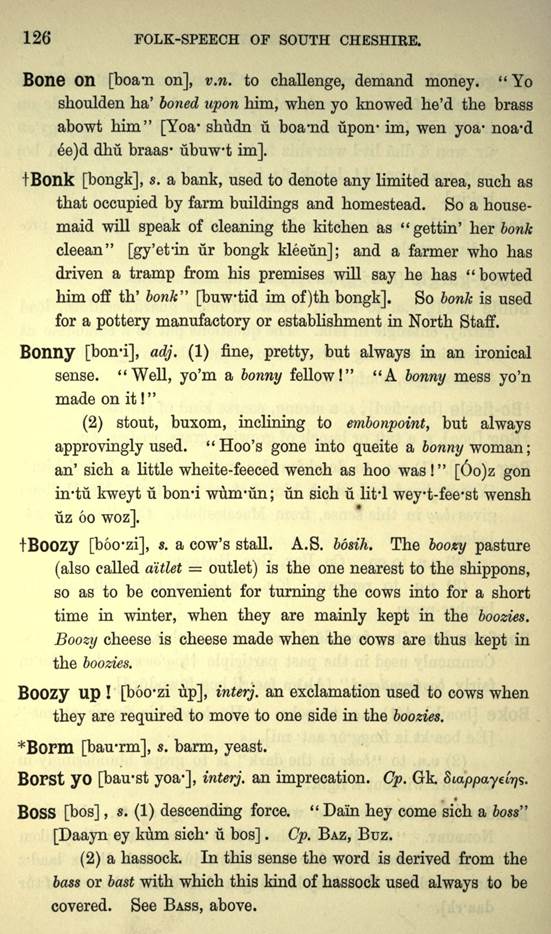
(delwedd C4440) (tudalen 126)
|
126 FOLK-SPEECH OF SOUTH CHESHIRE.
Bone on [boa-n on], v.n. to challenge, demand money. "Yo shoulden ha'
boned upon him, when yo knowed he'd the brass abowt him" [Yoa- shudn u
boa-nd upon- im, wen yoa- noa-d e"e)d dhu braas* ubuwt im].
tBonk [bongk], s. a bank, used to denote any limited area, such as that
occupied by farm buildings and homestead. So a housemaid will speak of cleaning
the kitchen as "gettin' her bonk cleean" [gy'etin ur bongk kleeun];
and a farmer who has driven a tramp from his premises will say he has
"bowted him off th' bonk" [buwtid im of)th bongk]. So bonk is used
for a pottery manufactory or establishment in North Staff.
Bonny [bon-i], adj. (I) fine, pretty, but always in an ironical sense.
"Well, yo'm a bonny fellow!" "A bonny mess yo'n made on it
!"
(2) stout, buxom, inclining to embonpoint, but always approvingly used.
"Hoo's gone into queite a bonny woman; an' sich a little wheite-feeced
wench as hoo was !” [60) z gon in-tu kweyt ii bon-i wunrun; un sich u lit'l
wey-t-fee*st wensh uz 60 woz].
tBoozy [boo-zi], s. a cow's stall. A.S. bosih. The boozy pasture (also called
aitlet = outlet) is the one nearest to the shippons, so as to be convenient
for turning the cows into for a short time in winter, when they are mainly
kept in the booties. Boozy cheese is cheese made when the cows are thus kept
in the boozies.
Boozy up ! [boo-zi up], interj. an exclamation used to cows when they are
required to move to one side in the boozies.
*Borm [bau-rm], s. barm, yeast.
Borst yo [bau-st yoa-], interj. an imprecation. Cp. Gk. Sia/o/oayetr/s.
BOSS [bos] , s. (1) descending force. “Dain hey come sich a boss" [Daayn
ey kiim sich- u bos] . Cp. BAZ, Buz.
(2) a hassock. In this sense the word is derived from the bass or bast with
which this kind of hassock used always to be covered. See BASS, above.
|
|
|
|
|
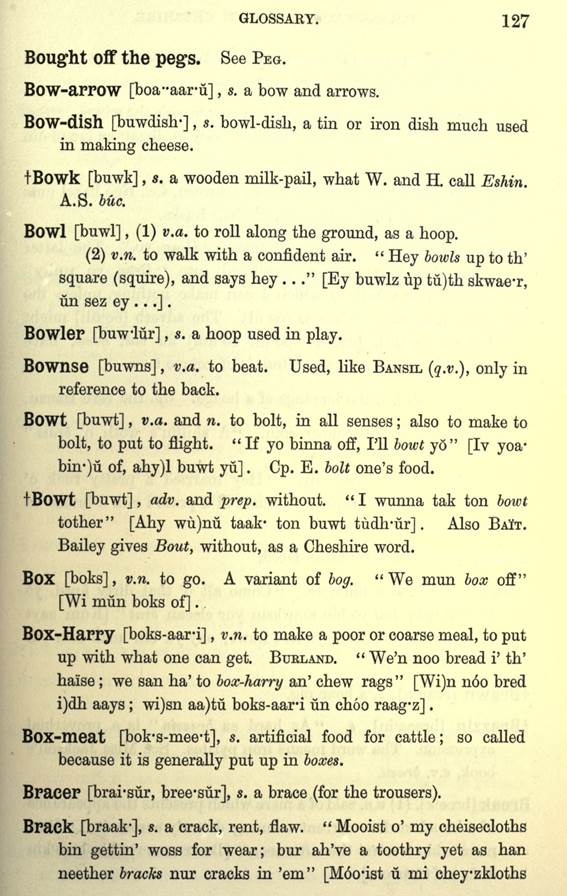
(delwedd C4441) (tudalen 127)
|
GLOSSARY. 127
Bought Off the pegs. See PEG. Bow-arrow [boa-aaru] , s. a bow and arrows.
Bow-dish [buwdish-] , s. bowl-dish, a tin or iron dish much used in making
cheese.
tBowk [buwk] , s. a wooden milk-pail, what W. and H. call Eshin. A.S. buc.
Bowl [buwl] , (1) v.a. to roll along the ground, as a hoop.
(2) v.n. to walk with a confident air. “Hey bowls up to th' square (squire),
and says hey . . ." [Ey buwlz up tu)th skwae-r, un sez ey . . .] .
Bowler [buwlur] , s. a hoop used in play.
Bownse [buwns] , v.a. to beat. Used, like BANSIL (q.v.), only in reference to
the back.
Bowt [buwt] , v.a. and n. to bolt, in all senses ; also to make to bolt, to
put to flight. “If yo binna off, I'll bowt yd" [Iv yoa-bin-)u of, ahy)l
buwt yu] . Cp. E. bolt one's food.
tfiOWt [buwt] , adv. and prep, without. “I wunna tak ton bowt tother"
[Ahy wu)nu taak- ton buwt tudh-ur] . Also BATT. Bailey gives Bout, without,
as a Cheshire word.
BOX [boks] , v.n. to go. A variant of bog. “We mun box off" [Wi mun boks
of] .
Box-Harry [boks-aar-i] , v.n. to make a poor or coarse meal, to put up with
what one can get. BURLAND. “We'n noo bread i' th' haise ; we san ha' to
box-harry an' chew rags" [Wi)n n6o bred i)dh aays ; wi)sn aa)tu
boks-aari un choo raag'z] .
Box-meat [bok-s-mee-t], s. artificial food for cattle ; so called because it
is generally put up in boxes.
Bracer [brai-sur, bree-sur], s. a brace (for the trousers).
Brack [braak-], s. a crack, rent, flaw. “Mooist o' my cheisecloths bin
gettin' woss for wear; bur ah've a toothry yet as han neether bracks nur
cracks in 'em" [M6o*ist u mi cheyzkloths
|
|
|
|
|
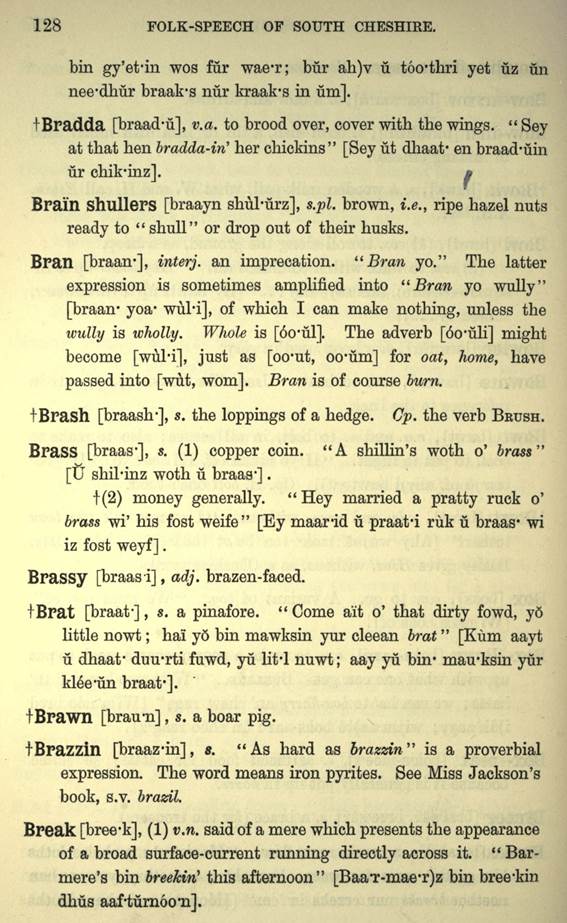
(delwedd C4442) (tudalen 128)
|
128 FOLK-SPEECH OF SOUTH CHESHIRE.
bin gy'et-in wos fur wae-r; bur ah)v u too-thri yet uz un nee-dhur braak-s
nur kraak-s in urn].
tBradda [braad-u], v.a. to brood over, cover with the wings. “Sey at that hen
bradda-in' her chickins" [Sey ut dhaat en braad-uin ur chik-inz].
Brain Shullers [braayn shul-urz], s.pl. brown, i.e., ripe hazel nuts ready to
“shull" or drop out of their husks.
Bran [braan-], interj. an imprecation. "Bran yo." The latter
expression is sometimes amplified into "Bran yo wully" [braan' yoa'
wuH], of which I can make nothing, unless the wully is wholly. WhoU is
[6o'ul]. The adverb [6o-uli] might become [wul-i], just as [oo-ut, oo-um] for
oat, home, have passed into [wut, worn]. Bran is of course burn.
tBrash [braash-], s. the loppings of a hedge. Op. the verb BRUSH.
Brass [braas-], s. (1) copper coin. "A shillin's woth o' brass 1 ' [U
shil'inz woth u braas ] .
1(2) money generally. "Hey married a pratty ruck o' brass wi' his fost
weife" [Ey maarid u praat-i ruk u braas- wi iz fost weyf ] .
Brassy [braas i] , adj. brazen-faced.
tBrat [braat-] , s. a pinafore. “Come a'it o' that dirty fowd, y6 little nowt
; ha'i y6 bin mawksin yur cleean brat” [Kum aayt u dhaat* duu'rti fuwd, yu
lit-1 nuwt; aay yu bin- mau'ksin yur kl^e-un braat-].
tBrawn [brau-n] , s. a boar pig.
IBrazzin [braaz-in], . "As hard as brazzin ." is a proverbial
expression. The word means iron pyrites. See Miss Jackson's book, s.v.
brazil.
Break [bree-k], (1) v.n. said of a mere which presents the appearance of a
broad surf ace -cur rent running directly across it. “Bar-mere's bin breekin'
this afternoon" [BaaT-mae-r)z bin bree'kin dhus aaf-turnoo'n].
|
|
|
|
|
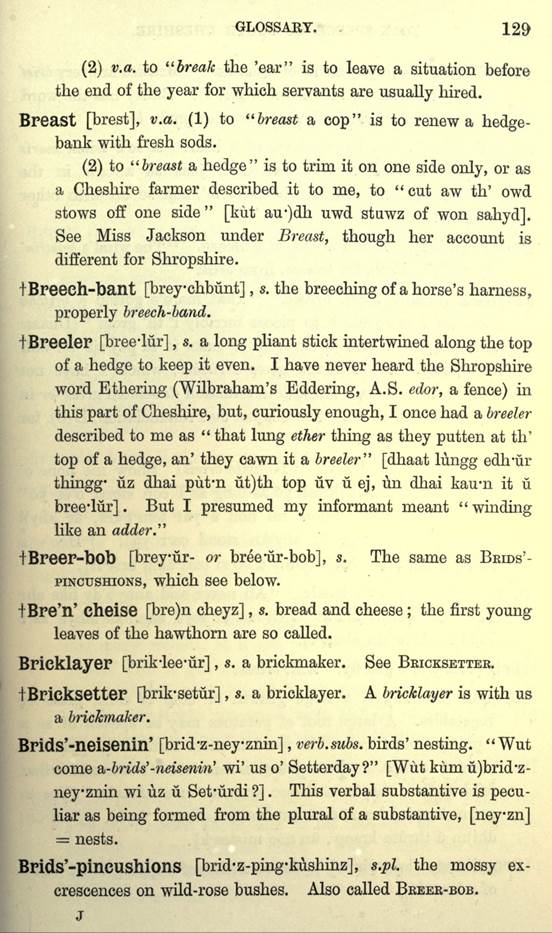
(delwedd C4443) (tudalen 129)
|
GLOSSARY. 129
(2) v.a. to "break the 'ear" is to leave a situation before the end
of the year for which servants are usually hired.
Breast [brest], v.a. (1) to "breast a cop" is to renew a hedge-bank
with fresh sods.
(2) to "breast a hedge" is to trim it on one side only, or as a
Cheshire farmer described it to me, to "cut aw th' owd stows off one
side" [kut au-)dh uwd stuwz of won sahyd]. See Miss Jackson under
Breast, though her account is different for Shropshire.
IBreeeh-bant [breychbunt] , s. the breeching of a horse's harness, properly
breech-band.
tBreeler [bree-lur] , s. a long pliant stick intertwined along the top of a
hedge to keep it even. I have never heard the Shropshire word Ethering
(Wilbraham's Eddering, A.S. edor, a fence) in this part of Cheshire, but,
curiously enough, I once had a breeler described to me as “that lung ether
thing as they putten at th' top of a hedge, an' they cawn it a breeler"
[dhaat lungg edh'ur thingg- uz dhai put-n ut)th top uv u ej, un dhai kau-n it
u bree-lur] . But I presumed my informant meant "winding like an
adder."
iBreer-bob [breyur- or bree-ur-bob], s. The same as BBIDS'-PINCUSHIONS, which
see below.
tBre'n' cheise [bre)n cheyz] , s. bread and cheese ; the first young leaves
of the hawthorn are so called.
Bricklayer [brik-lee-ur] , s. a brickmaker. See BKICKSETTEE.
IBrieksetter [brik-setur] , s. a bricklayer. A bricklayer is with us a brickmaker.
Brids'-neisenin' [brid'z-neyznin] , verb. subs, birds' nesting. “Wut come
a>-brids'-neisenin' wi' us o' Setterday ?" [Wut kum u)brid'z-neyznin
wi uz u Set-urdi ?] . This verbal substantive is peculiar as being formed
from the plural of a substantive, [neyzn] = nests.
Brids'-pineushions [brid-z-ping-kushinz], s.pl. the mossy excrescences on
wild-rose bushes. Also called BEEEK-BOB. j
|
|
|
|
|
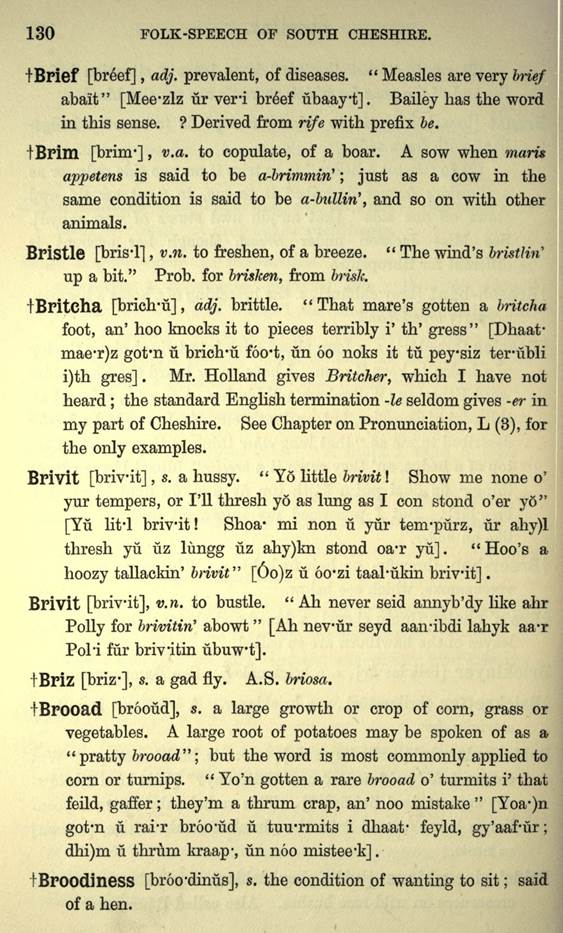
(delwedd C4444) (tudalen 130)
|
130 FOLK -SPEECH OF SOUTH CHESHIRE.
t Brief [breef] , adj. prevalent, of diseases. “Measles are very brief
abait" [Mee-zlz ur veri bre"ef ubaayt]. Bailey has the word in this
sense. ? Derived from rife with prefix be.
I Brim [brim-] , v.a. to copulate, of a boar. A sow when maris appetens is
said to be a-brimmin' ; just as a cow in the same condition is said to be
a-buttin', and so on with other animals.
Bristle [bris-1] , v.n. to freshen, of a breeze. “The wind's bristlin"
up a bit." Prob. for brisken, from brisk.
tBritcha [brich-u], adj. brittle. "That mare's gotten a britcha foot,
an' hoo knocks it to pieces terribly i' th' gress" [Dhaat' mae-r)z got'n
u brich-u foo-t, un 60 noks it tu peysiz terubli i)th gres] . Mr. Holland
gives Britcher, which I have not heard ; the standard English termination -le
seldom gives -er in my part of Cheshire. See Chapter on Pronunciation, L (3),
for the only examples.
Brivit [brivit] , s. a hussy. “Yo little brivit ! Show me none o 7 yur
tempers, or I'll thresh yo as lung as I con stond o'er yo" [Yu lit-1
brivit! Shoa- mi non u yur tenrpurz, ur ahy)l thresh yu uz lungg uz ahy)kn
stond oa-r yu] . “Hoo's a hoozy tallackin' brivit" [6o)z u oo-zi
taal-ukin brivit] .
Brivit [brivit], v.n. to bustle. “Ah never seid annyb'dy like ahr Polly for
brivitin' abowt” [Ah nevur seyd aan-ibdi lahyk aa'r Poli fur brivitin ubuwt].
IBriz [briz-], s. a gad fly. A.S. briosa.
IBrooad [brooud], s. a large growth or crop of com, grass or vegetables. A
large root of potatoes may be spoken of as a "pratty brooad" ; but
the word is most commonly applied to corn or turnips. “Yo'n gotten a rare
brooad o' turmits i' that feild, gaffer ; they'm a thrum crap, an' noo
mistake” [Yoa-)n got-n u rai-r broo'iid u tuu g rmits i dhaat- feyld, gy'aaf-ur;
dhi)m u thrum kraap-, un noo mistee'k] .
tBroodiness [broo'dinus], s. the condition of wanting to sit ; said of a hen.
|
|
|
|
|
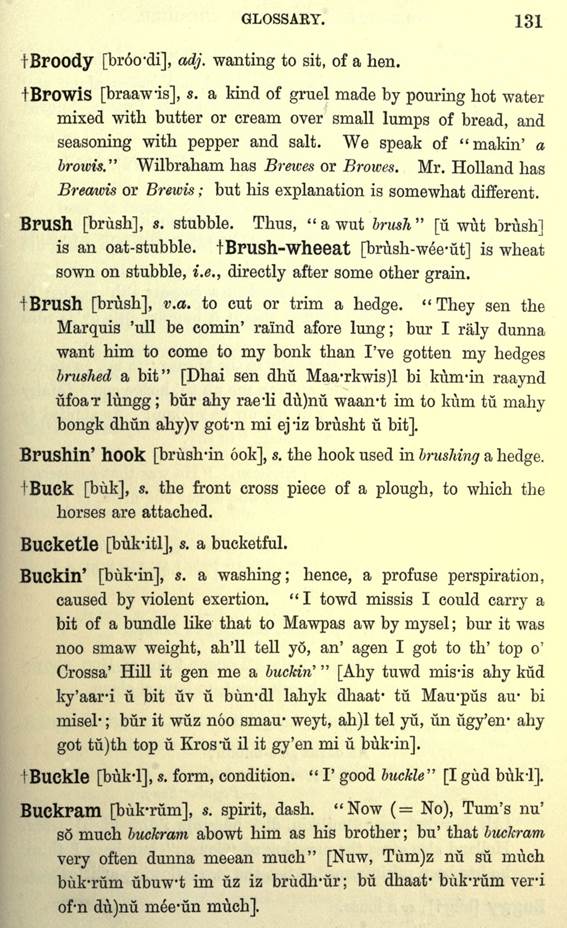
(delwedd C4445) (tudalen 131)
|
GLOSSARY. 131
t Broody [br6o-di], adj. wanting to sit, of a hen.
tBPOWiS [braawis], s. a kind of gruel made by pouring hot water mixed with
butter or cream over small lumps of bread, and seasoning with pepper and
salt. We speak of "makin' a broivis." Wilbraham has Brewes or
Browes. Mr. Holland has Breawis or Brewis ; but his explanation is somewhat
different.
Brush [brush], s. stubble. Thus, "a wut brush" [u wut brush] is an
oat-stubble, t Brush- wheeat [brush-wee-ut] is wheat sown on stubble, i.e.,
directly after some other grain.
t Brush [brush], v.a. to cut or trim a hedge. "They sen the Marquis 'ull
be comin' raind afore lung; bur I raly dunna want him to come to my bonk than
I've gotten my hedges brushed a bit" [Dhai sen dhu Maa*rkwis)l bi kunrin
raaynd ufoaT lungg ; bur ahy raeli du)nu waan-t im to kum tu mahy bongk dhun
ahy)v got-n mi ej iz brusht u bit].
Brushin' hook [brush-in 6ok], s. the hook used in brushing a hedge.
iBuek [buk], s. the front cross piece of a plough, to which the horses are
attached.
Bueketle [buk-itl], s. a bucketful.
Buekin' [buk-in], s. a washing; hence, a profuse perspiration, caused by
violent exertion. "I towd missis I could carry a bit of a bundle like
that to Mawpas aw by mysel ; bur it was noo smaw weight, ah'll tell yo, an'
agen I got to th' top o' Crossa' Hill it gen me a buckin'“ [Ahy tuwd mis'is
ahy kud ky'aari u bit uv u binrdl lahyk dhaat* tu Mau'pus au- bi misel- ; bur
it wuz noo smau' weyt, ah)l tel yu, un ugy'en- ahy got tu)th top u Kros-u il
it gy'en mi u buk-in].
I Buckle [buk-1], s. form, condition. “I' good buckle" [I gud buk-1].
Buckram [buk-rum], s. spirit, dash. "Now (= No), Turn's nu' so much
buckram abowt him as his brother ; bu' that buckram very often dunna meean
much" [Nuw, Tum)z nu su much buk-rum ubuwt im uz iz brudh-ur ; bu dhaat'
buk-rum ver-i of-n du)nu mee*un much].
|
|
|
|
|
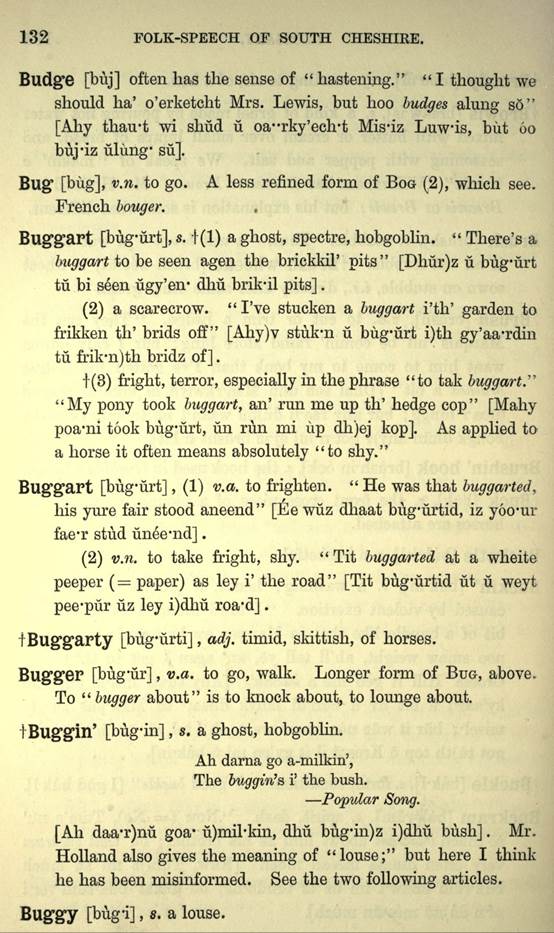
(delwedd C4446) (tudalen 132)
|
132 FOLK-SPEECH OF SOUTH CHESHIRE.
Budge [buj] often lias the sense of "hastening." "I thought we
should ha' o'erketcht Mrs. Lewis, but hoo budges alung so" [Ahy thau-t
wi shud u oa'-rky'ech-t Mis-iz Luw-is, but 60 buj'iz ulung* su].
Bug [bug], v.n. to go. A less refined form of BOG (2), which see. French
longer. .
Buggart [bug-urt], s. f(l) a ghost, spectre, hobgoblin. “There's a buggart to
be seen agen the brickkil' pits" [Dhur)z u bug-urt tu bi seen ugy'en-
dhu brik-il pits] .
(2) a scarecrow. “I've stucken a buggart i'th' garden to frikken th' brids
off" [Ahy)v stuk-n u bug-urt i)th gy'aa-rdin tu rik-n)th bridz of] .
t(3) fright, terror, especially in the phrase "to tak buggart."
"My pony took buggart, an' run me up th' hedge cop" [Mahy poa-ni
took bug-urt, un run mi up dhjej kop]. As applied to a horse it often means
absolutely "to shy."
Buggart [bug-urt] , (1) v.a. to frighten. “He was that buggarted, his yure
fair stood aneend" [Ee wuz dhaat bug-urtid, iz yoo-ur fae-r stud
unee-nd] .
(2) v.n. to take fright, shy. "Tit buggarted at a wheite peeper (=
paper) as ley i' the road" [Tit bug'urtid ut u weyt pee-pur uz ley i)dhu
roa-d] .
tBuggarty [bug-urti] , adj. timid, skittish, of horses.
Bugger [bug'iir] , v.a. to go, walk. Longer form of BUG, above. To “bugger
about" is to knock about, to lounge about.
tBuggin' [bug-in] , s. a ghost, hobgoblin.
Ah darna go a-milkin', The buggin's i' the bush.
Popular Song.
[Ah daa'r)nu goa- u)mil-kin, dhu bug-in)z i)dhu bush] . Mr. Holland also
gives the meaning of "louse;" but here I think he has been
misinformed. See the two following articles.
Buggy [bug-i] , s. a louse.
|
|
|
|
|
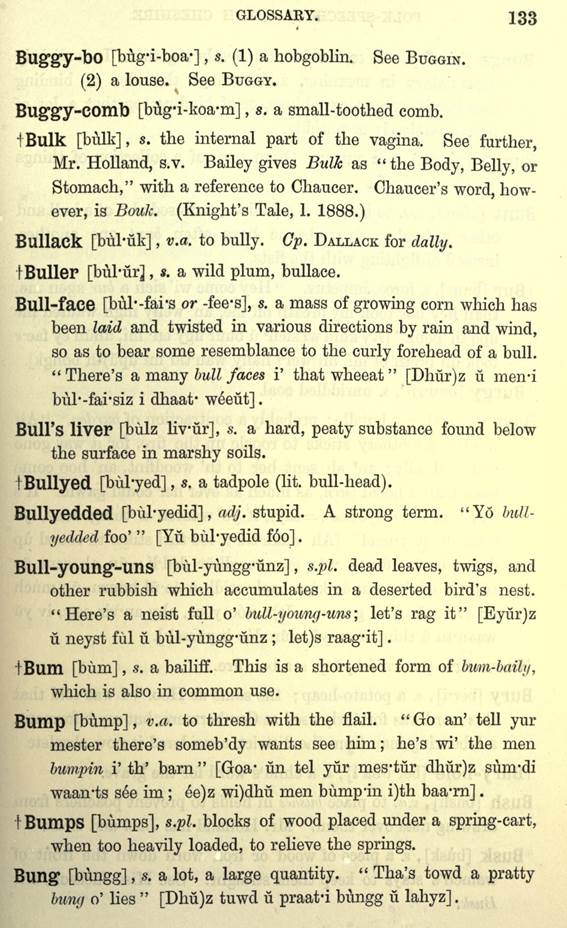
(delwedd C4447) (tudalen 133)
|
GLOSSARY. 133
Buggy-bO [bug-i-boa-] , s. (I) a hobgoblin. See BUGGIN. (2) a louse. See
BUGGY.
Buggy-comb [bug'i-koa-m] , s. a small-toothed comb.
tBulk [bulk], s. the internal part of the vagina. See further, Mr. Holland,
s.v. Bailey gives Bulk as "the Body, Belly, or Stomach," with a
reference to Chaucer. Chaucer's word, however, is Bouk. (Knight's Tale, 1.
1888.)
Bullack [bul-uk] , v.a. to bully. Cp. DALLACK for dally. tBuller [bul-ur] ,
*. a wild plum, bullace.
Bull-face [bul'-fai'S or -fee's], s. a mass of growing corn which has been
laid and twisted in various directions by rain and wind, so as to bear some
resemblance to the curly forehead of a bull. "There's a many bull faces
i' that wheeat” [Dhur)z u men-i bul'-fai-siz i dhaat* we"eut].
Bull's liver [bulz livur], s. a hard, peaty substance found below
the surface in marshy soils. tBullyed [bul-yed] , s. a tadpole (lit.
bull-head).
Bullyedded [bul-yedid], adj. stupid. A strong term. "Yo bull-yeddecl foo'“
[Yu bul-yedid f6o] .
Bull-young-uns [bul-yimgg-unz] , s.pl. dead leaves, twigs, and other rubbish
which accumulates in a deserted bird's nest. "Here's a neist full o'
lull-young -uns ; let's rag it" [Eyur)z u neyst ful u bul-yungg-unz ;
let)s raag-it] .
tBum [bum] , s. a bailiff. This is a shortened form of bum-baily, which is
also in common use.
Bump [bump] , v.a. to thresh with the flail. “Go an' tell yur mester there's
someb'dy wants see him; he's wi' the men bumpin i' th' barn" [Goa- un
tel yur mes-tur dhur)z sunrdi waanis s6e im ; ee)z wi)dhu men bump -in i)th
baa-rn] .
t Bumps [bumps], s. pi. blocks of wood placed under a spring-cart, when too
heavily loaded, to relieve the springs.
Bung [bungg] , s. a lot, a large quantity. “Tha's towd a pratty buntj o'
lies” [Dhu)z tuwd u praat-i bungg u lahyz].
|
|
|
|
|
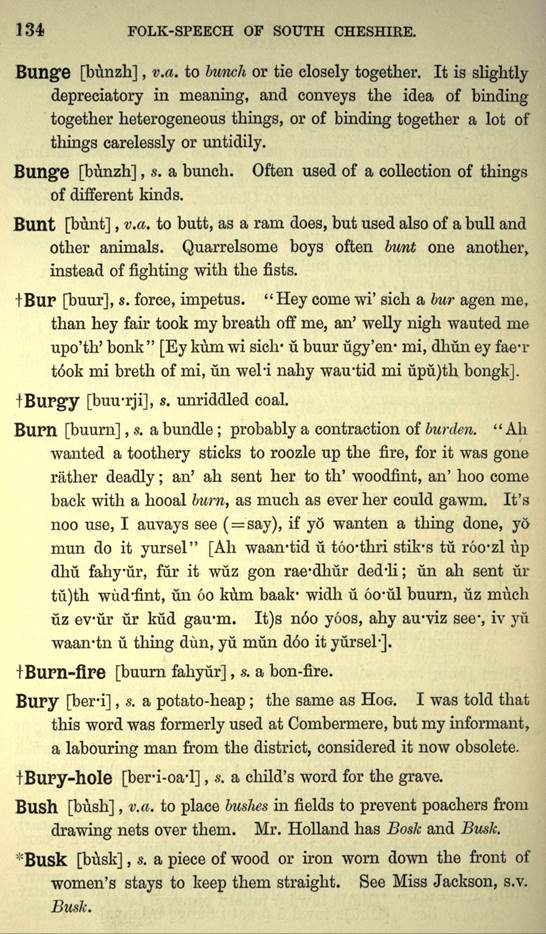
(delwedd C4448) (tudalen 134)
|
134 FOLK-SPEECH OF SOUTH
CHESHIRE.
Bunge [bunzh] , v.a. to bunch or tie closely together. It is slightly
depreciatory in meaning, and conveys the idea of binding-together
heterogeneous things, or of binding together a lot of things carelessly or
untidily.
Bunge [bunzh] , s. a bunch. Often used of a collection of things of different
kinds.
Bunt [bunt] , v.a. to butt, as a ram does, but used also of a bull and other
animals. Quarrelsome boys often bunt one another, instead of fighting with
the fists.
IBur [buur], s. force, impetus. "Hey come wi' sich a bur agen me, than
hey fair took my breath off me, an' welly nigh wauted me upo'th' bonk” [Ey
kum wi sich' u buur ugy'en- mi, dhun ey fae-r t6ok mi breth of mi, un weli
nahy wau'tid mi upu)th bongk].
IBurgy [buu-rji], s. unriddled coal.
Burn [buurn] , s. a bundle ; probably a contraction of burden. "Ah
wanted a toothery sticks to roozle up the fire, for it was gone rather deadly
; an' ah sent her to th' woodfint, an' hoo come back with a hooal burn, as
much as ever her could gawm. It's noo use, I auvays see ( = say), if yo
wanten a thing done, yo mun do it yursel" [Ah waan'tid u too'thri stik'S
tu roo'zl up dhu fahyur, fur it wuz gon rae'dhur ded'li ; im ah sent ur tu)th
wud'fint, un 60 kum baak f widh u oo'ul buurn, uz much uz evur ur kud gau-m.
It)s n6o yoos, ahy au-viz see 1 , iv yu waan-tn u thing dun, yu mun d6o it
yursel-].
IBurn-fire [buurn fahyur] , s. a bon-fire.
Bury [ber'i] , s. a potato-heap ; the same as HOG. I was told that this word
was formerly used at Combermere, but my informant, a labouring man from the
district, considered it now obsolete.
f Bury-hole [beri-oa-1] , s. a child's word for the grave.
Bush [bush] , v.a. to place bushes in fields to prevent poachers from
drawing nets over them. Mr. Holland has Bosk and Busk. *Busk [busk] , s. a
piece of wood or iron worn down the front of
women's stays to keep them straight. See Miss Jackson, s.v.
Busk.
|
|
|
|
|
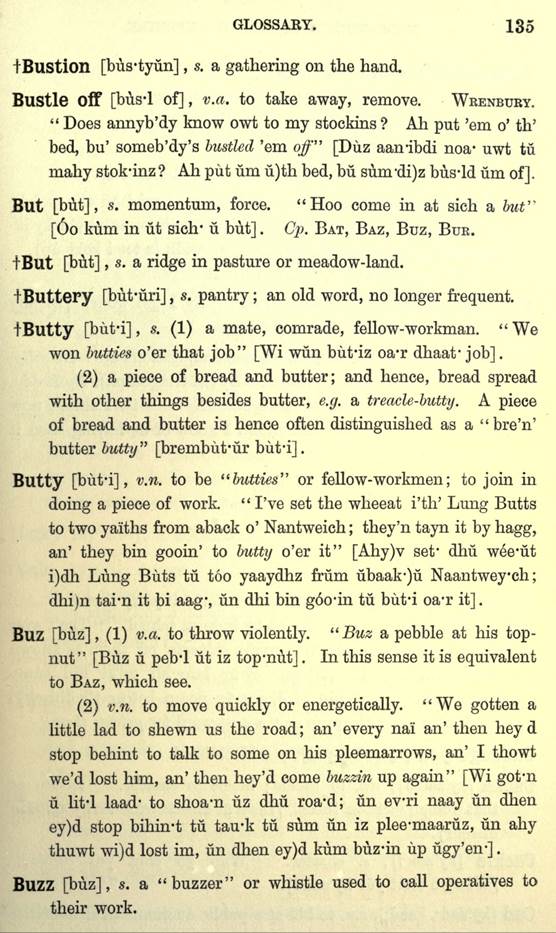
(delwedd C4449) (tudalen 135)
|
GLOSSARY. 135
tBustion [bus-tyun] , s. a gathering on the hand.
Bustle Off [bus-1 of] , v.a. to take away, remove. WKENBUBY. “Does annyb'dy
know owt to my stockins ? Ah put 'em o' th' bed, bu' someb'dy's bustled 'em
off" [Duz aanibdi noa- uwt tu mahy stok-inz ? Ah put urn u)th bed, bu
sunrdi)z bus-Id urn of].
But [but], s. momentum, force. "Hoo come in at sich & but" [60
kum in ut sich' u but] . Cp. BAT, BAZ, Buz, BUR.
tBut [but] , s. a ridge in pasture or meadow-land.
f Buttery [but-uri] , s. pantry ; an old word, no longer frequent.
tButty [but-i], s. (1) a mate, comrade, fellow-workman. "We won butties
o'er that job" [Wi wun but-iz oa-r dhaat- job] .
(2) a piece of bread and butter; and hence, bread spread with other things
besides butter, e.g. a treacle-butty. A piece of bread and butter is hence
often distinguished as a "bre'n' butter butty" [brembut-ur but-i].
Butty [but-i] , v.n. to be "butties" or fellow- workmen ; to join
in doing a piece of work. “I've set the wheeat i'th' Lung Butts to two
yaiiths from aback o' Nantweich ; they'n tayn it by hagg, an' they bin gooin'
to butty o'er it" [Ahy)v set' dhu wee-ut i)dh Liing Buts tu too yaaydhz
Mm ubaak-)u Naantweych; dhi)n tai-n it bi aag-, un dhi bin g6o-in tu but-i oa
f r it] .
Buz [buz] , (1) v.a. to throw violently. "Buz a pebble at his
top-nut" [Buz u peb-1 ut iz top-nut] . In this sense it is equivalent to
BAZ, which see.
(2) v.n. to move quickly or energetically. "We gotten a little lad to
shewn us the road ; an' every nai an' then hey d stop behint to talk to some
on his pleemarrows, an' I thowt we'd lost him, an' then hey'd come buzzin up
again" [Wi got-n u lit-1 laad- to shoa-n uz dhu roa-d; un evri naay im
dhen ey)d stop bihin-t tu tau-k tu sum un iz plee-maaruz, im ahy thuwt wi)d
lost im, un dhen ey)d kum buz-in up ugy'en-] .
BUZZ [buz], s. a "buzzer" or whistle used to call operatives to
their work.
|
|
|
|
|

(delwedd C4450) (tudalen 136)
|
136 FOLK-SPEECH OF SOUTH
CHESHIKE.
tBuzzoek [buz-uk] , s. a donkey.
If I had a buzzack, an' hey wudna go,
Wudna I wollup him ? Oh, no, no !
I'd stuff him wi' wuts (oats),
An' I'd kick him i' the guts,
An' I'd may him go with his teel cocked up.
[Iv ahy aad- u buz-uk, un ey wud)nu goa-, wud)nu ahy wol-up im ? Oa-, noa-,
noa- ! Ahy)d stuf im wi wuts, un ahy)d ky'ik-im i)dhu guts, un ahy)d mai- im
goa- widh iz tee-1 kokt up] . Not bussock, as Mr. Holland has it.
By [bahy, bi], conj. by the time that. “By I get worn" [Bi ahy gy'et
worn] =by the time I get home.
By [bahy, bi] , prep. The most common adjurations are : By ffolli/, Bygom, By
gommins, By Jings(='Bj St. Gingoulph), By Leddy, (= By our Lady), By the
makkins. By mass is, I think, now obsolete ; the last old man whom I know of
as having used it has recently died.
By nai [bi naay] , adv. by this time.
C.
Cabbage [ky'aab-ij] , v.a. (I) to pilfer, commit petty thefts.
(2) to copy. A word used by boys at school. “Tha't ever
likely get thy sums reight, auvays cdbbagin* off them as known
better till thysel" [Dhaa)t evur lahykli gy'et dhi sumz
reyt, au-viz ky'aab-ijin of dhem uz noa-n bet-ur til dhisel'] .
Bailey gives CABBAGE as “a cant word for private theft.'"
Cabbage-yed [ky'aab-ij-yed] , s. a block-head.
Cacka [ky'aak'u], v.n. to cackle; hence to chatter. "Listen at that
woman cacka-irf theer” [Lis*n ut dhaat' wunrun ky'aak-uin dheeur] .
Cackle [ky'aak-1], s. chatter. "Wun yo shut yur cackle?' 1 [Wun)yu shut
yur ky'aak'l] .
Cad [ky'aad-, kaad'], v.n. to bid at a public auction. WRENBURY.
|
|
|
|
|
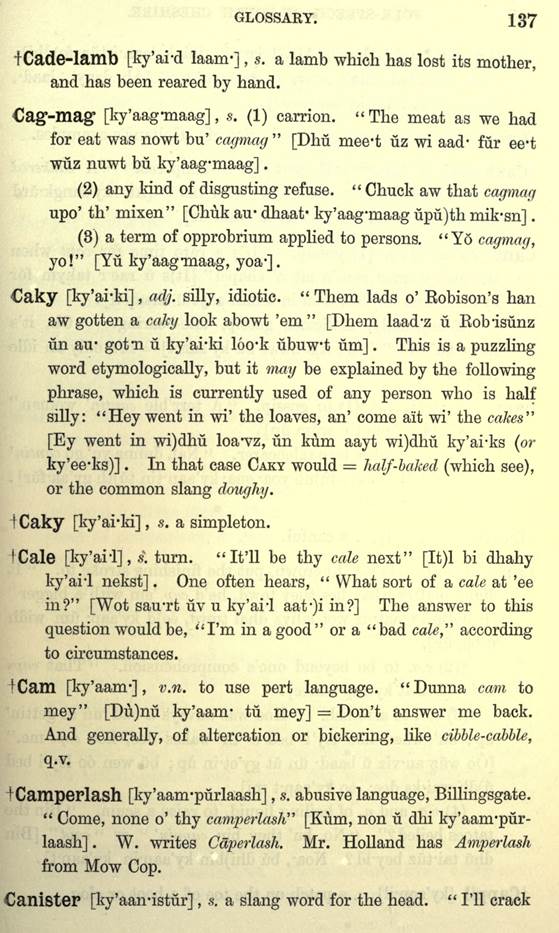
(delwedd C4451) (tudalen 137)
|
GLOSSARY. 137
tCade-lamb [ky'ai-d laam-] , s. a lamb which has lost its mother, and has
been reared by hand.
[ky'aag-maag], s. (1) carrion. "The meat as we had
for eat was nowt bu' cagmag” [DM mee-t uz wi aad- fur ee-t wuz nuwt bu
ky'aag-maag] .
(2) any kind of disgusting refuse. “Chuck aw that cagmag upo' th' mixen"
[Chuk au- dhaat- ky'aag-maag upu)th mik-sn] .
(8) a term of opprobrium applied to persons. “Yo cagmag, yo!" [Yu
ky'aag-maag, yoa-].
Caky [ky'ai-ki] , adj. silly, idiotic. “Them lads o' Eobison's han aw gotten
a caky look abowt 'em" [Dhem laad'z u Bobisunz un au- gotn u ky'ai-ki
16o-k ubuwt urn] . This is a puzzling word etymologically, but it may be
explained by the following phrase, which is currently used of any person who
is half silly: "Hey went in wi' the loaves, an' come ait wi' the
cakes" [Ey went in wi)dhu loa-vz, un kum aayt wi)dhu ky'ai-ks (or
ky'ee-ks)] . In that case CAKY would = Jmlf-baked (which see), or the common
slang doughy.
tCaky [ky'ai-ki] , s. a simpleton.
fCale [ky'ail], . turn. "It'll be thy cole next" [It)l bi dhahy
ky'aii nekst] . One often hears, “What sort of a cole at 'ee in?" [Wot
sau-rt uv u ky'ai'l aat-)i in?] The answer to this question would be,
"I'm in a good" or a "bad cale," according to
circumstances.
tCam [ky'aam-], v.n. to use pert language. "Dunna cam to mey"
[Du)nu ky'aam- tu mey] = Don't answer me back. And generally, of altercation
or bickering, like cibble-cabble, q.v.
f Camperlash [ky'aam-purlaash] , s. abusive language, Billingsgate. “Come,
none o' thy camperlasJi" [Kum, non u dhi ky'aam-pur-laash] . W. writes
Cdperlash. Mr. Holland has Amperlash from Mow Cop.
Canister [ky'aan-istur] , s. a slang word for the head. “I'll crack
|
|
|
|
|
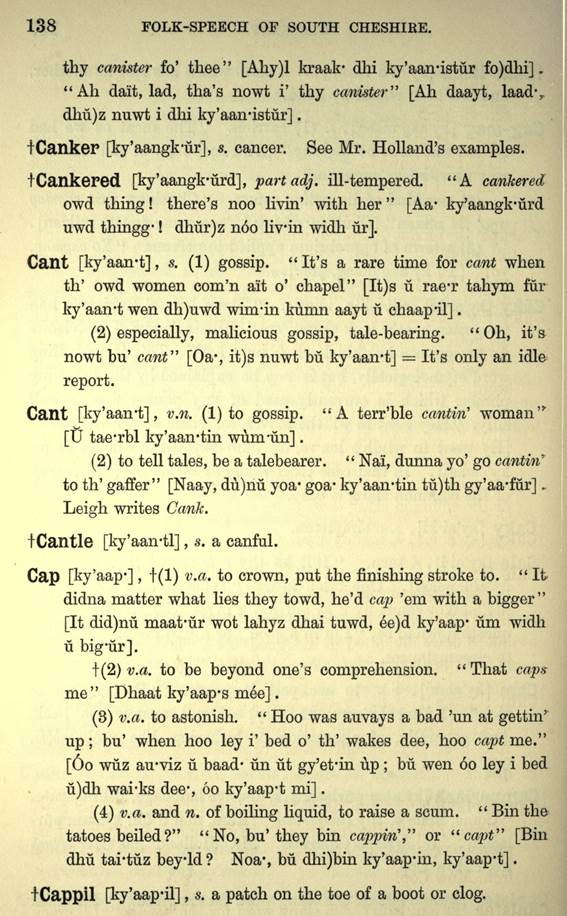
(delwedd C4452) (tudalen 138)
|
138 FOLK-SPEECH OF SOUTH CHESHIRE.
thy canister fo' thee" [Ahy)l kraak- dhi ky'aan-istur fo)dhi] . "Ah
dait, lad, tha's nowt i' thy canister" [Ah daayt, laad% dhu)z nuwt i dhi
ky'aan-istur] .
f Canker [ky'aangk-ur], s. cancer. See Mr. Holland's examples.
t Cankered [ky'aangk-urd], part adj. ill-tempered. "A cankered owd thing
! there's noo livin' with her” [Aa- ky'aangk-urd uwd thingg- ! dhur)z n6o
livin widh ur].
Cant [ky'aan-t] , s. (1) gossip. “It's a rare time for cant when th' owd
women com'n ait o' chapel" [It)s u rae-r tahym fur ky'aan-t wen dh)uwd
wmrin kumn aayt u chaapil] .
(2) especially, malicious gossip, tale-bearing. "Oh, it's nowt bu'
cant" [Oa-, it)s nuwt bu ky'aan-t] = It's only an idle report.
Cant [ky'aan-t], v.n. (1) to gossip. "A terr'ble cantirf
woman"" [U tae-rbl ky'aan-tin wunrun] .
(2) to tell tales, be a talebearer. “Nai, dunna yo' go cantin' to th'
gaffer" [Naay, du)nu yoa- goa- ky'aan-tin tu)th gy'aa-fur] . Leigh
writes Cank.
tCantle [ky'aan-tl] , s. a canful.
Cap [ky'aap-] , f (1) v.a. to crown, put the finishing stroke to. “It didna
matter what lies they towd, he'd cap 'em with a bigger" [It did)nu
maat'ur wot lahyz dhai tuwd, ee)d ky'aap' um widh u big'ur].
t(2) v.a. to be beyond one's comprehension. "That caps me" [Dhaat
ky'aap-s mee] .
(3) v.a. to astonish. “Hoo was auvays a bad 'un at gettin' up ; bu' when hoo
ley i' bed o' th' wakes dee, hoo capt me." [60 wuz au-viz u baad- un ut
gy'et'in up ; bu wen 60 ley i bed u)dh wai-ks dee-, 60 ky'aap-t mi] .
(4) v.a. and n. of boiling liquid, to raise a scum. “Bin the tatoes beiled
?" “No, bu' they bin cappin'," or "capt" [Bin dhu tai-tuz
beyld ? Noa', bu dhi)bin ky'aap-in, ky'aap-t] .
f Cappil [ky'aap-il] , s. a patch on the toe of a boot or clog.
|
|
|
|
|
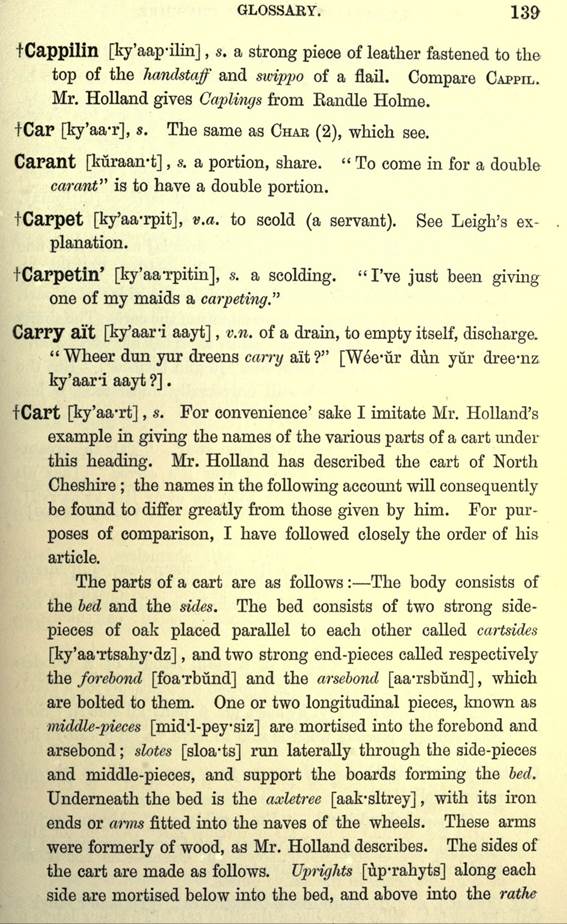
(delwedd C4453) (tudalen 139)
|
GLOSSARY.
f Cappilin [ky'aap-ilin] , s. a strong piece of leather fastened to the top
of the liandstaff and sivippo of a flail. Compare CAPPIL. Mr. Holland gives
Caplings from Eandle Holme.
iCar [ky'aa-r], s. The same as CHAR (2), which see.
Carant [kuraan-t] , s. a portion, share. “To come in for a double
carant" is to have a double portion.
t Carpet [ky'aa-rpit], v.a. to scold (a servant). See Leigh's explanation.
tCarpetin' [ky'aa-rpitin], s. a scolding. "I've just been giving one of
my maids a carpeting"
Carry ait [ky'aari aayt] , v.n. of a drain, to empty itself, discharge.
“Wheer dun yur dreens carry ait?" [Wee-ur dun yur dree-nz ky'aari aayt
?] .
f Cart [ky'aa-rt] , s. For convenience' sake I imitate Mr. Holland's example
in giving the names of the various parts of a cart under this heading. Mr.
Holland has described the cart of North Cheshire ; the names in the following
account will consequently be found to differ greatly from those given by him.
For purposes of comparison, I have followed closely the order of his article.
The parts of a cart are as follows : The body consists of the bed and the
sides. The bed consists of two strong side-pieces of oak placed parallel to
each other called cartsides [ky'aa'rtsahydz] , and two strong end-pieces called
respectively the forebond [foa*rbund] and the arsebond [aa-rsbund] , which
are bolted to them. One or two longitudinal pieces, known as middle-pieces
[midl-peysiz] are mortised into the forebond and arsebond ; slotes [sloa-ts]
run laterally through the side-pieces and middle-pieces, and support the
boards forming the bed. Underneath the bed is the axletree [aak-sltrey] ,
with its iron ends or arms fitted into the naves of the wheels. These arms
were formerly of wood, as Mr. Holland describes. The sides of the cart are
made as follows. Uprights [up-rahyts] along each side are mortised below into
the bed, and above into the rathe
|
|
|
|
|
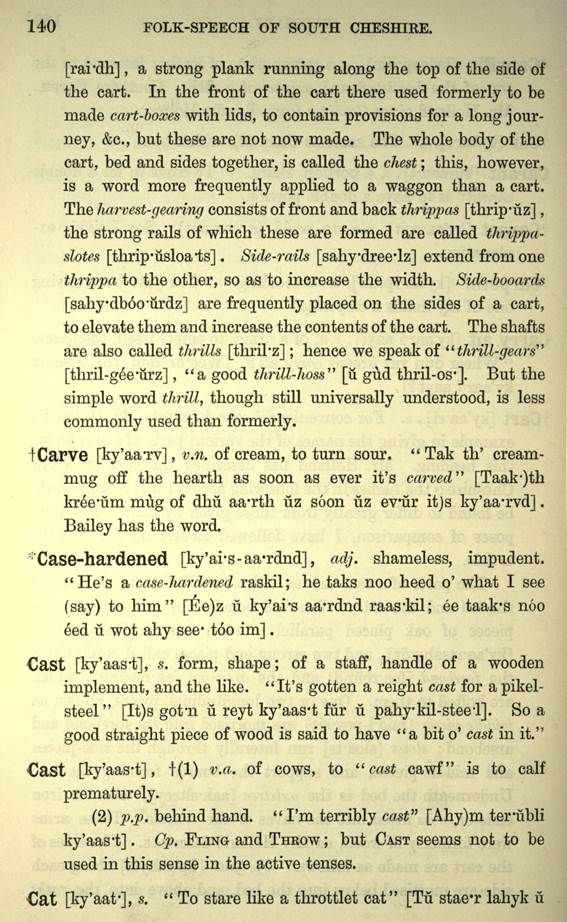
(delwedd C4454) (tudalen 140)
|
FOLK-SPEECH OF SOUTH CHESHIRE.
[rai'dh], a strong plank running along the top of the side of the cart. In
the front of the cart there used formerly to be made cart-boxes with lids, to
contain provisions for a long journey, &c., but these are not now made.
The whole body of the cart, bed and sides together, is called the chest ;
this, however, is a word more frequently applied to a waggon than a cart. The
harvest-gearing consists of front and back tlirippas [thrip*uz] , the strong
rails of which these are formed are called thrippa-slotes [thrip'iisloais] .
Side-rails [sahydree'lz] extend from one tlirippa to the other, so as to
increase the width. Side-booards [sahydboo'iirdz] are frequently placed on
the sides of a cart, to elevate them and increase the contents of the cart.
The shafts are also called thrills [thriTz] ; hence we speak of “thrill-
gears" [thril-gee-urz] , "a good thrill-hoss" [u gud
thril-os-]. But the simple word thrill, though still universally understood,
is less commonly used than formerly.
t Carve [ky'aa-rv], v.n. of cream, to turn sour. "Tak th' cream-mug oif
the hearth as soon as ever it's carved" [Taak-)th kree'um mug of dhu
aa*rth uz soon uz evur itjs ky'aa*rvd] . Bailey has the word.
"Case-hardened [ky'ars-aa-rdnd], adj. shameless, impudent. "He's a
case-Jiardened raskil; he taks noo heed o' what I see (say) to him"
[Ee)z u ky'ars aa-rdnd raas-kil; ee taak-s noo eed u wot ahy see- too im] .
Cast [ky'aas*t], s. form, shape; of a staff, handle of a wooden implement,
and the like. "It's gotten a reight cast for a pikel-steel” [It)s got MI
u reyt ky'aas-t fur u pahykil-steel]. So a good straight piece of wood is
said to have "a bit o' cast in it."
Cast [ky'aas't] , t(l) v.a. of cows, to “cast cawf" is to calf
prematurely.
(2) p.p. behind hand. "I'm terribly cast 11 [Ahy)m terubli ky'aas-t] .
Cp. FLING and THROW ; but CAST seems not to be used in this sense in the
active tenses.
at [ky'aat-], s. “To stare like a throttlet cat" [Tu stae-r lahyk u
|
|
|
|
|
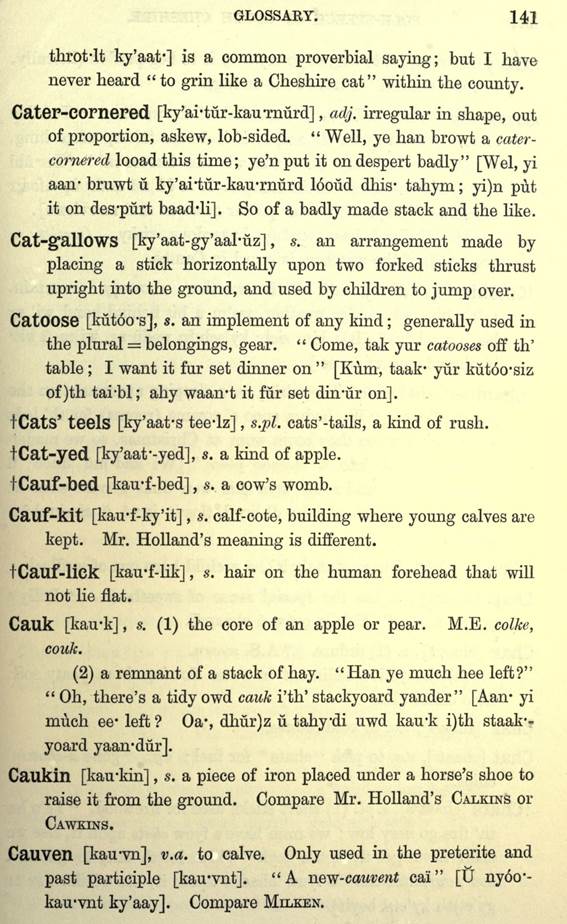
(delwedd C4455) (tudalen 141)
|
GLOSSARY.
throt'lt ky'aat'] is a common proverbial saying; but I have never heard “to
grin like a Cheshire cat" within the county.
Cater-eornered [ky'artur-kau-rnurd] , adj. irregular in shape, out of
proportion, askew, lob-sided. “Well, ye han browt a eater-cornered looad this
time ; ye'n put it on despert badly" [Wei, yi aan- bruwt u
ky'artur-kau-rnurd 16oud dhis- tahym ; yi)n put it on des-purt baad-li]. So
of a badly made stack and the like.
Cat-gallows [ky'aat-gy'aal-uz] , s. an arrangement made by placing a stick
horizontally upon two forked sticks thrust upright into the ground, and used
by children to jump over.
CatOOSe [kut6o-s], s. an implement of any kind ; generally used in the plural
= belongings, gear. “Come, tak yur catooses off th' table ; I want it fur set
dinner on” [Kum, taak- yur kutoo'siz of)th tai-bl ; ahy waan*t it fur set
din'ur on].
tCats' teels [ky'aat-s tee-lz] , s.pl. cats'-tails, a kind of rush. ICat-yed
[ky'aat *-yed], s. a kind of apple. I Cauf-bed [kau-f-bed] , s.. a cow's
womb.
Cauf-kit [kau-f-ky'it] , s. calf-cote, building where young calves are kept.
Mr. Holland's meaning is different.
ICauf-lick [kau'f-lik] , s. hair on the human forehead that will
not lie flat. Cauk [kau-k] , s. (1) the core of an apple or pear. M.E. colke,
couk.
(2) a remnant of a stack of hay. "Han ye much hee left?"
" Oh, there's a tidy owd cauk i'th' stackyoard yander" [Aan- yi
much ee' left ? Oa', dhur)z u tahydi uwd kau'k i)th staak'-
yoard yaan-dur].
Caukin [kau-kin] , s. a piece of iron placed under a horse's shoe to
raise it from the ground. Compare Mr. Holland's CALKINS or
CAWKINS. Cauven [kau-vn], v.a. to calve. Only used in the preterite and
past participle [kairvnt], "A new-cauvent cai" [U ny6o*-
kau-vnt ky'aay]. Compare MILKEN.
|
|
|
|
|
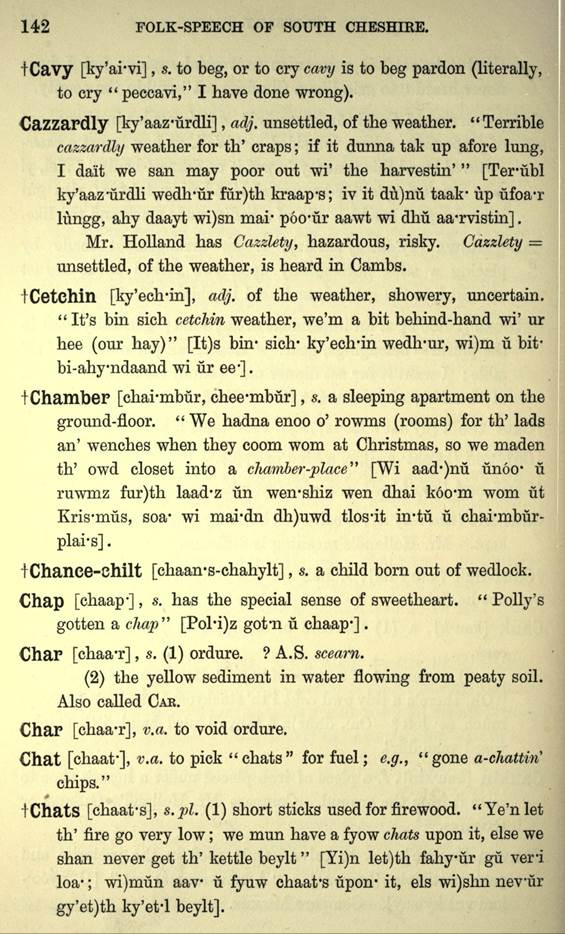
(delwedd C4456) (tudalen 142)
|
142 FOLK-SPEECH OF SOUTH CHESHIRE.
tCavy [ky'ai-vi] , s. to beg, or to cry cavy is to beg pardon (literally, to
cry “peccavi," I have done wrong).
Cazzardly [ky'aaz-urdli] , adj. unsettled, of the weather. “Terrible
cazzardly weather for th' craps ; if it dunna tak up afore lung, I dait we
san may poor out wi' the harvestin'“ [Terubl ky'aaz-urdli wedh-ur fur)th
kraap-s; iv it du)nu taak- up ufoa-r lungg, ahy daayt wi)sn mai* poo-ur aawt
wi dhu aa-rvistin] .
Mr. Holland has Cazzlety, hazardous, risky. Cazzlety = unsettled, of the
weather, is heard in Cambs.
tCetehin [ky'eclrin], adj. of the weather, showery, uncertain. "It's bin
sich cetchin weather, we'm a bit behind-hand wi' ur hee (our hay)" [It)s
bin* sich' ky'eclrin wedh-ur, wi)m u bit' bi-ahyndaand wi ur ee-] .
I Chamber [chai-mbur, chee-mbur] , s. a sleeping apartment on the
ground-floor. “We hadna enoo o' rowms (rooms) for th' lads an' wenches when
they coom worn at Christmas, so we maden th' owd closet into a
cJutmber-place" [Wi aad-)nu undo* u ruwmz fur)th laad-z un wen-shiz wen
dhai koo-m worn ut Kris-mus, soa* wi mai-dn dh)uwd tics-it in-tu u
charmbur-plai*s] .
tChance-chilt [chaan-s-chahylt] , s. a child born out of wedlock.
Chap [chaap-] , s. has the special sense of sweetheart. “Polly's gotten a
chap" [PoH)z got*n u chaap*] .
Char [chaa-r] , s. (1) ordure. ? A.S. scearn.
(2) the yellow sediment in water flowing from peaty soil. Also called CAB.
Char [chaa*r], v.a. to void ordure.
Chat [chaat-], v.a. to pick "chats" for fuel; e.g., "gone
a-chattiri chips."
IChatS [chaat-s], s.pl. (I) short sticks used for firewood. "Ye'nlet th'
fire go very low ; we mun have a fyow chats upon it, else we shan never get
th' kettle beylt” [Yi)n let)th fahyur gu veri loa* ; wi)mun aav u fyuw
chaat's upon* it, els wi)shn nevur gy'et)th ky'et-1 beylt].
|
|
|
|
|
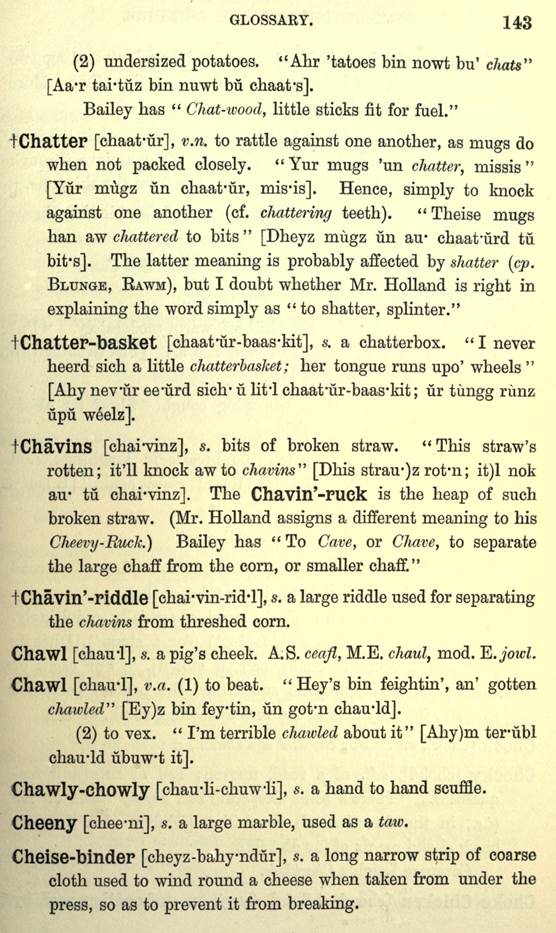
(delwedd C4457) (tudalen 143)
|
GLOSSAKY. 143
(2) undersized potatoes. "Ahr 'tatoes bin nowt bu' chats" [Aa-r
tai-tuz bin nuwt bu chaat-s].
Bailey has “Chat-wood, little sticks fit for fuel."
t Chatter [chaat-ur], v.n. to rattle against one another, as mugs do when not
packed closely. "Yur mugs 'un chatter, missis" [Yur mugz un
chaat-ur, mis-is]. Hence, simply to knock against one another (cf.
cliattering teeth). “Theise mugs han aw chattered to bits” [Dheyz mugz un au-
chaat'urd tu bit-s]. The latter meaning is probably affected by shatter (cp.
BLUNGE, EAWM), but I doubt whether Mr. Holland is right in explaining the
word simply as "to shatter, splinter."
t Chatter-basket [chaat-ur-baas-kit], s. a chatterbox. “I never heerd sich a
little chatterbasket ; her tongue runs upo' wheels” [Ahy nevur ee-urd sich- u
lit! chaat-ur-baas-kit ; ur tungg runz upu we"elz].
tChavins [chai-vinz], s. bits of broken straw. "This straw's rotten; it'll
knock aw to chavins" [Dhis strau-)zrot-n; it)l nok au- tu chai-vuiz].
The Chavin'-ruek is the heap of such broken straw. (Mr. Holland assigns a
different meaning to his Cheevy-Ruck.) Bailey has "To Cave, or Chave, to
separate the large chaff from the corn, or smaller chaff."
tChavin'-riddle [chai-vin-rid-1], s. a large riddle used for separating the
chavins from threshed corn.
Chawl [chaui], s. a pig's cheek. A.S. ceafl, M.E. chaul, mod. E.jowl.
Chawl [chau-1], v.a. (1) to beat. “Key's bin feightin', an' gotten
cliawled" [Ey)z bin fey-tin, un got-n chau-ldj.
(2) to vex. “I'm terrible chawled about it" [Ahy)m ter-ubl chau-ld ubuwt
it].
Chawly-ehowly [chau-li-chuw-H], s. a hand to hand scuffle. Cheeny [chee-ni],
s. a large marble, used as a taw.
Cheise-binder [cheyz-bahy-ndur], s. a long narrow strip of coarse cloth used
to wind round a cheese when taken from under the press, so as to prevent it
from breaking.
|
|
|
|
|
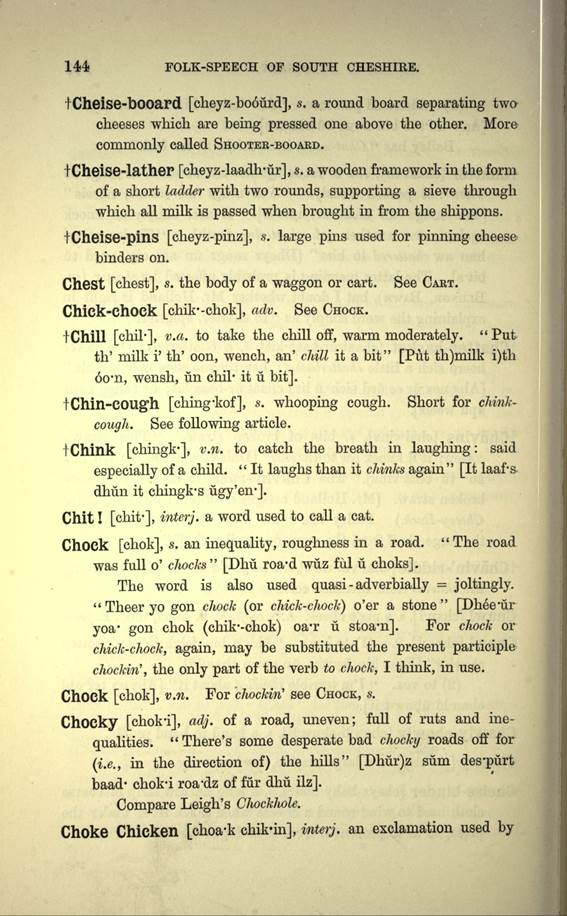
(delwedd C4458) (tudalen 144)
|
FOLK-SPEECH OF SOUTH CHESHIRE.
iCheise-bOOard [cheyz-bo6urd], s. a round board separating two cheeses which
are being pressed one above the other. More commonly called SHOOTER-BOOARD.
tCheise-latheP [cheyz-laadh-ur], s. a wooden framework in the form of a short
ladder with two rounds, supporting a sieve through which all milk is passed
when brought in from the shippons.
tCheise-pinS [cheyz-pinz], s. large pins used for pinning cheese
binders on.
Chest [chest], s. the body of a waggon or cart. See CART. Chick-chock
[chik--chok], adv. See CHOCK.
IChill [chil-], v.a. to take the chill off, warm moderately. “Put th' milk i'
th' oon, wench, an' chill it a bit" [Put th)milk i)th 6o-n, wensh, un
chil- it u bit].
t Chin-COUgh [ching-kof], 6'. whooping cough. Short for chink-cough. See
following article.
tChink [chingk-], v.n. to catch the breath in laughing: said especially of a
child. “It laughs than it chinks again" [It laaf-s dhun it chingk- s
ugy'en-].
Chit ! [chit-], inter j. a word used to call a cat.
Chock [chok], s. an inequality, roughness in a road. “The road was full o'
chocks" [Dhu roa-d wuz ful u choks].
The word is also used quasi - adverbially = joltingly. "Theer yo gon
chock (or chick-chock) o'er a stone" [Dhee-ur yoa- gon chok (chik--chok)
oa-r u stoa-n]. For chock or chick-chock, again, may be substituted the
present participle chocking the only part of the verb to chock, I think, in
use.
Chock [chok], v.n. For chockin' see CHOCK, s.
ChOCky [chok-i], adj. of a road, uneven; full of ruts and inequalities.
“There's some desperate bad chocky roads off for (i.e., in the direction of)
the hills" [Dhur)z sum des-purt baad- chok-i roa'dz of fur dhu ilz].
Compare Leigh's Chockhole.
Choke Chicken [choa-k chik'in], interj. an exclamation used by
|
|
|
|
|
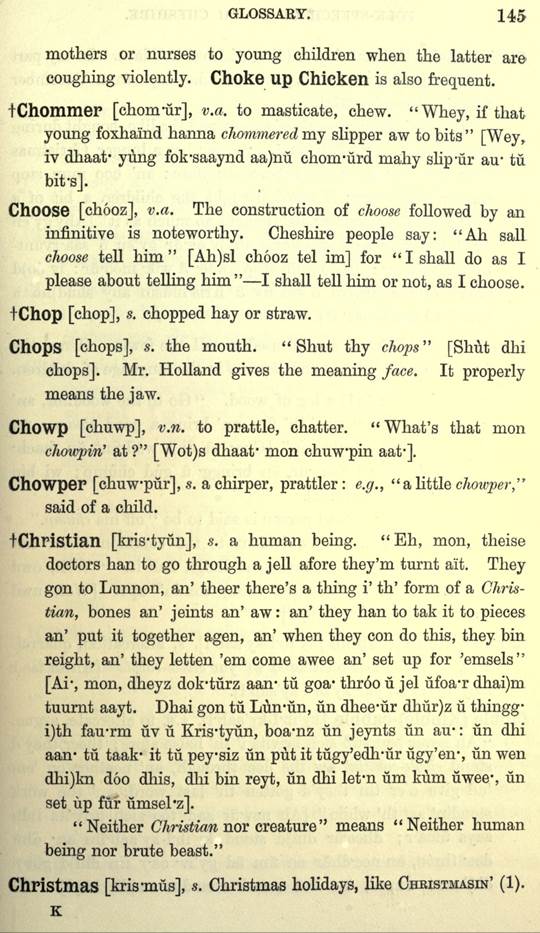
(delwedd C4459) (tudalen 145)
|
GLOSSARY. 145
mothers or nurses to young children when the latter are coughing violently.
Choke up Chicken is also frequent.
tChommer [chonvur], v.a. to masticate, chew. "Whey, if that young
foxhamd hanna chommered my slipper aw to bits" [Wey, iv dhaat- yung
fok-saaynd aa)nu chonrurd mahy slip-ur au- tu bit-s].
Choose [chooz], v.a. The construction of choose followed by an infinitive is
noteworthy. Cheshire people say: "Ah sail choose tell him" [Ah)sl
chooz tel im] for "I shall do as I please about telling him" I
shall tell him or not, as I choose.
tChOp [chop], s. chopped hay or straw.
Chops [chops], s. the mouth. "Shut thy chops" [Shut dhi chops]. Mr.
Holland gives the meaning face. It properly means the jaw.
Chowp [chuwp], v.n. to prattle, chatter. "What's that mon chowpin' at
?" [Wot)s dhaat mon chuwpin aat-].
Chowper [chuw-pur], s. a chirper, prattler : e.g., "a little
chowper," said of a child.
tChristian [kris-tyun], s. a human being. "Eh, mon, theise doctors han
to go through a jell afore they'm turnt ait. They gon to Lunnon, an' theer
there's a thing i' th' form of a Christian, bones an' jeints an' aw : an'
they han to tak it to pieces an' put it together agen, an' when they con do
this, they bin reight, an' they letten 'em come awee an' set up for
'emsels" [Ai-, mon, dheyz dok-turz aan- tu goa- thr6o u jel ufoa-r
dhai)m tuurnt aayt. Dhai gon tu Lun-un, un dhee-ur dhur)z u thingg-i)th
fau-rm uv u Kris-tyun, boa-nz un jeynts un au- : un dhi aan- tu taak- it tu
peysiz un put it tugy'edh-ur ugy'en-, un wen dhi)kn doo dhis, dhi bin reyt,
un dhi let-n um kum uwee-, un set up fur umsel'z].
"Neither Christian nor creature “means "Neither human being nor
brute beast."
Christmas [kris-mus], s. Christmas holidays, like CHRISTMASIN' (1). K
|
|
|
|
|
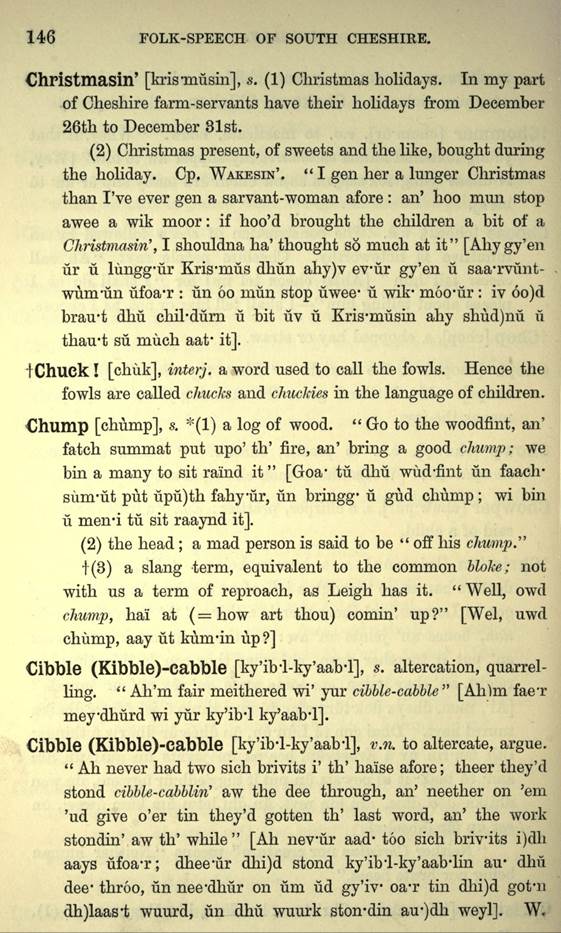
(delwedd C4460) (tudalen 146)
|
146 FOLK-SPEECH OF SOUTH CHESHIRE.
Christmasin' [kris-musin], s. (I) Christmas holidays. In my part of Cheshire
farm- servants have their holidays from December 26th to December 31st.
(2) Christmas present, of sweets and the like, bought during the holiday. Cp.
WAKESIN'. “I gen her a lunger Christmas than I've ever gen a sarvant-woman
afore : an' hoo mun stop awee a wik moor : if hoo'd brought the children a
bit of a Christmasin', I shouldna ha' thought so much at it" [Ahygy'en
ur u lungg-ur Kris-mus dhun ahy)v evur gy'en u saa-rvunt-wunrun ufoa-r : un
60 mun stop uwee- u wik- moo-ur : iv 6o)d brau-t dhu chil-durn u bit uv u
Kris-musin ahy shud)nu u thau-t su much aat- it].
tChuck ! [chuk], inter j. a word used to call the fowls. Hence the fowls are
called chucks and chuckies in the language of children.
Chump [chump], s. *(1) a log of wood. “Go to the woodfint, an' fatch summat
put upo' th' fire, an' bring a good chump; we bin a many to sit raind it”
[Goa- tu dhu wud-fint un faaclr sum-ut put upu)th fahyur, un bringg- u gud
chump ; wi bin u men-i tu sit raaynd it].
(2) the head ; a mad person is said to be “off his chump." f(3) a slang
-term, equivalent to the common bloke; not with us a term of reproach, as
Leigh has it. "Well, owd chump, ha'i at (=how art thou) comin' up?"
[Wei, uwd chump, aay ut kunrin up?]
Cibble (Kibble)-eabble [ky'ib-1-ky'aab-l], s. altercation, quarrelling. “Ah'm
fair meithered wi' yur cibble-cabble” [Ah)m fae'r meydhurd wi yur ky'ib-1
ky'aab-1].
Cibble (Kibble)-cabble [ky'ib-1-ky'aab-l], v.n. to altercate, argue. “Ah
never had two sich brivits i' th' ha'ise afore; theer they'd stond
cibUe-cabblirf aw the dee through, an' neether on J em 'ud give o'er tin
they'd gotten th' last word, an' the work stondin' aw th' while" [Ah
nevur aad- too sich brivits i)dh aays ufoa-r; dhee'ur dhi)d stond
ky'ib'1-ky'aab-lin au- dhu dee* throo, un nee'dhur on um ud gy'iv oa-r tin
dlii)d got-n dh)laasi wuurd, un dhu wuurk ston-din au-)dh weyl]. W.
|
|
|
|
|
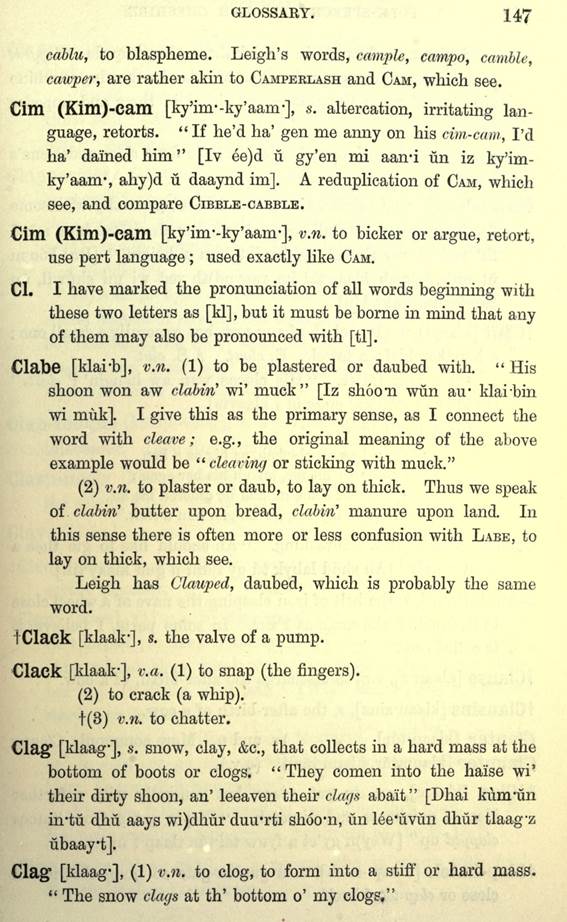
(delwedd C4461) (tudalen 147)
|
GLOSSABY. 147
cablu, to blaspheme. Leigh's words, cample, campo, camble, cawper, are rather
akin to CAMPERLASH and CAM, which see. Cim (Kim)-eam [ky'inr-ky'aanr], s.
altercation, irritating language, retorts. “If he'd ha' gen me army on his
dm-cam, I'd ha' dained him" [Iv ee)d u gy'en mi aan-i un iz
ky'im-ky'aanr, ahy)d u daaynd im]. A reduplication of CAM, which see, and
compare CIBBLE- GABBLE.
Cim (Kim)-eam [ky'inr-ky'aam-], v.n. to bicker or argue, retort, use pert
language ; used exactly like CAM.
Cl. I have marked the pronunciation of all words beginning with these two
letters as [kl], but it must be borne in mind that any of them may also be
pronounced with [tl].
Clabe [klai'b], v.n. (1) to be plastered or daubed with. “His shoon won aw
clabin* wi' muck" [Iz shoo-n wun au- klarbin wi muk]. I give this as the
primary sense, as I connect the word with cleave; e.g., the original meaning
of the above example would be "clearing or sticking with muck."
(2) v.n. to plaster or daub, to lay on thick. Thus we speak of clabin' butter
upon bread, clabin' manure upon land. In this sense there is often more or
less confusion with LABE, to lay on thick, which see.
Leigh has Clauped, daubed, which is probably the same word.
I Clack [klaak 1 ], s. the valve of a pump.
Clack [klaalr], v.a. (1) to snap (the fingers). (2) to crack (a whip). t(3)
v.n. to chatter.
dag" [klaag-], s. snow, clay, &c., that collects in a hard mass at
the bottom of boots or clogs. "They comen into the liaise wi' their
dirty shoon, an' leeaven their clays aba'it" [Dhai kunvun iirtu dhu aays
wi)dhur duu'rti shoo*n, un lee'uvun dhur tlaag-z ubaayt].
Clag [klaag-], (1) v.n. to clog, to form into a stiff or hard mass. “The snow
dags at th' bottom o' my clogs."
|
|
|
|
|
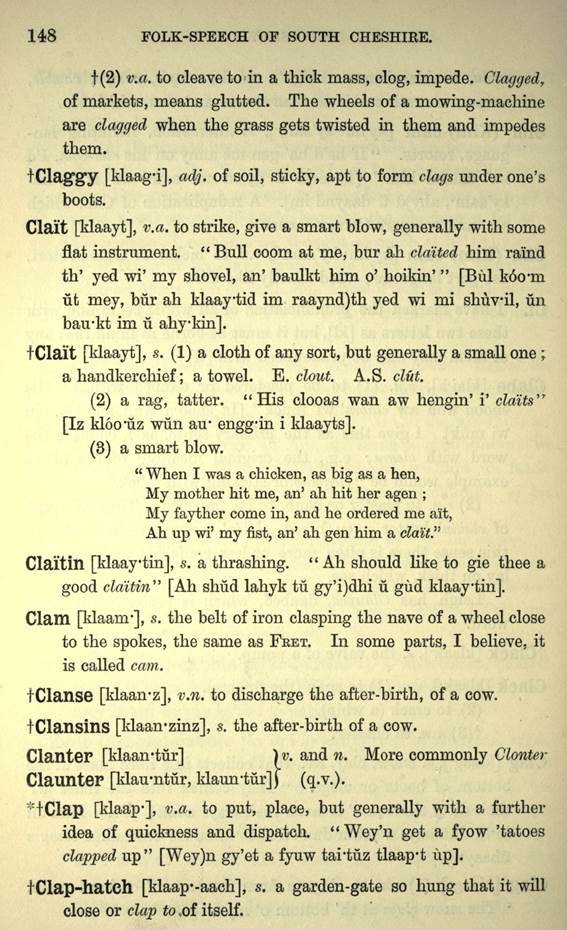
(delwedd C4462) (tudalen 148)
|
148 FOLK-SPEECH OF SOUTH CHESHIRE.
f(2) v.a. to cleave to in a thick mass, clog, impede. Clagged, of markets,
means glutted. The wheels of a mowing-machine are clagged when the grass gets
twisted in them and impedes them.
tClaggy [klaag-i], adj. of soil, sticky, apt to form dags under one's boots.
Clait [klaayt], v.a. to strike, give a smart blow, generally with some flat
instrument. “Bull coom at me, bur ah cldited him raind th' yed wi' my shovel,
an' baulkt him o' hoikin'“ [Bui k6o-m ut mey, bur ah klaaytid im raaynd)th
yed wi mi shuvil, un bau-kt im u ahykin].
t Clait [klaayt], s. (1) a cloth of any sort, but generally a small one ; a
handkerchief ; a towel. E. clout. A.S. clut.
(2) a rag, tatter. "His clooas wan aw hengin' i' daiis" [Iz
kloo'iiz wun au- engg-in i klaayts].
(3) a smart blow.
" When I was a chicken, as big as a hen, My mother hit me, an' ah hit
her agen ; My fayther come in, and he ordered me ait, Ah up wi' my fist, an'
ah gen him a clait"
Clai'tin [klaaytin], s. a thrashing. “Ah should like to gie thee a good
dditin" [Ah shud lahyk tu gy'ijdhi u gud klaaytin].
Clam [klaanr], s. the belt of iron clasping the nave of a wheel close to the
spokes, the same as FEET. In some parts, I believe, it is called cam.
tClanse [klaan-z], v.n. to discharge the after-birth, of a cow.
tClansins [klaan'zinz], s. the after-birth of a cow.
Clanter [klaan-tur] ) v. and n. More commonly Clonter
Claunter [klau-ntur, klamrtur]) (q.v.).
*tClap [klaap-], v.a. to put, place, but generally with a further idea of
quickness and dispatch. “Wey'n get a fyow 'tatoes dapped up" [Wey)n
gy'et a fyuw tai'tuz tlaap-t up].
tClap-hateh [klaap--aach], s. a garden-gate so hung that it will close or dap
to .of itself.
|
|
|
|
|
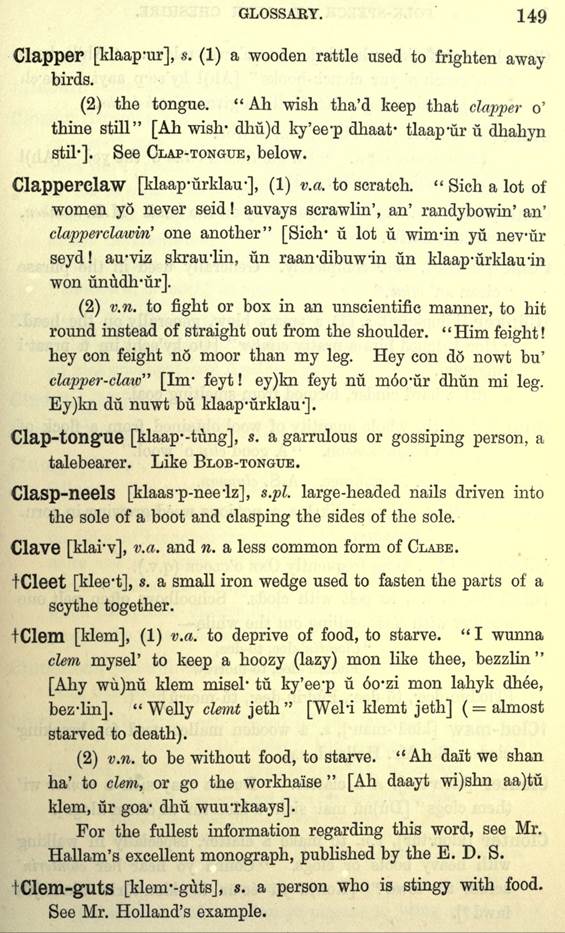
(delwedd C4463) (tudalen 149)
|
GLOSSARY. 149
Clapper [klaap'ur], s. (1) a wooden rattle used to frighten away birds.
(2) the tongue. “Ah wish tha'd keep that clapper o' thine still" [Ah
wish- dhu)d ky'ee-p dhaat- tlaap-ur u dhahyn stil-]. See CLAP-TONGUE, below.
Clapperclaw [klaap-urklau-], (1) v.a. to scratch. “Sich a lot of women yo
never seid ! auvays scrawlin', an' randybowin' an' clapperclawin' one
another" [Sich' u lot u winrin yu nevur seyd! au-viz skrau-lin, un
raan-dibuwin un klaap-urklauin won unudh'ur].
(2) v.n. to fight or box in an unscientific manner, to hit round instead of
straight out from the shoulder. "Him feight! hey con feight no moor than
my leg. Hey con dS nowt bu' clapper-claw" [Inr feyt ! ey)kn feyt mi
m6o'ur dhun mi leg. Ey)kn du nuwt bu klaap'urklau*].
Clap-tongue [klaap--tung], s. a garrulous or gossiping person, a talebearer.
Like BLOB-TONGUE.
Clasp-neels [klaas-p-neelz], s.pl. large-headed nails driven into the sole of
a boot and clasping the sides of the sole.
Clave [klai'v], v.a. and n. a less common form of CLABE.
tCleet [klee-t], s. a small iron wedge used to fasten the parts of a scythe
together.
idem [klem], (1) v.a. to deprive of food, to starve. “I wunna clem mysel' to
keep a hoozy (lazy) mon like thee, bezzlin" [Ahy wu)nu klem misel- tu
ky'ee-p u 6o-zi mon lahyk dhee, beziin]. “Welly clemt jeth” [Weli klemt jeth]
( = almost starved to death).
(2) v.n. to be without food, to starve. "Ah dait we shan ha' to clem, or
go the workha'ise” [Ah daayt wi)shn aa)tu klem, ur goa* dhu wuu*rkaays].
For the fullest information regarding this word, see Mr. Hallam's excellent monograph,
published by the E. D. S.
t Clem-guts [klenr-guts], s. a person who is stingy with food. See Mr.
Holland's example.
|
|
|
|
|
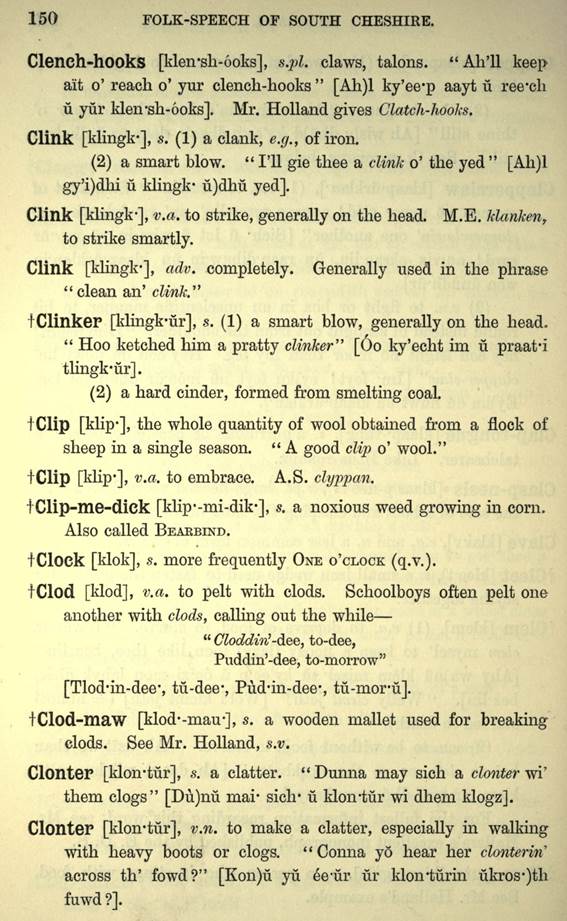
(delwedd C4464) (tudalen 150)
|
150 FOLK-SPEECH OF SOUTH CHESHIRE.
Clench-hooks [klen-sh-6oks], s.pl. claws, talons. “Ah'll keep ait o' reach o'
yur clench-hooks” [Ah)l ky'ee*p aayt u ree'ch u yur klen-sh-ooks]. Mr.
Holland gives Clatch-hooks.
Clink [klingk-], s. (1) a clank, e.g., of iron.
(2) a smart blow. “I'll gie thee a clink o' the yed” [Ah)l gy'i)dhi u klingk*
u)dhu yed].
Clink [klingk-], v.a. to strike, generally on the head. M.E. klanken t to
strike smartly.
Clink [klingk-], adv. completely. Generally used in the phrase 'clean an'
clink."
tClinker [klingk-ur], s. (I) a smart blow, generally on the head. “Hoo
ketched him a pratty clinker" [Oo ky'echt im u praat-i tlingk-ur].
(2) a hard cinder, formed from smelting coal.
tClip [klip-], the whole quantity of wool obtained from a flock of sheep in a
single season. “A good clip o' wool."
tClip [klip-], v.a. to embrace. A.S. clyppan.
tClip-me-diek [klip--mi-dik-], 6-. a noxious weed growing in corn. Also
called BEAEBIND.
t Clock [klok], s. more frequently ONE O'CLOCK (q.v.).
fClod [klod], v.a. to pelt with clods. Schoolboys often pelt one another with
clods, calling out the while
" Cloddiri-dee, to-dee, Puddin'-dee, to-morrow"
[Tlod-in-dee-, tu-dee-, Pud-in-dee-, tu-moru].
f Clod-maw [klod--mau-], s. a wooden mallet used for breaking clods. See Mr.
Holland, s.v.
Clonter [klon-tur], s. a clatter. "Dunna may sich a clonter wi' them
clogs" [Du)nu mai* sich' u kloii'tur wi dhem klogz].
Clonter [klon-tur], v.n. to make a clatter, especially in walking with heavy
boots or clogs. -Gonna yo hear her clonteriri' across th' fowd?" [Kon)u
yu ee-ur ur klon'turin ukros-)th fuwd?].
|
|
|
|
|
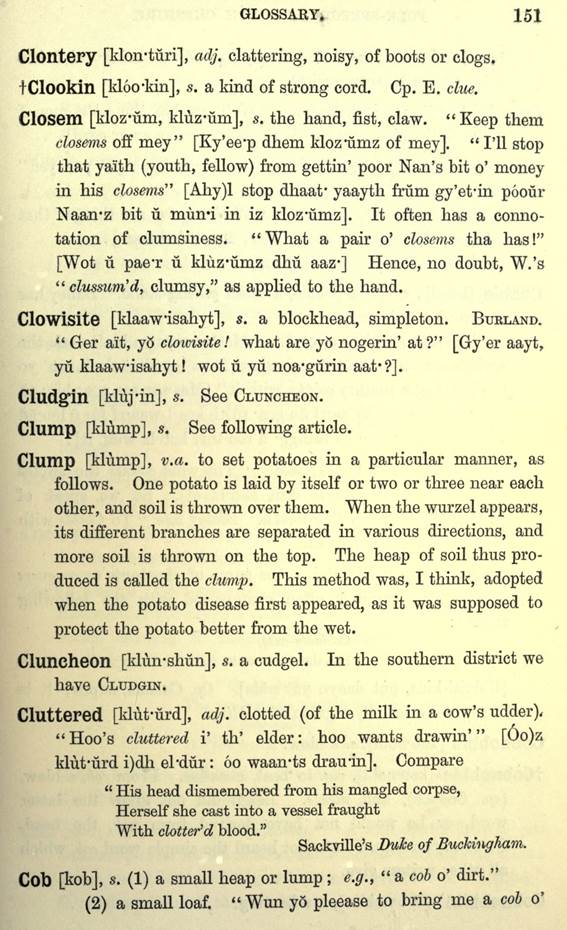
(delwedd C4465) (tudalen 151)
|
GLOSSARY. 151
Clontery [klon-turi], adj. clattering, noisy, of boots or clogs. tClookin
[kloo-kin], s. a kind of strong cord. Cp. E. clue.
Closem [kloz-um, kluz-um], s. the hand, fist, claw. "Keep them closems
off mey" [Ky'ee'p dhem kloz*umz of mey]. “I'll stop that yaith (youth,
fellow) from gettin' poor Nan's bit o' money in his closems" [Ahy)l stop
dhaat* yaayth frum gy'et'in poour Naan'z bit u mun'i in iz kloz'iimz]. It
often has a connotation of clumsiness. "What a pair o' closems tha
has!" [Wot u pae-r u kluz'umz dhu aaz-] Hence, no doubt, W.'s
“clussum'd, clumsy," as applied to the hand.
Clowisite [klaawisahyt], s. a blockhead, simpleton. BUELAND. “Ger ait, yo
clowisite! what are y5 nogerin' at?" [Gy'er aayt, yu klaawisahyt ! wot u
yu noa*gurin aat'?].
Cllldgin [kluj'in], s. See CLUNCHEON. Clump [klump], s. See following
article.
Clump [klump], v.a. to set potatoes in a particular manner, as follows. One
potato is laid by itself or two or three near each other, and soil is thrown
over them. When the wurzel appears, its different branches are separated in
various directions, and more soil is thrown on the top. The heap of soil thus
produced is called the clump. This method was, I think, adopted when the
potato disease first appeared, as it was supposed to protect the potato
better from the wet.
Cluncheon [klun-shun], s. a cudgel. In the southern district we have CLUDGIN.
Cluttered [klut-urd], adj. clotted (of the milk in a cow's udder),
"Hoo's cluttered i' th' elder: hoo wants drawin'" [6o)z klut-urd
i)dh el'dur : 60 waan-ts drauin]. Compare
" His head dismembered from his mangled corpse, Herself she cast into a
vessel fraught
With clotter'd blood."
Sackville's Duke of Buckingham.
Cob [kob], s. (1) a small heap or lump ; e.g., “a cob o' dirt."
(2) a small loaf. “Wun yo pleease to bring me a cob o'
|
|
|
|
|
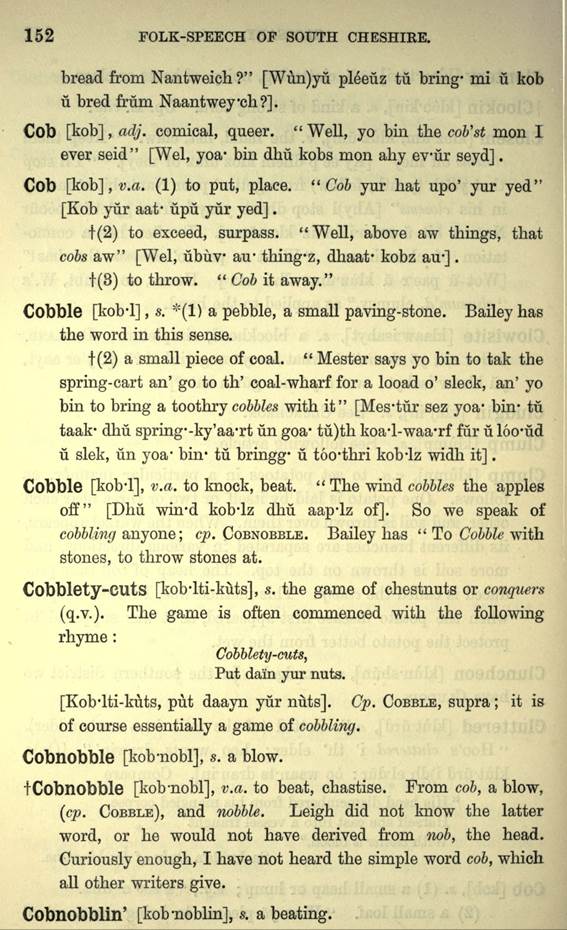
(delwedd C4466) (tudalen 152)
|
FOLK-SPEECH OF SOUTH CHESHIRE.
bread from Nantweich?" [Wun)yu pleeuz tu bring- mi u kob u bred frum
Naantweych?].
Cob [kob] , adj. comical, queer. “Well, yo bin the cob'st mon I ever
seid" [Wei, yoa- bin dhu kobs mon ahy evur seyd] .
Cob [kob], v.a. (1) to put, place. “Cob yur hat upo' yur yed" [Kob yur
aat- upu yur yed] .
t(2) to exceed, surpass. "Well, above aw things, that cobs aw"
[Wei, ubuv au- thing-z, dhaat- kobz au-] . t(3) to throw. “Cob it away."
Cobble [kob-1] , s. *(1) a pebble, a small paving-stone. Bailey has the word
in this sense.
t(2) a small piece of coal. “Mester says yo bin to tak the spring-cart an' go
to th' coal-wharf for a looad o' sleek, an' yo bin to bring a toothry cobbles
with it" [Mes-tur sez yoa- bin- tu taak- dhu spring- -ky'aa-rt un goa-
tu)th koa-1-waa-rf fur uloo-ud u slek, un yoa' bin- tu bringg- u too-thri
kob-lz widh it] .
Cobble [kob-1], v.a. to knock, beat. “The wind cobbles the apples off"
[Dhu win-d kob-lz dhu aap-lz of]. So we speak of cobbling anyone ; cp.
COBNOBBLE. Bailey has “To Cobble with stones, to throw stones at.
Cobblety-CUtS [kob-lti-kuts], s. the game of chestnuts or conquers (q.v.).
The game is often commenced with the following
rhyme :
Cobblety-cuts, Put dam yur nuts.
[Kob-lti-kuts, put daayn yur nuts]. Cp. COBBLE, supra ; it is of course
essentially a game of cobbling.
Cobnobble [kob-nobl], s. a blow.
tCobnobble [kob-nobl], v.a. to beat, chastise. From cob, a blow, (cp.
COBBLE), and nobble. Leigh did not know the latter word, or he would not have
derived from nob, the head. Curiously enough, I have not heard the simple
word cob, which all other writers give.
Cobnobblin' [kob-noblin], s. a beating.
|
|
|
|
|

(delwedd C4467) (tudalen 153)
|
GLOSSARY. 153
Cobnut [kob*nut], s. a small nut attached to the end of a string and used in
the game of COBNUTS. This game only differs from Cobblety-cuts in the use of
small nuts instead of chestnuts.
tCock egg 1 [kok eg], s. a small egg without yolk.
tCocket [kok-it], adj. (I) malapert, saucy, disposed to domineer. "Hey
wants takkin' dain a peg; hey's too cocket" [Ey waan-ts taakin daayn u
peg; ey)z too kok-it].
(2) has an indefinite sense answering nearly to "nice." "Hoo's
a cocket little thing." "They bin on a cocket farm" [Dhai- bin
on u kok-it faa-rm].
Coekoo [kok6o-], s. a slang word for a donkey, generally used in the
combination, “A Jerusalem cockoo."
iCoekstride [kok-strahyd], s. the length of a cock's stride. Only used in the
common phrase, “the days are getting a cockstride longer."
Coekt [kokt]. adj. indignant. "He was rather cockt about it" [Ey
wuz rae-dhur kokt ubuwt it].
Cock-yeds [kok--yedz], s.pl. large flakes of curd sometimes formed in the
process of cheese-making.
Coeky-keeko [kok-i-kee-koa] , interj. Cock-a-doodle-do ; a closer imitation
of the cry of a cock. A common story runs that two cocks, crowing in
neighbouring farm-yards, answered one another on this wise :
" Cocky-keeko, The women bin mester here."
" Cocky-keeko, It's the same everywheer."
[Kok-i-kee-koa, dhu wim-in bin mes-tur ee-ur. Kok-i-kee-koa, it)s dhu sai-m
evriw6e-ur] .
Cod [kod] , s. a humbug, imposition. “A hoss-dealer had to pee fourteen pownd
for his licence, and a farmer couldna ride a hoss under ten shillin' ; that
hoss-duty was a regilar cod of a thing" [U os-deyulur aad- tu pee-
foa-rteyn puwnd fur iz lahysuns,
|
|
|
|
|
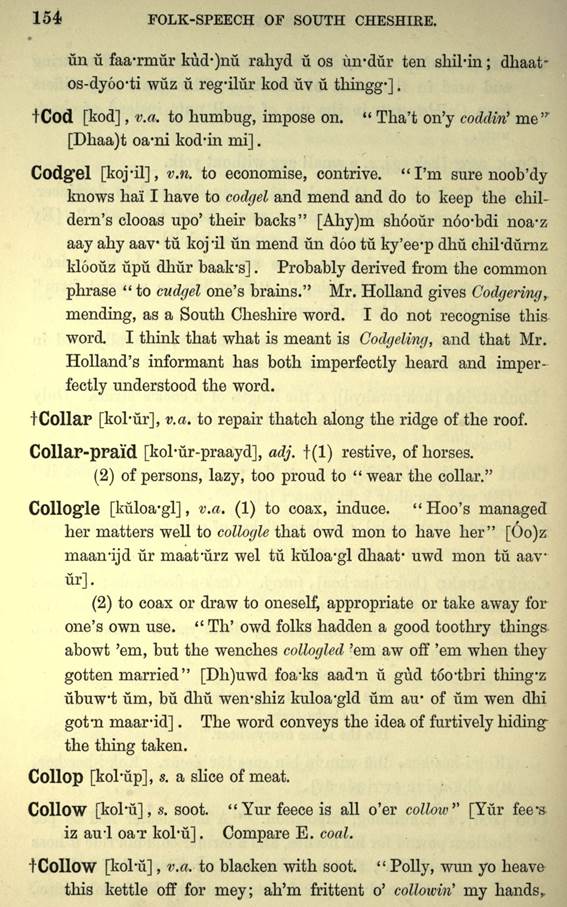
(delwedd C4468) (tudalen 154)
|
154 FOLK-SPEECH OF SOUTH CHESHIRE.
un ii faa-rmur kud-)nu rahyd u os uirdur ten shiHn ; dhaat~ os-dy6o*ti wuz u
reg'ilur kod uv u thingg*] .
ICod [kod] , v.a. to humbug, impose on. “Tha't on'y coddin* me" [Dhaa)t
oa-ni kod-in mi] .
Codgel [koj-il], v.n. to economise, contrive. "I'm sure noob'dy knows
hai I have to codgel and mend and do to keep the childern's clooas upo' their
backs" [Ahy)m sh6our n6o-bdi noa-z aay ahy aav tu koj'il un mend un doo
tu ky'ee-p dhu cmTdurnz kloouz upu dhur baak's] . Probably derived from the
common phrase “to cudgel one's brains." Mr. Holland gives Codgering,.
mending, as a South Cheshire word. I do not recognise this word. I think that
what is meant is Codgeling, and that Mr. Holland's informant has both
imperfectly heard and imperfectly understood the word.
t Collar [kol-ur], v.a. to repair thatch along the ridge of the roof.
Collar-praid [kol-ur-praayd], adj. f(l) restive, of horses.
(2) of persons, lazy, too proud to "wear the collar."
Collogle [kuloa-gl] , v.a. (1) to coax, induce. “Hoo's managed her matters
well to collogle that owd mon to have her" [Oo)z maan'ijd ur maat'urz wel
tu kuloa'gl dhaat' uwd mon tu aav ur].
(2) to coax or draw to oneself, appropriate or take away for one's own use.
ll Th' owd folks hadden a good toothry things abowt 'em, but the wenches
collogled 'em aw off 'em when they gotten married” [Dh)uwd foa'ks aad'n u gud
too'thri thing'z ubuwt um, bu dhu wen-shiz kuloa'gld um au* of um wen dhi
got-n maar-id] . The word conveys the idea of furtively hiding the thing
taken.
Collop [kol'up], s. a slice of meat.
Collow [kol-u], s. soot. “Yur feece is all o'er collow" [Yur fee's iz
aul oa-r kol-u] . Compare E. coal.
f Collow [kol-u] , v.a. to blacken with soot. “Polly, wun yo heave this
kettle off for mey; ah'm frittent o' collowirf my hands,
|
|
|
|
|
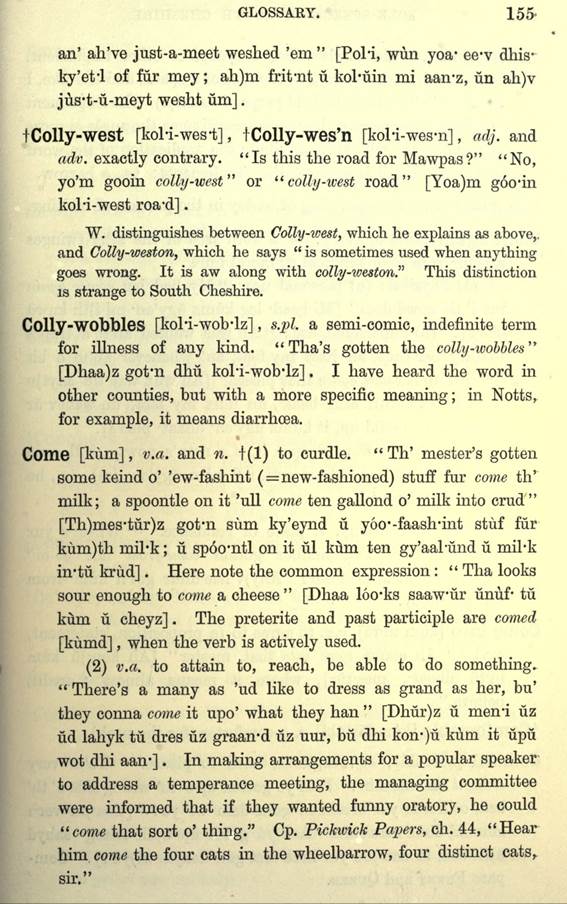
(delwedd C4469) (tudalen 155)
|
GLOSSARY.
an' ah've just-a-meet weslied 'em” [PoH, wun yoa* ee'v clhisky'etl of fur mey
; ah)m frit-nt u kol'uin mi aan-z, un ah)v jus't-u-meyt wesht urn] .
t Colly- west [koH-wesi] , f Colly- wes'n [koli-wes-n] , adj. and adv.
exactly contrary. "Is this the road for Mawpas?" "No, yo'm
gooin colly-west" or “colly -west road" [Yoa)m goo'in koH-west
roa-d] .
W. distinguishes between Colly-ivest, which he explains as above,, and
Colly-weston, which he says “is sometimes used when anything goes wrong. It
is aw along with colly-weston" This distinction is strange to South
Cheshire.
Colly- wobbles [koH-wob-lz] , s.pl. a semi-comic, indefinite term for illness
of any kind. “Tha's gotten the colly-wobbles" [Dhaa)z got*n dhu
koH-wob'lz] . I have heard the word in other counties, but with a more
specific meaning ; in Notts, for example, it means diarrhoea.
Come [kum] , v.a. and n. 1(1) to curdle. “Th' mester's gotten some keind o'
'ew-fashint (= new-fashioned) stuff fur come th' milk; a spoontle on it 'ull
come ten gallond o' milk into crud” [Th)mes'tur)z got'ii sum ky'eynd u
yoo*-faaslrmt stuf fur kum)th mil'k ; u spoo'ntl on it ul kum ten gy'aal'und
u imTk in-tu krud] . Here note the common expression : “Tha looks sour enough
to come a cheese” [Dhaa loo-ks saawur unuf- tu kum u cheyz] . The preterite
and past participle are corned [kumd] , when the verb is actively used.
(2) v.a. to attain to, reach, be able to do something. “There's a many as 'ud
like to dress as grand as her, bu' they conna come it upo' what they han”
[Dhur)z u men-i uz ud lahyk tu dres uz graan-d uz uur, bu dhi kon-)u kum it
upu wot dhi aan-] . In making arrangements for a popular speaker to address a
temperance meeting, the managing committee were informed that if they wanted
funny oratory, he could 11 come that sort o' thing." Cp. Pickwick
Papers, ch. 44, "Hear
khim come the four cats in the wheelbarrow, four distinct cats, sir."
|
|
|
|
|
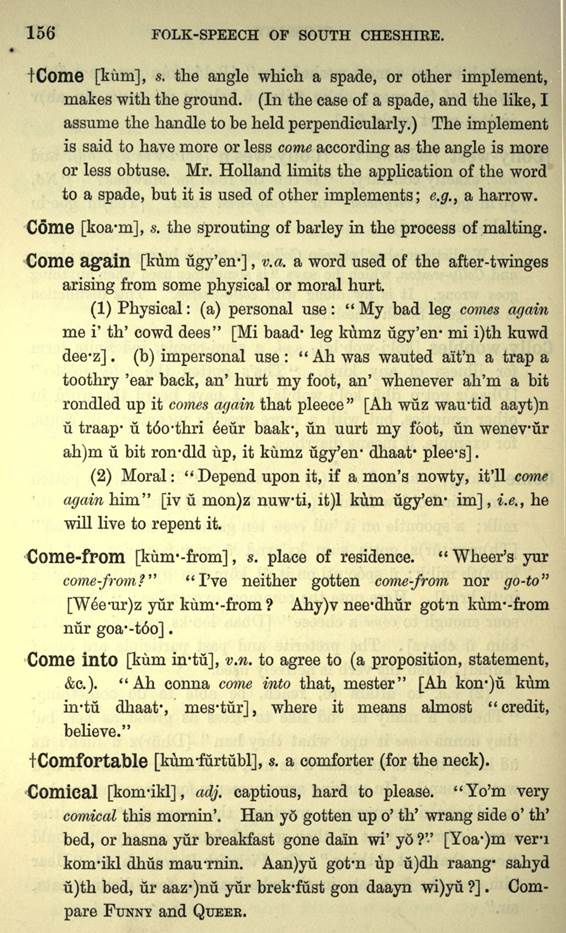
(delwedd C4470) (tudalen 156)
|
lob FOLK-SPEECH OF SOUTH CHESHIRE.
iCome [kum], s, the angle which a spade, or other implement, makes with the
ground. (In the case of a spade, and the like, I assume the handle to be held
perpendicularly.) The implement is said to have more or less come according
as the angle is more or less obtuse. Mr. Holland limits the application of
the word to a spade, but it is used of other implements; e.g., a harrow.
Come [koa-m], s. the sprouting of barley in the process of malting.
Come again [kum ugy'en'] , v.a. a word used of the after-twinges arising from
some physical or moral hurt.
(1) Physical: (a) personal use: "My bad leg comes again me i' th' cowd
dees" [Mi baad* leg kumz ugy'en- mi i)th kuwd dee-z]. (b) impersonal
use: "Ah was wauted ait'n a trap a toothry 'ear back, an' hurt my foot,
an' whenever ah'm a bit rondled up it comes again that pleece” [Ah wuz
wau'tid aayt)n u traap- u t6o-thri e"eur baak-, un uurt my foot, un
wenevur ah)m u bit ron-dld up, it kumz ugy'en dhaat* plee-s] .
(2) Moral: “Depend upon it, if a mon's nowty, it'll come again him" [iv
u mon)z nuwti, it)l kum ugy'en- im] , i.e., he will live to repent it.
Come-from [kunr-from] , s. place of residence. “Wheer's yur come-from?"
"I've neither gotten come-from nor go-to" [Wee-ur)z yur kunr-from?
Ahy)v nee-dhur got'n kunr-from nur goa--t6o] .
Come into [kum urtu], v.n. to agree to (a proposition, statement, &c.).
"Ah conna come into that, mester" [Ah kon-)u kum in-tu dhaat-,
mes-tur] , where it means ahnost "credit, believe."
t Comfortable [kunrfurtubl], s. a comforter (for the neck).
Comical [kom-ikl], adj. captious, hard to please. "Yo'm very comical
this mornin'. Han yo gotten up o' th' wrang side o' th' bed, or hasna yur
breakfast gone dain wi' yo ?'' [Yoa-)m ver-i kom-ikl dhus mau-rnin. Aan)yu
got-n up u)dh raang' sahyd u)th bed, ur aaz-)nu yur brek-fust gon daayn wi)yu
?] . Compare FUNN-X and QUEEB.
|
|
|
|
|
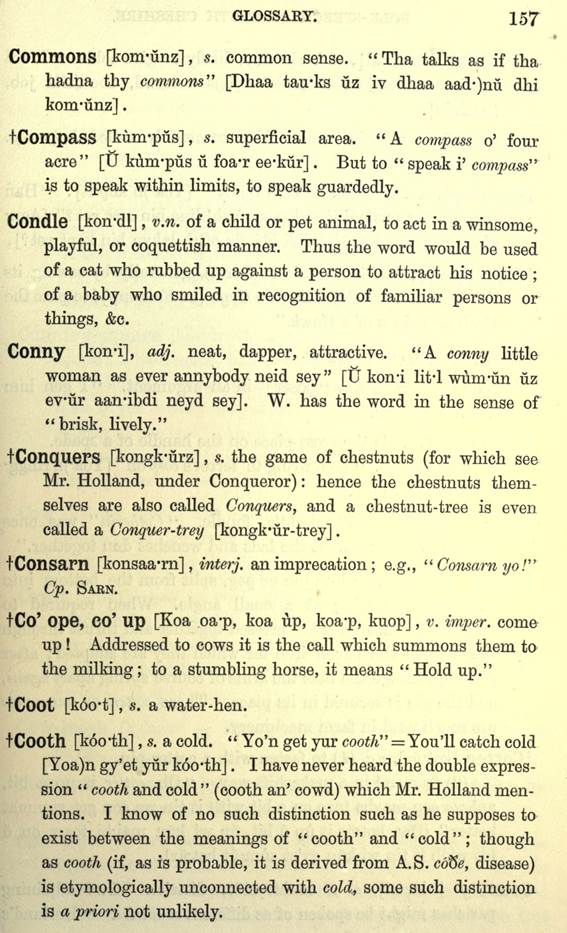
(delwedd C4471) (tudalen 157)
|
GLOSSARY. 157
Commons [konrunz] , s. common sense. “Tha talks as if tha hadna thy
commons" [Dhaa tau-ks uz iv dhaa aad-)nu dhi konrunz] .
t Compass [kunrpus], s. superficial area. "A compass o' four acre"
[U kum-pus u foa-r ee-kur] . But to “speak i' compass" is to speak
within limits, to speak guardedly.
Condle [kon-dl] , v.n. of a child or pet animal, to act in a winsome,
playful, or coquettish manner. Thus the word would be used of a cat who
rubbed up against a person to attract his notice ; of a baby who smiled in
recognition of familiar persons or things, &c.
Conny [kon-i], adj. neat, dapper, attractive. "A conny little woman as
ever annybody neid sey” [U koni lit-1 wum-un uz evur aan-ibdi neyd sey]. W.
has the word in the sense of "brisk, lively."
tConquers [kongk-urz] , s. the game of chestnuts (for which see Mr. Holland,
under Conqueror) : hence the chestnuts themselves are also called Conquers,
and a chestnut-tree is even called a Conquer-trey [kongk'ur-trey] .
tConsarn [konsaa'rn], inter j. an imprecation ; e.g., "Consarn yo!"
Cp. SAEN.
tCo* ope, CO' up [Koa oa-p, koa up, koa-p, kuop] , v. imper. come up !
Addressed to cows it is the call which summons them to the milking ; to a
stumbling horse, it means “Hold up."
tCoot [k6o*t] , s. a water-hen.
t Cooth [k6o -th] , s. a cold. ' Yo'n get yur cootJi' ' = You'll catch cold
[Yoa)n gy'et yur k6o-th] . I have never heard the double expression “cooth
and cold" (cooth an' cowd) which Mr. Holland mentions. I know of no such
distinction such as he supposes to exist between the meanings of
"cooth" and "cold"; though as cooth (if, as is probable,
it is derived from A.S. cofte, disease) is etymologically unconnected with
cold, some such distinction is a priori not unlikely.
|
|
|
|
|
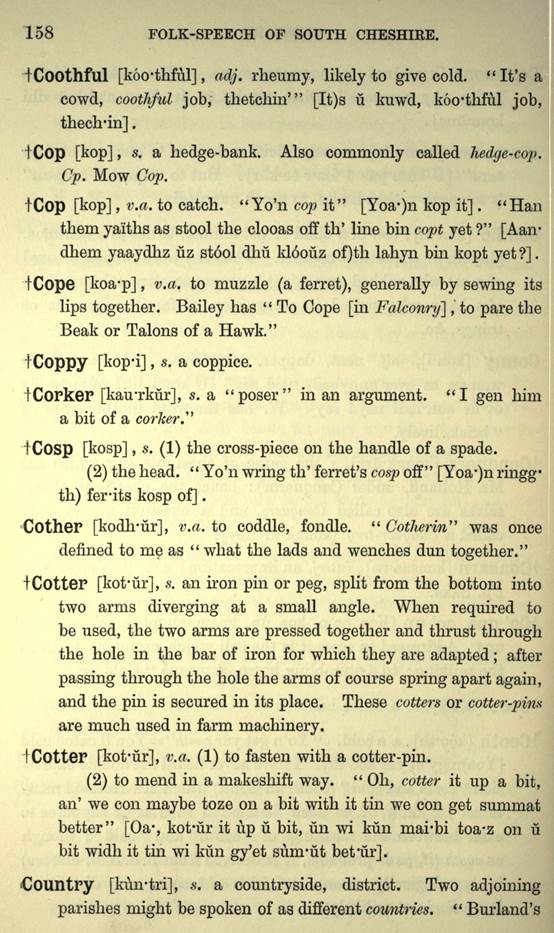
(delwedd C4472) (tudalen 158)
|
158 FOLK-SPEECH OF SOUTH CHESHIRE.
ICoothful [koo-thful] , adj. rheumy, likely to give cold. "It's a cowd,
coothful job, thetchin'" [It)s u kuwd, koo-thful job, thech'in] .
tCop [kop] , s. a hedge-bank. Also commonly called hedge-cop. Cp. Mow Cop.
tCop [kop] , v.a. to catch. “Yo'n cop it" [Yoa-)n kop it] . "Han
them yaiths as stool the clooas off th' line bin copt yet ?" [Aan-dhem
yaaydhz uz st6ol dim k!6ouz of )th lahyn bin kopt yet ?] .
tCope [koa*p] , v.a. to muzzle (a ferret), generally by sewing its lips
together. Bailey has “To Cope [in Falconry] ,' to pare the Beak or Talons of
a Hawk."
ICoppy [kop-i] , s. a coppice.
i Corker [kau-rkur], s. a "poser" in an argument. "I gen him a
bit of a corker."
tCosp [kosp] , s. (1) the cross-piece on the handle of a spade.
(2) the head. “Yo'n wring th' ferret's cosp off" [Yoa-)n ringg* th)
ferits kosp of] .
Cother [kodh-ur], v.a. to coddle, fondle. “CotJierin" was once denned to
me as “what the lads and wenches dun together."
t Cotter [kot-ur], s. an iron pin or peg, split from the bottom into two arms
diverging at a small angle. When required to be used, the two arms are
pressed together and thrust through the hole in the bar of iron for which
they are adapted ; after passing through the hole the arms of course spring
apart again, and the pin is secured in its place. These cotters or cotter
-pirn are much used in farm machinery.
ICotter [kot-ur], v.a. (I) to fasten with a cotter-pin.
(2) to mend in a makeshift way. “Oh, cotter it up a bit, an' we con maybe
toze on a bit with it tin we con get summat better" [Oa-, kot*ur it up u
bit, un wi kun mai-bi toa-z on u bit widh it tin wi kun gy'et sum'ut bet'ur].
Country [kun-tri], s. a countryside, district. Two adjoining parishes might
be spoken of as different countries. “Borland's
|
|
|
|
|
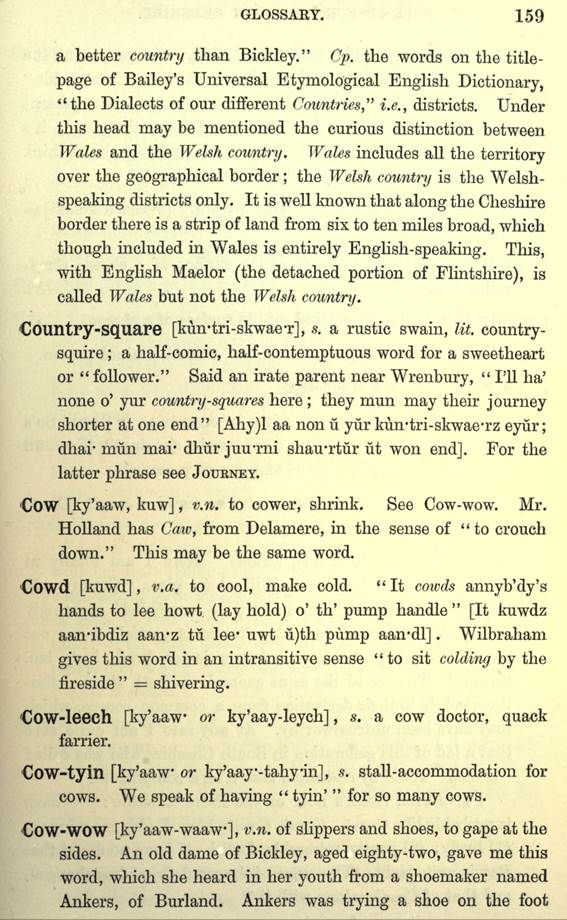
(delwedd C4473) (tudalen 159)
|
GLOSSARY. 159
a better country than Bickley." Cp. the words on the title-page of
Bailey's Universal Etymological English Dictionary, "the Dialects of our
different Countries" i.e., districts. Under this head may be mentioned
the curious distinction between Wales and the Welsh country. Wales includes
all the territory over the geographical border ; the Welsh country is the
Welsh-speaking districts only. It is well known that along the Cheshire
border there is a strip of land from six to ten miles broad, which though
included in Wales is entirely English-speaking. This, with English Maelor
(the detached portion of Flintshire), is called Wales but not the Welsh
country.
Country-square [kun-tri-skwae-r], s. a rustic swain, lit. country-squire ; a
half- comic, half- contemptuous word for a sweetheart or “follower."
Said an irate parent near Wrenbury, “I'll ha' none o' yur country-squares
here ; they mun may their journey shorter at one end" [Ahy)l aa non u
yur kun-tri-skwae-rz eyur ; dhai' mun mar dhur juirrni shau-rtur ut won end].
For the latter phrase see JOURNEY.
COW [ky'aaw, kuw] , v.n. to cower, shrink. See Cow-wow. Mr. Holland has Caw,
from Delamere, in the sense of "to crouch down." This may be the
same word.
Cowd [kuwd] , v.a. to cool, make cold. “It cowds annyb'dy's hands to lee howt
(lay hold) o' th' pump handle” [It kuwdz aan-ibdiz aan-z tu lee- uwt u)th pump
aan-dl] . Wilbraham gives this word in an intransitive sense “to sit colding
by the fireside “shivering.
Cow-leech [ky'aaw or ky'aay-leych] , s. a cow doctor, quack farrier.
Cow-tyin [ky'aaw or ky'aay-tahyin], s. stall -accommodation for cows. We speak
of having “tyin' “for so many cows.
Cow- WOW [ky'aaw- waaw], v.n. of slippers and shoes, to gape at the sides. An
old dame of Bickley, aged eighty-two, gave me this word, which she heard in
her youth from a shoemaker named Ankers, of Burland. Ankers was trying a shoe
on the foot
|
|
|
|
|
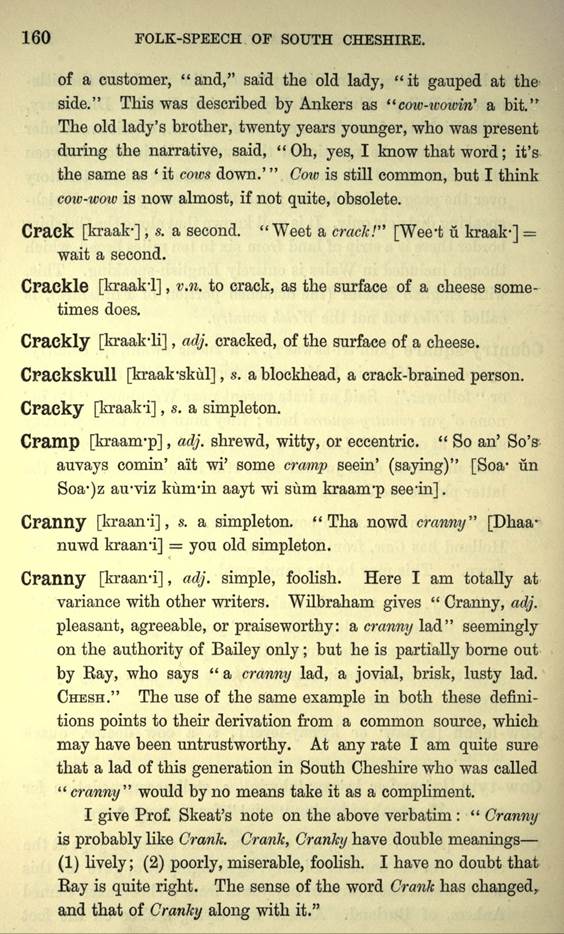
(delwedd C4474) (tudalen 160)
|
160 FOLK-SPEECH OF SOUTH CHESHIEE.
of a customer, "and," said the old lady, "it gauped at the
side." This was described by Ankers as "cow-ivowin' a bit."
The old lady's brother, twenty years younger, who was present during the
narrative, said, "Oh, yes, I know that word ; it's the same as ' it cows
down.' “Cow is still common, but I think cow-wow is now almost, if not quite,
obsolete.
Crack [kraak-] , s. a second. “Weet a crack!" [Wee-t u kraak-] wait a
second.
Crackle [kraak-1] , v.n. to crack, as the surface of a cheese sometimes does.
Crackly [kraak-li] , adj. cracked, of the surface of a cheese. Craekskull
[kraak -skid] , s. a blockhead, a crack-brained person. Cracky [kraak-i] , s.
a simpleton.
Cramp [kraanrp] , adj. shrewd, witty, or eccentric. “So an' So's auvays
comin' ait wi' some cramp seein' (saying)" [Soa- un Soa-)z au-viz kum-in
aayt wi sum kraanrp seein] .
Cranny [kraan-i], s. a simpleton. “Tha nowd cranny" [Dhaa-nuwd kraan-i]
= you old simpleton.
Cranny [kraan-i] , adj. simple, foolish. Here I am totally at variance with
other writers. Wilbraham gives “Cranny, adj. pleasant, agreeable, or
praiseworthy: a cranny lad" seemingly on the authority of Bailey only ;
but he is partially borne out by Kay, who says "a cranny lad, a jovial,
brisk, lusty lad. CHESH." The use of the same example in both these
definitions points to their derivation from a common source, which may have
been untrustworthy. At any rate I am quite sure that a lad of this generation
in South Cheshire who was called "cranny" would by no means take it
as a compliment.
I give Prof. Skeat's note on the above verbatim : “Cranny is probably like
Crank. Crank, Cranky have double meanings (1) lively; (2) poorly, miserable,
foolish. I have no doubt that Bay is quite right. The sense of the word Crank
has changed, and that of Cranky along with it."
|
|
|
|
|
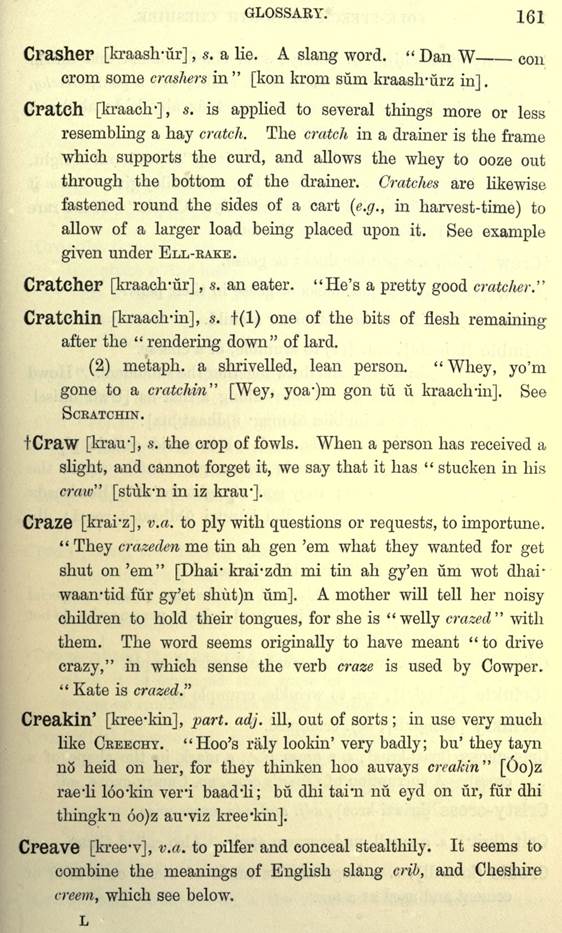
(delwedd C4475) (tudalen 161)
|
GLOSSARY.
Crasher [kraash-ur] , s. a lie. A slang word. “Dan W con
crom some crashers in” [kon krom sum kraash-urz in] .
Cratch [kraach-], s. is applied to several things more or less resembling a
hay cratch. The cratch in a drainer is the frame which supports the curd, and
allows the whey to ooze out through the bottom of the drainer. Cratches are
likewise fastened round the sides of a cart (e.g., in harvest-time) to allow
of a larger load being placed upon it. See example given under ELL-KAKE.
Crateher [kraach-ur] , s. an eater. "He's a pretty good cratclier."
Cratchin [kraaoh'in], s. f(l) one of the bits of flesh remaining after the
“rendering down" of lard.
(2) metaph. a shrivelled, lean person. “Whey, yo'm gone to a cratckin"
[Wey, yoa')m gon tu u kraach in]. See SCRATCHIN.
I Craw [krair], s. the crop of fowls. When a person has received a slight,
and cannot forget it, we say that it has “stucken in his craw" [stiik-n
in iz krau*].
Craze [krai-z], v.a. to ply with questions or requests, to importune. “They
crazeden me tin ah gen 'em what they wanted for get shut on 'em" [Dhai-
krai-zdn mi tin ah gy'en urn wot dhar waan'tid fur gy'et shut)n um]. A mother
will tell her noisy children to hold their tongues, for she is "welly
crazed" with them. The word seems originally to have meant "to
drive crazy," in which sense the verb craze is used by Cowper. “Kate is
crazed"
Creakin' [kree-kin], part. adj. ill, out of sorts ; in use very much like
CEEECHY. "Hoo's raly lookin' very badly; bu' they tayn no heid on her,
for they thinken hoo auvays crcdkin" [6o)z raeli loo 'kin veri baad'li;
bu dhi tarn nu eyd on ur, fur dm" thingk-ii 6o)z an- viz kree'kin].
Creave [kree-v], v.a. to pilfer and conceal stealthily. It seems to combine
the meanings of English slang crib, and Cheshire creem, which see below. L
|
|
|
|
|
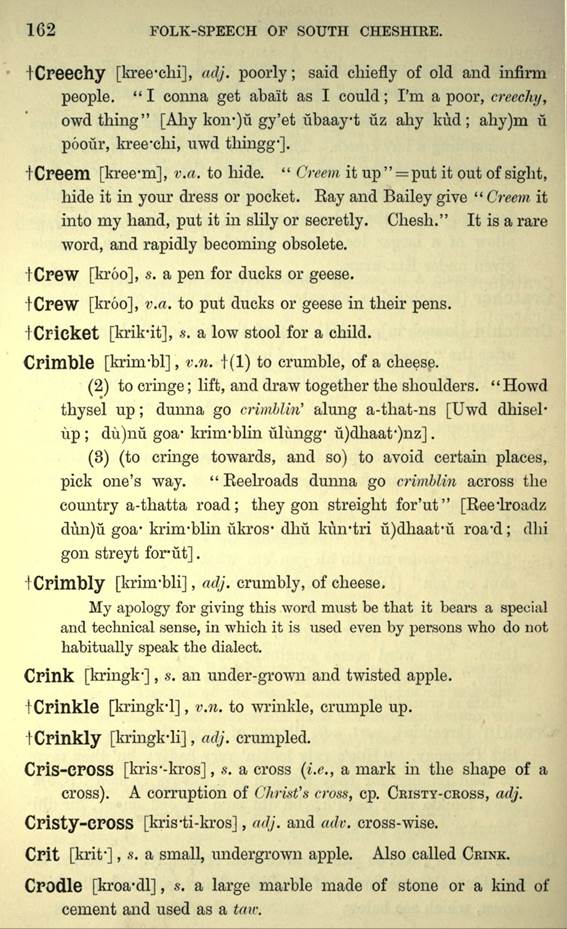
(delwedd C4476) (tudalen 162)
|
162 FOLK-SPEECH OF SOUTH CHESHIRE.
tCreechy [kree'ehi], adj. poorly; said chiefly of old and infirm people. “I
conna get abait as I could ; I'm a poor, creecJiy, owd thing" [Ahy
koir)u gy'et ubaayt uz ahy kud ; ahy)m u poour, kree-chi, uwd thingg-].
tCreem [kree'm], v.a. to hide. “Creem it up" = put it out of sight, hide
it in your dress or pocket. Ray and Bailey give “Creem it into my hand, put
it in slily or secretly. Chesh." It is a rare word, and rapidly becoming
obsolete.
tCrew [kroo], s. a pen for ducks or geese.
ICrew [kroo], v.a. to put ducks or geese in their pens.
f Cricket [krik-it], s. a low stool for a child.
Crimble [krim-bl] , v.n. f (1) to crumble, of a cheese.
(2) to cringe ; lift, and draw together the shoulders. "Howd thysel up ;
dunna go crimblin' alung a-that-ns [Uwd dhisel-up ; du)nu goa' krinrblin
ulungg* u)dhaat')nz] .
(3) (to cringe towards, and so) to avoid certain places, pick one's way.
“Eeelroads dunna go crimblin across the country a-thatta road; they gon
streight for'ut" [Reelroadz dun)u goa- krinrblin ukros- dhu kmrtri
u)dhaat-u roa'd ; dhi gon streyt forut] .
I Crimbly [krim-bli] , adj. crumbly, of cheese,
My apology for giving this word must be that it bears a special and technical
sense, in which it is used even by persons who do not habitually speak the
dialect.
Crink [kringk*] , s. an under-grown and twisted apple. ! Crinkle [kringk-1] ,
v.n. to wrinkle, crumple up. 1 Crinkly [kringk'li] , adj. crumpled.
Cris-cross [kris*-kros] , s. a cross (i.e., a mark in the shape of a cross).
A corruption of Christ's cross, cp. CBISTY-CROSS, adj.
Cristy-cross [kris'ti-kros] , adj. and adc. cross-wise.
Crit [krit-] , s. a small, undergrown apple. Also called CRINK.
Crodle [kroa-dl] , s. a large marble made of stone or a kind of cement and
used as a taw.
|
|
|
|
|
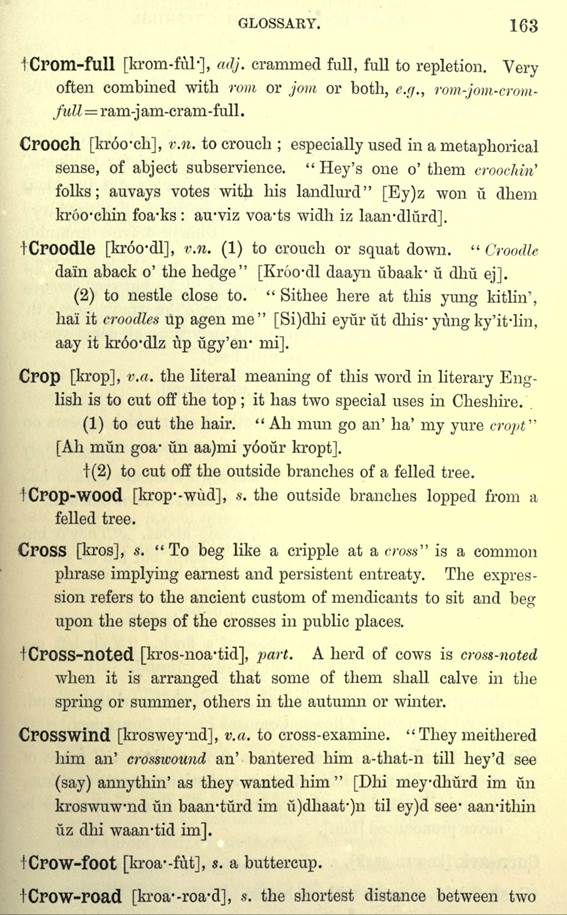
(delwedd C4477) (tudalen 163)
|
GLOSSARY. 163
i Crom-full [krom-ml-], adj. crammed full, full to repletion. Very often
combined with rom or join or both, e.g., rom-jom-crom-full = ram-jam-cram-full.
Crooch [kr6o-ch], v.n. to crouch ; especially used in a metaphorical sense,
of abject subservience. “Hey's one o' them eroochin' folks; auvays votes with
his landlurd" [Ey)z won u dhem kroo'chin foa'ks : au-viz voa'ts widh iz
laan-dlurd].
tCroodle [kroo-dl], v.n. (1) to crouch or squat down. “Croodle dam aback o'
the hedge" [Kroo'dl daayn ubaalr u dim ej].
(2) to nestle close to. “Sithee here at this yung kitlin', hai it croodles up
agen me" [Si)dhi eyur ut dhis- yung ky'it'lin, aay it kr6o'dlz up
ugy'eir mi].
Crop [krop], v.a. the literal meaning of this word in literary English is to
cut off the top ; it has two special uses in Cheshire.
(1) to cut the hair. “Ah mun go an' ha' my yure cropt" [Ah mun goa* un
aa)mi y6our kropt].
1(2) to cut off the outside branches of a felled tree. tCrop-WOOd
[krop'-wud], s. the outside branches lopped from a felled tree.
CPOSS [kros], s. "To beg like a cripple at a cross" is a common
phrase implying earnest and persistent entreaty. The expression refers to the
ancient custom of mendicants to sit and beg upon the steps of the crosses in
public places.
t Cross-noted [kros-noa'tid], part. A herd of cows is cross-noted when it is
arranged that some of them shall calve in the spring or summer, others in the
autumn or winter.
Crosswind [krosweynd], v.a. to cross-examine. “They meithered him an'
crosswound an' bantered him a-that-n till hey'd see (say) annythin' as they
wanted him” [Dhi meydhiird im un kroswuwnd un baairturd im u)dhaat')n til
ey)d see- aan-ithin uz dhi waan-tid im].
t Crow-foot [kroa'-fut], s. a buttercup.
I Crow-road [kroa*-roa-d], s. the shortest distance between two
|
|
|
|
|
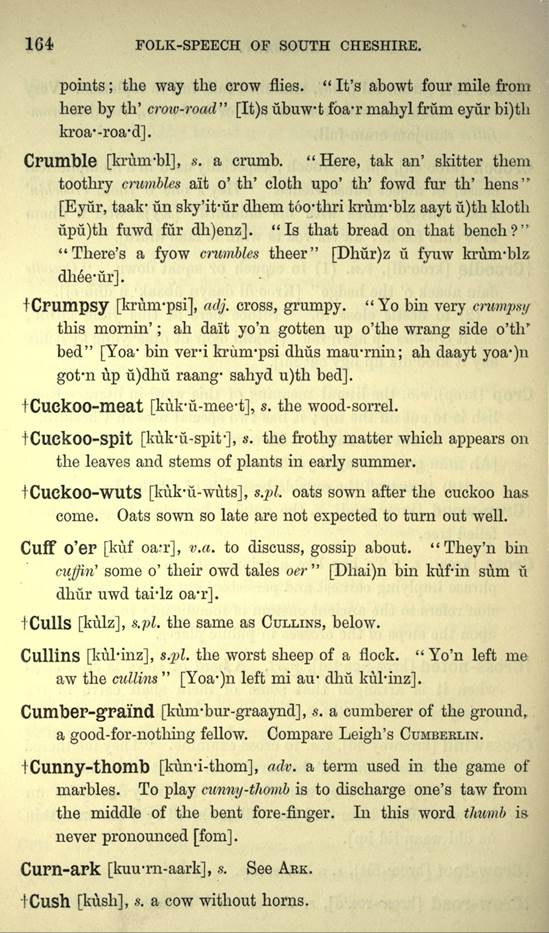
(delwedd C4478) (tudalen 164)
|
164 FOLK-SPEECH OF SOUTH CHESHIRE.
points ; the way the crow flies. “It's abowt four mile from here by th'
crow-road" [It)s ubuwt foa'r mahyl frum eyur bi)th kroa--roa-d].
Crumble [krunrbl], s. a crumb. "Here, tak an' skitter them toothry
crumbles ait o' th' cloth upo' th' fowd fur th' hens" [Eyur, taak- un
sky'it-ur dhem too-thri krunrblz aayt u)th kloth upu)th fuwd fur dh)enz].
"Is that bread on that bench?" "There's a fyow crumbles
theer" [Dhur)z u fyuw krunrblz dhee-ur].
fCrumpsy [krunrpsi], adj. cross, grumpy. “Yo bin very crumps if this mornin'
; ah dait yo'n gotten up o'the wrang side o'th' bed" [Yoa- bin veri
krunrpsi dhus mairrnin; ah daayt yoa-)n got-n up u)dhu raang- sahyd u)th
bed].
t Cuckoo-meat [kuk-u-mee-t], s. the wood-sorrel.
t Cuckoo-spit [kuk-u-spit'J, s. the frothy matter which appears on the leaves
and stems of plants in early summer.
tCuekoo-WUtS [kuk-u-wuts], s.pl. oats sown after the cuckoo has come. Oats
sown so late are not expected to turn out well.
Cuff O'er [kuf oa.-r], v.a. to discuss, gossip about. “They'n bin cuffin 1
some o' their owd tales oer” [Dhai)n bin kuf'in sum u dhur uwd tarlz oa-r].
tCulls [kulz], s.pl. the same as CULLINS, below.
Cullins [kul-inz], s.pl. the worst sheep of a flock. “Yo'n left me aw the cullins”
[Yoa')n left mi au* dhu kul'inz].
Cumber-graind [kum-bur-graaynd], s. a cumberer of the ground, a
good-for-nothing fellow. Compare Leigh's CUMBERLIN.
tCunny-thomb [kun*i-thom], adv. a term used in the game of marbles. To play
cunny-thomb is to discharge one's taw from the middle of the bent
fore-finger. In this word thumb is never pronounced [fom] .
Curn-ark [kuu-rn-aark], s. See ARK. ICush [kush], s. a cow without horns.
|
|
|
|
|
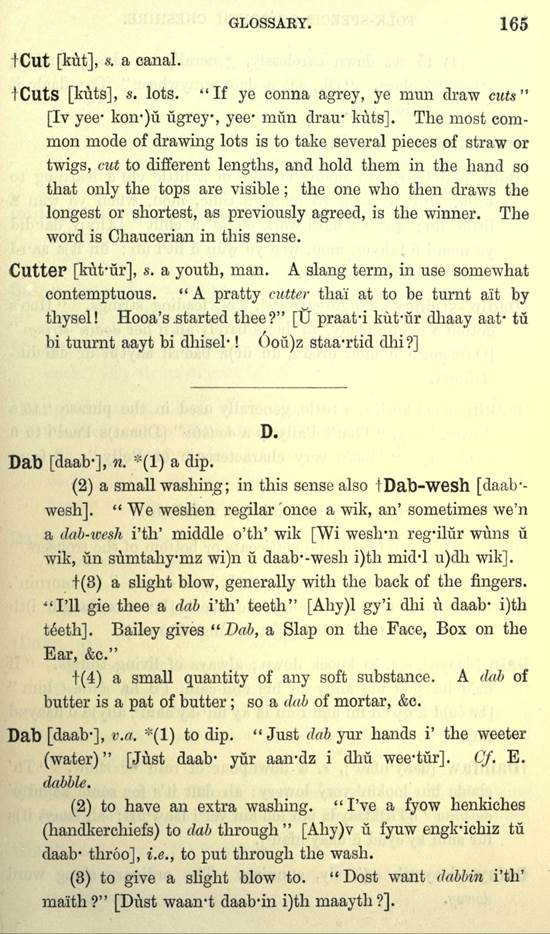
(delwedd C4479) (tudalen 165)
|
GLOSSARY. 165
tCut [kut], s. a canal.
I Cuts [kuts], s. lots. "If ye conna agrey, ye mun draw cuts" [Iv
yee- kon-)u ugrey, yee- mun drau- kuts]. The most common mode of drawing lots
is to take several pieces of straw or twigs, cut to different lengths, and
hold them in the hand so that only the tops are visible ; the one who then
draws the longest or shortest, as previously agreed, is the winner. The word
is Chaucerian in this sense.
Cutter [kut-ur], s. a youth, man. A slang term, in use somewhat contemptuous.
"A pratty cutter thai at to be turnt ait by thysel! Hooa's .started
thee?" [U praat-i kut-ur dhaay aat- tu bi tuurnt aayt bi dhisel- ! 6ou)z
staa-rtid dhi ?]
D.
Dab [daab-], n. *(1) a dip.
(2) a small washing ; in this sense also tDab-wesh [daab'-wesh]. “We weshen
regilar "once a wik, an' sometimes we'n a dab-ivesh i'th' middle o'th'
wik [Wi weslrn reg-ilur wuns u wik, un sumtahy-mz wi)n u daab'-wesh i)th
mid-1 u)dli wik].
t(3) a slight blow, generally with the back of the fingers. "Til gie
thee a dab i'th' teeth" [Ahy)l gy'i dhi u daab- i)th teeth]. Bailey
gives "Dab, a Slap on the Face, Box on the Ear, &c."
t(4) a small quantity of any soft substance. A dab of butter is a pat of
butter ; so a dab of mortar, &c.
Dab [daab-], v.a. *(1) to dip. “Just dab yur hands i' the weeter
(water)" [Just daab- yur aan-dz i dhu wee-tur]. Cf. E. dabble.
(2) to have an extra washing. "I've a fyow henkiches (handkerchiefs) to
dab through" [Ahy)v u fyuw engk-ichiz tu daab- throo], i.e., to put
through the wash.
(3) to give a slight blow to. "Dost want dobbin i'th' maith?" [Dust
waan-t daab-in i)th maayth?].
|
|
|
|
|
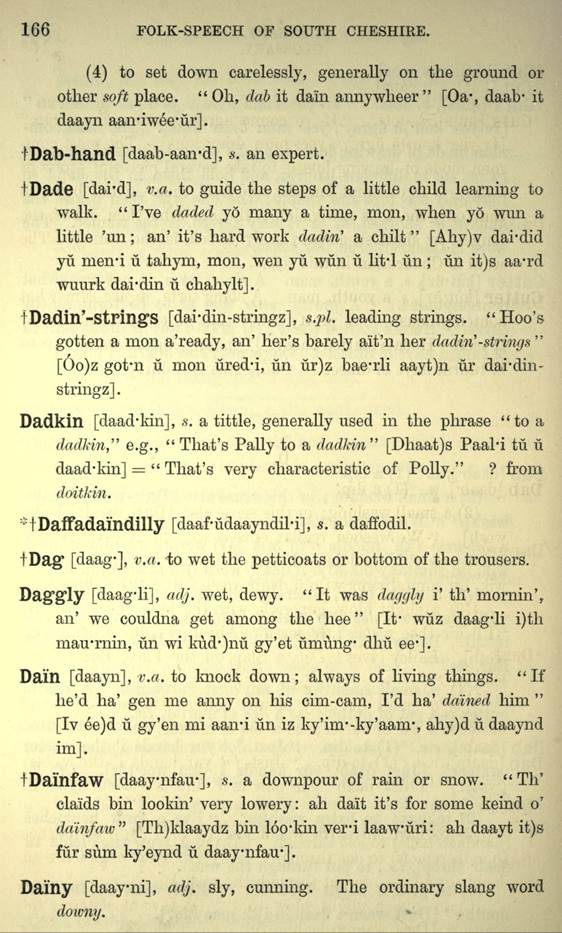
(delwedd C4480) (tudalen 166)
|
166 FOLK-SPEECH OF SOUTH CHESHIRE.
(4) to set down carelessly, generally on the ground or other soft place. “Oh,
dab it dain annywheer” [Oa-, daab- it daayn aan-iwee-ur].
f Dab-hand [daab-aaird], s. an expert.
iDade [dard], v.a. to guide the steps of a little child learning to walk. “I've
daded yo many a time, mon, when yo wun a little 'un ; an' it's hard work
da-din 1 a chilt” [Ahy)v dai'did yu meiri u tahym, mon, wen yu wun u lit'l un
; un it)s aa'rd wuurk dai'din u chahylt].
iDadin'-StringS [dardin-stringz], s.pl. leading strings. “Hoo's gotten a mon
a'ready, an' her's barely ait'n her dadin' -strings” [Oo)z got'n u mon
ured'i, un ur)z bae'rli aayt)n ur dardin-stringz] .
Dadkin [daad-kin], .9. a tittle, generally used in the phrase "to a
dadkin," e.g., “That's Pally to a dadkin" [Dhaat)s PaaH tu u
daad-kin] = “That's very characteristic of Polly." ? from doiikin.
::: tDaffadaindilly [daaf-udaayndil-i], s. a daffodil.
tDag" [daag-], v.a. to wet the petticoats or bottom of the trousers.
Dag'g'ly [daag'li], adj. wet, dewy. "It was daggly i' th' morning an' we
couldna get among the hee” [It 1 wuz daag'li i)th mau'rnin, un wi kud')nu
gy'et urnung* dhu ee*].
Dam [daayn], v.a. to knock down; always of living things. "If he'd ha'
gen me anny on his cim-cam, I'd ha' darned him” [Iv ee)d u gy'en mi aan-i un
iz ky'im'-ky'aam-, ahy)d u daaynd im].
tDamfaw [daaynfau-], s. a downpour of rain or snow. “Th T claids bin lookin'
very lowery: ah dait it's for some keind o r da'infaw" [Th)klaaydz bin
loo-kin ver-i laawuri: ah daayt it)s fur sum ky'eynd u daaynfau-].
Dainy [daayni], adj. sly, cunning. The ordinary slang word downy.
|
|
|
|
|
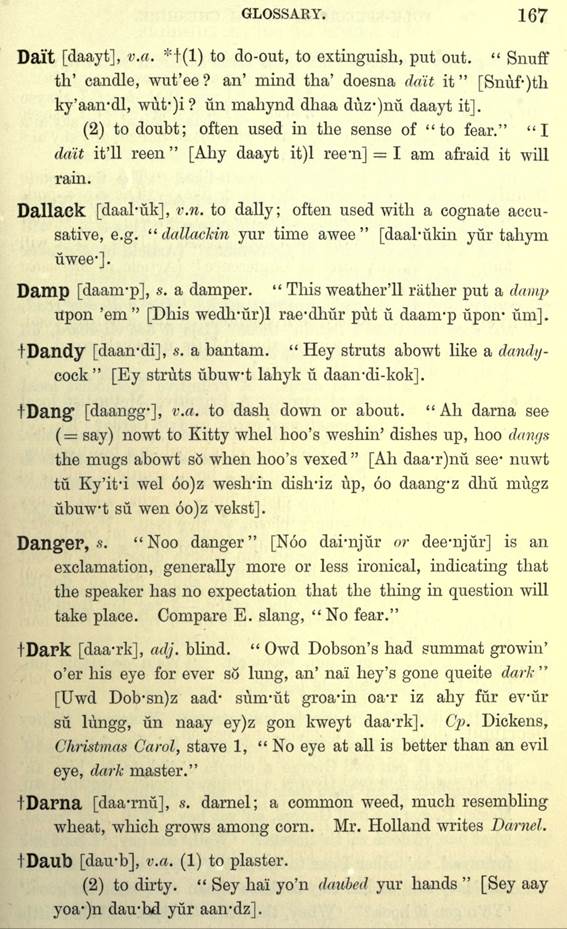
(delwedd C4481) (tudalen 167)
|
GLOSSARY. 167
Dait [daayt], v.a. *t(l) to do-out, to extinguish, put out. “Snuff th'
candle, wut'ee ? an' mind tha' doesna da'it it" [Snuf-)th ky'aan-dl,
wut-)i ? un mahynd dhaa duz-)nu daayt it].
(2) to doubt; often used in the sense of "to fear." "I dait
it'll reen” [Ahy daayt it)l reen] = I am afraid it will rain.
Dallaek [daal-fik], v.n. to dally; often used with a cognate accusative, e.g.
“dallackin yur time awee" [daal-ukin yur tahym uwee'].
Damp [daanrp], s. a damper. “This weather'll rather put a damp upon 'em”
[Dhis wedlrur)! rae'dhur put u daanrp upon- urn],
t Dandy [daan-di], s. a bantam. “Hey struts abowt like a dandy-cock” [Ey
struts ubuwt lahyk u daaivdi-kok].
tDang" [daangg-], v.a. to dash down or about. “Ah darna see (= say) nowt
to Kitty whel hoo's weshin' dishes up, hoo dangs the mugs abowt s5 when hoo's
vexed” [Ah daa-r)nu see- nuwt tu Ky'iH wel 6o)z wesh-in dislriz up, 60
daang-z dhu mugz ubuwt su wen 6o)z vekst].
DangfeP, ?. "Noo danger" [Noo dai'njur or dee-njur] is an
exclamation, generally more or less ironical, indicating that the speaker has
no expectation that the thing in question will take place. Compare E. slang,
“No fear."
tDark [daa-rk], adj. blind. “Owd Dobson's had summat growin' o'er his eye for
ever so lung, an' naii Ley's gone queite dark” [Uwd Dob-sn)z aad- sum-fit
groa-in oa-r iz ahy fur evur su lungg, un naay ey)z gon kweyt daa-rk]. Cp.
Dickens, Christmas Carol, stave 1, “No eye at all is better than an evil eye,
dark master."
i Darna [daa-rnu], s. darnel; a common weed, much resembling wheat, which
grows among corn. Mr. Holland writes Darnel.
tDaub [dau-b], v.a. (1) to plaster.
(2) to dirty. “Sey ha'i yo'n daubed yur hands” [Sey aay yoa-)n dau-bd yur
aan-dz].
|
|
|
|
|
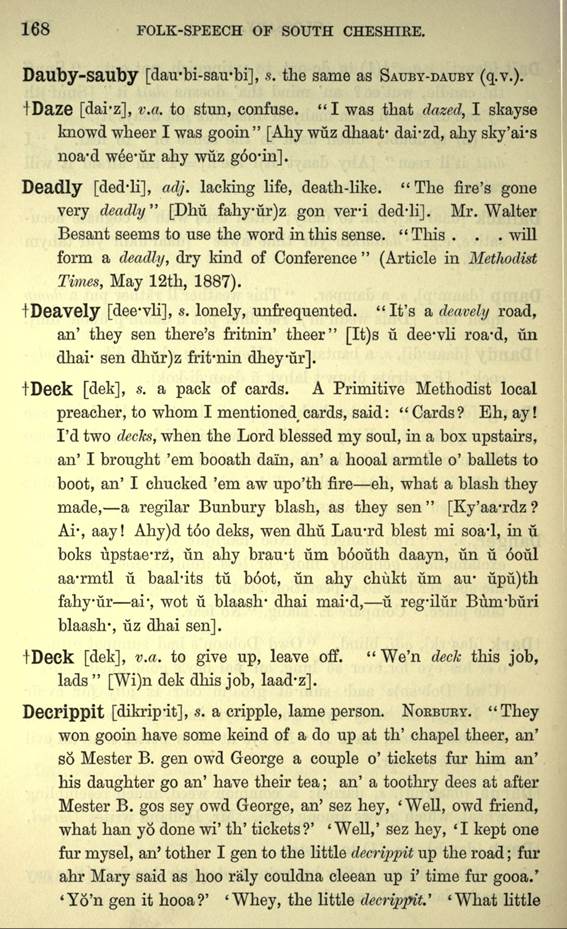
(delwedd C4482) (tudalen 168)
|
FOLK-SPEECH OF SOUTH CHESHIRE.
Dauby-sauby [dau g bi-sau*bi], s. the same as SAUBY-DAUBY (q.v.).
IDaze [dai-z], v.a. to stun, confuse. "I was that dazed, I skayse knowd
wheer I was gooin" [Ahy wuz dhaat- dai-zd, ahy sky'ai-s noa-d weVur ahy
wuz g6o-in].
Deadly [ded-li], adj. lacking life, death-like. “The fire's gone very
deadly" [Dhu fahyur)z gon veri ded'li]. Mr. Walter Besant seems to use
the word in this sense. "This . . . will form a deadly, dry kind of
Conference” (Article in Methodist Times, May 12th, 1887).
iDeavely [dee*vli], s. lonely, unfrequented. "It's a deavely road, an'
they sen there's fritnin' theer" [It)s u dee*vli roa*d, un dhai- sen
dhur)z frit-nin dheyur].
tDeek [dek], s. a pack of cards. A Primitive Methodist local preacher, to
whom I mentioned cards, said : “Cards ? Eh, ay ! I'd two decks, when the Lord
blessed my soul, in a box upstairs, an' I brought 'em booath dain, an' a
hooal armtle o' ballets to boot, an' I chucked 'em aw upo'th fire eh, what a
blash they made, a regilar Bunbury blash, as they sen” [Ky'aa'rdz ? Ar, aay!
Ahy)d too deks, wen dhu Lau'rd blest mi soa'l, in u boks upstae'rz, un ahy
brau*t urn boouth daayn, un u ooul aa'rmtl u baal'its tu boot, un ahy chukt
um au* upu)th fahyur ar, wot u blaash* dhai mai'd, u reg'ilur Bum'buri
blaash', uz dhai sen].
t Deck [dek], v.a. to give up, leave off. “We'n deck this job, lads” [Wi)n
dek dhis job, laad-z].
Deerippit [dikrip-it], s. a cripple, lame person. NORBUEY. "They won
gooin have some keind of a do up at th' chapel theer, an' so Mester B. gen
owd George a couple o' tickets fur him an' his daughter go an' have their tea
; an' a toothry dees at after Mester B. gos sey owd George, an' sez hey,
'Well, owd friend, what han yo done wi' th' tickets?' 'Well,' sez hey, 'I
kept one fur mysel, an' tother I gen to the little decrippit up the road ;
fur ahr Mary said as hoo raly couldna cleean up i' time fur gooa.' 'Yo'n gen
it hooa?' 'Whey, the little decrippit.' 'What little
|
|
|
|
|
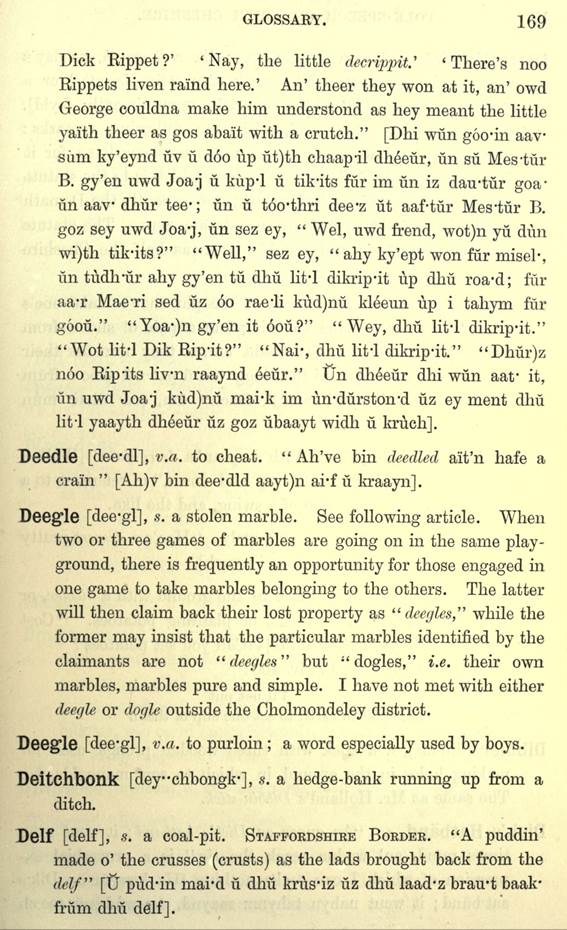
(delwedd C4483) (tudalen 169)
|
GLOSSARY. 169
Dick Rippet?' 'Nay, the little dtcrippit.' 'There's noo Rippets liven raind
here.' An' theer they won at it, an' owd George couldna make him understond
as hey meant the little yaith theer as gos aba'it with a crutch." [Dhi
wun goo-in aav siim ky'eynd uv u doo up ut)th chaapil dheeur, un su Mes-tur
B. gy'en uwd Joaj u kup-1 u tik-its fur im un iz dau-tur goa-un aav dhur
tee-; un u t6o-thri dee'z ut aaf-tur Mes-tur B. goz sey uwd Joa-j, un sez ey,
“Wei, uwd frend, wot)n yu dun wi)th tik-its?" "Well," sez ey,
“ahy ky'ept won fur misel-, un tudlrur ahy gy'en tu dhu lit-1 dikrip-it up
dhu roa-d; fur aa-r Mae-ri sed uz 60 raeii kud)nu kleeun up i tahym fur
goou." "Yoa-)n gy'en it 6ou?" “Wey, dhu lit-1 dikrip-it."
"Wot lit-1 Dik Rip-it?" "Nai-, dhu lit'l dikrip-it."
"Dhur)z noo Ripits livn raaynd eeur." Un dheeur dhi wun aaf it, un
uwd Joaj kud)nu mai-k im un-durston-d uz ey ment dhu litl yaayth dheeur uz
goz ubaayt widh u kruch].
Deedle [dee-dl], v.a. to cheat. “Ah've bin deedled a'it'n hafe a cram” [Ah)v
bin dee-did aayt)n ai-f u kraayn].
[dee-gl], s. a stolen marble. See following article.
When two or three games of marbles are going on in the same playground, there
is frequently an opportunity for those engaged in one game to take marbles
belonging to the others. The latter will then claim back their lost property
as “deegles" while the former may insist that the particular marbles
identified by the claimants are not “deegles" but "dogles,"
i.e. their own marbles, marbles pure and simple. I have not met with either
deegU or dogle outside the Cholmondeley district.
Deeg'le [dee-gl], v.a. to purloin ; a word especially used by boys.
Deitchbonk [deychbongk'], s. a hedge-bank running up from a ditch.
Delf [delf], s. a coal-pit. STAFFOKDSHIRE BORDER. "A puddin' made o' the
crusses (crusts) as the lads brought back from the delf" [U pud-in mai'd
u dhu krus'iz uz dhu laad'z brau-t baak-friim dhu delf].
|
|
|
|
|
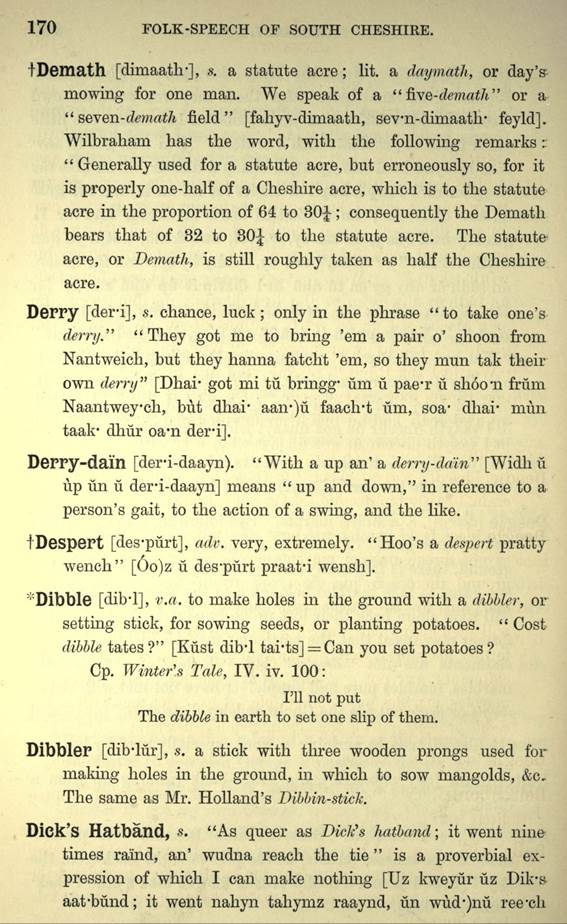
(delwedd C4484) (tudalen 170)
|
170 FOLK-SPEECH OF SOUTH CHESHIRE.
IDemath [dimaatlr], s. a statute acre ; lit. a daymath, or day's mowing for
one man. We speak of a “fxve-demath" or a “sevQiL-dem-atJi field"
[fahyv-dimaath, sevn-dimaath- feyld]. Wilbraham has the word, with the
following remarks : “Generally used for a statute acre, but erroneously so,
for it is properly one-half of a Cheshire acre, which is to the statute acre
in the proportion of 64 to 80^ ; consequently the Demath bears that of 32 to
30J to the statute acre. The statute acre, or Demath, is still roughly taken
as half the Cheshire acre.
Berry [deri], s. chance, luck; only in the phrase "to take one's derry"
"They got me to bring 'em a pair o' shoon from Nantweich, but they hanna
fatcht 'em, so they mun tak their own derry" [Dhar got mi tu bringg- urn
u pae-r u shoo-n. frum Naantweych, but dhar aair)u faaclrt um, soa- dhar mun
taak- dhur oa-n deri].
Derry-dain [der-i-daayn). "With a up an' a derry -dam" [Widh u up
un u deri-daayn] means “up and down," in reference to a person's gait,
to the action of a swing, and the like.
tDespert [des'purt], adv. very, extremely. "Hoo's a despert pratty
wench" [Oo)z u des'purt praat'i wenshj.
;;: Dibble [dib-1], v.a. to make holes in the ground with a dibbler, or
setting stick, for sowing seeds, or planting potatoes. “Cost dibble tates
?" [Kust dib-1 tarts] = Can you set potatoes ? Cp. Winter's Tale, IV.
iv. 100:
I'll not put The dibble in earth to set one slip of them.
Dibbler [dib-lur], s. a stick with three wooden prongs used for making holes
in the ground, in which to sow mangolds, &c. The same as Mr. Holland's
Dibbin-stick.
Dick's Hatband, s. "As queer as Dick's hatband ; it went nine times
ramd, an' wudna reach the tie “is a proverbial expression of which I can make
nothing [Uz kweyur uz Dik-s aat -bund; it went nahyn tahymz raaynd, im
wud-)nu ree-cli
|
|
|
|
|
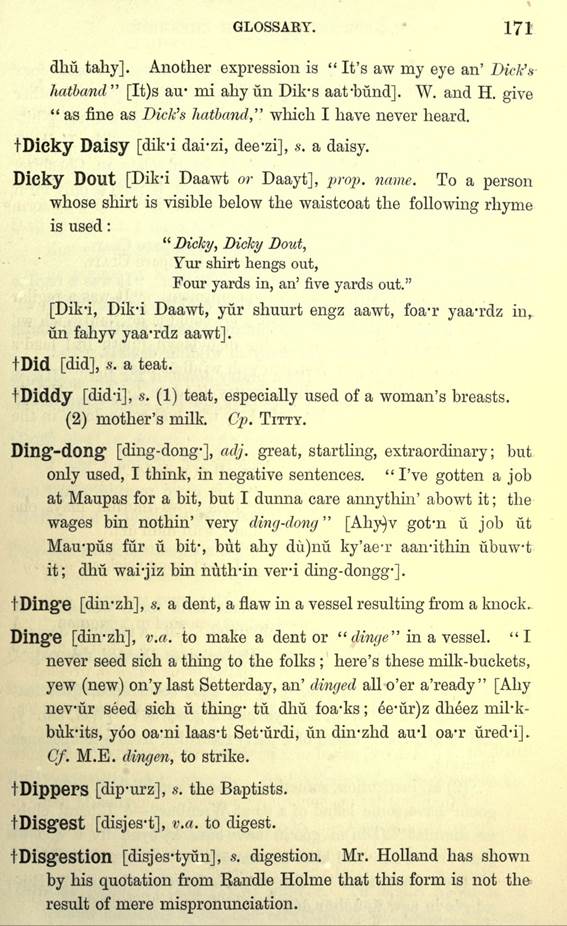
(delwedd C4485) (tudalen 171)
|
GLOSSARY. 171
dim tahy]. Another expression is “It's aw my eye an' Dick's hatband"
[It)s air mi ahyun Dik-s aat'bund]. W. and H. give “as fine as Dick's
hatband," which I have never heard.
tDieky Daisy [dik-i dai-zi, dee-zi], . a daisy.
Dicky Dout [Dik-i Daawt or Daayt], prop. name. To a person whose shirt is
visible below the waistcoat the following rhyme
is used :
"Dicky, Dicky Dout, Yur shirt hengs out, Four yards in, an' five yards
out."
[Dik-i, Dik-i Daawt, yur shuurt engz aawt, foa-r yaa-rdz in, un fahyv yaa*rdz
aawt] .
tDid [did], s. a teat.
tDiddy [did-i], s. (1) teat, especially used of a woman's breasts. (2)
mother's milk. Cp. TITTY.
Ding-dong [ding-dong-], adj. great, startling, extraordinary; but only used,
I think, in negative sentences. “I've gotten a job at Maupas for a bit, but I
dunna care annythiii' abowt it; the wages bin nothin' very ding-dong” [Ahy)v
got-n u job ut Mau-pus fur u bit-, but ahy du)nu ky'ae-r aairithin. ubuwt it;
dhu wai-jiz bin nuth-in ver-i ding-dongg-].
[din-zh], s. a dent, a flaw in a vessel resulting from a knock.
Dinge [din-zh], v.a. to make a dent or “dinge" in a
vessel. "I never seed sich a thing to the folks ; here's these
milk-buckets, yew (new) on'y last Setterday, an' dinged all o'er a'ready”
[Ahy nevur seed sich u thing- tu dhu foa-ks ; ee-ur)z dheez mil-k-biik-its,
yoo oa-rii laas-t Set'urdi, un din-zhd au-1 oa-r ured-i]. Of. M.E. dingen, to
strike.
t DippePS [dip-urz], s. the Baptists. tDisgest [disjes-t], v.a. to digest.
tDisgestion [disjes-tyun], s. digestion. Mr. Holland has shown by his
quotation from Randle Holme that this form is not the result of mere
mispronunciation.
|
|
|
|
|
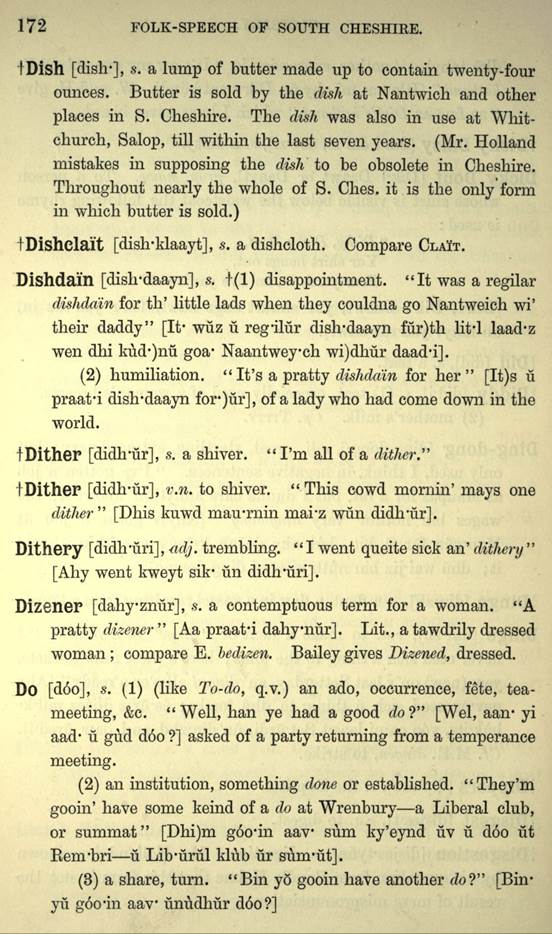
(delwedd C4486) (tudalen 172)
|
FOLK-SPEECH OF SOUTH CHESHIRE.
IDish [dish-], ,5. a lump of butter made up to contain twenty-four ounces.
Butter is sold by the dish at Nantwich and other places in S. Cheshire. The
dish was also in use at Whitchurch, Salop, till within the last seven years.
(Mr. Holland mistakes in supposing the dish to be obsolete in Cheshire.
Throughout nearly the whole of S. Ches. it is the only form in which butter
is sold.)
tDishelait [dish-klaayt], s. a dishcloth. Compare CLAIT.
Dishdain [dislrdaayn], s. f(l) disappointment. "It was a regilar dishddin
for th' little lads when they couldna go Nantweich wi' their daddy" [It'
wuz u regilur dish'daayn fur)th lit'l laad-z wen dhi kud')nu goa* Naantweych
wi)dhur daad'i].
(2) humiliation. “It's a pratty dishddin for her” [It)s u praat'i dish'daayn
for)ur], of a lady who had come down in the world.
t Dither [didh-ur], s. a shiver. “I'm all of a dither."
t Dither [didh'ur], v.n. to shiver. “This cowd mornin' mays one ditJwr"
[Dhis kuwd mau'rnin marz wun didh'ur] .
Dithery [didh-uri], adj. trembling. “I went queite sick an' dithery” [Ahy
went kweyt sik' un didh'uri].
Dizener [dahyznur], s. a contemptuous term for a woman. "A pratty
dizener” [Aa praat'i dahynur]. Lit., a tawdrily dressed woman ; compare E.
bedizen. Bailey gives Dizened, dressed.
Do [d6o], s. (I) (like To-do, q.v.) an ado, occurrence, fete, tea-meeting,
&c. "Well, han ye had a good do*>" [Wei, aan' yi aad- u gud
doo ?] asked of a party returning from a temperance meeting.
(2) an institution, something done or established. "They'm gooin' have
some keind of a do at Wrenbury a Liberal club, or summat" [Dhi)m g6o-in
aav sum ky'eynd uv u d6o ut Eeni'bri u Lib'urul klub ur suni'ut].
(3) a share, turn. "Bin y 6 gooin have another tZo?" [Bin-yu goo
-in aav unudhur d6o?]
|
|
|
|
|
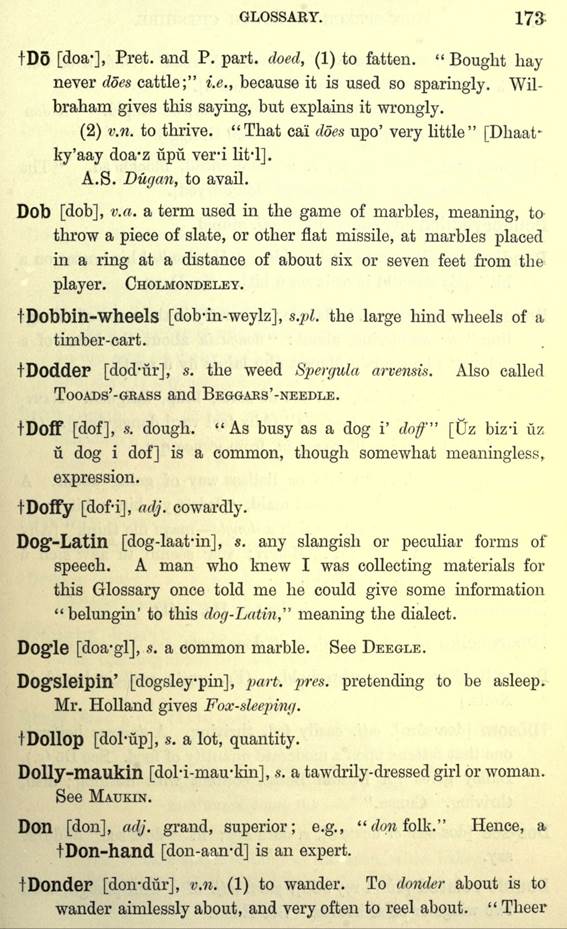
(delwedd C4487) (tudalen 173)
|
GLOSSARY. 173.
IDS [doa-], Pret. and P. part, doed, (1) to fatten. “Bought hay never does
cattle;" i.e., because it is used so sparingly. Wilbraham gives this saying,
but explains it wrongly.
(2) v.n. to thrive. "That cai does upo' very little" [Dhaair ky'aay
doa-z upu veri lit'l].
A.S. Dugan, to avail.
Dob [dob], v.a. a term used in the game of marbles, meaning, to throw a piece
of slate, or other flat missile, at marbles placed in a ring at a distance of
about six or seven feet from the player. CHOLMONDELEY.
t Dobbin-Wheels [dob-in-weylz], s.pl. the large hind wheels of a timber-
cart.
tDodder [dod-ur], s. the weed Spergula arvensis. Also called TOOADS'-GRASS
and BEGGARS'-NEEDLE.
tDoff [dof], s. dough. "As busy as a dog i' doff" [Uz biz-i uz u
dog i dof] is a common, though somewhat meaningless, expression.
tDoffy [dof-i], adj. cowardly.
Dog-Latin [dog-laat-in], s. any slangish or peculiar forms of speech. A man
who knew I was collecting materials for this Glossary once told me he could
give some information “belungin' to this dog-Latin," meaning the
dialect.
Dogle [doa-gl], s. a common marble. See DEEGLE.
Dogsleipin' [dogsleypin], part. pres. pretending to be asleep. Mr. Holland
gives Fox-deeping.
t Dollop [dol-up], s. a lot, quantity.
Dolly-maukin [doH-mau-kin], s. a tawdrily-dressed girl or woman.
See MAUKIN. Don [don], adj. grand, superior; e.g., “don folk." Hence, a
tDon-hand [don-aan-d] is an expert.
tDonder [don-dur], v.n. (1) to wander. To donder about is to wander aimlessly
about, and very often to reel about. “Theer
|
|
|
|
|
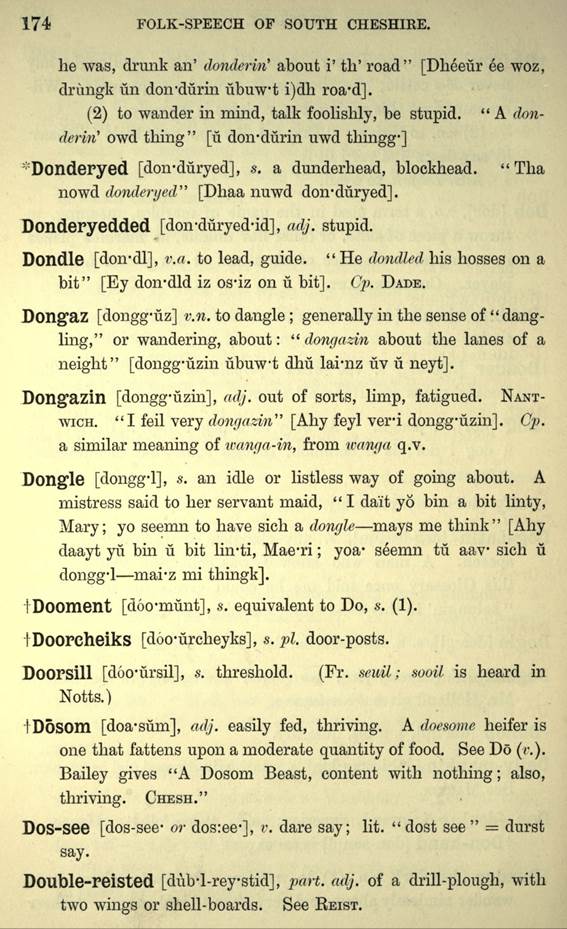
(delwedd C4488) (tudalen 174)
|
174 FOLK-SPEECH OF SOUTH CHESHIRE.
he was, drunk an' donderin' about i' th' road" [Dheeur ee woz, drungk un
don'durin ubuwt i)dh roa-d].
(2) to wander in mind, talk foolishly, be stupid. “A donderin' owd
thing" [u doirdurin uwd thingg']
;;: Donderyed [doirduryed], s. a dunderhead, blockhead. “Tha nowd
donderyed" [Dhaa nuwd don-duryed].
Donderyedded [don-duryed-id], adj. stupid.
Dondle [don-dl], v.a. to lead, guide. “He dandled his bosses on a bit"
[Ey don-did iz os-iz on u bit]. Q>. DADE.
Dongaz [dongg-uz] v.n. to dangle ; generally in the sense of
"dangling," or wandering, about : “dongazin about the lanes of a
neight" [dongg'uzin ubuwt dhu larnz uv u neyt].
Dongazin [dongg'uzin], adj. out of sorts, limp, fatigued. NANTWICH. "I
feil very dongazin" [Ahy feyl veri dongg'uzin]. Cp. a similar meaning of
icanga-in, from ivans/a q.v.
Dongle [dongg-1], s. an idle or listless way of going about. A mistress said
to her servant maid, “I da'it yo bin a bit linty, Mary; yo seemn to have sich
a dongle mays me think" [Ahy daayt yu bin u bit liirti, Mae f ri ; yoa'
seemn tii aav sich u dongg-1 mai-z mi thingk].
IDooment [doo-munt], s. equivalent to Do, s. (1). tDooreheikS [doo-urcheyks],
s. pi. door-posts.
Doorsill [doo-ursil], s. threshold. (Fr. seuil ; sooil is heard in
Notts.) IDoSOm [doa*sum], adj. easily fed, thriving. A doesome heifer is
one that fattens upon a moderate quantity of food. See Do (*.).
Bailey gives "A Dosom Beast, content with nothing ; also,
thriving. CHESH."
DOS-see [dos-see- or dos:ee-], v. dare say; lit. "dost see" = durst
say. Double-reisted [dub-1-reystid], part. adj. of a drill-plough, with
two wings or shell-boards. See EEIST.
|
|
|
|
|
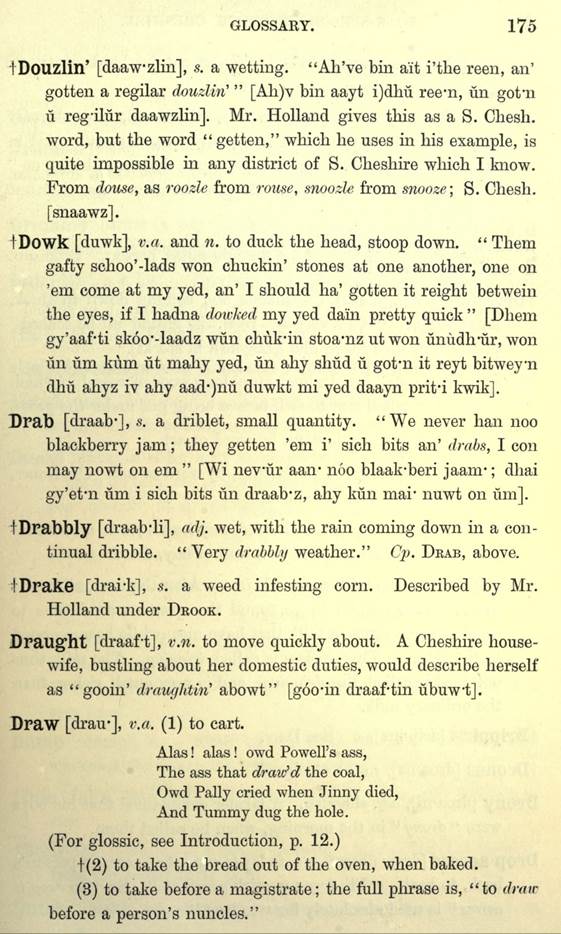
(delwedd C4489) (tudalen 175)
|
GLOSSARY. 175
1 Douzlin' [daawzlin], s. a wetting. "Ah've bin ait i'the reen, an'
gotten a regilar douzliri 1” [Ah)v bin aayt i)dhu ree*n, un got'n u regilur
daawzlin]. Mr. Holland gives this as a S. Chesh. word, but the word “getten,"
which he uses in his example, is quite impossible in any district of S.
Cheshire which I know. From douse, as roozle from rouse, snoozle from snooze;
S. Chesh. [snaawz].
tDowk [duwk], v.a. and n. to duck the head, stoop down. “Them gafty
schoo'-lads won chuckin' stones at one another, one on 'em come at my yed,
an' I should ha' gotten it reight betwein the eyes, if I hadna dowked my yed
dain pretty quick” [Dhem gy'aaf'ti skoo'-laadz wun chuk'in stoa*nz ut won
unudh'ur, won un urn kum ut mahy yed, un ahy shud u got'n it reyt bitweyn dhu
ahyz iv ahy aad')nu duwkt mi yed daayn prit-i kwik].
Drab [draab*], s. a driblet, small quantity. "We never han noo
blackberry jam ; they getten 'em i' sich bits an' drabs, I con may nowt on
em” [Wi nevur aan* noo blaak'beri jaam* ; dhai gy'et'ii um i sich bits un
draab'z, ahy kun mai* nuwt on um].
tDrabbly [draab'li], adj. wet, with the rain coming down in a continual
dribble. “Very dmbbly weather." Cp. DEAB, above.
! Drake [drai-k], s. a weed infesting corn. Described by Mr. Holland under
DROOK.
Draught [draafi], v.n. to move quickly about. A Cheshire housewife, bustling
about her domestic duties, would describe herself as "gooin* draughtiri
abowt" [goo'in draaf-tin ubuwt].
Draw [drau-], v.a. (I) to cart.
Alas ! alas ! owd Powell's ass, The ass that draufd the coal, Owd Pally cried
when Jinny died, And Tummy dug the hole.
(For glossic, see Introduction, p. 12.)
1(2) to take the bread out of the oven, when baked.
(3) to take before a magistrate; the full phrase is, "to draw before a
person's nuncles."
|
|
|
|
|
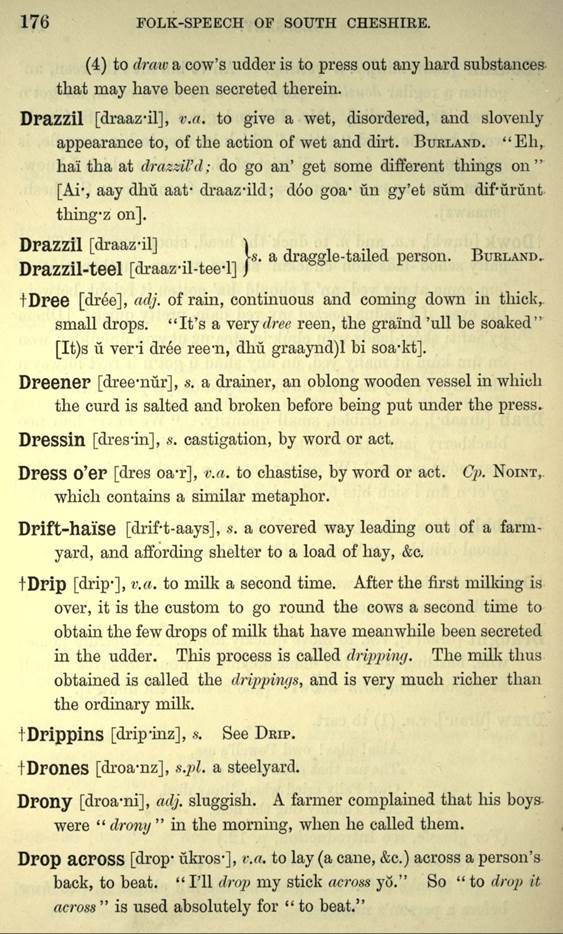
(delwedd C4490) (tudalen 176)
|
176 FOLK-SPEECH OF SOUTH CHESHIRE.
(4) to draw a cow's udder is to press out any hard substances that may have
been secreted therein.
Drazzil [draaz-il], v.a. to give a wet, disordered, and slovenly appearance
to, of the action of wet and dirt. BURLAND. "Eh, ha'i tha at drazzil'd;
do go an' get some different things on" [Ai-, aay dhu aat- draaz-ild;
d6o goa* uri gy'et sum dif-urunt thing -z on].
Drazzil [draaz-il] )
J-s. a draggle-tailed person. BURLAND.. Drazzil-teel [draaz-il-tee-1] /
I Dree [dree], adj. of rain, continuous and coming down in thick, small
drops. "It's a very dree reen, the graind 'ull be soaked" [It)s u
ver'i dree reen, dhu graaynd)! bi soa-kt].
Dreener [dree-nur], s. a drainer, an oblong wooden vessel in which the curd
is salted and broken before being put under the press.
Dressin [dres-in], s. castigation, by word or act.
Dress O'er [dres oa-r], v.a. to chastise, byword or act. Cp. NOINT, which
contains a similar metaphor.
Drift-haise [drif-t-aays], s. a covered way leading out of a farmyard, and
affording shelter to a load of hay, &c.
tDrip [drip-], v.a. to milk a second time. After the first milking is over,
it is the custom to go round the cows a second time to obtain the few drops
of milk that have meanwhile been secreted in the udder. This process is
called dripping. The milk thus obtained is called the drippings, and is very
much richer than the ordinary milk.
iDrippins [drip-inz], s. See DRIP. t Drones [droa-nz], s.pl. a steelyard.
Drony [droa-ni], adj. sluggish. A farmer complained that his boys were “drony
“in the morning, when he called them.
Drop across [drop* ukros-], c.a. to lay (a cane, &c.) across a person's
back, to beat. “I'll drop my stick across yo." So “to drop it across “is
used absolutely for “to beat."
|
|
|
|
|
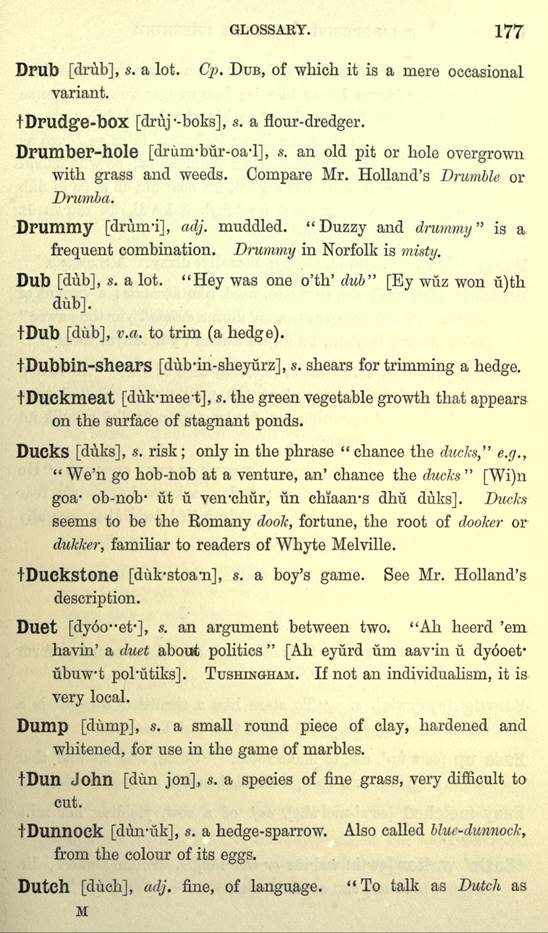
(delwedd C4491) (tudalen 177)
|
GLOSSARY. 177
Drub [drub], s. a lot. Cp. DUB, of which it is a mere occasional variant.
f Drudge-box [druj'-boks], s. a flour-dredger.
Drumber-hole [drum-bur-oa-1], s. an old pit or hole overgrown with grass and
weeds. Compare Mr. Holland's Drumble or Drumba.
Drummy [drunri], adj. muddled. “Duzzy and drummy" is a frequent
combination. Drymmy in Norfolk is misty.
Dub [dub], s. a lot. "Hey was one o'th' dub" [Ey wuz won u)th dub].
IDub [dub], v.a. to trim (a hedge).
t Dubbin-shears [dub-in-sheyurz], s. shears for trimming a hedge.
tDuekmeat [duk-meei], s. the green vegetable growth that appears on the
surface of stagnant ponds.
Ducks [diiks], s. risk ; only in the phrase “chance the ducks," e.g.,
“We'n go hob-nob at a venture, an' chance the ducks” [Wi)n goa p ob-nob* ut u
ven'chur, un chiaan-s dhu duks]. Ducks seems to be the Romany dook, fortune,
the root of dooker or dukker, familiar to readers of Whyte Melville.
IDuckstone [duk-stoan], s. a boy's game. See Mr. Holland's description.
Duet [dy6o--et-], s. an argument between two. "Ah heerd 'em havin' a
duet about politics” [Ah eyurd urn aavin u dy6oet-ubuwt pol'utiks].
TUSHINGHAM. If not an individualism, it is very local.
Dump [dump], s. a small round piece of clay, hardened and whitened, for use
in the game of marbles.
IDun John [dun jon], s. a species of fine grass, very difficult to
cut. I Dunnock [dun-uk], s. a hedge-sparrow. Also called blue-dunnock,
from the colour of its eggs.
Dutch [duch], adj. fine, of language. "To talk as Dutch as M
|
|
|
|
|
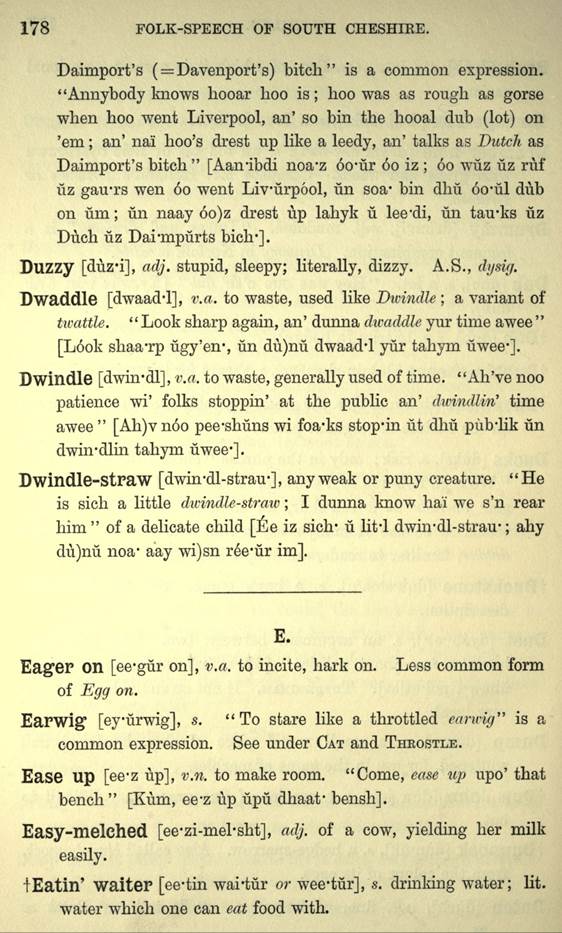
(delwedd C4492) (tudalen 178)
|
178 FOLK-SPEECH OF SOUTH CHESHIRE.
Daimport's ( Davenport's) bitch" is a common expression. "Annybody
knows hooar hoo is ; hoo was as rough as gorse when hoo went Liverpool, an'
so bin the hooal dub (lot) on 'em ; an' na'i hoo's drest up like a leedy, an'
talks as Dutch as Daimport's bitch” [Aanibdi noa-z oo-ur 60 iz ; 60 wuz uz
ruf uz gau-rs wen 60 went Livurpool, un soa- bin dhu 6o-ul dub on urn ; un
naay 6o)z drest up lahyk u lee'di, un tau-ks uz Duch uz Darmpurts biclr].
Duzzy [duz-i], adj. stupid, sleepy; literally, dizzy. A.S., dysig.
Dwaddle [dwaad'l], v.a. to waste, used like Dwindle ; a variant of tivattle.
“Look sharp again, an' dunna dwaddle yur time a wee” [L6ok shaa'rp ugy'en-,
un du)nu dwaad-1 yur tahym uwee'].
Dwindle [dwin-dl] , v.a. to waste, generally used of time. ' Ah've noo
patience wi' folks stoppin' at the public an' divindlin' time awee” [Ah)v n6o
pee-shuns wi foa-ks stop-in ut dhu pub'hk un dwin'dlin tahym uwee'].
Dwindle-straw [dwhrdl-strau-], any weak or puny creature. "He is sich a
little duindle-straiv ; I dunna know ha'i we s'n rear him “of a delicate
child [Ee iz sich- u lit-1 dwhrdl-strau' ; ahy du)nu noa- aay wi)sn ree-ur
im].
E.
Eager on [ee-gur on], v.a. to incite, hark on. Less common form of Egg on.
Earwig" [eyurwig], s. "To stare like a throttled earwig" is a
common expression. See under CAT and THROSTLE.
Ease up [ee-z up], v.n. to make room. "Come, ease up upo' that
bench" [Kum, ee*z up upu dhaat' bensh].
Easy-melched [ee-zi-mel-sht], adj. of a cow, yielding her milk
easily. iEatin' waiter [ee-tin wai-tur or wee-tur], s. drinking water; lit.
water which one can eat food with.
|
|
|
|
|
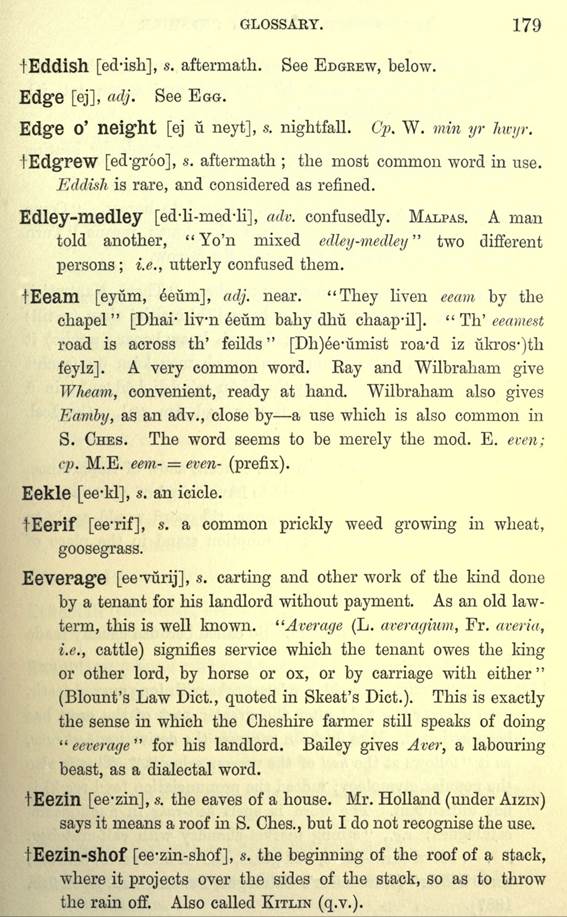
(delwedd C4493) (tudalen 179)
|
GLOSSARY. 179
f Eddish [ed-ish], s. aftermath. See EDGKEW, below.
Edge [ej], adj. See EGG.
Edge 0' Height [ej u neyt], s. nightfall. Cp. W. min yr Jm-yr.
tEdgrew [ed-groo], s. aftermath ; the most common word in use. Eddish is
rare, and considered as refined.
Edley-medley [ed-li-med-li], adv. confusedly. MALPAS. A man told another,
"Yo'n mixed edley -medley “two different persons ; i.e. t utterly confused
them.
tEeam [eyum, eeum], adj. near. "They liven eeam by the chapel"
[Dhai- livn eeum bahy dhu chaap-il]. “Th' eeamest road is across th' feilds”
[Dh)ee-umist roa-d iz ukros-)th feylz]. A very common word. Ray and Wilbraham
give WJwam, convenient, ready at hand. Wilbraham also gives Eamby, as an
adv., close by a use which is also common in S. CHES. The word seems to be
merely the mod. E. even; cp. M.E. eem- = even- (prefix).
Eekle [ee-kl], s. an icicle.
tEerif [ee'rif], s. a common prickly weed growing in wheat, goosegrass.
Beverage [ee-vurij], s. carting and other work of the kind done by a tenant
for his landlord without payment. As an old law-term, this is well known.
"Average (L. averagium, Fr. averia, i.e., cattle) signifies service which
the tenant owes the king or other lord, by horse or ox, or by carriage with
either” (Blount's Law Diet., quoted in Skeat's Diet.). This is exactly the
sense in which the Cheshire farmer still speaks of doing “eeverage" for
his landlord. Bailey gives Aver, a labouring beast, as a dialectal word.
tEezin [ee-zin], s. the eaves of a house. Mr. Holland (under AIZIN) says it
means a roof in S. Ches., but I do not recognise the use.
tEezin-shof [ee f zin-shof], s. the beginning of the roof of a stack, where
it projects over the sides of the stack, so as to throw the rain off. Also
called KITLIN (q.v.).
|
|
|
|
|
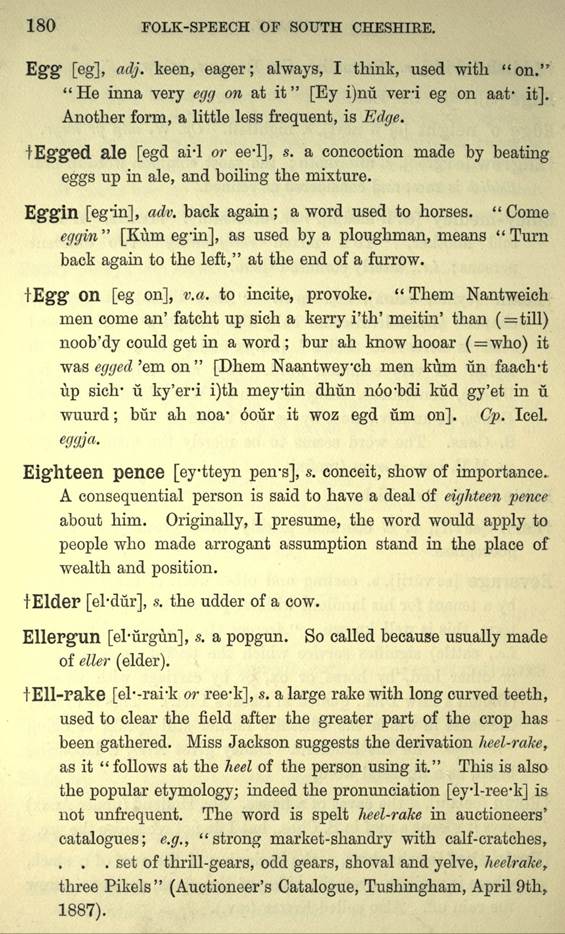
(delwedd C4494) (tudalen 180)
|
180 FOLK-SPEECH OF SOUTH CHESHIRE.
Egg" [eg], adj. keen, eager; always, I think, used with "on."
"He inna very egg on at it" [Ey i)nu veri eg on aat- it]. Another
form, a little less frequent, is Edge.
t Egged ale [egd aH or ee-1], s. a concoction made by beating eggs up in ale,
and boiling the mixture.
Eggin [egin], adv. back again; a word used to horses. "Come eggin"
[Kum eg-in], as used by a ploughman, means "Turn back again to the
left," at the end of a furrow.
I Egg on [eg on], v.a. to incite, provoke. “Them Nantweich men come an'
fatcht up sich a kerry i'th' meitin' than (=till) noob'dy could get in a
word; bur ah know hooar (=who) it was egged 'em on” [Dhem Naantweych men kum
un faach't up sich' u ky'eri i)th meytin dhun n6o*bdi kud gy'et in ii wuurd ;
bur ah noa- oour it woz egd um on]. Cp. Icel.
Eighteen pence [eytteyn pen-s], s. conceit, show of
importance.. A consequential person is said to have a deal bf eighteen pence
about him. Originally, I presume, the word would apply to people who made
arrogant assumption stand in the place of wealth and position.
tElder [el-dur], s. the udder of a cow.
Ellergun [el-urgun], s. a popgun. So called because usually made of eller
(elder).
f Ell-rake [el--rai-k or ree-k], s. a large rake with long curved teeth, used
to clear the field after the greater part of the crop has been gathered. Miss
Jackson suggests the derivation heel-rake, as it “follows at the heel of the
person using it." This is also the popular etymology; indeed the
pronunciation [eyl-ree-k] is not unfrequent. The word is spelt heel-rake in
auctioneers' catalogues; e.g., "strong market-shandry with calf
-cratches, . . . set of thrill-gears, odd gears, shoval and yelve, heelrake,
three Pikels" (Auctioneer's Catalogue, Tushingham, April 9th> 1887).
|
|
|
|
|
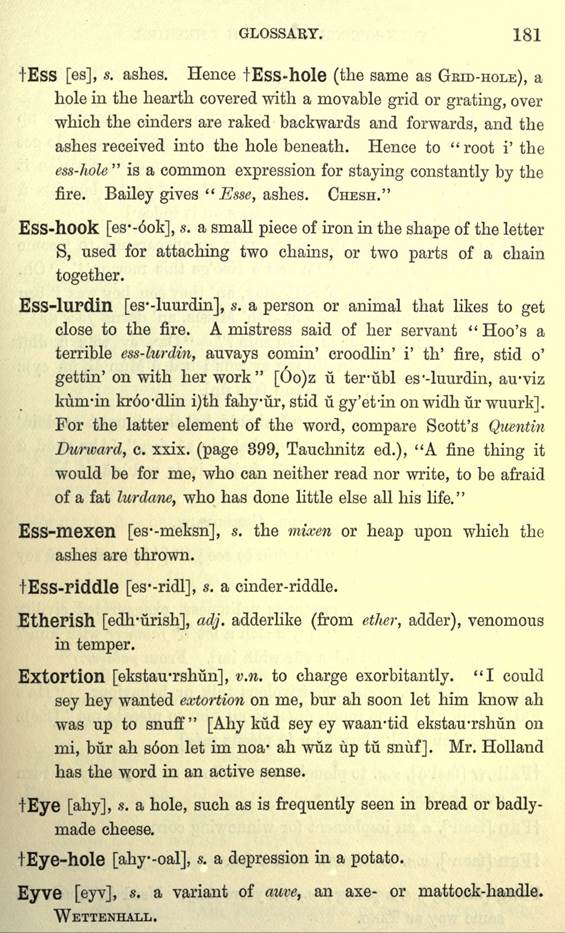
(delwedd C4495) (tudalen 181)
|
GLOSSARY.
181
tEss [es], s. ashes. Hence tEss-hole (the same as
GRID-HOLE), a hole in the hearth covered with a movable grid or grating, over
which the cinders are raked backwards and forwards, and the ashes received
into the hole beneath. Hence to “root i' the ess-hole “is a common expression
for staying constantly by the fire. Bailey gives “Esse, ashes. CHESH."
Ess-hook [es--6ok], s. a small piece of iron in the shape of the letter S,
used for attaching two chains, or two parts of a chain together.
Ess-lurdin [es--luurdin], s. a person or animal that likes to get close to
the fire. A mistress said of her servant "Hoo's a terrible ess-lurdin,
auvays comin' croodlin' i' th' fire, stid o' gettin' on with her work"
[6o)z u teriibl es'-luurdin, au'viz kunrin kr6o f dlin i)th fahyur, stid u
gy'et'in on widh ur wuurk]. For the latter element of the word, compare
Scott's Quentin Durward, c. xxix. (page 399, Tauchnitz ed.), "A fine
thing it would be for me, who can neither read nor write, to be afraid of a
fat lurdane, who has done little else all his life."
Ess-mexen [es--meksn], s. the mixen or heap upon which the ashes are thrown.
t Ess-riddle [es*-ridl], s. a cinder-riddle.
Etherish [edh-urish], adj. adderlike (from etJier, adder), venomous in
temper.
Extortion [ekstau-rshun], v.n. to charge exorbitantly. "I could sey hey
wanted extortion on me, bur ah soon let him know ah was up to snuff"
[Ahy kud sey ey waan-tid ekstau-rshun on mi, bur ah s6on let im noa* ah wuz
up tu snuf]. Mr. Holland has the word in an active sense.
I Eye [ahy], s. a hole, such as is frequently seen in bread or badly-made
cheese. tEye-hole [ahy-oal], s. a depression in a potato.
Eyve [eyv], s. a variant of auve, an axe- or mattock-handle. WETTENHALL.
|
|
|
|
|
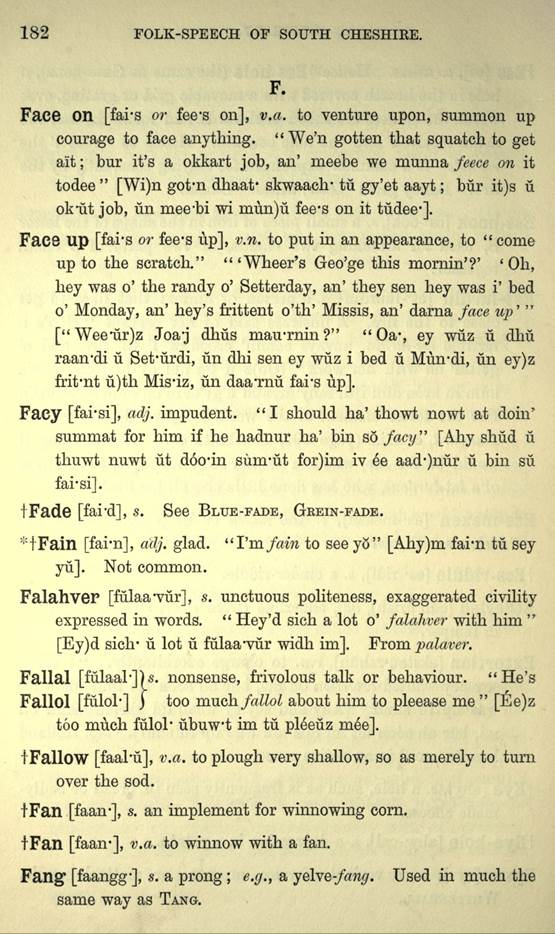
(delwedd C4496) (tudalen 182)
|
182 FOLK-SPEECH OF SOUTH CHESHIRE.
F.
Face on [fars or fee's on], v.a. to venture upon, summon up courage to face
anything. “We'll gotten that squatch to get ait; bur it's a okkart job, an'
meebe we munna feece on it todee” [Wi)n got-n dhaat 4 skwaach- tu gy'et aayt
; bur it)s u ok-ut job, un mee-bi wi mun)u fee's on it tudee-].
FaC8 up [fars or fee's up], v.n. to put in an appearance, to “come up to the
scratch." "'Wheer's Geo'ge this mornin'?' 'Oh, hey was o' the randy
o' Setterday, an' they sen hey was i' bed o' Monday, an' hey's frittent o'th'
Missis, an' darna face up'“ ["Wee-ur)z Joa-j dims mau-rnin?" “Oa-,
ey wuz u dhu raan-di u Set-urdi, un dhi sen ey wuz i bed u Mun-di, un ey)z
frit'nt u)th Mis'iz, un daaTnu fai's up].
Facy [fai-si], adj. impudent. "I should ha' thowt nowt at doin' summat
for him if he hadmir ha' bin so facy" [Ahy shud u thuwt nuwt ut doo'in
sum'ut for)im iv ee aad')nur u bin su far si].
tFade [fai'd], s. See BLUE-FADE, GEEIN-FADE.
'4 Fain [fai-n], adj. glad. "I'm fain to see yo" [Ahy)m fai-n tu
sey yu]. Not common.
FalahveP [fulaa'vur], s. unctuous politeness, exaggerated civility expressed
in words. “Hey'd sich a lot o' falakver with him” [Ey)d sich* u lot u
fulaa'vur widh im]. From palaver.
Fallal [fulaal % ])s. nonsense, frivolous talk or behaviour. "He's
Fallol [fulol*] ) too much fallol about him to pleease me” [Ee)z too much
fulol* ubuwt im tu pleeuz mee].
IFallow [faal-u], v.a. to plough very shallow, so as merely to turn over the
sod.
tFan [faan-], s. an implement for winnowing corn. IFan [faan'], v.a. to
winnow with a fan.
Fang [faangg-], s. a prong ; e.g., a yelve-fang. Used in much the same way as
TANG.
|
|
|
|
|
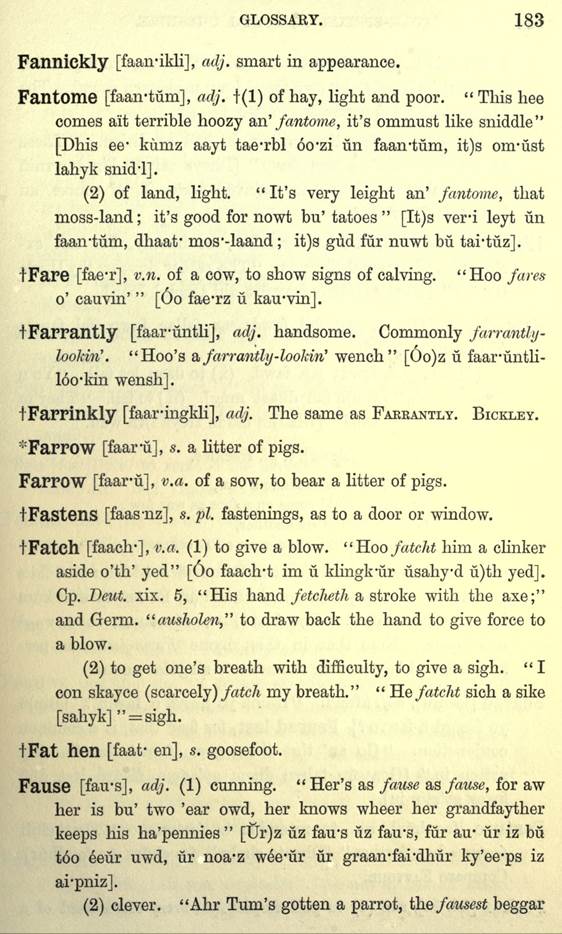
(delwedd C4497) (tudalen 183)
|
GLOSSARY.
183
Fannickly [faan-ikli], adj. smart in appearance.
Fantome [faan-tum], adj. f(l) of hay, light and poor.
“This hee comes a'it terrible hoozy an' fantome, it's ommust like
sniddle" [Dhis ee- kumz aayt tae-rbl 6o-zi un faan-tum, it)s onrust
lahyk snidi].
(2) of land, light. "It's very leight an' fantome, that moss-land ; it's
good for nowt bu' tatoes” [It)s veri leyt un faan-tum, dhaat' mos'-laand ;
it)s gud fur nuwt bu tai-tuz].
tFare [fae-r], v.n. of a cow, to show signs of calving. "Hoo fares o'
cauvin'“ [60 fae-rz u kau-vin].
tFarrantly [faaruntli], adj. handsome. Commonly farrantly-lookin'.
"Hoo's a,farrantly-lookin' wench" [Oo)z u faaruntli-16o-kin wensh].
tFarrinkly [faar-ingkli], adj. The same as FAERANTLY. BICKLEY. "Farrow
[faar-u], s. a litter of pigs. Farrow [faar-u], v.a. of a sow, to bear a
litter of pigs. IFastens [faas-nz], s. pi. fastenings, as to a door or window.
t Patch [faaclr], v.a. (1) to give a blow. "Hoofatcht him a clinker
aside o'th' yed" [Oo faach-t im u klingk-ur usahyd u)th yed]. Cp. Deut.
xix. 5, "His hand /etclietli a stroke with the axe;" and Germ,
"ausholen," to draw back the hand to give force to a blow.
(2) to get one's breath with difficulty, to give a sigh. “I con skayce
(scarcely) fatch my breath." “Hefatcht sich a sike [sahyk]" = sigh.
tFat hen [faat- en], s. goosefoot.
Fause [fairs], adj. (1) cunning. "Her's as fause as fause, for aw her is
bu' two 'ear owd, her knows wheer her grandfayther keeps his ha'pennies”
[Ur)z uz fau'S uz fau-s, fur au' ur iz bu t6o eeur uwd, ur noa-z wee-ur ur
graan-fai'dhur ky'ee-ps iz ai-pniz].
(2) clever. "Ahr Turn's gotten a parrot, ihefausest beggar
|
|
|
|
|
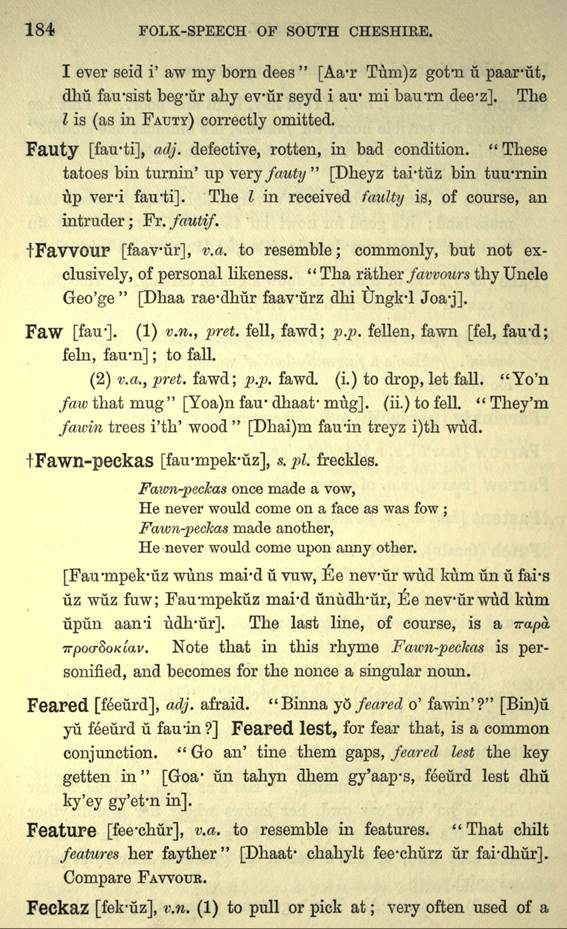
(delwedd C4498) (tudalen 184)
|
FOLK-SPEECH OF SOUTH CHESHIRE.
I ever seid i' aw my born dees” [Aa-r Tum)z got'n u paarut, dhu fau-sist
beg-ur ahy evur seyd i air mi bairrn dee-z]. The I is (as in FAUTY) correctly
omitted.
Fauty [fau-ti], adj. defective, rotten, in bad condition. "These tatoes
bin turnin' up verjfauty" [Dheyz tai-tuz bin tuu-rnin up ver-i fauii].
The I in received faulty is, of course, an intruder ; Fr. fautif.
fFawour [faavur], v.a. to resemble; commonly, but not exclusively, of
personal likeness. “Tha rather favvours thy Uncle Geo'ge” [Dhaa rae-dhur
faavurz dhi t^ngk-l Joa-j].
Faw [fau-]. (1) v.n., pret. fell, fawd; p.p. fellen, fawn [fel, fau'd; feln,
fau*n] ; to fall.
(2) v.a., pret. fawd; p.p. fawd. (i.) to drop, let fall. "Yo'n faw that
mug" [Yoa)n fau- dhaat* mug], (ii.) to fell. “They'm fawin trees i'th'
wood” [Dhai)m fau in treyz i)th wud.
tFawn-peekas [fau-mpek-uz], s. pi. freckles.
Fawn-peckas once made a vow,
He never would come on a face as was fow ;
Fawn-peckas made another,
He never would come upon anny other.
[Fau-mpek-uz wuns mai-d u vuw, 6e nevur wud kum un u fai-s uz wuz fuw;
Fau-mpekuz mai-d unudh-ur, ~&e nevur wud kum upun aani udh-ur]. The last
line, of course, is a -n-apa, TrpocrSoKLav. Note that in this rhyme
Fawn-peckas is personified, and becomes for the nonce a singular noun.
Feared [feeurd], adj. afraid. "Binna yo feared o' fawin'?" [Bin)u
yu feeurd u fau 'in ?] Feared lest, for fear that, is a common conjunction.
“Go an' tine them gaps, feared lest the key getten in" [Goa- un tahyn
dliem gy'aap-s, feeurd lest dhu ky'ey gy'et'n in].
Feature [fee-chur], v.a. to resemble in features. “That chilt features her
fayther" [Dhaat' chahylt fee-churz ur fai-dhur]. Compare FAWOUB.
Feckaz [fek-uz], v.n. (1) to pull or pick at ; very often used of a
|
|
|
|
|
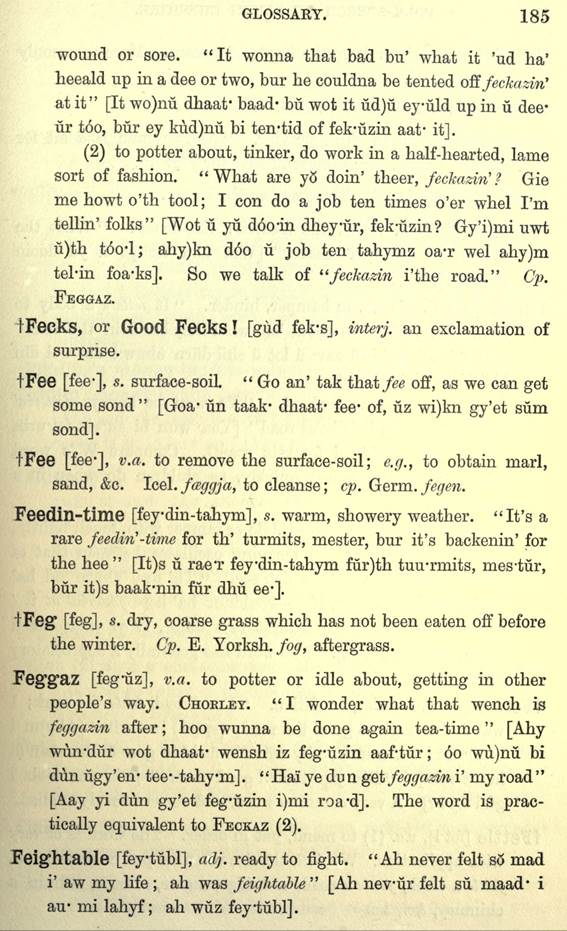
(delwedd C4499) (tudalen 185)
|
GLOSSARY. 185
wound or sore. "It wonna that bad bu' what it 'ud ha' heeald up in a dee
or two, bur he couldna be tented offfeckazin' at it" [It wo)nu dhaat-
baad- bu wot it ud)u eyuld up in u dee-ur too, bur ey kud)nu bi ten-tid of
fek-uzin aat- it].
(2) to potter about, tinker, do work in a half-hearted, lame sort of fashion.
"What are yS doin' theer, feckaziri ? Gie me howt o'th tool; I con do a
job ten times o'er whel I'm tellin' folks" [Wot u yu d6oin dheyur,
fek-uzin? Gy'i)mi uwt u)th t6o-l; ahy)kn d6o u job ten tahymz oa-r wel ahy)m
tel-in foa-ks]. So we talk of "feckazin i'the road." Cp. FEGGAZ.
t Fecks, or Good Fecks! [gud fek-s], interj. an exclamation of surprise.
IFee [fee-], s. surface-soil “Go an' tak that/00 off, as we can get some
sond" [Goa- un taak- dhaat- fee- of, uz wi)kn gy'et sum sond].
IFee [fee-], v.a. to remove the surface- soil ; e.g., to obtain marl, sand,
&c. Icel. faggja, to cleanse; cp. GeTm.fegen.
Feedin-time [feydin-tahym], s. warm, showery weather. "It's a rare
feediri-time for th' turmits, mester, bur it's backenin' for the hee” [It)s u
rae'r feydin-tahym fur)th tuu-rmits, mes-tur, bur it)s baak-nin fur dhu ee-].
tFeg" [feg], s. dry, coarse grass which has not been eaten off before
the winter. Cp. E. Yorksh. fog, aftergrass.
Feggaz [feg-uz], v.a. to potter or idle about, getting in other people's way.
CHOELEY. "I wonder what that wench is fegyazin after; hoo wunna be done
again tea-time" [Ahy wuivdur wot dhaat- wensh iz feg-uzin aaf-tur ; 60
wu)nu bi dun ugy 'en- tee* -tahy *m] . ' ' Hai ye du n get feggazin i' my
road ' ' [Aay yi dun gy'et feg-uzin i)mi roa-d]. The word is practically
equivalent to FECKAZ (2).
Feightable [feytubl], adj. ready to fight. "Ah never felt so mad i' aw
my life ; ah was feiglitable” [Ah nevur felt su maad- i au- mi lahyf ; ah wuz
feytubl].
|
|
|
|
|
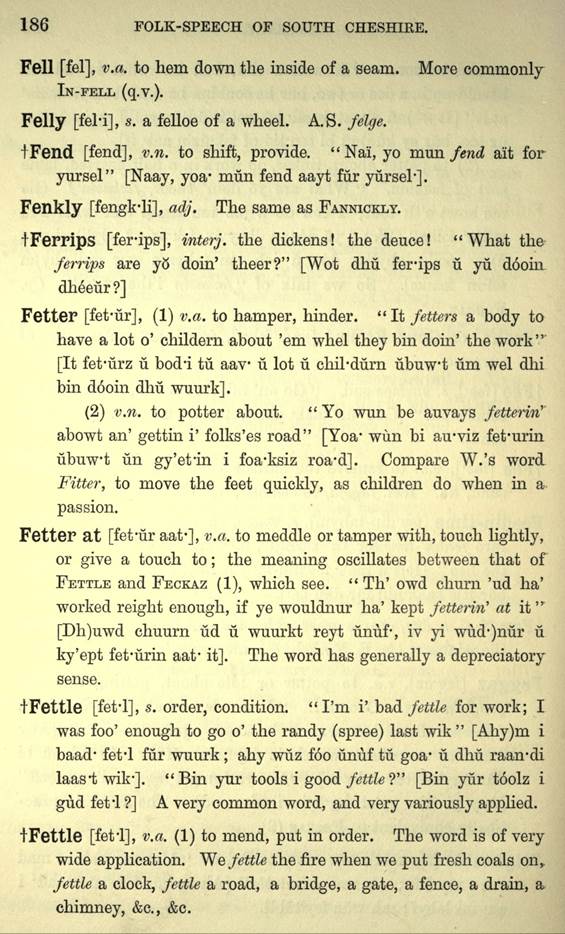
(delwedd C4500) (tudalen 186)
|
186
FOLK-SPEECH OF SOUTH CHESHIRE.
Fell [fel], v.a. to hem down the inside of a seam. More
commonly IN-FELL (q.v.).
Felly [fel-i], s. a felloe of a wheel. A.S. felge.
tFend [fend], v.n. to shift, provide. “Nai, yo mun fend ait for yursel"
[Naay, yoa* mun fend aayt fur yursel-].
Fenkly [fengk-li], adj. The same as FANNICKLY.
IFerripS [fer-ips], inter j. the dickens! the deuce! "What the ferrips
are y5 doin' theer?" [Wot dhu fer-ips u yu doom dheeur?]
Fetter [fet-ur], (1) v.a. to hamper, hinder. "It fetters a body to have
a lot o' childern about 'em whel they bin doin' the work" [It fet-urz u
bod-i tu aav u lot u chil-durn ubuwt urn wel dhi bin dooin dhu wuurk].
(2) v.n. to potter about. “Yo wun be auvays fetteriri abowt an' gettin i'
folks'es road" [Yoa' wun bi au-viz fet-urin ubuwt un gy'etin i foa-ksiz
roa-d]. Compare W.'s word Fitter, to move the feet quickly, as children do
when in a passion.
Fetter at [fet-ur aat-], v.a. to meddle or tamper with, touch lightly, or
give a touch to ; the meaning oscillates between that of FETTLE and FECKAZ
(1), which see. “Th' owd churn 'ud ha' worked reight enough, if ye wouldnur
ha' kept fetterin' at it” [Dh)uwd chuurn ud u wuurkt reyt unuf', iv yi
wud-)nur u ky'ept fet-urin aat- it]. The word has generally a depreciatory
sense.
tFettle [fet-l], s. order, condition. "I'm i' bad fettle for work; I was
foo' enough to go o' the randy (spree) last wik” [Ahy)m i baad" fet-l
fur wuurk ; ahy wuz foo unuf tu goa- u dhu raan-di laasi wik-]. "Bin yur
tools i good fettle?" [Bin yur toolz i gud fetl ?] A very common word,
and very variously applied.
IFettle [feti], v.a. (1) to mend, put in order. The word is of very wide
application. ~W& fettle the fire when we put fresh coals on,, fettle a
clock, fettle a road, a bridge, a gate, a fence, a drain, a. chimney,
&c., &c.
|
|
|
|
|
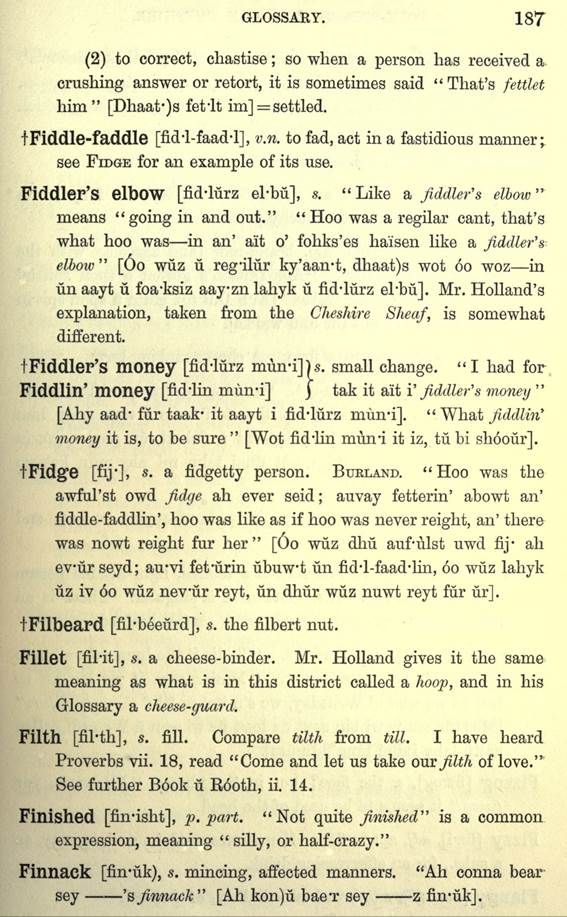
(delwedd C4501) (tudalen 187)
|
GLOSSARY. 1ST
(2) to correct, chastise ; so when a person has received a crushing answer or
retort, it is sometimes said "That's fettlet him" [Dhaat-)s fetlt
im] = settled.
f Fiddle-faddle [fid-l-faad-1], v.n. to fad, act in a fastidious manner; see
FIDGE for an example of its use.
Fiddler's elbow [fid-lurz el-bu], s. "Like a, fiddler's elbow"
means “going in and out." “Hoo was a regilar cant, that's what hoo was
in an' ait o' fohks'es ha'isen like a fiddler's elbow” [Oo wuz u reg'ilur
ky'aan*t, dhaat)s wot 60 woz in un aayt u foa-ksiz aayzn lahyk u fid-lurz
el'bu]. Mr. Holland's explanation, taken from the Cheshire Sheaf, is somewhat
different.
t Fiddler's money [fid-lurz mun-i])s. small change. "I had for Fiddlin'
money [fid-lin mun-i] j tak it ait i' fiddler's money” [Ahy aad* fur taak* it
aayt i fid-lurz mmri]. “What fiddlin* money it is, to be sure” [Wot fidiin
muni it iz, tu bi shoour].
tFidge [fij*], s. a fidgetty person. BURLAND. "Hoo was the awful'st owd
fidge ah ever seid; auvay fetterin' abowt an' fiddle-faddlin', hoo was like
as if hoo was never reight, an' there was nowt reight fur her" [60 wuz
dhu auf'ulst uwd fij' ah evur seyd; au'vi fet'urin ubuwt un fid'l-faad'lin,
60 wuz lahyk uz iv 60 wuz nevur reyt, un dhur wuz nuwt reyt fur ur].
tFilbeard [fil-beeurd], s. the filbert nut.
Fillet [fil'it], s. a cheese-binder. Mr. Holland gives it the same meaning as
what is in this district called a hoop, and in his Glossary a cheese-guard.
Filth [fil-th], s. fill. Compare tilth from till. I have heard Proverbs vii.
18, read "Come and let us take OUT filth of love." See further Book
u R6oth, ii. 14.
Finished [fin*isht], p. part. "Not quite finished" is a common
expression, meaning “silly, or half-crazy."
Finnaek [fin-uk), s. mincing, affected manners. "Ah conna bear sey
'sfinnack" [Ah kon)u bae'r sey z fnruk].
|
|
|
|
|
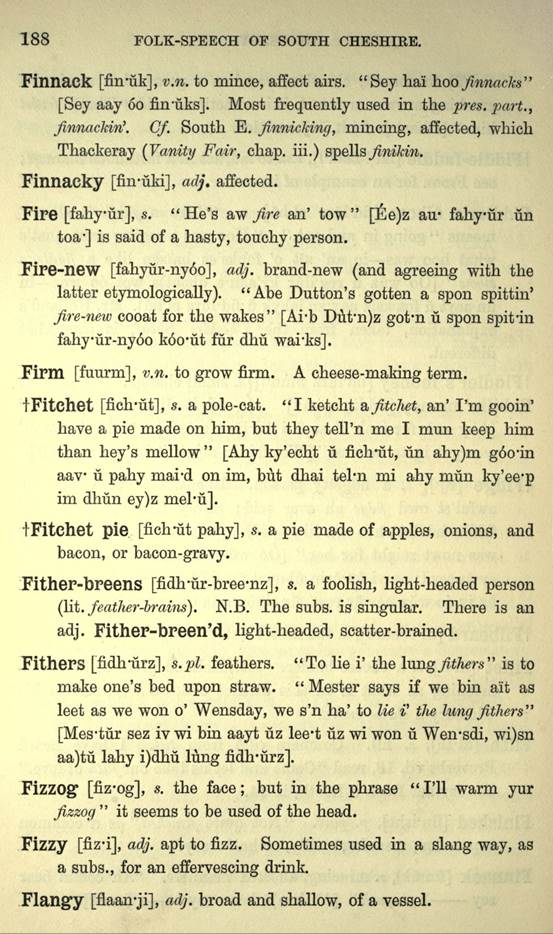
(delwedd C4502) (tudalen 188)
|
188 FOLK-SPEECH OF SOUTH CHESHIRE.
Finnack [fin-uk], v.n. to mince, affect airs. "Sey ha'i hoo finna
cks" [Sey aay 60 fhruks]. Most frequently used in the pres. part.,
finnackin\ Cf. South E. finnicking, mincing, affected, which Thackeray
(Vanity Fair, chap, iii.) spells finikin.
Finnaeky [fin-uki], adj. affected.
Fire [fahyur], s. “He's aw fire an' tow” [Ee)z au- fahyur un toa-] is said of
a hasty, touchy person.
Fire-new [fahyur-nyoo], adj. brand-new (and agreeing with the latter
etymologically). "Abe Button's gotten a spon spittin' fire-new cooat for
the wakes" [Ai-b Dut*n)z got-n u spon spit-in fahyur-ny6o k6o-ut fur dhu
wai'ks].
Firm [fuurm], v.n. to grow firm. A cheese-making term.
tFitchet [fich-ut], s. a pole-cat. "I ketcht o>fitcliet, an' I'm
gooin' have a pie made on him, but they tell'n me I mun keep him than hey's
mellow" [Ahy ky'echt u ficlrut, un ahy)m g6o'in aav u pahy mai-d on im, but
dhai tel-n mi ahy mun ky'ee-p im dhun ey)z mel*u].
tFitchet pie. [ficlrut pahy], s. a pie made of apples, onions, and bacon, or
bacon-gravy.
Fither-breens [fidh-ur-bree-nz], s. a foolish, light-headed person (lit.
feather-brains). N.B. The subs, is singular. There is an adj. Fither-breen'd,
light-headed, scatter-brained.
Fithers [fidh-urz], s.pl. feathers. "To lie i' the lungfithers" is
to make one's bed upon straw. “Mester says if we bin ait as leet as we won o'
Wensday, we s'n ha' to lie i' tlie lung fithers" [Mes'tur sez iv wi bin
aayt uz lee*t uz wi won u Wen-sdi, wi)sn aa)tu lahy i)dhu lung fidh'iirz].
Fizzo^ [fiz-og], s. the face ; but in the phrase '* I'll warm yur fizzog “it
seems to be used of the head.
Fizzy [fiz-i], adj. apt to fizz. Sometimes used in a slang way, as a subs.,
for an effervescing drink.
Flangy [flaan-ji], adj. broad and shallow, of a vessel.
|
|
|
|
|
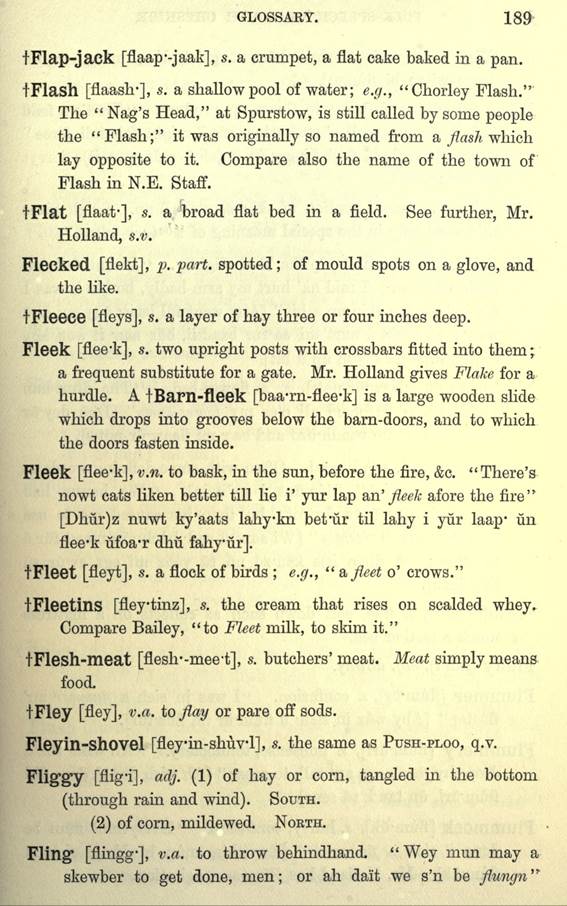
(delwedd C4503) (tudalen 189)
|
GLOSSARY. 189
IFlap-jack [flaap--jaak], s. a crumpet, a flat cake baked in a pan.
tFlash [flaaslr], s. a shallow pool of water; e.g., "Chorley
Flash." The “Nag's Head," at Spurstow, is still called by some
people the “Flash;" it was originally so named from a flash which lay
opposite to it. Compare also the name of the town of Flash in N.E. Staff.
fFlat [flaat-], s. a broad flat bed in a field. See further, Mr. Holland,
s.v.
Flecked [flekt], p. part, spotted; of mould spots on a glove, and the like.
tFleeee [fleys], s. a layer of hay three or four inches deep.
Fleek [flee-k], s. two upright posts with crossbars fitted into them; a
frequent substitute for a gate. Mr. Holland gives Flake for a hurdle. A
tBarn-fleek [baa-rn-flee-k] is a large wooden slide which drops into grooves
below the barn-doors, and to which the doors fasten inside.
Fleek [flee-k], v.n. to bask, in the sun, before the fire, &c.
"There's nowt cats liken better till lie i' yur lap &n' fleek afore
the fire" [Dhur)z nuwt ky'aats lahykn bet'ur til lahy i yur laap* un
flee'k ufoa-r dhu fahyur].
tFleet [fleyt], s. a flock of birds ; e.g., “& fleet o' crows."
tFleetins [fleytinz], s. the cream that rises on scalded whey. Compare
Bailey, "to Fleet milk, to skim it."
tFlesh-meat [flesh- -mee't], s. butchers' meat. Meat simply means food.
tFley [fley], v.a. to flay or pare off sods.
Fleyin-Shovel [fleyin-shuvl], s. the same as PUSH-PLOO, q.v.
Fliggy [flig'i], adj. (1) of hay or corn, tangled in the bottom (through rain
and wind). SOUTH. (2) of corn, mildewed. NORTH.
Fling [flingg-], v.a. to throw behindhand. “Wey mun may a skewber to get
done, men; or ah dait we s'n be flungn"
|
|
|
|
|
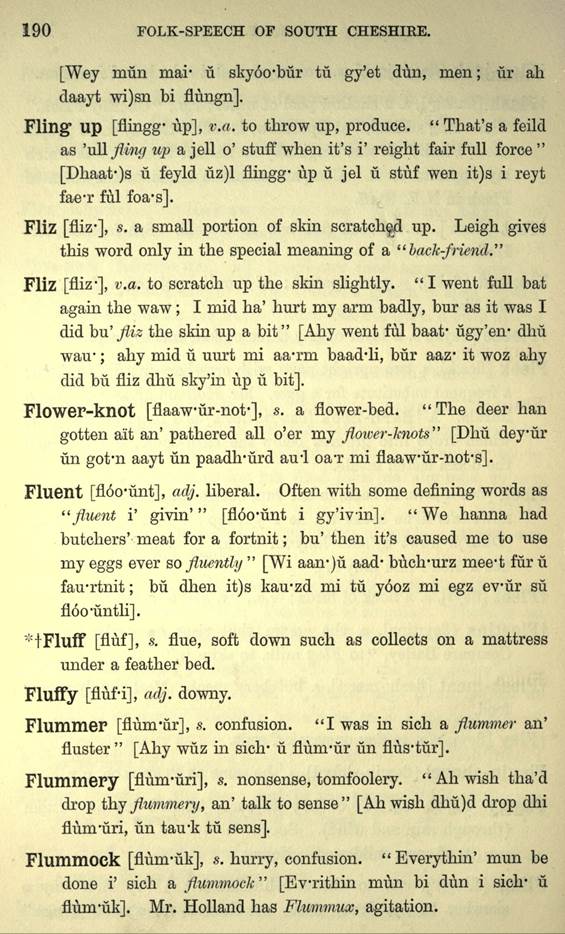
(delwedd C4504) (tudalen 190)
|
190 FOLK-SPEECH OF SOUTH CHESHIRE.
[Wey mun mar u skyoo-bur tu gy'et dun, men; ur ah daayt wi)sn bi flungn],
Fling up [flingg- up], v.a. to throw up, produce. “That's a feild as 'ull
fling up a jell o' stuff when it's i' reight fair full force” [Dhaat*)s u
feyld uz)l flingg' up u jel u stuf wen it)s i reyt fae-r ful foa-s].
Fliz [fliz'], s. a small portion of skin scratched up. Leigh gives this word
only in the special meaning of a "back-friend."
Fliz [fliz'], v.a. to scratch up the skin slightly. "I went full bat
again the waw ; I mid ha' hurt my arm badly, bur as it was I did lou' fliz
the skin up a bit" [Ahy went ful baat* ugy'en* dim wau' ; ahy mid u uurt
mi aa'rm baad'li, bur aaz* it woz ahy did bu fliz dhu sky 'in up u bit].
Flower-knot [flaawur-not'], s. a flower-bed. "The deer han gotten a'it
an' pathered all o'er my flower-knots" [Dhu deyur un got'n aayt un
paadlrurd au'l oa*r mi flaawur-not' s].
Fluent [fl6o-unt], adj. liberal. Often with some defining words as
"fluent i' givin'“ [fl6o-unt i gy'ivin]. "We hanna had butchers'
meat for a fortnit ; bu' then it's caused me to use my eggs ever so fluently”
[Wi aan'ju aad' buch-urz mee*t fur u fau'rtnit ; bu dhen it)s kau'zd mi tu
yooz mi egz evur su floo-untli].
*tFluff [fluf], s. flue, soft down such as collects on a mattress under a
feather bed.
Fluffy [fluf'i], adj. downy.
Flummer [flunrur], s. confusion. "I was in sich a flumnwr an'
fluster" [Ahy wuz in sich* u flunrur un flus'tur].
Flummery [flum-uri], s. nonsense, tomfoolery. "Ah wish tha'd drop thy
flummery, an' talk to sense" [Ah wish dhu)d drop dhi flum-uri, un tau-k
tu sens].
Flummock [flum-uk], s. hurry, confusion. “Everythin' mun be done i' sich a flummock”
[Evrithin muii bi dun i sich* u flum-uk]. Mr. Holland has Flummux, agitation.
|
|
|
|
|
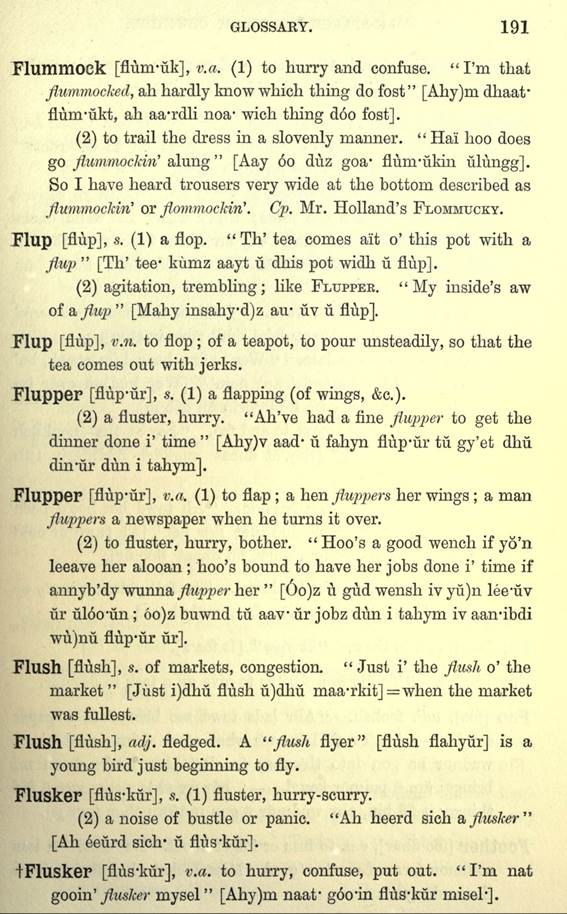
(delwedd C4505) (tudalen 191)
|
GLOSSARY. 191
Flummoek [flunruk], v.a. (1) to hurry and confuse. "I'm that flummocked,
ah hardly know which thing do fost" [Ahy)m dhaat* flunrukt, ah aa-rdli
noa- wich thing d6o fost].
(2) to trail the dress in a slovenly manner. “Hai hoo does go flummockin 1
alung” [Aay 60 duz goa* flunrukin. ulungg]. So I have heard trousers very
wide at the bottom described as flummockiri 1 or flommockiri. Cp. Mr.
Holland's FLOMMUCKY.
Flup [flup], s. (1) a flop. "Th 5 tea comes a'it o' this pot with a
flup” [Th' tee- kumz aayt u dhis pot widh u flup].
(2) agitation, trembling; like FLUPPEE. "My inside's aw of &flup”
[Mahy insahyd)z au- uv u flup].
Flup [flup], v.n. to flop ; of a teapot, to pour unsteadily, so that the tea
comes out with jerks.
Flupper [flup-ur], s. (1) a flapping (of wings, &c.).
(2) a fluster, hurry. "Ah've had a fine flupper to get the dinner done
i' time” [Ahy)v aad- u fahyn flup-ur tu gy'et dhu din-ur dun i tahym],
FluppeP [flup'iir], v.a. (1) to flap ; a henfluppers her wings ; a man
fluppers a newspaper when he turns it over.
(2) to fluster, hurry, bother. “Hoo's a good wench if yo'n leeave her alooan
; hoo's bound to have her jobs done i' time if annyb'dy wunna flupper her”
[6o)z u gud wensh iv yu)n lee'uv ur ul6o-un ; 6o)z buwnd tu aav ur jobz dun i
tahym iv aan-ibdi wu)nu flup-ur ur].
Flush [flush], s. of markets, congestion. “Just i' the flush o' the market”
[Just i)dhu flush u)dhu maa'rkit]=when the market was fullest.
Flush [flush], adj. fledged. A "flush flyer" [flush flahyur] is a
young bird just beginning to fly.
Flusker [flus-kur], s. (1) fluster, hurry-scurry.
(2) a noise of bustle or panic. "Ah heerd sich ^flusher" [Ah eeurd
sich- u flus'kur].
IFlusker [flus-kur], v.a. to hurry, confuse, put out. "I'm nat gooin'
flusker mysel" [Ahy)m naat* g6o'in flus-kur misel'].
|
|
|
|
|
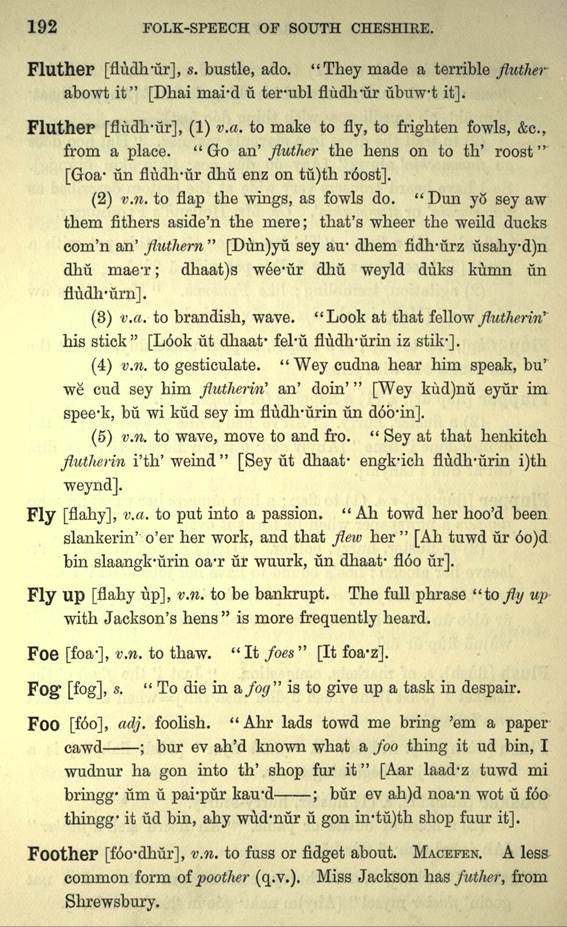
(delwedd C4506) (tudalen 192)
|
192 FOLK-SPEECH OF SOUTH
CHESHIRE.
Fluther [fludh-ur], s. bustle, ado. "They made a terrible flutlwr abowt it"
[Dhai mard u terubl fludlrur ubuwt it].
Fluther [fludlrur], (1) v.a. to make to fly, to frighten fowls, &c., from
a place. “Go an' flutlwr the hens on to th' roost" [Goa- un fludh-ur dhu
enz on tu)th roost].
(2) v.n. to flap the wings, as fowls do. "Dun yo sey aw them fithers
aside'n the mere; that's wheer the weild ducks com'n an' fluthern” [Dun)yu
sey au' dhem fidlrurz usahyd)n dhu maeT ; dhaat)s wee'ur dhu weyld duks kumn
un fludh-urn].
(3) v.a. to brandish, wave. "Look at that fellow flutlierirf his
stick" [L6ok ut dhaat' fel-u fludh-urin iz stik-].
(4) v.n. to gesticulate. “Wey cudna hear him speak, bu' we cud sey him
fluiheriri an' doin'“ [Wey kud)nu eyur im spee-k, bu wi kud sey im fludh-urin
un d6b'in].
(5) v.n. to wave, move to and fro. “Sey at that henkitch flutlierin i'th'
weind" [Sey ut dhaat' engk'ich fludh'urin i)th weynd].
Fly [flahy], v.a. to put into a passion. "Ah towd her hoo'd been
slankerin' o'er her work, and that flew her” [Ah tuwd ur 6o)d bin
slaangk-urin oa-r ur wuurk, un dhaat- fl6o ur].
Fly up [flahy up], v.n. to be bankrupt. The full phrase "to fly up with
Jackson's hens “is more frequently heard.
Foe [foa-], v.n. to thaw. “It foes” [It foa-z].
[fog]> 5. "To die in a/o#" is to give up a task in despair.
FOO [f6o], adj. foolish. “Ahr lads towd me bring J em a
paper j bur ev ah'd known what a foo thing it ud bin, I
wudnur ha gon into th' shop fur it” [Aar laad-z tuwd mi
bringg* urn u pai'pur kau'd -- ; bur ev ah)d noa*n wot u f6o thingg* it ud
bin, ahy wud'niir u gon in'tu)th shop fuur it].
Foother [f6o-dhur], v.n. to fuss or fidget about. MACEFEN. A less common form
ofpoother (q.v.). Miss Jackson has futJier, from Shrewsbury.
|
|
|
|
|
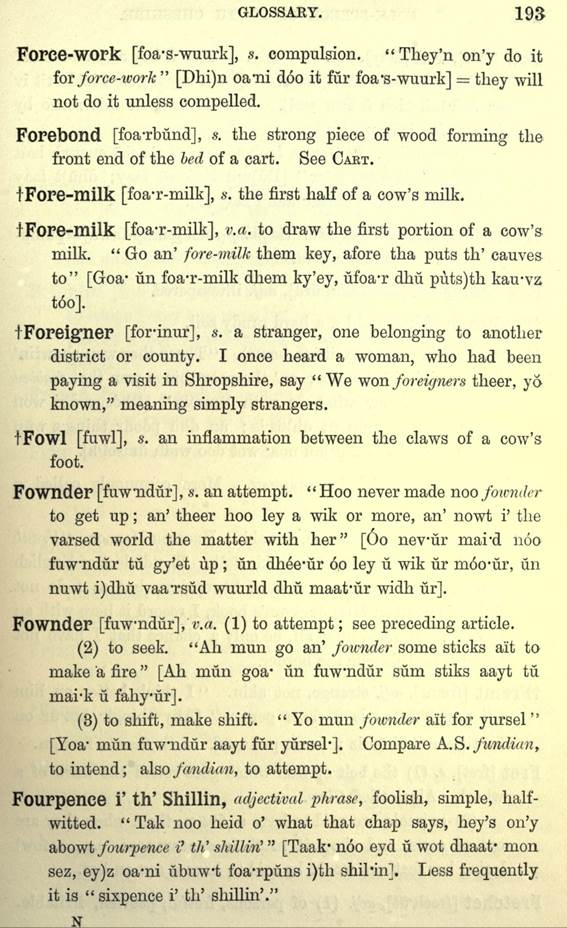
(delwedd C4507) (tudalen 193)
|
GLOSSAEY.
193
Force-work [foa-s-wuurk], s. compulsion. "They'n
on'y do it fair force-work” [Dhi)n oani d6o it fur foa-s-wuurk] == they will
not do it unless compelled.
Forebond [foa-rbund], s. the strong piece of wood forming the front end of
the bed of a cart. See CAKT.
t Fore-milk [foa-r-milk], . the first half of a cow's milk.
t Fore-milk [foa-r-milk], v.a. to draw the first portion of a cow's milk. “Go
an' fore-milk them key, afore tha puts th' cauves to" [Goa- un foa-r-milk
dhem ky'ey, ufoa-r dhu puts)th kau-vz. t6o].
t Foreigner [forinur], s. a stranger, one belonging to another district or
county. I once heard a woman, who had been paying a visit in Shropshire, say
“We won foreigners theer, yo known," meaning simply strangers.
tFowl [fuwl], s. an inflammation between the claws of a cow's foot.
Fownder [fuw ndur] , s. an attempt . ' ' Hoo never made noo fownder to get up
; an' theer hoo ley a wik or more, an' nowt i' the varsed world the matter
with her" [Oo nevur mai'd 1160 fuwndur tu gy'et up ; un dhee-ur 60 ley u
wik ur m6o'ur, un nuwt i)dliu vaa'rsud wuurld dhu maat'ur widh ur].
Fownder [fuwndur], 'v.a. (I) to attempt; see preceding article.
(2) to seek. "Ah mun go an' fownder some sticks ait to make a fire” [Ah
mun goa- un fuwndur sum stiks aayt tu mai'k u fahyur].
(3) to shift, make shift. “Yo mun fownder ait for yursel” [Yoa- mun fuwndur
aayt fur yursel']. Compare AJ3./WK&W, to intend; also fandian, to
attempt.
Fourpenee i' th' Shillin, adjectival phrase, foolish, simple, half-witted.
“Tak noo heid o' what that chap says, hey's on'y abowt fourpence i' th'
shillin'“ [Taak* noo eyd u wot dhaat* mon sez, ey)z oa-ni ubuwt foa-rpuns
i)th shil'in]. Less frequently it is “sixpence i' th' shillin'." N
|
|
|
|
|
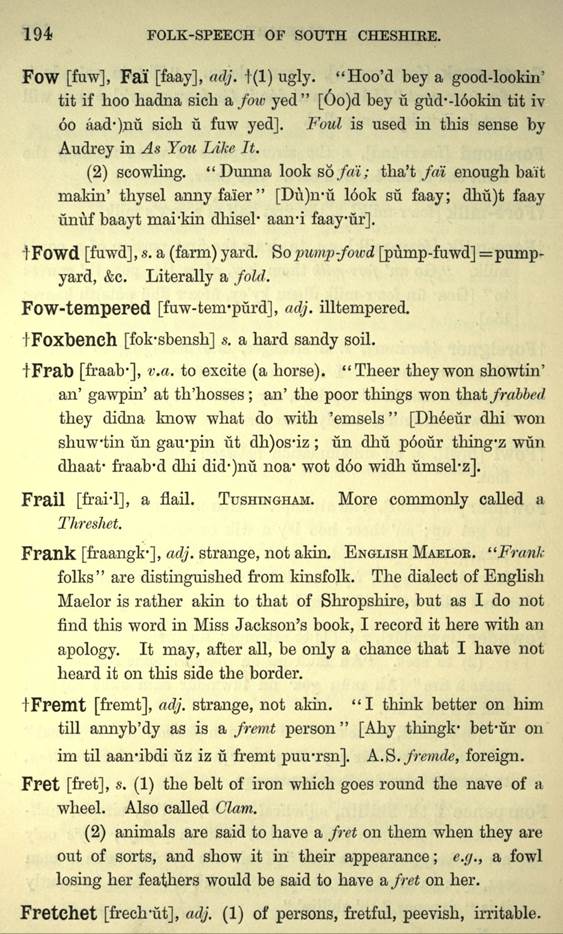
(delwedd C4508) (tudalen 194)
|
194 FOLK-SPEECH OF SOUTH CHESHIEE.
FOW [fuw], Fai [faay], adj. f(l) ugly. "Hoo'd bey a good-lookiii' tit if
hoo hadna sich a foiv yed" [6o)d bey u gud--16okin tit iv 60 aad-).nu
sicli u fuw yed]. Foul is used in this sense by Audrey in As You Like It.
(2) scowling. "Dumia look so fai; tha't fai enough bait makin' thysel
annyfaier" [Du)iru 16ok su faay; dhu)t faay unuf baayt mar kin dhisel-
aan-i faay "fir].
t Fowd [fuwd] , s. a (farm) yard. So pump-fowd [pump-fuwd] = pump-yard,
&c. Literally a fold.
Fow-tempered [fuw-tenrpurd], adj. illtempered. 1 Foxbeneh [fok-sbensh] s. a
hard sandy soil.
tFrab [fraab*], v.a. to excite (a horse). "Theer they won showtin' an'
gawpin' at th'hosses ; an' the poor things won ih&t frabbed they didna
know what do with 'emsels” [Dheeur dhi won shuwtin un gau'pin ut dh)os*iz ;
un dhu poour thing'z wun dhaat* fraab'd dhi did*)nu noa* wot d6o widh
umsel'z].
Frail [frarl], a flail. TUSHINGHAM. More commonly called a Threslwt.
Frank [fraangk-], adj. strange, not akin. ENGLISH MAELOE. "Frank
folks" are distinguished from kinsfolk. The dialect of English Maelor is
rather akin to that of Shropshire, but as I do not find this word in Miss
Jackson's book, I record it here with an apology. It may, after all, be only
a chance that I have not heard it on this side the border.
tFremt [fremt], adj. strange, not akin. "I think better on him till
annyb'dy as is a fremt person" [Ahy thingk- bet'ur on im til aan'ibdi uz
iz u fremt puirrsn]. A..8.fremde, foreign.
Fret [fret], s. (1) the belt of iron which goes round the nave of a. wheel.
Also called Clam.
(2) animals are said to have a fret on them when they are out of sorts, and
show it in their appearance; e.g., a fowl losing her feathers would be said
to have a, fret on her.
Fretchet [frech-ut], adj. (1) of persons, fretful, peevish, irritable.
|
|
|
|
|
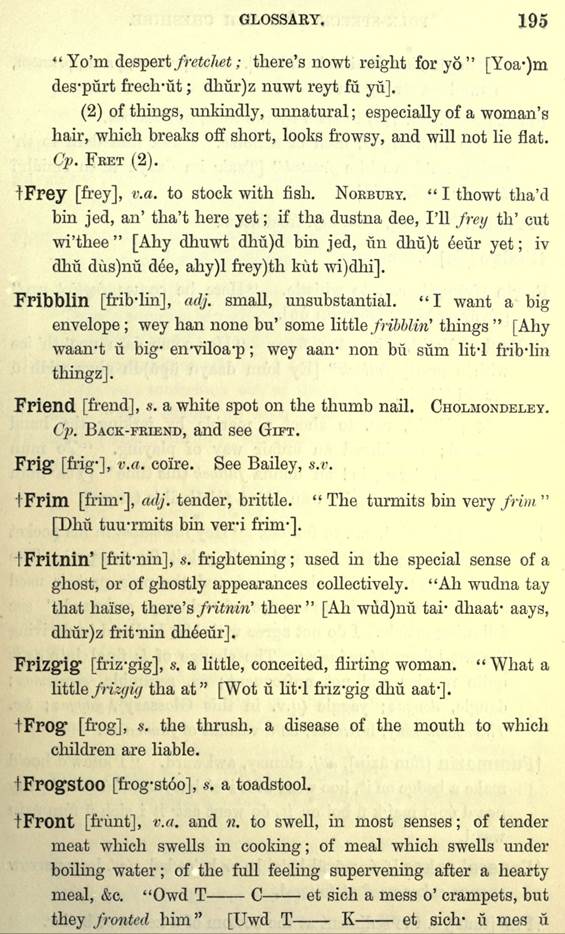
(delwedd C4509) (tudalen 195)
|
GLOSSARY.
195
41 Yo'm Hespeict fretchet ; there's no wt reiglit
foryo" [Yoa-)m des*purt freclrut ; dhiir)z nuwt reyt fu yu].
(2) of things, unkindly, unnatural ; especially of a woman's hair, which
breaks off short, looks frowsy, and will not lie flat. Cp. FRET (2).
tFrey [frey], v.a. to stock with fish. NORBURY. “I thowt tha'd bin jed, an'
tha't here yet ; if tha dustna dee, I'll frey th' cut wi'thee” [Ahy dhuwt
dhu)d bin jed, iin dhu)t eeur yet ; iv dhu dus)nu dee, ahy)l frey)th kut
wi)dhi].
Fribblin [frib-lin], adj. small, unsubstantial. "I want a big envelope ;
wey han none bu' some little fribblin' things” [Ahy waan-t u big- en-viloa-p
; wey aan- non bu sum lit-1 frib-lin
thingz] .
Friend [frend], s. a white spot on the thumb nail. CHOLMONDELEY. Cp.
BACK-FRIEND, and see GIFT.
Frig [frig'], v.a. coire. See Bailey, s.v.
tFrim [Mm-], adj. tender, brittle. “The turmits bin very frim “ [DM tmrrmits
bin veri frinr].
iFritnin' [frit-nin], s. frightening; used in the special sense of a ghost,
or of ghostly appearances collectively. "Ah wudna tay that liaise,
there's fritnin' theer" [Ah wud)nu tai* dhaat* aays, dliur)z Mt-nin
dheeur],
Frizgig" [friz*gig], s. a little, conceited, flirting woman. "What
a little frizyiy tha at" [Wot u lit-1 friz -gig dhu aat-].
tFrog" [frog], s. the thrush, a disease of the mouth to which children
are liable.
tFrogStOO [frog-st6o], s. a toadstool.
t Front [friint], v.a. and n. to swell, in most senses; of tender meat which
swells in cooking ; of meal which swells under boiling water ; of the full
feeling supervening after a hearty
meal, &c. "Owd T C et sich a mess o' crampets, but
they fronted him" [Uwd T K et sich* u nies u
|
|
|
|
|
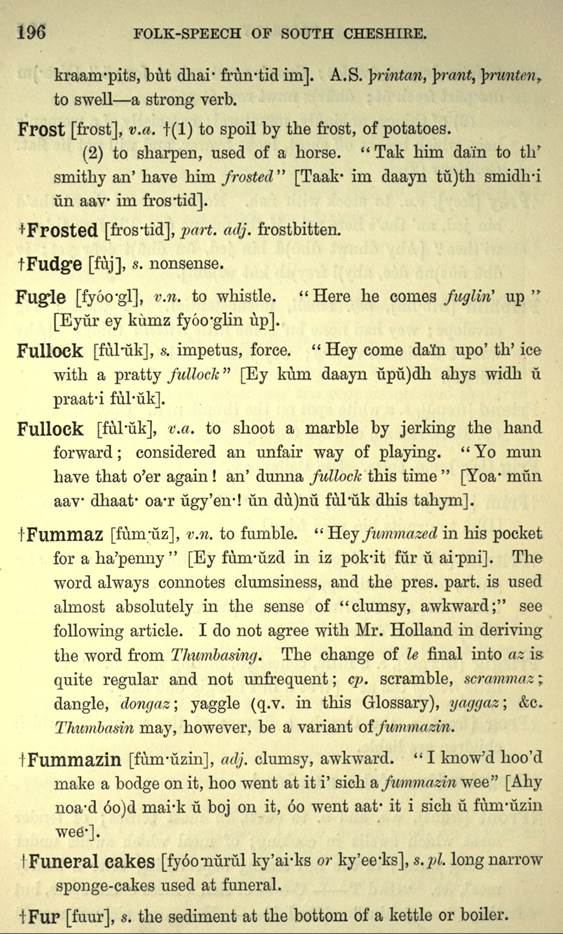
(delwedd C4510) (tudalen 196)
|
196 FOLK-SPEECH OF SOUTH CHESHIRE.
kraam-pits, but dhai- frmrtid im]. A.S. ]>rintan, }>rant, ]>nmten f
to swell a strong verb.
Frost [frost], v.a. f (1) to spoil by the frost, of potatoes.
(2) to sharpen, used of a horse. "Tak him dain to th r
smithy an' have him frosted" [Taak- im daayn tu)th smidlri
un aav im frosiid].
^Frosted [frosiid], part. adj. frostbitten. tFudge [fuj], s. nonsense.
Fugle [fyoo-gl], v.n. to whistle. "Here he conies /uglirt up" [Eyur
ey kiimz fyoo'glin up].
Fullock [fuMk], s. impetus, force. “Hey come da'in upo' th' ice with a pratty
fullock” [Ey kum daayn upu)dh ahys widh u praat-i fiil-uk].
Fullock [ful'uk], v.a. to shoot a marble by jerking the hand forward;
considered an unfair way of playing. "Yo mun have that o'er again ! an'
dunna fullock this time” [Yoa* mun aav dhaat- oa-r ugy'eir! un du)nu ful'uk
dhis tahym].
tFummaz [funruz], v.n. to fumble. “Hey fummazed in his pocket for a
ha'penny" [Ey funruzd in iz pok-it fur u ai'pni]. The word always
connotes clumsiness, and the pres. part, is used almost absolutely in the
sense of "clumsy, awkward;" see following article. I do not agree with
Mr. Holland in deriving the word from Thumbasing. The change of le final into
as is quite regular and not unfrequent ; cp. scramble, scrammaz ; dangle,
dongaz\ yaggle (q.v. in this Glossary), yaggaz; &c. Thwnbasin may,
however, be a variant of fummazin.
IFummazin [fum-uzin], adj. clumsy, awkward. "I know'd hoo'd make a bodge
on it, hoo went at it i' sich a,fummazin wee" [Ahy noa*d 6o)d mai-k u
boj on it, 60 went aat- it i sich u fum-uzin wee"'].
I Funeral cakes [fy6onurul ky'ai-ks or ky'ee'ks], s.pl. long narrow
sponge-cakes used at funeral.
iFur [fuur], s. the sediment at the bottom of a kettle or boiler.
|
|
|
|
|
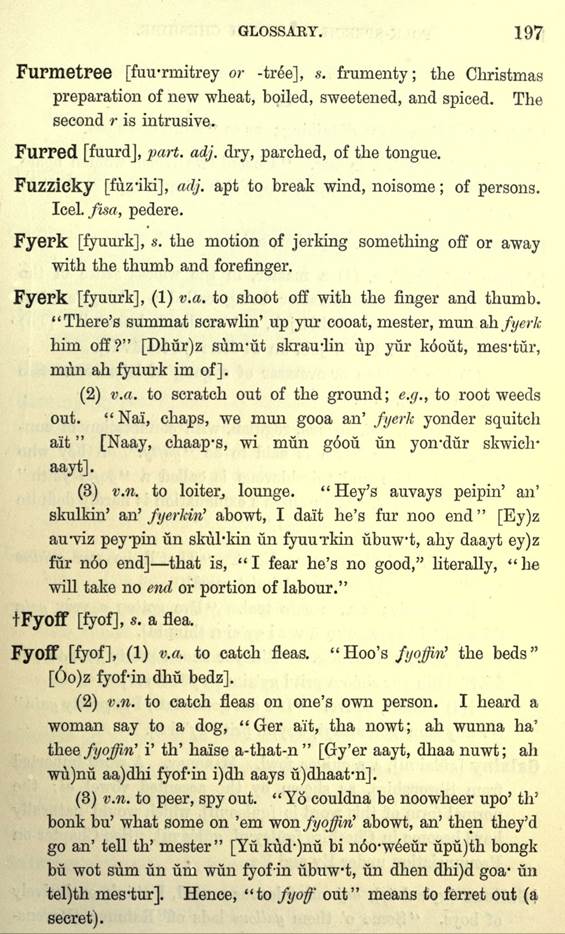
(delwedd C4511) (tudalen 197)
|
GLOSSARY. 197
Furmetree [fuu-rmitrey or -tree], s. frumenty; the Christmas preparation of
new wheat, boiled, sweetened, and spiced. The second r is intrusive.
Furred [fuurdj, part. adj. dry, parched, of the tongue.
Fuzzieky [fuz-iki], adj. apt to break wind, noisome ; of persons. Icel. fisa,
pedere.
Fyerk [fyuurk], s. the motion of jerking something off or away with the thumb
and forefinger.
Fyerk [fyuurk], (1) v.a. to shoot off with the finger and thumb.
"There's summat scrawlin' up yur cooat, mester, mun ah fyerk him
off?" [Dhur)z sunrut skrau*lin up yur ko"out, mes'tur, mun ah
fyuurk im of].
(2) v.a. to scratch out of the ground; e.g., to root weeds out. "Nai,
chaps, we mun gooa an' fyerk yonder squitch ait” [Naay, chaap-s, wi mun goou
un yon-dur skwiclr aayt] .
(8) v.n. to loiter, lounge. “Hey's auvays peipin' an' skulkin' an' fyerkin*
abowt, I dait he's fur noo end" [Ey)z au-viz peypin un skul-kin un
fymrrkin ubuwt, ahy daayt ey)z fur n6o end] that is, "I fear he's no
good," literally, "he will take no end or portion of labour."
tFyoff [fyof], s. a flea.
Fyoff [fyof], (1) v.a. to catch fleas. "Hoo's fyoffirf the beds"
[6o)z fyof* in dhu bedz].
(2) v.n. to catch fleas on one's own person. I heard a woman say to a dog,
"Ger ait, tha nowt; ah wunna ha' thee fyoffin' i' th' haise
a-that-n" [Gy'er aayt, dhaa nuwt; ah wu)nu aa)dhi fyof-in i)dh aays
u)dhaat-n].
(3) v.n. to peer, spy out. “Y6 couldna be noowheer upo' th 5 bonk bu' what
some on 'em wonfyoffirf abowt, an' then they'd go an' tell th' mester"
[Yu kud-)nu bi n6o-weeur upu)th bongk bu wot sum un um wun fyofin ubuwt, un
dhen dhi)d goa* un tel)th mes-tur]. Hence, "to fyoff out" means to
ferret out (a secret).
|
|
|
|
|
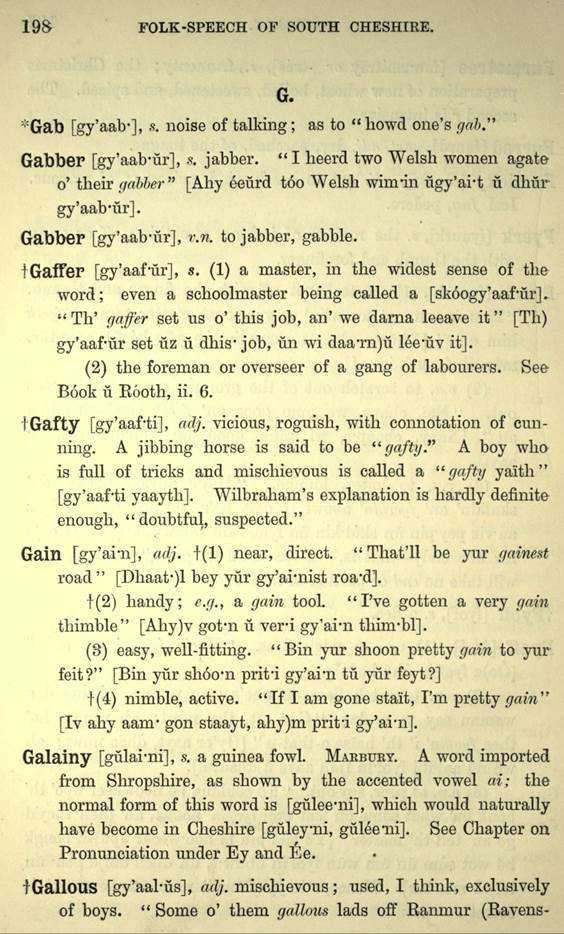
(delwedd C4512) (tudalen 198)
|
198 FOLK -SPEECH OF SOUTH CHESHIRE.
G.
*Gab [gy'aab-], *. noise of talking ; as to “howd one's gab"
Gabber [gy'aab-ur], s. jabber. “I lieerd two Welsh women agate o' their
(/abler" [Ahy eeurd too Welsh winrin ugy'art ii dhur gy'aab-ur].
Gabber [gy'aab-ur], v.n. to jabber, gabble.
IGaffer [gy'aaf'ur], s. (1) a master, in the widest sense of the word; even a
schoolmaster being called a [skoogy'aaf'ur].. “Th' gaffer set us o' this job,
an' we darna leeave it” [Th) gy'aaf-ur set uz u dhis- job, un wi daa-rn)u
lee'uv it].
(2) the foreman or overseer of a gang of labourers. See Book u Booth, ii. 6.
tGafty [gy'aaf'ti], adj. vicious, roguish, with connotation of cunning. A
jibbing horse is said to be "ga/ty" A boy who is full of tricks and
mischievous is called a “gafty yaith “ [gy'aaf'ti yaayth]. Wilbraham's
explanation is hardly definite enough, "doubtful, suspected."
Gain [gy'ai-n], adj. t(l) near, direct. "That'll be yur gainest
road" [Dhaat-)l bey yur gy'ai-nist roa-d].
f(2) handy; e.g., a gain tool. "I've gotten a very gain thimble"
[Ahy)v got-n u ver-i gy'ai-n thim-bl].
(3) easy, well-fitting. “Bin yur shoon pretty gain to yur feit?" [Bin
yur sh6o-n priti gy'ai'n tu yur feyt?]
t(4) nimble, active. "If I am gone stait, I'm pretty gain" [Iv ahy
aanr gon staayt, ahy)m priti gy'ai-n].
Galainy [gulai-ni], s. a guinea fowl. MARBUKY. A word imported from
Shropshire, as shown by the accented vowel ai; the normal form of this word
is [gulee*ni], which would naturally have become in Cheshire [giileyni,
guleeni]. See Chapter on Pronunciation under Ey and Ee.
f GallOUS [gy'aal-us], adj. mischievous ; used, I think, exclusively of boys.
“Some o' them gallons lads off Banmur (Ravens-
|
|
|
|
|
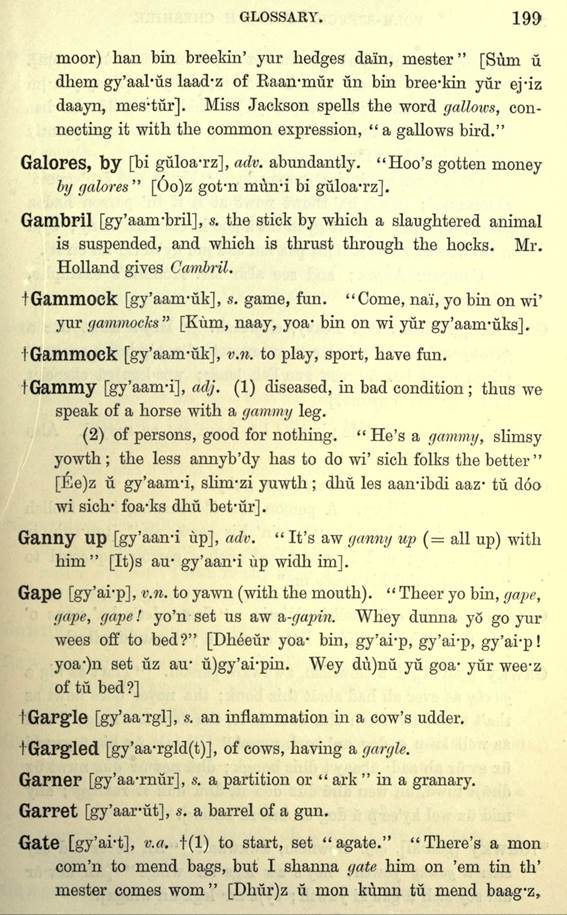
(delwedd C4513) (tudalen 199)
|
GLOSSARY. 199
moor) ban bin breekin' yur hedges dain, mester" [Sum u dbem gy'aal'us
laad'z of Baairmur un bin bree-kin yur ej'iz daayn, mes'tur]. Miss Jackson
spells the word gallows, connecting it with the common expression, “a gallows
bird."
Galores, by [bi guloa-rz], adv. abundantly. "Hoo's gotten money by
galores” [6o)z got-n mun-i bi guloa-rz].
Gambril [gy'aanrbril], s. the stick by which a slaughtered animal is
suspended, and which is thrust through the hocks. Mr. Holland gives Cambril.
f Gammock [gy'aanruk], s. game, fun. "Come, nai, yo bin on wi* yur
gammocks" [Kum, naay, yoa* bin on wi yur gy'aanruks].
I Gammoek [gy'aanruk], v.n. to play, sport, have fan.
f Gammy [gy'aanri], adj. (1) diseased, in bad condition; thus we speak of a
horse with a gammy leg.
(2) of persons, good for nothing. "He's a gammy, slimsy yowth ; the less
annyb'dy has to do wi' sich folks the better" [Ee)z u gy'aam-i, slinrzi
yuwth ; dhu les aan-ibdi aaz- tu doo wi sich' foa'ks dhu bet'ur],
Ganny up [gy'aan-i up], adv. “It's aw ganny up (= all up) with him"
[It)s au- gy'aan-i up widh im].
Gape [gy'ai'p]' v - n - * yawn (with the mouth). “Theer yo bin, gape, gape,
gape ! yo'n set us aw a>-gapin. Whey dunna yo go yur wees off to
bed?" [Dheeur yoa- bin, gy'ai-p, gy'ai-p, gy'ai-p! yoa-)n set uz au-
u)gy'ai-pin. Wey du)nu yu goa- yur wee-z of tu bed?]
I Garble [gy'aa-rgl], s. an inflammation in a cow's udder. 1 Gargled
[gy'aa-rgld(t)], of cows, having a gargle. Garner [gy'aa'rnur], s. a
partition or “ark “in a granary. Garret [gy'aar-ut], s. a barrel of a gun.
Gate [gy'ai-t], v.a. t(l) to start, set "agate." "There's a
mon com'n to mend bags, but I shanna gate him on 'em tin th' mester comes
worn" [Dhur)z u mon kumn tu mend baag'z,
|
![]() B5237ː
B5237ː ![]()
![]() yn
yn ![]() aith δ δ £ g
aith δ δ £ g![]() yn
yn ![]() aith δ δ £ U+2020
†
aith δ δ £ U+2020
†![]() yn
yn ![]() aith δ δ
aith δ δ![]()
![]()
















































































































































































































